:Peru State College

' Peru; Nebraska 1992 - 94 . .✓, ·t ,

Information about student retention and completion as required by the Higher Education Amendments of 1976 is available through the Office of Student Affairs.
No person attending Peru State College shall, on the grounds of race, color, national origin, handicap, or gender, be excluded from participation in , be denied of, or be subjected to discrimination under any program or activity receiving federal financial assistance. Inquiries regarding these matters should be directed to the Vice President for Administration and Finance.
This catalog contains official information for the 1992-94 academic years. The College reseives the right to repeal, change, or amend rules, regulations, tuition and fees, and may withdraw, add to or modify courses and programs .
The catalog is published by Peru State College at Peru, Nebraska and entered under Bulk P ermit Number 4 at Peru , Nebraska 68421.

The College phone number is:
(402)872-3815
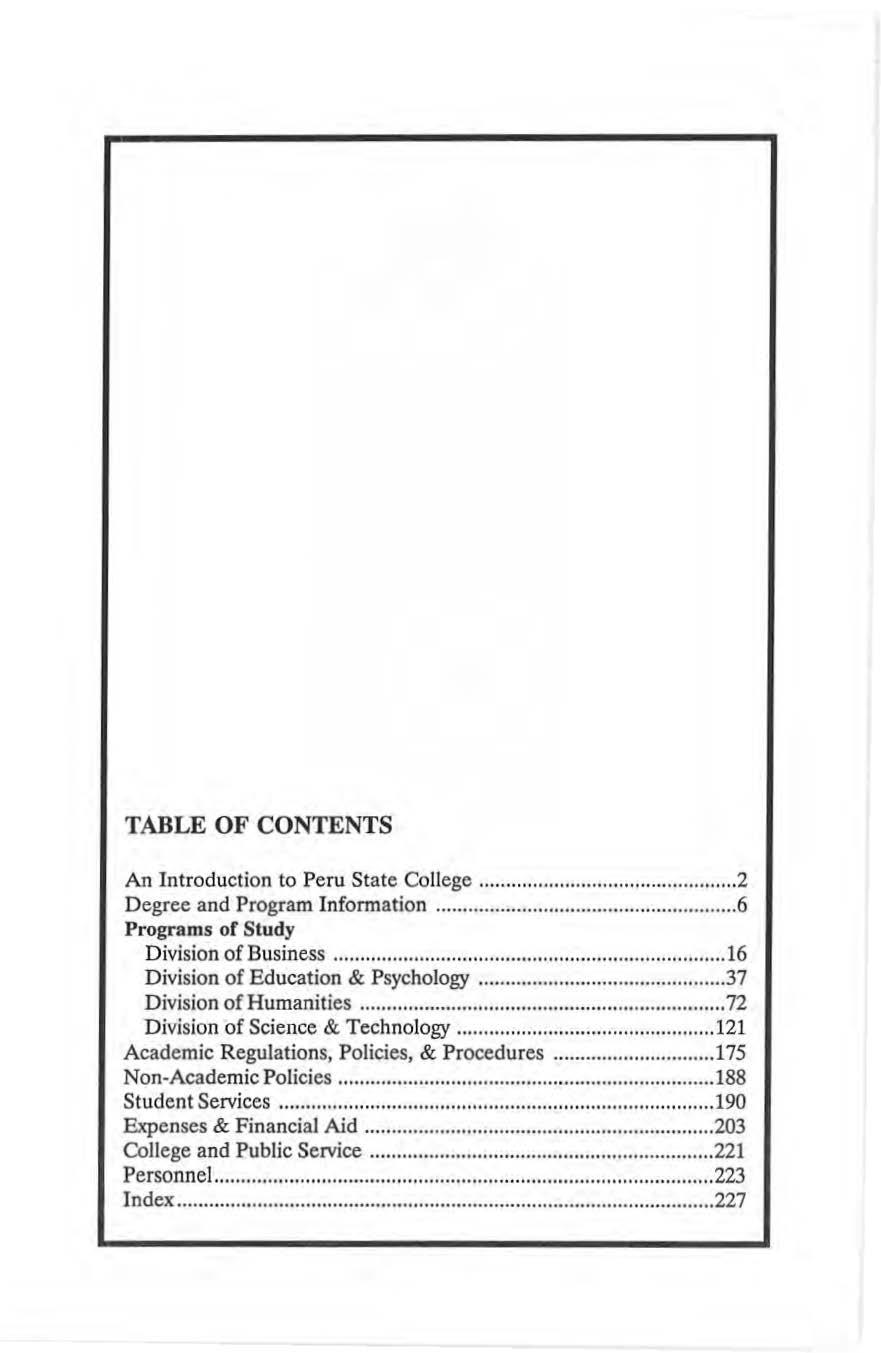
TABLE OF CO NTE NTS An Int rod uction to Peru State Co llege ................................................2 Degree and Program Information ........................................................ 6 Programs of S tu dy D ivision of Business ... .. .... ............. .......................... ... ...................... 16 Division of Education & Psychology 37 Divis ion of Humanities .................................................................... 72 Division of Science & Technology 121 Acad e mic Regulations, Policies, & P rocedures 175 Non-Academ ic Policies ................................................. ....... .............. 188 Student Services ........... . ... ... ..................................... ................ .. ........ 190 Expenses & Financial Aid 203 College and Public Service ................................................... ....... ...... 221 Personnel ................. ........ ...... ..... ......................................................... 223 Index 227
19-92-1993 ACADEMIC CALENDAR
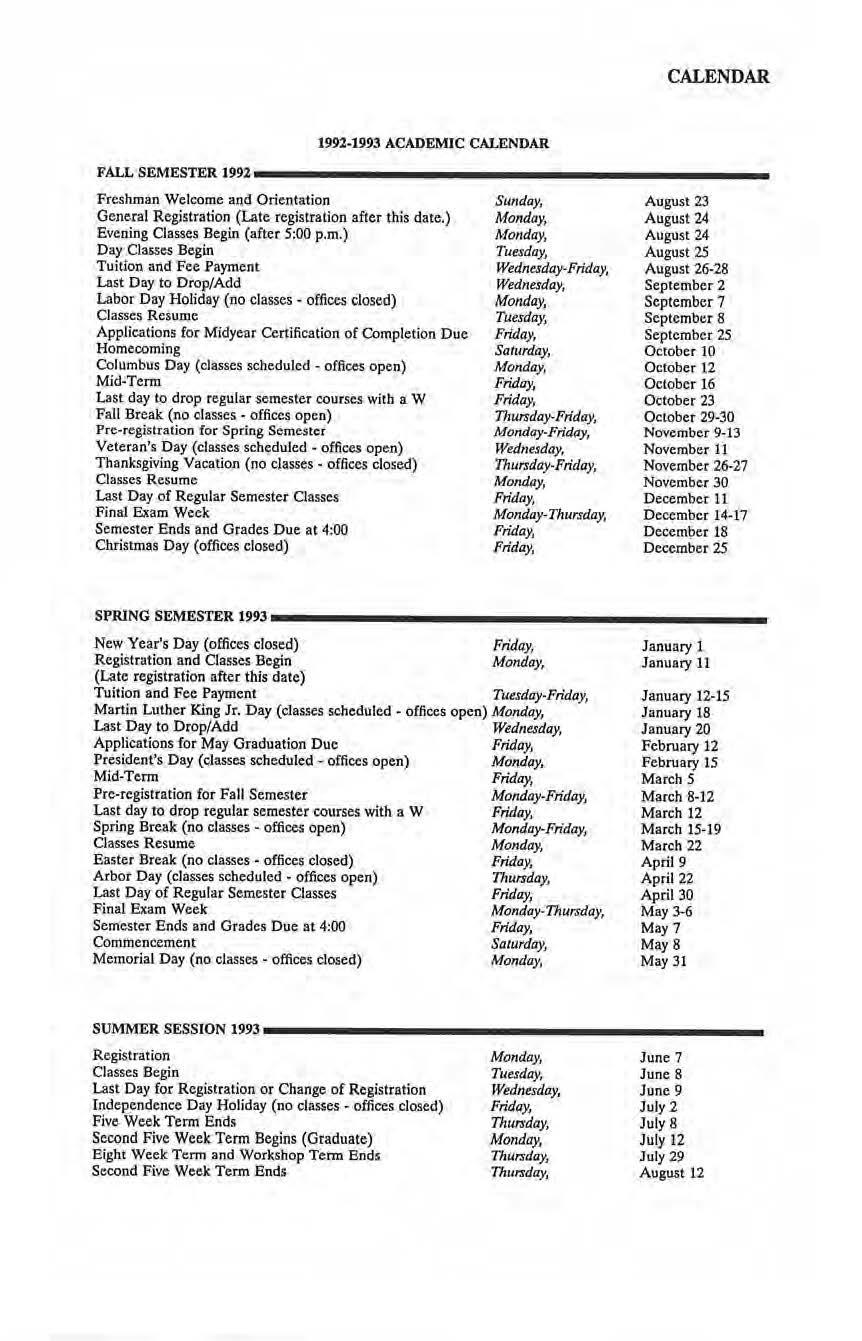
FALL SEMESTER 1992-------------------------
Freshman Welcome aqd Orienta1ion
General Registration (l..ate registration after this date.)
Evening Classes Begin (after 5:00 p.m.)
Day Classes Begin
Tuition and Fee Payment
Last Day to Drop/Add
Labor Day Holiday (no classes • offi~ closed)
Classes Resume
Applications for Midyear Certification of Completion Due
Homecoming
Columbus Day (classes scheduled • offices open)
Mid-Term
Last day to drop regular semester courses with a W Fall Break (no <>lasses - offices open)
Pre-registration for Spring Semester
Veteran's Day (classes scheduled - qffices qpen)
Thanksgiving Vacation (no classes • offices closed)
Classes Resume
Last Day of Regular Semester Classes
Final Exam Week
Semester Ends and Grades Due at 4:00
Christmas Day ( offices closl!d)
SPJllNG SEMESTER 1993
Sunday, Monday, Monday, Tuesday, Wednesday-Friday, Wednesday, Monday, Tuesda)\ Friday, Sat11rday, Monday, Friday, Friday. TJ,u~day-Friday, Monduy-Frid<Jy, Wednesday, Thursday-Friday, Monday, Friday, Monday-Thursday, Friday, Friday,
August 23
August 24
August 24
August 25
August 26-28
September 2
September?
September 8
September 25
October 10
October 12
October 16
O ctober 23
October 29•30
November 9-13
November 11
November 26-27
November 30
December 11
December 14-17
December 18
December 25
New Year's Day (offices closed)
Registration and Classes Begin (Late registration nftec this date)
Frid4y, Monday, Tuition and Fee Payment
Tuesday-Friday, Martin Luther King Jr. Day (classes scheduled - offices open) Mo11d4y, Last Day to Drop/Add Wed11esd4y, Applications for May Graduation Due Friday, President's Day (classes scheduled • offices open) MoJtday, Mid-Term Friday,
Pre-registration for Fall Semester Monday-Friday, Last day to drop regular semester c-0urses with a W
Friday, Spring Break (no classes - offices open)
Monday-Friday, Classes Resume
Monday, Easler Break (no classes - offices closed)
Friday, Arbor Day (classes scheduled • offices open)
Thursday, Last Day of Regular Semester Classes
Friday, Final Exam Week
Monday -Thursday, Semester Ends and Grades Due at 4:00
Friday, Commencement Satarday, Memorial Day (no classes - offices closed)
Monday,
January 1
January 11
Januar:y 12-15
Januar:y 18
January 20
February 12
:February 15
March 5
March 8-12
March 12
March 15-19
March 22
April 9
April 22
April 30
May 3-6
May7 M<1y8
May 31
SUMMER SESSION 1993
Registration Classes Begin
Last Day for Registration or Change of Registration
lndee_cndence Day Holiday (no classes - offices closed)
Flve Week Term Ends
Second Five Week Term Begins (Graduate)
Eight Week Term and Workshop Term Ends
Second Five Week Term Ends
Monday, Tuesday, Wednesday, Friday, T/11m·day, Monday, 71,iirsday, 17umday,
June 7
June 8
June 9
July 2
July 8
July 12
July 29
August 12
CALENDAR
_______________________
_______________________
1993 • 1994 ACADEMI C C ALEN DAR FALL SEMESTER 1993 ________________________
Freshmon We lcome and O rien tat ion
General Rcgisltation (Late rcgislralion after this d•tc .)
Evening Qasses Begin {after 5;00)
Da y Cl~sses Begin
Tu ition and Fee Payment
Last Day to Drop/Add
Labor Day Holiday (no classes • offices closed)
Classes Resume
Applic:.tions for Midyear Certification or Completion Due
Homecoming
Columbus Day (classes scheduled • offices open)
Mid-Term
Last day to drop regular semester courses wi t h -a W
Fall Brea k (no classes • offices open)
Veteran's Day (classes scheduled • offices open)
Pte-registration for Spring Semester

Thanksgiving Vacation (no classes • offices closed)
Classe$ Resume
Last Dny of Regular Semester Classes
Final Exam Weck
Semester Ends and Grades Due at 4:00
Christmas Day {offices closed)
S PRJ NG SEMESTER,
Sunday, M onday, Monday, Tuesday, Tuesday-Friday, Wednesday, Monday, Tuesday, Friday, TBA
Monday, Friday, Friday, Thursday-Friday, Thursday, Monday-Friday, Thursday-Friday, Monday, Friday, Monday -Priday, Friday, Saturtf11y,
August 22
August 23
August 23
August 24
August 24-27
September l
Sept ember 6
September 7
September 24
TBA
October JI
October 15
October 22
O(ltober 28-29
Novem ber 11
November 8-12
November 25-26
November 29
December 10
December 13-16
December 17
December 25
1994----------------------
Saturday, Monday, New Yea r's Dny {offices closed)
R cgistralioo and Classes Begin (Late registration aflcr this date.)
Tuition end Fee Payment TIJesday-Frlday, Mart in Luther King Jr. Day (classes scheduled • offices open) Monday, La st Day to Drop/Add
Wednesday, Applications for May Graduation Due Friday, President's Day (classes schedu led • offices open) M onda); Mid-Term
Friday,
J11nuary I
January JO
Januocy 11-14
January 17
January 19
February H
February 21
M arch 4
Monday-Friday, Last day to drop rcguJ3r 5eme5ter courses with a W
Pre-registration for Fall Semester
Friday, Spring Break (no classes • offices open)
Monday-Friday, Qasses Resume
Monday, Easter Recess (no closscs • offices closed)
Friday, Arbor Day (classes scheduled• offices open)
Friday, Last Day of Regular Semester Classes
Friday, Finol E>c:1m Weck Mo11dny-111ursdoy, Semester Ends and Grade& Due at 4:00
March 7-11
M arch I I
March 14-18
March 21
April 1
April 21
April 29
Mny 2-5
Monday,
Friday, Commencemen t Saturday, Mcmorfal Day (no classes • offices closed)
May6 Mny7 Mny30
SUMMER SE:SSIO N 19g4 _ _
.Rcgiu,ation
Qasses Begin
Last Day for Registrat ion or Change of Registration
Independence Day Holiday (no classes • offices closed) Five Weck Term Ends
Se cond Five Weck Tenn Begins (Gradu a te)
Eight Weck. Term and Workshop Term Ends
Second Five Week Term cods
Monday, T11esdO)i
Wednesday, Mond"y, 17wrsday, Monday, Thursday, Thursday,
June 6
June 7
June 8
July 4
July 7
July II
July 28
August 11
CALENDAR
PERU STATE COLLEGE

e College
eru, Ne braska 6842 1
Peru S ta t
P
Administration Building
Auditorium
Centennial Complex (3 blocks south of main campus)
Davidson
Palmer
Clayburn
Mat hews
N ic h o las
Pate
Telecommunications, Inc. 4. Delzell Men's Residence Hall
Faculty Apartments
Jin dra Fine Arts Building 7. Greenhouse 8. Old Gymnasium 9. Al Wheeler Activity Center 10. Hoyt Science Hall 1l. Larson Industrial Arts Building 12. Libr ary 13. A.D. Majors Hall & Health Center 14. T J. Majof$ Education Building 15. Eliza Morgan Wom e n 's Residen oe 1-lall 16. Oak Bowl Athletic F ields/Dre&sing Rooms 17. Oak Hill Marrie d Students Housin g I 8. P resident' s Home 19. Services/Heating Plant 20. Student Center 21. Alumni Center P. Parking
INDEX OF BU ILDINGS 1.
2.
3.
a.
b.
c,
d.
e.
f.
g.
5.
6.
AN INlRODUCTION TO PERU STATE COLLEGE
Peru State College was founded in 1867 as Nebraska's first college and was the third teacher education institution established west of the Missouri R iver. For more than a century, thousands of young people have crossed the Campus of a Thousand Oaks to become teachers and leaders in Nebraska and throughout the nation.
The people of Nebraska have made the facilities of the College available to students at a minimum of personal cost. The taxpayers of the state bear the major portion of the cost of educating the College's students.
P eru State admits all graduates of accredited Nebraska high schools and qualified out-of-state students. The philosophy of the College is that each person is entitled to the opportunity to succeed at the collegiate level. All who have the ability and the willingness to work will have an excellent chance to succeed at P eru State.
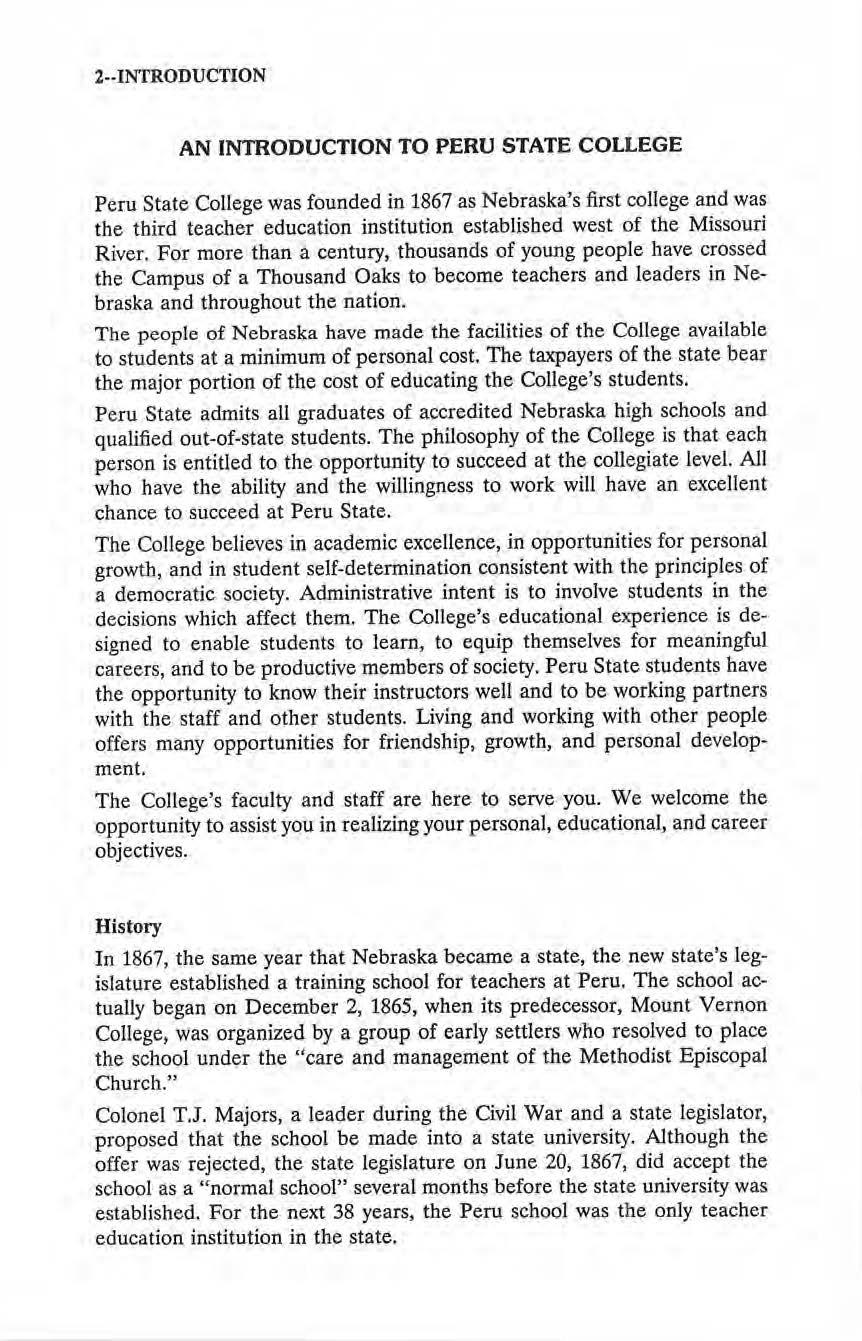
The College believes in academic excellence, in opportunities for personal growth, and in student self-determination consistent with the principles of a democratic society. Administrative intent is to involve students in the d ecisions which affect them. The College's educational experience is designed to enable students to learn, to equip themselves for meaningful careers, and to be productive members of society. Peru State students have the opportunity to know their instructors well and to be working partners with the staff and other students. Living and working with other people offers many opportunities fo r friendship, growth, and personal development.
The College's facu lty an d staff are here to serve you. We welcome the opportunity to assist you in realizing your per sonal, educational, and career objectives.
History
In 1867, the same year that Nebraska became a state, the new state's leg.islature established a training school for teacher s at Peru. The school actually began on December 2, 1865, when its predecessor, Mount Vernon Colleget was organized by a group of early settlers who resolved to place the school under the ''care and management of the Methodist Episcopal Church."
Colonel T.J. Majors, a leader during the Civi l Wat and a state legislator, proposed that the school be made into a state university . Although the offer was· rejected, the state legislature on June 20, 1867, did accept the school as a "normal school" several mon t hs before the state university was established. For the next 38 years, the Peru school was the only teacher education institution in the state.
2--INTRODUCTION
As Nebraska's population increased, the legislature extended the normal schools from a two-year to a four-year institution and authorized them to grant the degrees of Bachelor of Arts in Education, Bachelor of Science in Education, and Bachelor of Fine Arts in Education. At the same time, the name of the school was changed from State Normal School to State Teachers College. In 1963, P eru's name was changed to Peru State College. When the United States entered World War II , the College trained officers for the armed forces. The first unit of men in the Navy's V-12 program arrived on campus July 1, 1943. During that time nearly 500 servicemen received their training. The College operated an accelerate d program for both civilian students and naval trainees. Since th en, many of the trainees have used the hours of college credit they earned to complete their degrees at P eru State or other institutions of higher learning throughout t h e nation. In 1949, the legislature authorized the Nebraska State Colleges to confer the Bachelor of Arts degree. The Bachelor of Science degree was authorized in 1965. Emerging from its role as a single-purpose teachers college, the College is now a regional state college offering a wide variety of programs to meet the changing needs of southeast Nebraska and beyond.
Philosophy
Peru State College is committed to the belief that all persons are endowed with potential which, if developed, will benefit both the individual and the society. Each person, who is exposed to the influences of the College, is encouraged to develop his or her potential as well as understand and appreciate the contributions of others.
Individual development can be accomplished through formal study and exposure to a variety of experiences both on and off campus It is the resu lt of the reasonable mastery of knowledge, acquisition of certain skills and techniques, appreciation and understanding of areas beyond narrow persona l interests, and meaningful religious and social experiences.
Mission
Peru State College is a multi-purpose, state-assisted, regional institution offering a variety of educational opportunities to th.e students of Nebraska and the nation. Founded in 1867 as Peru Normal School, the College is accredited by the North Central Association of Colleges and Schools a nd the National Council for Accreditation of Teach er Education.
Peru State is committed to providing high quality instruction, personalized attention, and a supportive learning environment for students of diverse abilities. Its principal baccalaureate programs in teacher education, business, and the liberal arts and sciences are complimented by numerous preprofess ional, occupational, and continuing education programs. A Masters

INTRODUCfION--3
degree in Education emphasizing the innovative instructional technologies avaUable to non-urban teachers is also offered.
The College believes in a strong, coherent general education program des igned to ensure th at its graduates: 1) can write, speak, and compute effectively, 2) are computer liter ate, 3) can think critically and independently, 4 ) are open to and have the capacity for change, 5) are prepared to assume their social and civic roles as leaders in an increasingly interdependent world, and 6) are equipped to pursue lives that are intellectually, ethically, a esthetically, and physically rewarding.
Students are encouraged to participate in a balanced program of co-curricu lar activities. These group or individual activities include cultural, social, and physical pursuits which augment or support the instructional program, sustain tradition, and strengthen the college community.
The College is committed to continuing and enhancing its role as -a center for r egional developme nt. Through its cultural, educational, research and public service efforts, Peru State assists other institutions and agencies in community and "economic d e velopment for the benefit of all.
Goals
In order to fulfill its mission, Peru State has established the following goals :

* To increase the quality and diversity of programs to persons with differing aptitudes, interests, and needs.
* To intensify its milieu of academic excellence.
* To enhance the intellectual cooperation between the liberal and applied arts.
* To promote the involvement of both students and faculty in experimental and creative research.
* To strive to be a more effective public se rvice institut ion.
* To offe r continuing and occupational education for personal and career enrichment.
* To explore new and creative e ducational opportunities for students.
* To serve as a transitional educational institution for students pursuing various occupational or professional objectives.
* To prepare students to be contr ibuting members of a democratic society.
* To enhance student development outside the classroom.
4--INTRODUCTION
Memberships and Accreditations
Peru State College is accredited by the Commission on Institutions of the North Central Association of Colleges and Schools and by the National Council for Accreditation of Teacher Education. Full membership is maintained in the American Association of Colleges for Teacher Education and the American Council on Education. The College also is a charter member of the Nebraska Council on Teacher Education.

INTRODUCTION--5
UNDERGRADUATE D EGREE AND PROGRAM INFORMATI ON
Peru State College is supported by the State of Nebraska for the purpose of meeting the postrsecondary educational needs of its citizens. The College is a multipurpose, regional institution offe r ing a variety of programs in teacher education, the liberal arts, science, business and selected occupations that culminate in several degree options. The College also provides instructional programs at extension s ites throughout south o ast Nebraska
Degree a nd Progra m Sel ection
The programs offered by the College include four-year professional curricula in elementary and secondary education, a four-year liberal arts program , a flexible bachelor of science program, and a number of preprofessional curricula.
Each program at the College consists of general studies courses and specialized courses, The general studies courses are important to effective living for all persons regardless of their vocations. The specialized courses prepare an individual for a specific occupation, or satisfy a particular avocational or cultural interest.
Upon enrolling, students select a program and degree objective which dete rmines their curriculum and academic advisor.
This choice may be tentative and changed later. Students who desire special assistance in selecting a program may request counseling from their academic advisor or the D irector of Cooperative Education and Career Services
Degrees
Peru State College is authorized by law and the rules of the Board of Trustees of the Nebraska State Colleges to issue the following undergraduate degrees:

Bac he lor of Arts i n Education (B.A. in Educ.)
This de gree is awarded to candidates whose major area is Art, Social Sci, ences or Language Arts. (A f..; e.l J. o"" t-wa -"lil.bJ <?1;t €;n#t,r-( li!,M l! , t ..i,)
Ba c he lo r of F in e A rts in E du cati on (B.F.A. in Educ.)
This degree is awarded to candidates whose major area of concentration is Music Education.
Bachelor of S ci e nce in Edncatio n (B.S. in Educ.)
This degree is awarded to candidates whose major area is~HeaJth and Physical Education, I ndustrial Technology Education, Mathematics, Science, E lementary Education,, ,~: fhysicaJ Education. (A elO- orr f w·o ~v\. ~-le .. t e, 1,, &()r~.JM'\~ ' )
6--DEGREE AND PROGRAM INFORMATION
Bachelor of Arts (BA.)
This degree is awarded to candidates who may elect any major. Candidates must complete additional general studies requirements (see page 12), which do not include professional teacher education requirements.
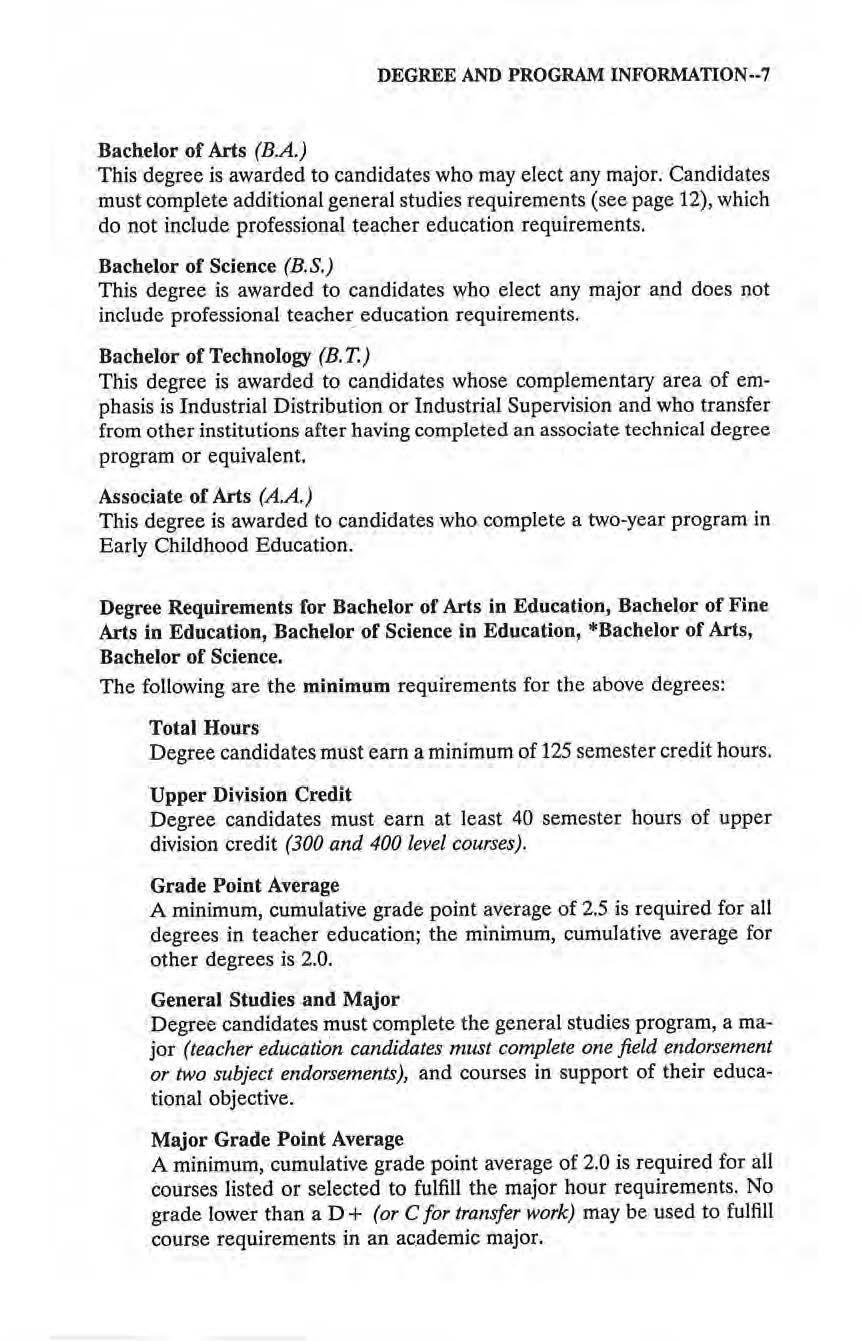
Bachelor of Science (B.S.)
This degree is awarded to candidates wbo e lect any major and does not include professional teacher _ educat ion requirements.
Bachelor of Technology (B. T.)
This degree is awarded to candidates whose complementary area of emphasis is Industrial Distribution or Industrial Supervision and who transfer from other institutions after having completed an associate technical degree program or equivalent.
Associate of Arts (AA.)
This degree is awarded to candidates who complete a two-year program in Early Childhood Ed ucation.
Degree Requirements for Bachelor of Arts in Education, Bachelor of Fine Arts in Education, Bachelor of Science in Education, *Bachelor of Arts, Bachelor of Science.
The fo llowing are the minimum requirements for the above degrees:
Total Hours
Degree candidates must earn a minimum of 125 semester credit hours.
Upper Division Credit
Degree candidates must earn at least 40 semester hours of upper division credit (300 and 400 level courses) .
Grade Point Average
A minimum, cumulative grade point average of2.5 is required for all degrees in teacher education; the minimum, cumulative average for other degrees is 2.0.
General Studies and Major
Degree candidates must complete the general studies program, a major (teacher education candidates must complete one field endorsement or two subject endorsements), and courses in support of their educational objective.
Major Grade Point Average
A minimum, cumulative grade point average of 2.0 is required for all courses listed or selected to fulfill the major hour requirements. No grade lower than a D + (or C for transfer work) may be used to fulfill course requirements in an ac ademic major.
DEGREE AND PROGRAM INFORMATION--7
Peru State Cred i ts
A minimum of 30 semester hours must be earned from Peru State College.
Resident Credits
A minimum of 24 of the last 30 semester hours must be earned in residence. This requirement may be waived by the Academic Affairs Commission in cases where any of the required resident credit is earned at another Nebraska state college or where official cooperative agreements with other institutions exist.
Normal Progress
Students are required to maintain normal progress which is defined as completing all degree requirements withfo seven years of th e time they are admitted to the College to pursue an academic program. (This is different from allowing an individual to enroll in a class.) When normal progress is not maintained, students will follow the program requirements of the current catalog.

Co11ege Survival Skills
College 100 - A one semester hour course is required of all on-campus, undergraduate, degree seeking students. Waived for transfer students who have completed at least thirty (30) semester hours prior to term of admission. Waived for readmitted students who have not maintained normal progress and who completed at least thirty semester hours.
*Additional Degree Requirements for Bachelor of Arts
The Bachelor of Arts degree requires the following additional coursework
10 semester hours of a modern foreign language or 10 semester hours of upper division credit outside of the student's major in an area of st udy approved by the appropriate Division Chairperson.
6 semester hours of Mathematics or 6 hours of Psychology.
Political Science 201 and 9 semester hours from History 113, 114, 201 , 202, or Sociology 201.
Degree Requirements for Bachelor of Technology
The following are , the minimum requirements for the Bachelor of Technology degree:
Prerequisites
Degree candidates must have a technical associate degree from a regionally accredited institution or its equivalent. Students who have completed technical programs of less than two years will be required
8--DEGREE AND PROGRAM INFORMATION
to take additional technical coursework that is equivalent to an associate degree program. The additional work may be taken at a community college or other applicable institution, but must be approved by the Chairperson of the B~ iness Division at Peru State College.
Total Hours
D egree candidates must earn a minimum of 125 semester credit hours. A minimum of 59 semester hours are to be completed through accredited institutions authorized to grant a baccalaureate or higher degree. A minimum of 30 semester hours must be Peru State College ). instruction, I, CI...\~ fl ,S bI t ck Iw (,,l e.,;... lM\1. tt I'5 t) °'fl\t · .t . f.c'..!:io, t-i .t tv., , \.~u.~ <'.,11-4,..I,: .P1~A,J. uiLa1·.. l_.)\.~..sUpper Division Credit /~ul¼ <y"t'qN- ..1 Iv~. Degree candidates must earn at le ast 20 semester credit hours ol 300 level (or higher) coursework.
Grade Point Average
A minimum, cumulative grade point average of 2. 0 is required for all coursework completed at Peru State.
The Bachelor of Technology degree is designed for transfer students who have an associate degree or its equivalent and a technical major. The degree is flexible enough to accommodate the transfer student who meets the following additional requirements:
Transfer Students with an Associate Degree
General Studies
Thirty semester credit hours are required. At least 3 hours must be l ted from each area listed below and no more than 9 hours of the tal can be in any one area. Courses se lected must be exclusive o ose completed for the area of emphasis. Courses selected are to be those listed in the General Studies Program required of all s tudents seeking a Bachelor's degree.
English Composition
Mathematics/Science/Computer Sci ence

Speech Literature/Fine Arts (Art, Theater, Music)
Social and Behavioral Science Health and Hygiene/P.E. Activities
Complementary Emphasis
A minimum of 30 semester credit hours in an emphasis is required with a minimum cumulative grade point average of 2.0. No grade lower than a D + (C for transfer work) may be used to fulfill requirements within the area.
DEGREE AND PROGRAM INFORMATION--9
Technical Emphasis
Sixty-sL't semester hours of credit from the technical associate degree is the maximum applicable toward the 125 hours required for the Bachelor of Technology degree. Credit hours cannot be used to fulipl the General Studies or complementary area of emphasis.
Directed Elec tives
Additional hours are selected from general studies courses beyond the required 30 semester hours, courses supportive of the tech ni cal or complementary emphasis, or others in consultation with an advisor.
Degree Regulations .,, v~
In addition to the above degree requirements, the follo:ing regulations apply to Peru State bachelor degrees:
Extra-institutional Credits
The semester credit hours awarded through the College's approved procedures for determining extra-institutional learning are considered transfer credits. Unless otherwise specified, a maximum of 66 transfer credits, awarded either individually or collectively, via extra-institutional procedures, may be applied toward the 125 credit hour minimum required for a bachelor's degree.
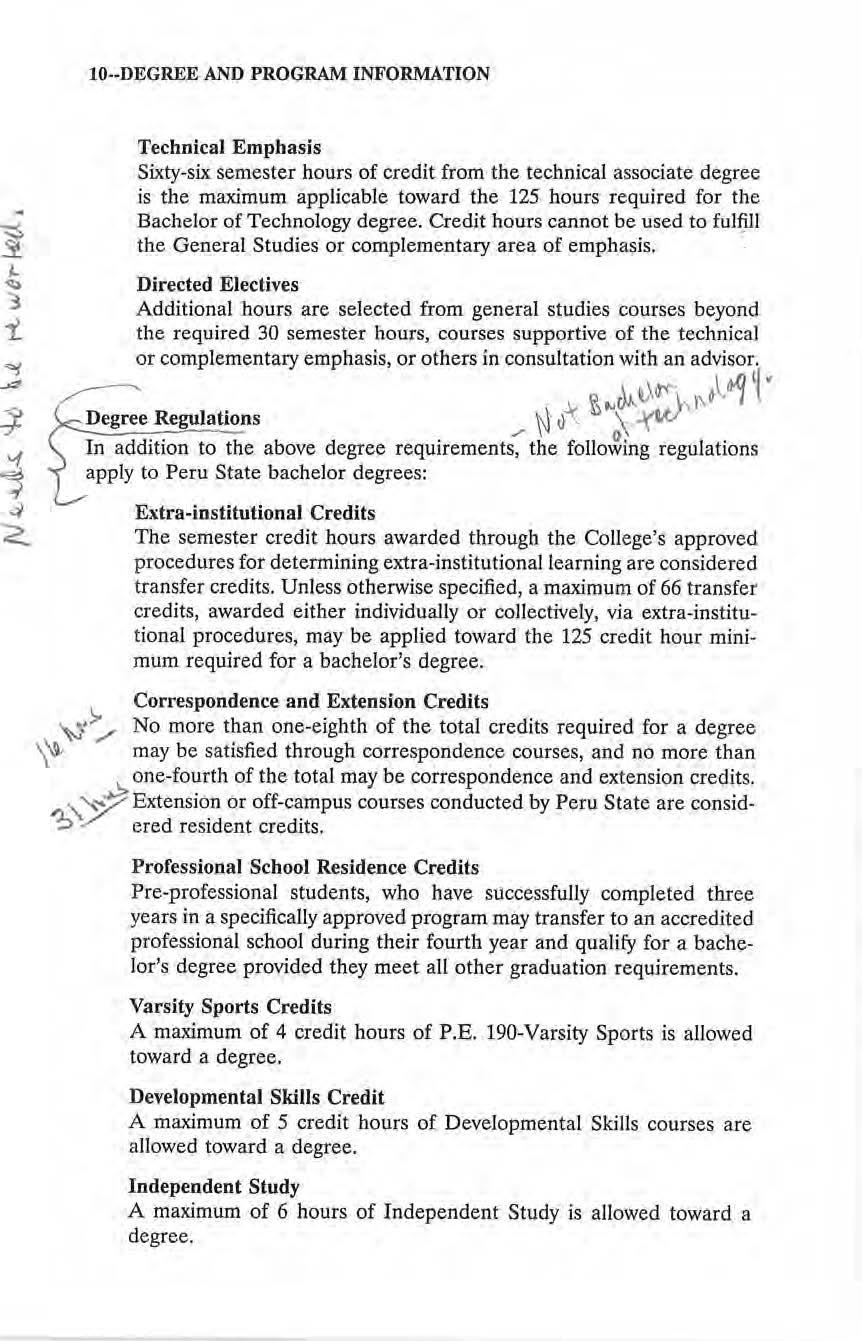
Correspond ence and Extension Credits
"-1' ~ No more than one-eighth of the total credits required for a degree \~ may be s a tisfied through correspondence courses, and no more than one-fourth of the total may be corr espondence and extension credits.
Extension or off-campus cours es co nducted by Peru State are considerect resident credits.
Profess ion al Sc hool Residence Credits
Pre-professional students, who have successfully completed three years in a specifically approved program may transfer to an accredit ed professional school during their fourth year and qualify for a bachelor's degree provided they meet all other graduation requirements.
Varsity Sports Cred its
A maximum of 4 credit hours of P.E. 190-Varsity Sports is allowed toward a degree.
Developmental Skills Credit
A maximum of 5 credit hours of Developmental Skills courses are allowed toward a degree.
Independent Study
A maximum of 6 hours of Independent Study is allowed toward a degree.
10--DEGREE AND PROGRAM INFORMATION
i
i,~V'f 'I~
tJr)k v~ l ,
-\'W
if
Cooperative Education
A maximum of 16 hours of Cooperative Education internship credit is allowed toward a degree. Primarily, the hours earned will be noted as general electives. In certain majors, there are some limitations placed on the number of hours that may be applied to that major.
Application for Degree
Peru State College has three graduation dates: December, May and summer. D egree candidates, upon enrolling for their final coursework must co mplete a degree application through the Registrar's Office.
Th e application must be completed within the first five,. \Y.es:i¥s semester or within the first two weeks of the .first summe~iudents are expecte d to have completed all degree requirements on or before the planned date of graduation. Decemb er graduates r ece ive a statement of completion. Diplomas are given at the subsequent May graduation.

Second Undergraduate Degree
Students apply for only one undergraduate degree. If, because of certajn specific academic programs it appears the student can qualify for more than one degree, the student must determine the degree for which they wiII apply
An additional undergraduate degree may be obtained by completing at least 30 semester hours of credit beyond the total hours recorded when qualifying for the previous baccalaureate degree. All prescribed requirements for the degree must be successfully completed.
Individuals will follow the academic requirements of the college catalog in effect at the time of their readmission to pursue the additional degree .
GENERAL STUDIES PROGRAM
The purpose of the general studies program at Peru State is to prepare the student for advanced college work as well as for life long learning. The general studies program consists of specific courses that are designed to ass ist the student in acquiring the intellectual foundation that will last for a lifetime of learning. -
The objective of the general studies program is established in the Role and Mission statement. This statement requires that our graduates "1) can write, spea k, and compute effectively, 2) are computer literate, 3) can think critical ly and independently, 4) are open to and have the capacity for change, 5) are prepared to assume th ei r social and civic roles as leaders in an increasingly interdependent world, and 6) are equipped to pursue lives that are intellectually, ethically, aesthetically, and physically rewardin g." Below is the actual program designed to meet the above objectives.
DEGREE AND PROGRAM INFORMATION--11
AND PROGRAM INFORMATION
General Studies Courses

must complete a course in both A and B)
must have a lab component and students must complete a course
12--DEGREE
Busic Skill s •
Methcmotlcs (Students
A. General Mathematics• Choose One Math 110 Elements of Mathematics. or Math 125 P r ecalculus or 1 7-23 h o urs 5-8 hours Total .3 5 Math 225 Calculus with Analytic Geometry 5 Students who rank at
or SAT test may waive
ll0. B. Statistics • Choose One Marh 111 Elements of Statistics 2 or Math 340 Statistics Computer Science CSci JOO Intro to Computer Application or CSci 102 1.ntro to Computer Conce p ts and .3 3-6 hours Total .3 .3 Bos 229 Software App.lications • 3 Composltlun • • • • • • 6 hours Total Eng 101 English Composition 3 Eng 201 Advanced English Composition 3 Srudents who rank at
m SAT tests may waive the
Eng 101. Speech 3 hours Total Speh 152 Fllndamcntals of Speech . . . . . . . . . . . . . . . . . . . . . . . . . . . 3 P erspectives Area: .28-30 hours Science (one course
in
A and 13) . . . . . . . . . . . . . . . . . . . 6 -8 hours Total A, Physlcnl S cie nce • 3 h o urs C h em 101 General Cheinistry 4• GSci 206 .Principle s of ,Physical Scien ce 3 GSci 232 Energy 3 Phys 206 Great ldeas in Astronomy 3• B. Lire Science .3 hours Biol 101 Introductory Botany 4• Biol 102 Introductory Zoology 4 • GSci 205 Biological Science , • 3 • HP 205 Scien ce and Society . . 3 ('Courses contain a lab component) Literature , , Eng 202 Appreciation of Literature Eng 325 American Literature ll . . . . . . . . .. , . . . . . . . . .. , HP 101 20th Century Issues/Literary Style • Aesthetics Art 206 Art Appreciation • HP 201 Making Sense: Art in the World Mus 211 Music Appreciation Speh 232 Introduction to Theatre NonWestern Studies , Eng223 NonWcstcrn Li terature Hist 25 1 Modern Africa HP 204 Con temporary Asian Culture HP 212 Introduction 10 NonWestern Music Western Stud ies Hist 201 World Civilization to 1500 . . Hist 202 World Civilization after 1500 H P 400 Ethics and Social Justice American Studies Hist 113 U.S. History before 1865 Hist 114 U.S. History after 1865 .3 hours Total .3 •• •.. 3 3 .3 hours Tota l 3 3 .3 • 3 .3 hours Total : 3 .J 3 ' 3 3 hours T ota l .3 3 • 3 .3 h ours Total • 3 • 3
,
the 85th percentile or h igher on the math ematics section of the ACT
the th ree hour mathematics requirement Math
the 85th percentile or higher on the English section of the ACT
first course of the composition s k:ills requirement
both
Developmental Studies Program
The Developmental Studies program is designed to assist students in reaching their educational objectives. The program is concentrated in three areas that most often impact student success: English composition, mathematics and reading,
Placement in Developmental Studies is through the Computer Placement T est (CPT) which is required of all students e ntering P eru State College with fewer than 30 hours of college work and ACT scores lower than 20 in Re ading, 21 in sentence composition and 21 in mathematics.
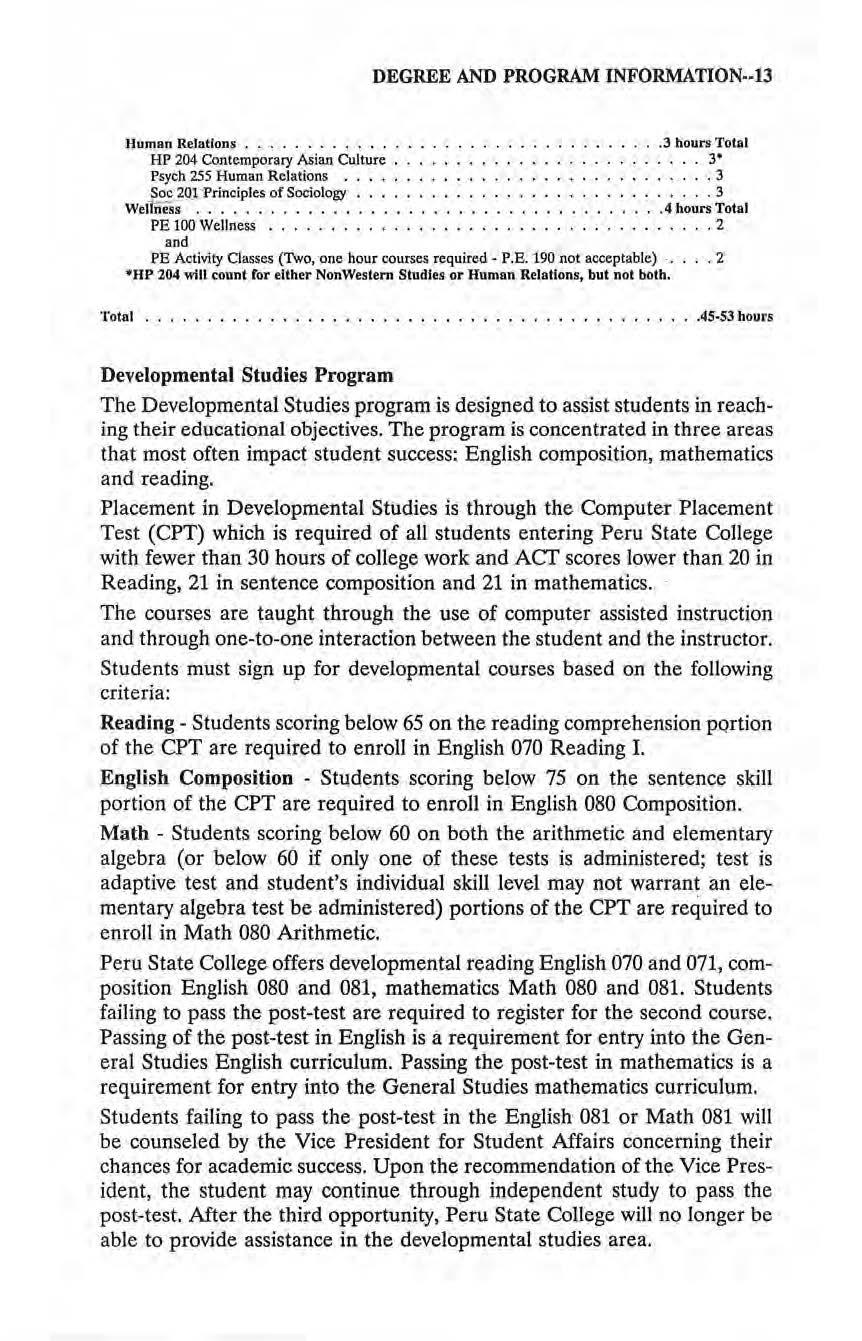
The courses are taught through the use of computer assisted instruction and through one-to-one interaction between the student and the instructor.
Students must sign up for developmental courses based on the following cr iteria:
Reading - Students scoring below 65 on the reading comprehension portion of the CPT are required to enroll in English 070 Reading I.
English Composition
• Students scoring below 75 on the sentence skill portion of the CPT are required to enroll in English 080 Composition.
Math - Students scoring below 60 on both the arithmetic and elementary algebra (or below 60 if only one of these tests is administered; test is adaptive test and student's individual ski ll level may not warrant an elementary algebra test be administered) portions of the CPT are required to enroll in Math 080 Arithmetic.
Peru State College offers developmental reading English 070 and 071, composition English 080 and 081, mathematics Math 080 and 081. Students failing to pass the post-test are required to register for the second course. Passing of the post-test in English is a requirement for entry into the General Studies English curriculum. Passing the post-test in mathematics is a requirement for entry into the General Studies mathematics curriculum.
Students failing to pass the post-test in the English 081 or Math 081 will be counseled by the Vice President for Student Affairs concerning their chances for academic success. Upon the recommendation of the Vice President, the student may continue through independent study to pass the post-test. After the third opportunity, Peru State College will no longer b e able to provide assistance in the developmental studies area .
DEGREE AND PROGRAM INFORMATION- -13 Human Relations • , 3 hours Total HP 204 Contemporary Asia.n CuJture , .•. , 3 • Psych 255 Ruman Relations , • • 3 Soc 20_l'Prinoiplcs of Sociology • • , • , • , 3 Weitniss · , , , , 4 hours Total PE 100 Wellness , 2 and PE Activity Classes (Too, one hour courses required - P.B. 190 not acceptable) • • 2 *HP 204 will count ror either NonWestern Studies or Human Relations, but not both. Total .•.... , • • • • • • • • 4S-53 hours
AND PROGRAM INFORMATION
Pre-Professional Programs
The entrance requirements of most professional schools require programs of general studies which vary only slightly from one profession to another. T hese programs usually require two years or more of study. Since sucll work is also requ ir ed in the professional curriculum of teachers, Peru State's general studies program meets the pre-professional needs of prospective doctors, dentists, pharmacists, optometrists, nurses, veterinar ians, lawyers, engineers, agriculturists, foresters, morticians, business executives, journalists, and others. Students following a pre-professional program are urged to check the catalogs of professional schools so tha t specific entrance requirements can be met at Peru State.
Semi -Profes s ional Programs
Students who wish to p r epare for occupations that requ ire less than four years of preparation will find a variety of educational opportunities at Peru State. There are increasing opportunities in the occupational area classified as semi-professional. Students inter ested in this area shou ld know the transfer requirements of particular professional or technical schools so that a parallel program of coursework-can be developed a t Peru State.
General Agricultural Transfer Program
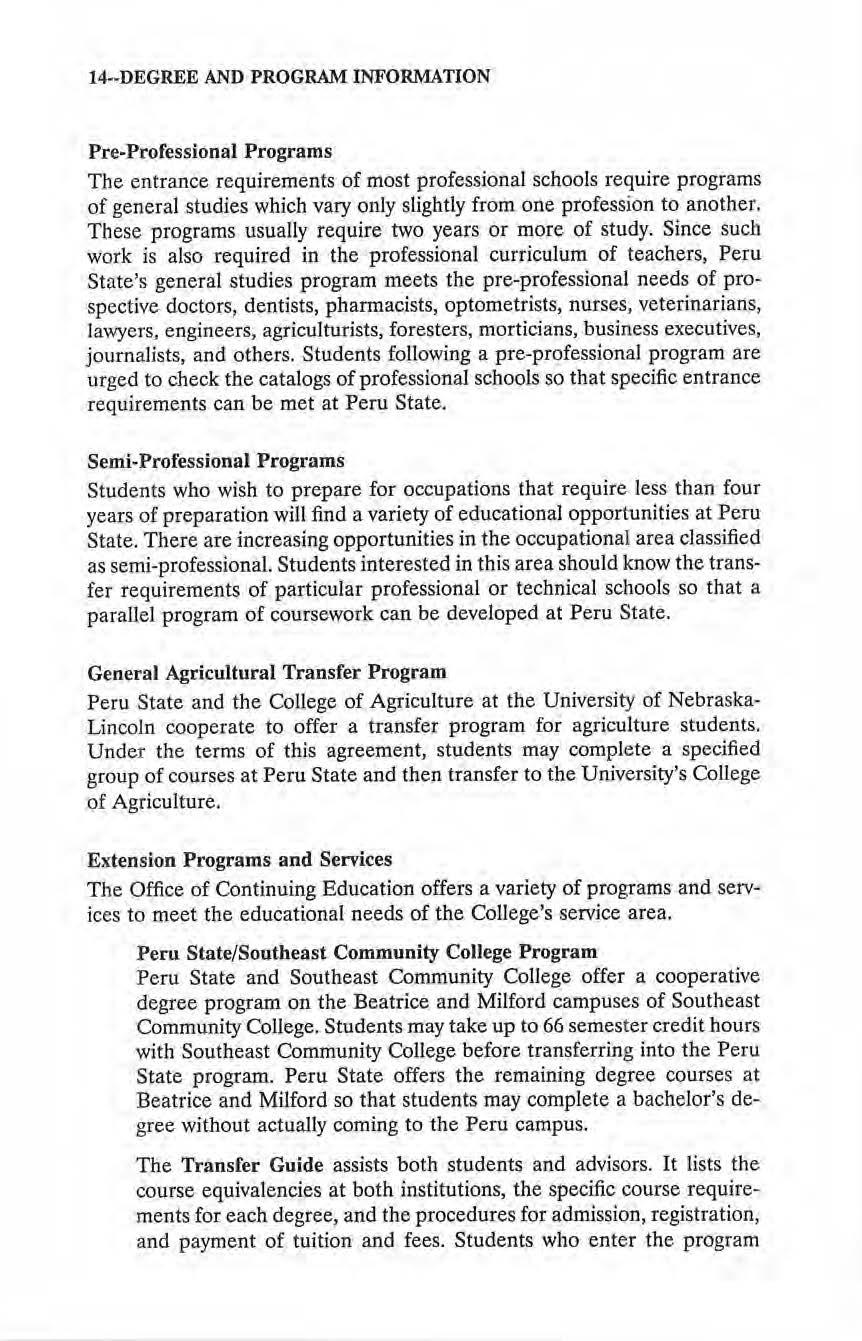
Peru State and the College of A griculture at the University of NebraskaLincoln cooperate to offer a transfer program for agricu lture students. Under the terms of this agreement, students may complete a specified group of courses at Peru State and then transfer to the University's College of Agriculture.
Extension Programs and Services
The Office of Continuing Educat ion offers a variety of programs and services to meet the educational needs of the College's service area.
Peru State/Southeast Community Coll ege P rogram
Peru State and Southeast Community Coll ege offer a cooperative degree program on the Beatrice and Milford campuses of Southeast Community College. Students may take up to 66 semester credi t hours with Southeast Community College before transferring into the Peru State program. Peru State offers the remaining degree courses at B eatrice and Milford so that students may complete a bachelor's degree without actually com ing to the Peru campus.
The Transfer Guide assists both stude nts and advisors. It lists the co urse equivalencies at both institutions, the specific course r equirements for each degree, and the procedures for admission, registration, and payment of tuition and fees . Students who enter the program
14--DEGREE
with a s ignificant amount of credit toward their major will have their transcripts reviewed by t he appropriate Division Chairperson, in consultation with the Vice President for Academic Affairs, to determine if a possib le 6-15 credit hours of designated coursework in the major is required.
Peru State/Offutt Air Force Base
In cooperation with the Offutt Air Force Base Education Office, P eru State offers courses leading to the Associate of Arts degree in Early Childhood Education, bachelor degrees in elementary and secondary education for teacher certification, and the Bachelor of Technology degree.
Extension Sites
Individual extension sites are located throughout the College's service area. Courses are offered at these sites in response to community or group needs, While most are academic credit courses, continuing professional education courses for relicensure or upgrading as well as some non-credit courses are offered. The specific li sting of courses and their locations is printed each Fall, Spring, and Summer. lnquiri es about classes throughout the region should be directed to the Office of Continu in g Education.
Summer Session
The College offers a Summer Session beginning around the first of June and running through the end of July. Courses are offere d for five and e ight weeks as well as in workshop formats of one to three weeks.
Graduate Programs
P eru State offers a master's degree in Education that emphasizes teaching in non-urban schools and the application of instructional technology. I nterested students should contact the Dean of Graduate Studies.
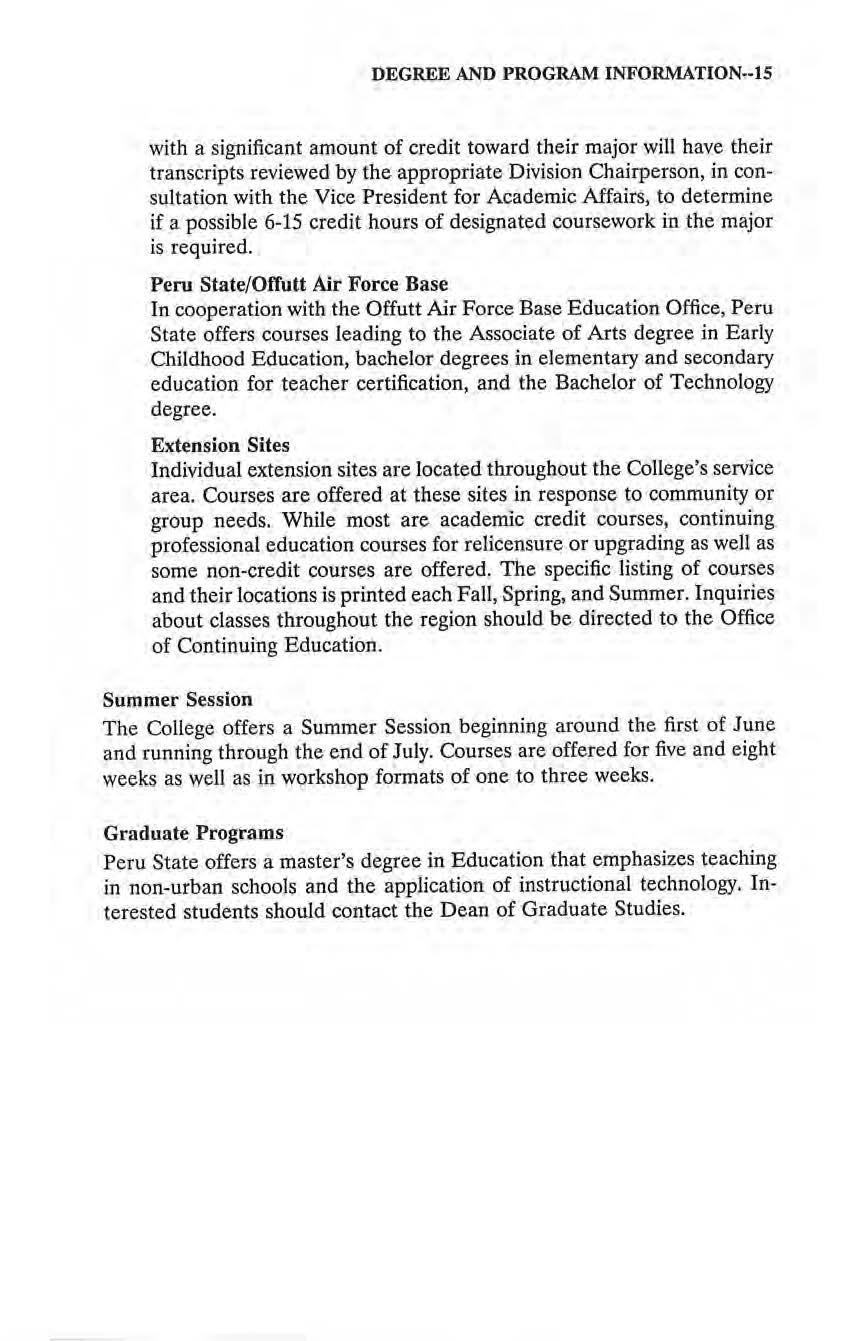
DEGREE AND PROGRAM INFORMATION--15
DMSION OF BUSINESS
James E. Thomas, Chairperson
Professors: Snyder, Thomas
Associate Professors: Jacobs, Mowbray
Assistant Professors: Beldin, Hamilton~ Lewellen, Ruck
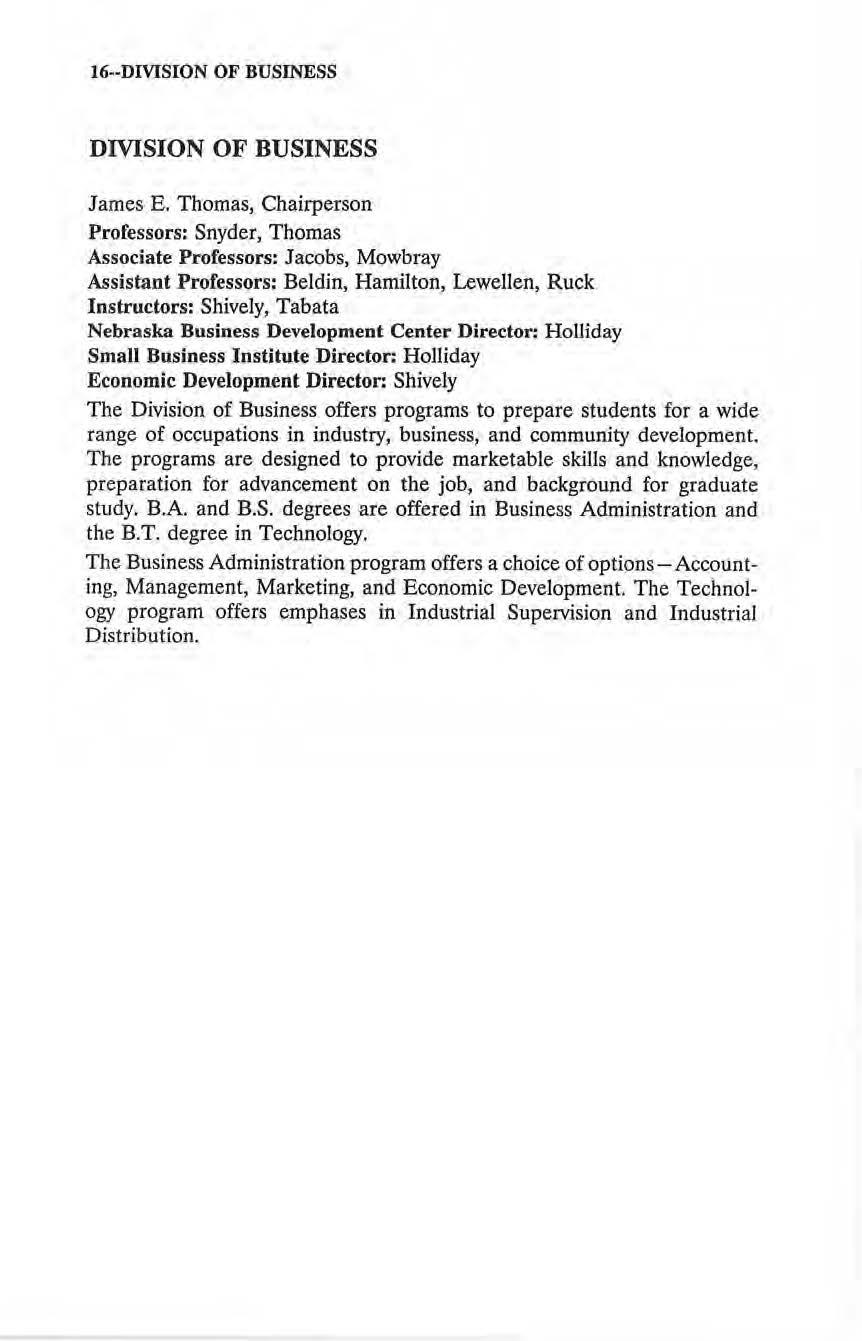
Instructors: Shively, Tabata
Nebraska Business Development Center D irector: Holliday
Small Business Institute Director: Holliday
Economic Devel opment Director: Shively
The Division of Business offers programs to prepare students for a wide range of occupations in industry, business, and community development. The programs are designed to provide marketable skills and knowledge, preparation for advancement on the job, and background for graduate study. B.A. and B.S. degrees are offered in Business Administration and the B.T. degree in Technology.
The Business Administration program offers a choice of options-Accounting, Management, Marketing, and Economic Development. The Technology program offers emphases in Industrial Supervision and IndustriaJ
Distribution.
16--DMSION OF BUSINESS
BUSINESS PREMAJOR AND BUSINESS CORE
Business

lBUSINESS CORE
DMSCON OF BUSINESS--17
majors should complete the business premajor core before the business core and the option.
CSci 102 ..3 Introduction to Computer Concepts Math 125 S Precalculus Math Math 340 3 Statistics Econ 220 .3 Principles of Macroeconomics Econ 221 3 Princip l es of Microeconomics Bus 229 3 Software Applications Bus 231 3 Princip l es of Financia l Accounting Bus 232 Principles of Managerial Accounting Bus 251 .3 Legal Environment and Contract Law
BUSINESS PREMAJOR
Bus 301 3 Organizational Communications Bus 328 3 Principles of Market in g Bus 335 J Production/Operations Management Bus 339 Business Finance Bus 373 3 Organizational Behavior Bus 495 3 Business Policy (Last Semester) MANAGEMENT
ECONOMIC ACCOUNTING OPTION
DEVELOPMENT
d, I ~ , OPTION )<{ d-7
MARKETING
OPTION
OPTION
Business Administration - Accounting Option

The Accounting option prepares graduates for several high demand careers in financial occupations. Coursework is designed to prepare students to take the CPA examination.
(Only 3 hours of Bus. 441 , Internship, may count toward th e Management option.)
* The following courses are excluded: Bus. 215, 325, 333, 334, and 425.
18--DIVISION OF BUSINESS
Requirements for Accounting Option Hours Bus 337 Intermediate Accounting I 3 Bus 338 lntermediate Accounting II 3 Bus 341 Federal I ncome Truces - Individual 3 Bus 351 Commercial Law 3 Bus 371 Cost/Managerial Accounting I 3 Bus 372 Cost/Managerial Accounting II 3 Bus 450 Advanced Accounting I 3 Bus 451 Advanced Accounting II 3 Bus 470 Auditing Principles 3 Total 27 Business Administration - Management Option The Management option offers a general business
and
graduates for entry and mid-level management positions Bus Bus Bus Bus Requirements for Management Option 351 353 433 434 Commercial Law Organizational Ethics Administrative Management Hours 3 3 3 Human Resources Managemen t Business/Economics/Computer Electives* 3 9 Total 21
approach
prepares
Business Administration • Marketing Option
The Marketing option prepares gradu ates for high demand career s in marketing and sales.
Business Administration - Economic Development Option
The Economic D evelopment option prepares studen ts for fulltime emp loyment in the rapidly growing economic development profession I t also prepares graduates to serve t h eir communities in a volunteer leader ship capacity, whatever their occupations.
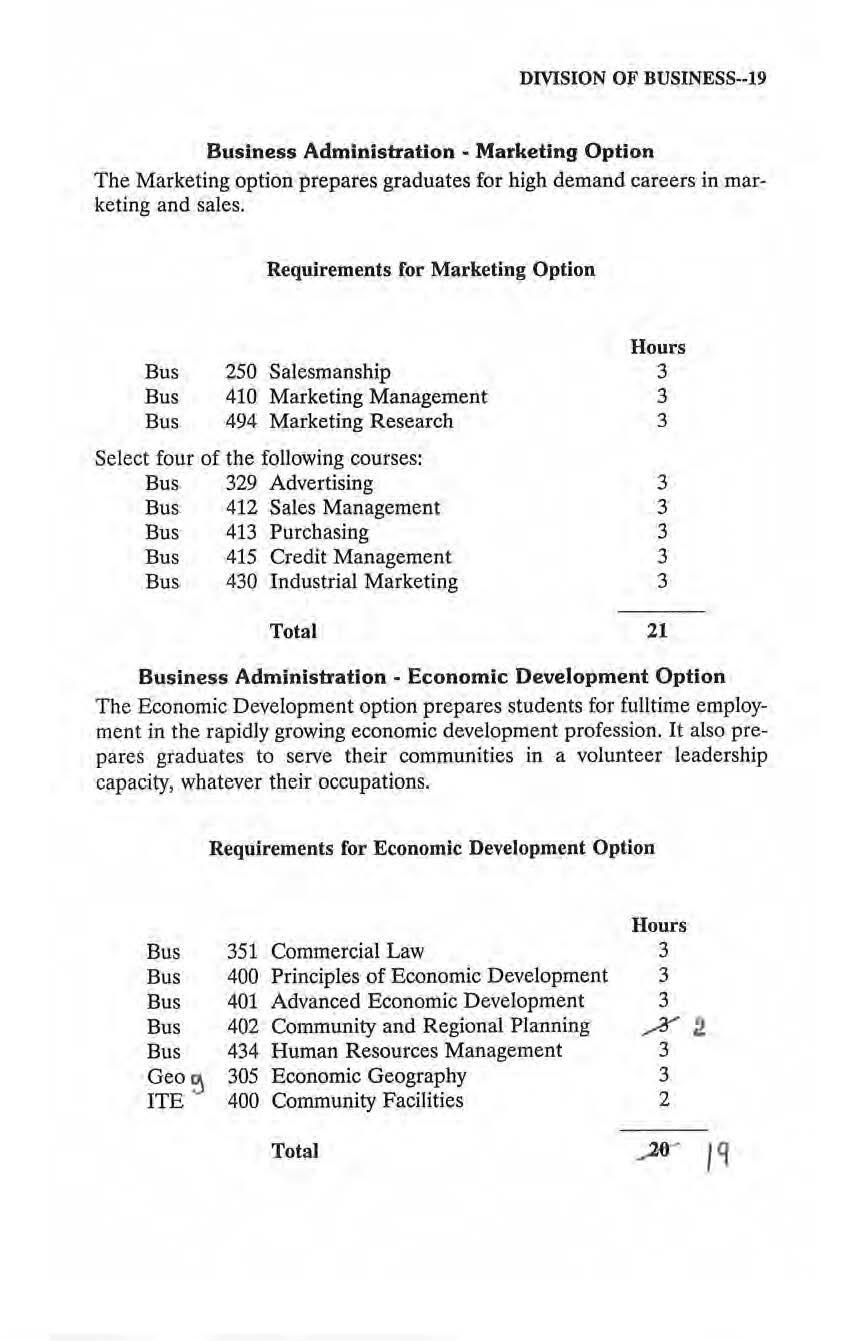
DMSION OF BUSINESS--19
Bus Bus Bus Require ments for Marketing Option 250 Salesmanship 410 Marketing Management 494 Marketing Research Select four of the following courses: Bus 329 Advertising Bus 412 Sales Management Bus 413 Purchasing Bus 415 Credit Management Bus 430 Industrial M arketing Total Hours 3 3 3 3 3 3 3 3 21
Requirements for Economic Dev elopment Option Hours Bus 351 Commercia l L aw 3 Bus 400 Principles of Economic Development 3 Bus 401 Advanced Economic Development 3 Bus 402 Community and Regional Planning ,% :l Bus 434 Hum an Resources Management 3 Geo 13 305 Economic Geography 3 ITE 400 Community FaciJities 2 Total ....20- / 9
Bache lor of technology majors should complete the technology core before the option.

20--DMSION OF BUSINESS BACHELOR OF TECHNOLOGY CORE
Bus Bus Bus Bus Bus BACHELOR OF TECHNOLOGY CORE Software Applications Principles of Financial Accounting Principles of Marketing Organizational Behavior 229 231 328 373 413 Purchasing , \'J INDUSTRIAL DISTRIBUTlON INDUSTRIAL SUPERVISION OPTION OPTION \~
Technology • Industrial Supervision Emphasis
Th e Industrial Supervision emphasis requires a technical associate degree or equivalent and prepares graduates for entry level management careers in the technical emphasis. The equivalent coursework offered at Offutt AFB has a MGT prefix. Technology majors are not required to take the business premajor or business core.

Technology • Industrial Distribution Emphasis
Tbe Industrial Distribution emphasis requires a technical associate degree or equivalent and prepares graduates for a variety of marketing careers in the technical emphasis. Technology majors are not required to take the business premajor or business core.
DMSION OF BUSlNESS--21
Requirements for Industrial Supervision Emphasis Hours Bus 414 Supeivisory Problems 3 Bus 434 Hum an Resources Management 3 Bus 435 Supeivisory Strategies 3 Bus 441 Industrial Supervisory Internship 3 Econ 375 Labor and Industrial R elations 3 Total 15
Requirements for Industrial Distribution Emphasis Hours Bus 250 Salesmanship 3 Bus 410 Marketing Management 3 Bus 411 Marketing Strategies 3 Bus 430 Industrial Marketing 3 Bus 441 Industrial Distribution Internship 3 Total 15
Bachelor
of Technology Degree Pi;ogram

~J. Q ~,;,/ Offutt~ Base
, t e Bachelor of Technology-Management Option is designed to meet the
·J..! needs of Air Force personnel. Civilians may also e lect t h e Management £5 Option and attend the Offutt program. Some restrictions apply. Call 1-402293-1764 for more information.
This degree requ~res completio~ of a transfer two yea:,technical associate degree and a rnmlttlum of 30 resident management option hours. (27 of the 30 h ours must be core courses.)
* Required for degree with minimum 2-hour Statistics prerequisite for Mgt. 440K.
22--D~IVIS~~ OF BUSINESS ('!) "\)''"~ {' CJ \ -.i\'
\,.~~
Bachelor of Technology
Management Management Core Courses Select 2 7 hours from the following: Ho urs Mgt 300K Economic Concepts 3 Mgt 301K Legal Concepts 3 Mgt 310K*Organizational Management 3 Mgt 320K Financial Management 3 Mgt 321 K Accounting Management 3 Mgt 330K Sales Management 3 Mgt 400K Marketing Strategies 3 Mgt 401K Marketing Management 3 Mgt 420K Administrative Management 3 Mgt 421K Human Resources Management 3 Mgt 430K Small Business Management 3 Mgt 440K" Quantitative Management 3 Mgt 441K Production/Operation Management 3 Mgt 460K Supervision Studies and Applications 3
-
Management E lective Seminars Select 3 hours from the following: Mgt 450K Stress(I'ime Management 1 Mgt 451K Effective Public Relations 1 Mgt 452K Equal Opportunity Regulations 1 Mgt 454K Effective Personnel Re lations 1 Mgt 455K OSHA Regulations 1 Mgt 457K Benefit Programs 1 Mgt 458K Entrepreneurship 1 Mgt 465K Practical Management Techniques 1 Mgt 499K Independent Study in Management 1-3 (A research report
for
elective Management hours )
Project
additional
Cou rse Descriptions

Business
215 P ers on a l Busi n ess Finance (3 hours)
This course covers fundamentals of personal finance - budgeting, home buying, banking, life insurance, auto insurance, homeowner's insurance, renter's insurance, health insurance, basic investments, income truces, and oth er consumer economic topics.
(Fall semester, odd years)
229 Softwa re Ap pli catio n s (3 hours)
Prerequisite: Keyboarding Ability
This course is an introduction to MS-DOS and IBM-based software currently used in industry. Development of proficiency using selected commercial software packages is stressed.
(Each semester; Summer session)
231 P rinciples of Fin ancia l Accoun ti ng (3 hours)
This course introduces students to the process of recording financial data and preparing period ic financial statements. The complete accounting cycle will be studied. Four hours of attendance per week is required.
(Each Fall semester)
23 2 P rin cipl es of Man agerial Account ing (3 hours)
Prerequisite: Bus. 231.
This course is a conti nuation of Bus. 231, considering the accounting process for a corporation. The student is introduced to accounting theory, financial statement ana lys is and cost accounting. Four hours of attendan ce per week is required.
(Each Spring semester)
25 0 Salesmans hip (3 hours)
Students focus on the skills a n d techniques used in selling and persuasion. The course is designed to help the student learn to sell products and ideas through a study of proven techniques used by successful salespeople.
(Each Fall semester)
251 Lega l E nvi ron ment and Co ntract Law (3 hours)
This course examines the source and origin of law and the legal system, and obligations of par ties to a contract.
(Each Fall semester)
DNISION OF BUSINESS--23
298 Special Topics in Business (1-4 hours)
Freshman-Sophomore standing.
(Offered upon demand)
301 Organizational Communications (3 hours)
Prerequisites: Speh. 152, Eng. 201. Students study the role of business letters and reports in communication and human relations and problems faced by writers of letters and reports. Other topics of study and analysis include presentational methods in formal business speaking, sa les and motivational strategies, conflict resolution, conducting successful meetings, using visual aids in the business setting, and conducting and participating in interviews.
(Each semester beginning Spring, 1993)
325 Secretarial Procedures and Communications (3 hours)

Prerequisite: Keyboarding Ability. This course will develop competencies in both the operational and manageria l functions performed by the executive secretary. Operational functions involve an in-depth study of office and secretariaJ procedures, including records management and use of the word processing machines to solve office problems. Managerial functions involve administrative secretarial skills, devoting considerable time composing various forms of business communications.
(Sprihg semester, even years)
328 Principles of Marketing (3 hours)
Students learn the buying, selling, transporting, and storing functions involved in marketing, with an introduction to retailing, wholesaling, and marketing management.
(Each Fall semester; Summer session)
329 Advertising (3 hours)
Prerequisite: Bus. 328 recommended. Students examine various advertising media, their relative costs, the ethics and regulations involved, and the techniques used.
(Each Fall semester)
331 Insurance (3 hours)
This course presents essentials of an insurable risk, uses of insurance, and a brief study of the more important types of insurance.
(Offered upon demand)
24--DIVISION OF BUSINESS
332 Investments (3 hours)
Prerequisite: Bus. 232.
This course covers the major uses of investment funds, including saving accounts in banks and other financial institutions, government bonds, corporate stocks and bonds, annuities, and real estate.
(Offered upon demand)
333 Intermediate Keyboardingffypewriting (3 hours)
Prerequisite: A beginning typewriting course. This course stresses speed and accuracy development in typewriting letters, manuscripts, tabulations, and other forms. Speed and accuracy on the 10-ke y keyboard is also an integral part of this class.
(Fall semester, even years)
334 Advanced Keyboardingffypewriting (3 hours)
Prerequisite: Bus. 333 or 40 nwpm for S minutes and 100 net strokes/ minute on the 10-key keyboard. This course is designed to develop a high d egree of proficiency in composition at the keyboard, machine transcription and production typewriting.
(Spring semester, odd years)
335 Production/Operations Management (3 hours)
Prerequisites: Bus. 232, Math 340, Econ 221. Students study the evolution of operational management and its relationship to the total enterprise. Decision making, production and plant planning, systems design, manpower planning, and control systems are considered.
(Each Fall semester)
337 Intermediate Accounting I (3 hours)

Prereq uisites: Bus. 232, Bus. 229 or Permission of Instructor. This course focuses on the problems involved in establishing sound valuations for asset, liability, and net worth items; proper reporting of financia l position an d net income is stressed.
(Each Fall semester)
338 Intermediate Accounting II (3 hours)
Prerequisites: Bus. 337, Bus. 229 or Permission of Instructor, This course is an in-depth continuation of Bus. 337 with special emphasis on long-term liabilities, intangible ass e ts , statement analysis, stockholders' equity, application of funds, and present value.
(Each Spring semester)
DMSION OF BUSINESS--25
339 Business Finance (3 hours)
Prerequ.isites: Bus. 232, Econ 220, Econ 221, Math 125 and Math 340 recommended.
Students examine the uses of funds to finance assets, internal and external sources of funds, and the costs of funds obtained from alternative sources under various conditions.
(Each semester)
341 Federal Income Taxes - Individual (3 hours)

Prerequisite : Bus. 232.
This course details federal laws, regulations, etc., as they pertain t o the income taxation of individuals. A review of the history of taxation is included. Practice in tax return preparation and problem solving is provided.
(Each Fall semester)
342 Account ing Information System s (3 hours)
Prerequisites: Bus. 232, Bus. 229 or Permission of Instructor. This course provides the student with the conceptual framework and body of knowledge required to be effective users, designers, and evaluators of accounting information systems.
(Each Fall semester)
345 Real Estate Princip les and Practices (3 hours)
Tb.is course presents real estate l aw as it affects marketing, ownership, interests, sales, leases, and agencies. The financial , marketing, and managerial aspects of real property will be introduced.
(Offered upon demand)
346 Financi al Institutions and Markets (3 hours)
Prerequisite: Econ. 220.
Students study the various institutions which constitute the Unit ed States financia l system, an analysis of financial markets, and study of interest rate determination.
(Offered upon demand)
351 Commercia l Law (3 hours)
Prerequisite: Bus 251.
This course covers lega l principles covering sa les co.ntracts, negotiable instruments, bailments, corporate and partnership laws as outlined in the Uniform Commercial Code.
(Each Spring semester)
26--DIVISJON OF BUSINESS
353 Organizational Ethics (3 hours)
This course applies ethical concepts and principles to moral issues iu business: corporate responsibility , discrimination, advertising, competition, whistle -blowing, trade secrets, m u ltinationals, environment, workers ' rights, government regulation, investment, bribes, product liability and consumerism.
(Each Sp,ing semester)
360 Real Estate Finance (3 hours)
Prerequisite: B us. 345.
This course is a detailed analysis of the methods and techniques of financing the purchase of real estate. Areas of study include fund sources, analysis of mortgage risk, FHA underwriting, other government influences and agencies, legal aspects, and the policies and procedures of lending institutions.
(Offered upon demand)
361 Real Estate Law (3 hours)
Prerequisite: Bus. 345.
Students learn the legal implications of estates - land, deeds, leases , mortgages, easemen ts, zoning ordinances, covenants, trespass, nuisance, licenses, invitees, and descendants' estates.
(Offered upon demand)
371 Cost/Managerial Accounting I (3 hours)
Prerequisites: Bus. 232, Bus. 229 or Permission of Instructor. Cost concepts, determination, control, and analysis are studied. Emphasis is p laced on communicating cost data for internal decision making. Topics include cost behavior and estimation, direct costing, standard cost, capital budgeting, and inventory control.

(Each Fall semester)
372 Cost/Managerial Accounting II (3 hours)
Prerequisites: Bus. 371, Bus. 229 or Permission of I nstructor. Students study advanced topics in cost accounting including new costing methods. Coverage includes cost allocations, transfer pricing, and performance evaluation. An emphasis is placed on cost analysis for decision-making and budgeting as a planning and control tool for both operations and capital expenditures.
(Each Spring semester)
DMSION OF BUSINESS- -27
373 Organizational Behavior (3 hours)
This course presents the foundations of the history, theory, and applications of organizational behavior including personality, stress, motivation, job design, goal setting, learning theory, behavior modification, group behavior, power, leadership , organizational structure, decision-making, and control.
(Each Spring semester)
374 Computerized Strategic Planning (3 hours)
Prerequisite: Bus. 229.
This course starts at the departure point for Lotus 1-2-3 in Bus. 229, Software Applications. There will be a review of the material covered in Bus. 229. This course will cover advanced techniques in Lotus 12-3 using business applications for the coursework. Advanced commands and some macro programming in Lotus will be covered. Advanced Lotus applications will be utilized for case analysis including spreadsheet modeling, alternative structuring, solution development, and the manipulation of variables.
(Each Fall semester)
375 Advanced Database Applications (3 hours)
Prerequisite: Bus. 229.
This course s tarts at the departure point for dBASE III PLUS in Bus. 229, Software Applications. There will be a review of the material covered in Bus. 229. This course will cover advanced techniques in dBASE ID PLUS using business applications for the coursework. Advanced commands and some programming in dBASE III PLUS will be covered.
(Each Spring semester)
400 Principles of Economic Development (3 hours)
This course includes economic development topics, including community leadership , organization structures, economic analysis , location theory, and strategic planning.
(Each Fall semester)
401 Advanced Eco nomic Develo pment (3 hours)

Prerequisite: Bus. 400.
This course introduces the student to successful economic development programs through case studies, research projects, and field trips. It will include intensive study and research in labor, taxes, transportation, finance, energy, and other locational factors. Other topics include tourism, entrepreneur ship, and conflict management.
(Each Spring semester)
28--DMSION OF BUSINESS
402 Community and Regional Planning (2 hours)
Students learn about planning t heories and principles, comprehensive p l ans, zoning, land use, environmental considerations, planning and zoning commissions.
(Each Fall semester)
410 Marketing Management (3 hourl1

Prerequisite: Bus. 328.
This course analyzes marketing principles from the manager's point of view and their application toward meeting various marketing objectives including the study of markets, consumers, adv ertising, personal selling, retailing, pricing, and distribu t ion.
(Each Fall semester)
411 Marketing Strategies (3 hours)
Prerequisite: Bus. 328.
This course takes a case study approach designed to instill the methods of marketing analysis for decision-making. Specific components include financial analysis, situation analysis, strategic planning components, problem and opportunity analysis, generation and evaluation of alternative marketing programs, defining measurable objectives, and marketing mix/program decisions.
(Each Spring semester)
412 Sales Management (3 hours)
Pre requis ite: Bus. 250.
This study of a management position in a sales career includes an ana lysis of such tasks as recruiting, interviewing, and hiring salespeople. Other areas of study are training and motivating, compensation methods , assigning territories, and coordinating with other managers.
(Each Fall semester)
413 Purchasing (3 hours)
Prereq uisite: Bus. 328.
The study of the procuring of industrial materials includes such topics as SI C codes, negotiated contracts, reciprocity, buying committees, and bidding procedures. Buying motives are studied as are procedures such as straight rebuying, value analysis, inventory analysis, and other topics from the buyer's viewpoint.
(Each Spring semester)
DMSION OF BUSINESS- -29
414 Supervisory Problems (3 hours)
Students learn the basis for effective supervision including worker motivation, leadership styles and practices, communications with workers, selection, promotion, compensation, training, counseling, evaluation, and discipline all within the con.fines of first line management.
(Offered off campus only)
415 Credit Management (3 hours)
Prerequis ite: Bus. 232.
This course is an in-depth study of the sources of credit information and the legal aspects of credit and collections for businesses.
(Fall semester, even years)
420 Federal Income Taxes - C orporate, Partnerships, Fiduciary (3 hours)
Prerequisites: Bus. 2-32, Bus. 341. Students study federal l aws, regulations, etc., relating to estate and gift t axation and income taxation of partnerships, corporat ions, and fiduciaries Practice in tax r eturn preparation and problem-solving is provided.
(Each Spring semester)
421 Account i ng Theory (3 hours)
Prerequisite: Bus. 338.
T his course is a study of theoretical considerations in asset measurement and income determination. Emphasis is placed on pronouncements of recognized accounting authorities.
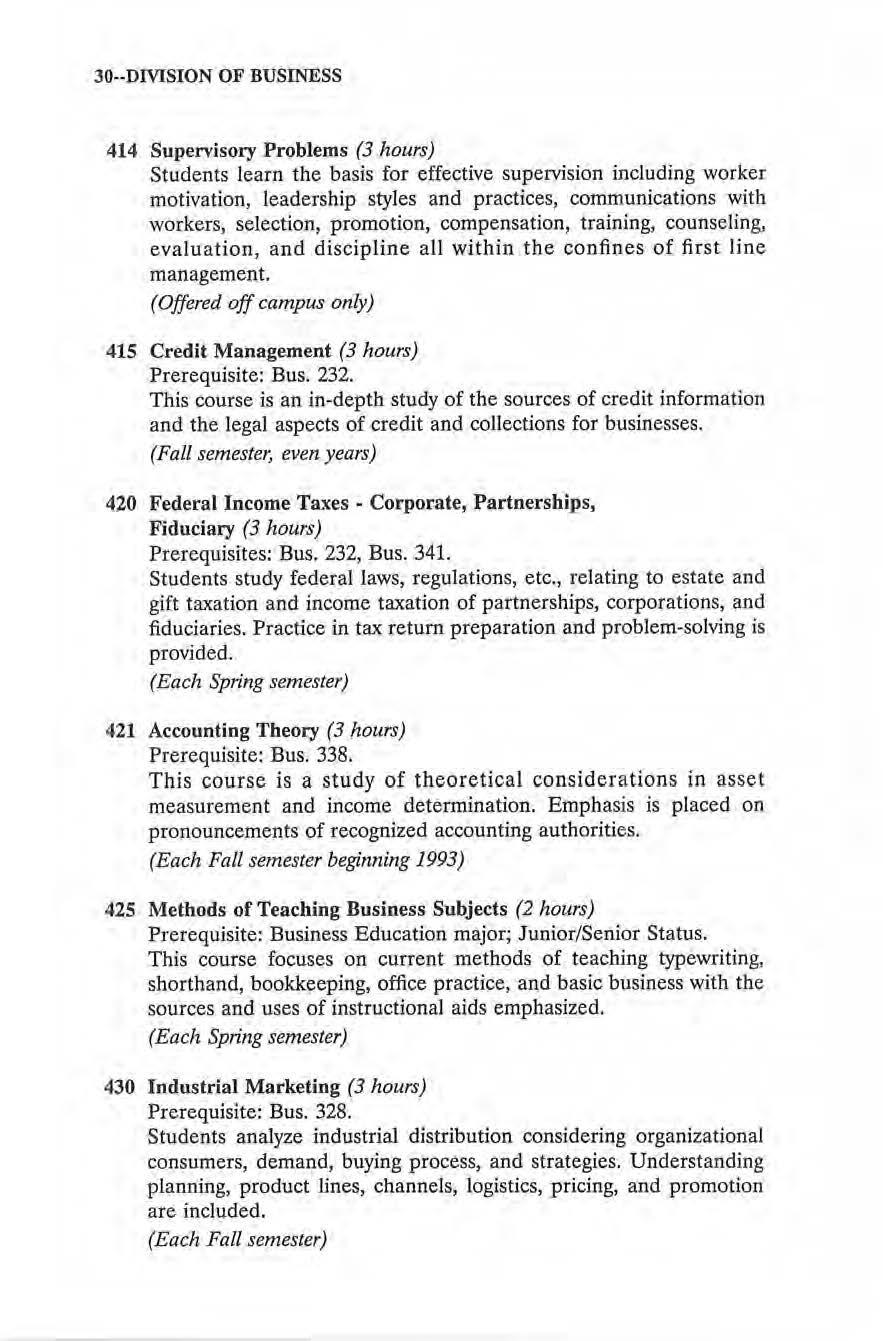
(Each Fall semester beginning 1993)
425 Methods of Teaching Business Subjects (2 hours)
Prerequisite: Business Education major; J unior/Senior Status. This course focuses on current methods of teaching typewriting, shorthand, bookkeeping, office practice, and basic business with the sources and uses of instructional aids emphasized.
(Each Spring semester)
430 Industrial Marketing (3 hours)
Prerequisite: Bus. 328.
Students analyze industrial distribution considering organizational consumers, demand, buying process, and strategies . Understanding planning, product lines, channels, logistics, pricing, and promotion are included.
(Each Fall semester)
30--DIVISION OF BUSINESS
433 Admin istrative Management (3 hours)
Prerequisite: Bus. 373.
This course is a study of the management of an office. Areas of study include location, layout, equipment, supplies, automation, controlling expenses, measuri.ng efficiency of operation, est ablishing quanti ty and quality production standards, and the administration of personnel.
(Each Spring semester)
434 Buman Resources Man agement (3 hours)
Prerequis ite: Bus. 373.
Students learn management of employees and the efficient use of human resources for both the personnel manager and the operating manager. Recruiting, motivation, and compensating are considered along with the current laws, career development, unions, and other topics. Case studies are used extensively.

(Each Spring semester)
435 Supe rvisory Stra tegies (3 hours)
Students utilize real-world business cases, experiences, and readings to (1) develop ana lytical skills by reading cases and r ecommending action, (2) increase awareness of h ow one' s attitude and behavior affect people in si mulated management situations, and (3) expand knowledge of management concepts, t heories , and principles.
(Each Spring semester, off campus only)
441 Cooperative Education I n te rnship (1-12 hours)
Prerequisite: B usin ess major and/or Permission of Instructor. This course is taken near the end of forma l college courses by students in the areas of management, marketing, accounting, and econom ic development programs Students may enroll for from 1-12 hours of credit. A minimum of forty hours of work experience will be required for every hour of credit per semester. The student will p r epare a paper. A maximum of 16 hours of cred it in Bus. 441 is allowed to apply toward a Bach elors degree with a maximum of 3 semester hours applying toward the management option.
(Each semester; Summer sessions)
443 Quanti tative Managem ent (3 hours)
Prerequisite; Math 340 or Permission of I nstructor. This study of systems and management science includes the development of analytical reasoning and set concepts, as well as topics in decision processes, linear programming, waiting lines, stochastic processes, forecasting methods, inventory control, input/ output analysis, and general modeling.
(Spring semester, odd years)
DMSION OF BUSINESS --31
450 Advanced Acco unting I (3 hours)
Prerequisite: Bus, 338. Students apply accounting theory and practice to business combinations and consolidation of financial statements for parent/ subsidiary corporations. Also, emphasis will be placed on accounting for international business activities and investments.
(Each Fall semester)
451 Advanced Accou nting II (3 hours)

Prerequisite: Bus. 338. Accounting theory and practice are applied to partnerships, not-forprofit and governmental accounting, SEC reporting, accounting for changing prices, troubled business restructuring and reporting, and other advanced topics.
(Each Spling semester)
470 Auditing Pr inci ples (3 hours)
Prerequisite: Bus. 338 or Permission of I nstructor. This course covers generally accepted auditing standards and procedures with the philosophy supporting them. Auditing techniques available to the independent public accountant are also studied.
(Each Spring semester)
480 International Business (3 hours)
Prerequisites: Bus. 328, Bus. 339, and Bus. 373. Students learn contemporary business and management practices in multinational market environments with emphasis on cultural , financial, and marketing differences.
(Each Spring semester)
490 CPA Review (3 hours)
Prerequisite: Bus. 450. This course is an intensive presentation of overall accounting and related materials summarizing CPA examinations and solutions with an in-depth study of APB opinions and financial research bulletins stressed.
(Offered upon demand)
32--DMSION OF BUSlNESS
494 Marketing Research (3 hours)
Prerequisites: Bus. 328, Math 340
Students apply analytical tools to marketing problems including markets, products, distribution channels, sa l es efforts, and advertising. Emphasis is placed on planning, investigation, collection, interpretation of data and presentation of results.
(Each Spring semester)
495 Business Policy (3 hours)
Prerequisite: Senior business major having completed 45 semester hours of business major which includes: Bus. 229, Bus. 339, Econ 220, and Econ 221. Recommended for student's last semester. This course takes a case-study approach requiring in-depth ana lytical and communication skills. Requirements include a thorough review of all given and acquired data, formulation of well-defined problems, and structured plans of action to be presented in written and oral form.
(Each Semester)
498 Special Topics in Busioess (1-4 hours)
Junior/Senior standing.
(Offered upon demand)
499 Independent Study in Business (1-3 hours)
Pr,erequisites: Junior standing; Permission of Instructor and prior approval of chairperson.
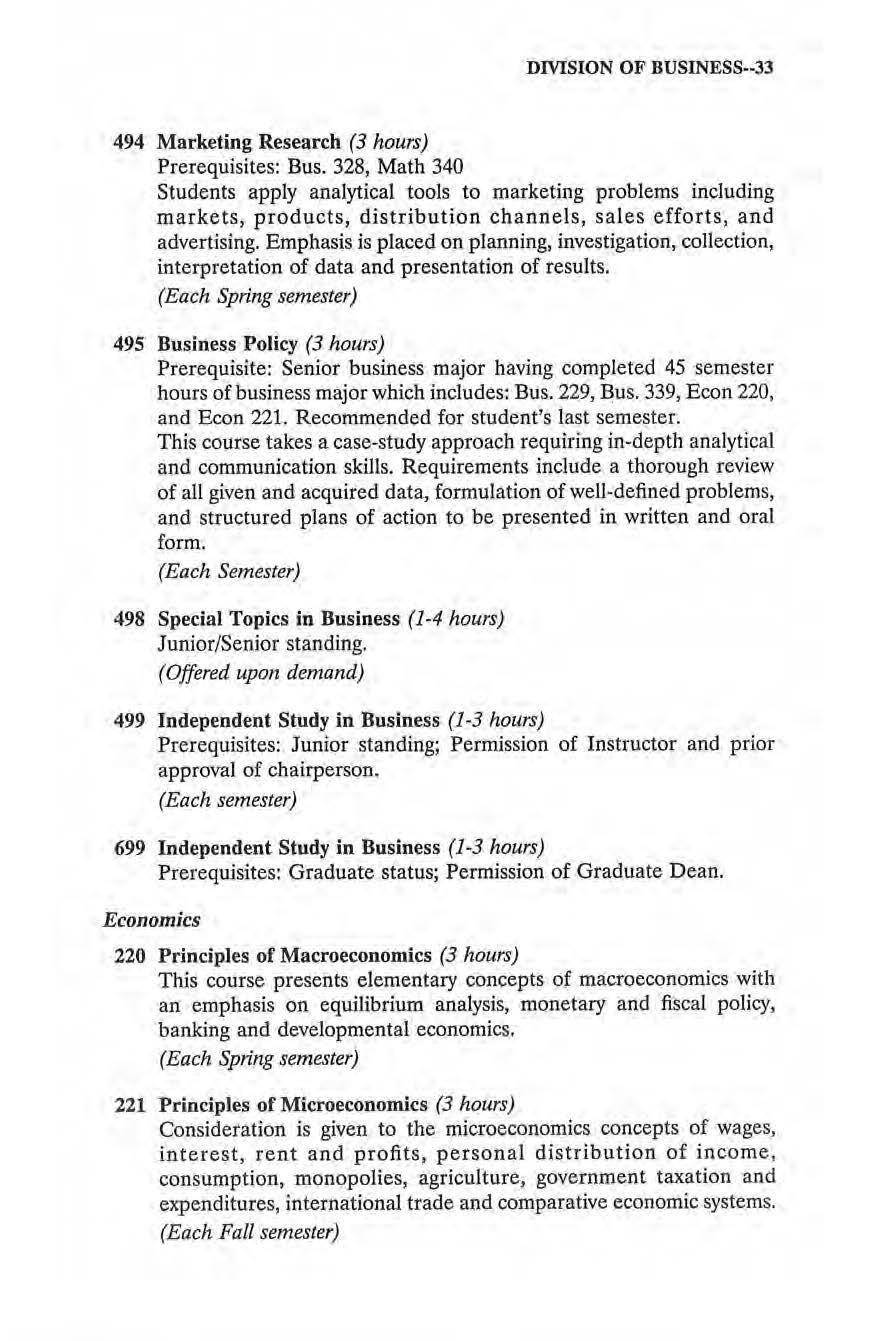
(Each semester)
699 Independent Study in Business (1-3 hours)
Prerequisites: Graduate status; Permission of Graduate Dean.
Economics
220 Principles of Macroeconomics (3 hours)
This course presents elementary concepts of macroeconomics with an emphasis on equilibrium analysis, monetary and fiscal policy, banking and developmental economics.
(Each Spring semester)
221 Principles of Microeconomics (3 hours)
Consideration is given to the microeconomics concepts of wages, interest , rent and profits , personal distribution o f incom e, consumption, monopolies, agriculture, government taxation and expenditures, international trade and comparative economic systems.
(Each Fall semester)
DMSION OF BUSINESS 33
.298 Special Topics in Economics (1-4 hours)
Freshman/Sophomore standing.
(Offered upon demand)
333 Economic History of United States (3 hours)
Pre requis ite: Econ 220.
U.S. economic history from colonial times to the present.
(Offered upon demand)
350 Public Finance (3 hours)
Prerequisites: Econ 220, Econ 221.
The role of government in the economy as it pertains to revenue generation, expenditures, regulations, and income redistribution is studied.
(Offered upon demand)
37S Labor and Industrial Relations (3 hours)
Prerequisite: Econ 221.
Students study labor, management, and government as they involve collective bargaining, labor laws, and wage theories.
(Offe red upon demand)
498 Special Topics in Economics (1-4 hours)
Junior/ Senior standing.
(Offered iq;on demand)
499 Independent Study in Economics (1-3 hours)

Prerequis ite: Junior standing.
(Each semester)
1,tfanagement
300K Economic Concepts (3 hours)
Basic concepts in economics to cover both basic macro and micro economic principles and management applications.
301K Lega l Concepts (3 hours)
Basic concepts of business law emphasizing contracts and sales from a manager' s perspective, stressing case studies.
310K Organizational Management (3 hours)
History and functions of management principles and systems to include organization theory, decision making , leadership, and motivation. Concentrating on existing business organjzation and the manager's responsibilities .
34- -DMSION OF BUSINESS
320K Financial Management (3 hours)
Accounting principles, concepts and procedures of recording and reporting financial data to serve as the foundation fo r understanding accounting management.
321K Accounting Management (3 hours)
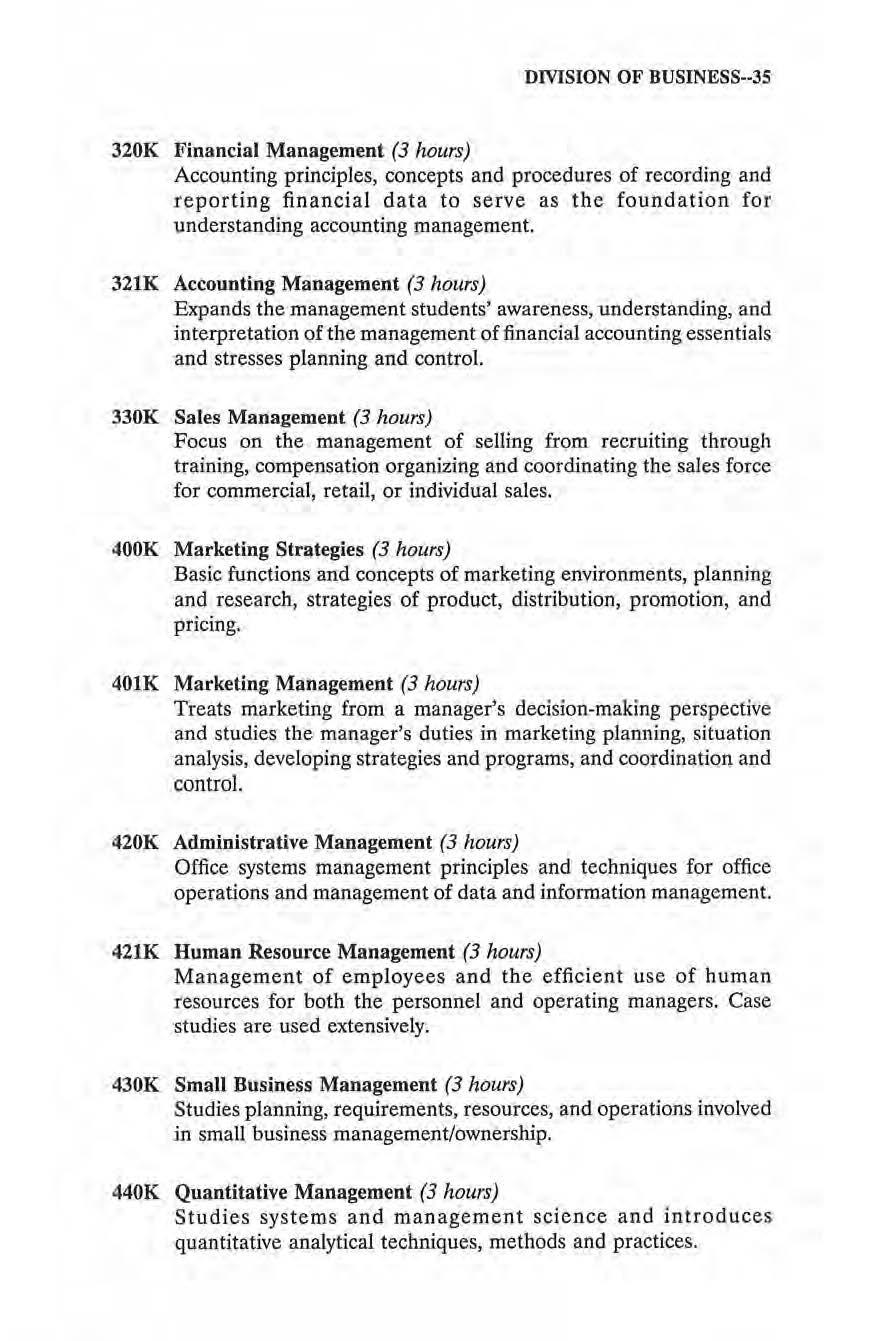
Expands the management students' awaren ess, unde rstanding, and interpretation of the management of financial accounting essentials and stresses planning and control.
330K Sales Management (3 hours)
Focus on the management of selling from recruiting through training, compensation organizing and coo rdinating the sales force for commercial, retail, or individual sales.
400K Marketing Strategies (3 hours)
Basic functions and concepts of marketing environme nts, planning and research, strategies of product, distribution, promotion, and pricing.
401K Marketing Management (3 hours)
Treats marketing from a manager's decision-making perspective and studies the ma nager's duties in marketing planning, situation analysis, developing strategies and programs, and coordination and control.
420K Administrative Management (3 hours)
Office systems management principles and techniques for office operations and management of data and information management.
421.K Human Resource Management (3 hours) Management of employees and the efficient u se of human r esources for both the personnel and op e rating managers. Case studies are us ed extensively.
430K Small Business Management (3 hours)
Studies planning, requirements, resources, and operations involved jn small business management/ownership.
440K Quantitative Management (3 hours) S tudies system s and management science and introduces quantitative analytical techniques, methods and practices
DMSION OF BUSINESS--35
441K Production/Operations Management (3 hours)
Studies analytical tools available for production and operation problem solving, decision-making situations through case studies.
4SOK/
459K Management Semina rs (1 hour)
460K Supervision Studies and Applications (3 hours) Involves practical management/supervision case applications utilizing computer assisted analysis as applicable and available.
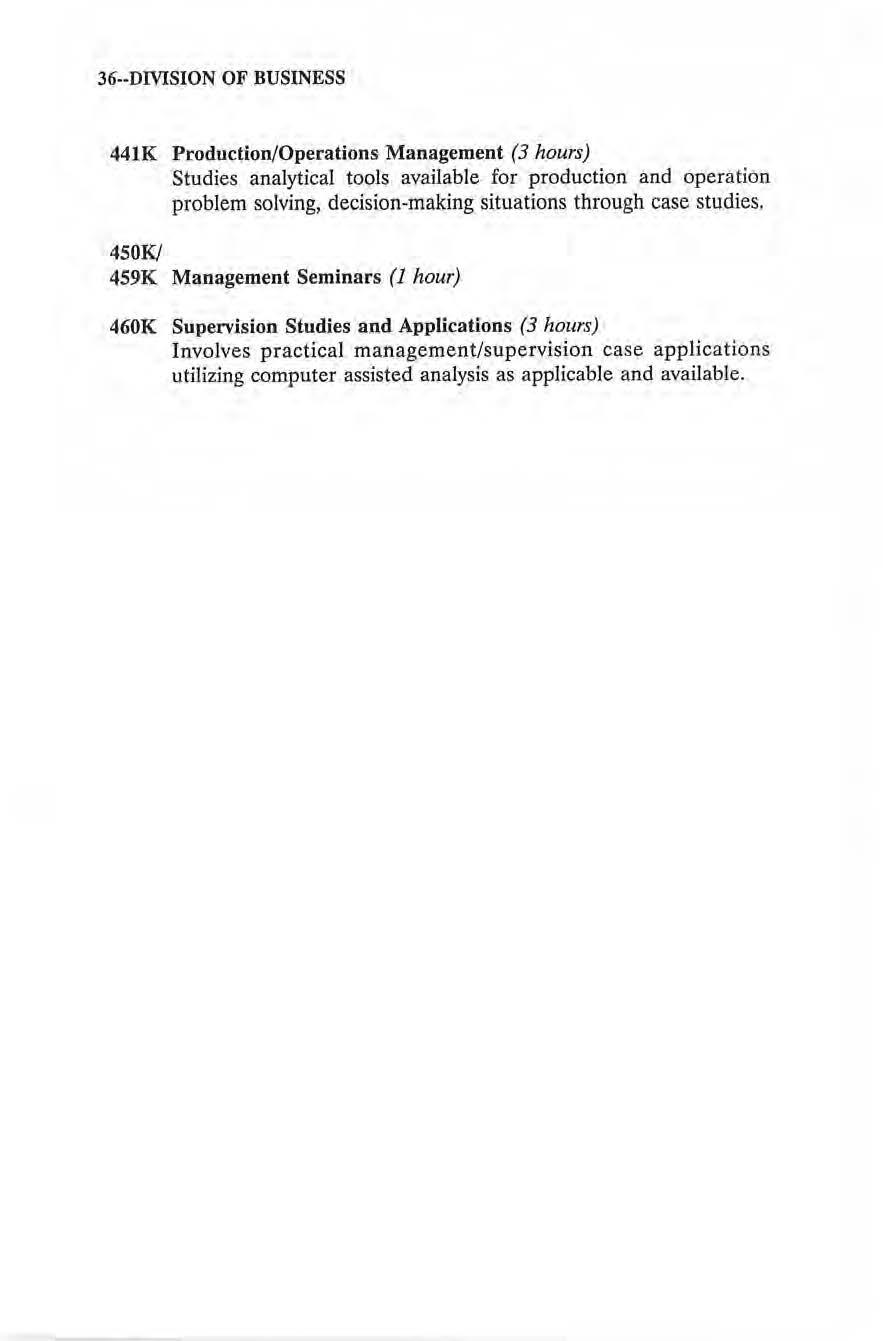
36--DIVISION OF .BUSINESS
DIVISION OF EDUCATION AND PSYCHOLOGY
Dr. J errold T . Hanson, Chairperson
Professors: Ferre, H anson, Hytrek
Associate Professors: Citrin, Davidson
Assistant Professors: Cal lend e r , Cox, Lundak, Nichols
In structors: Gabrie l, Gibbs, J e nse n, Johnson, Me adows, Wilmes
TEACHER EDUCATION
The D ivision of Education and Psycho logy provides teacher preparation programs in accordance with the Nebraska Department of Education . The Nebraska D e partment of Education requires that individuals seeking t eac her certification be qualified for e n dorsement in either one field or two subjects. Subjects an d fields are d efined as follows:
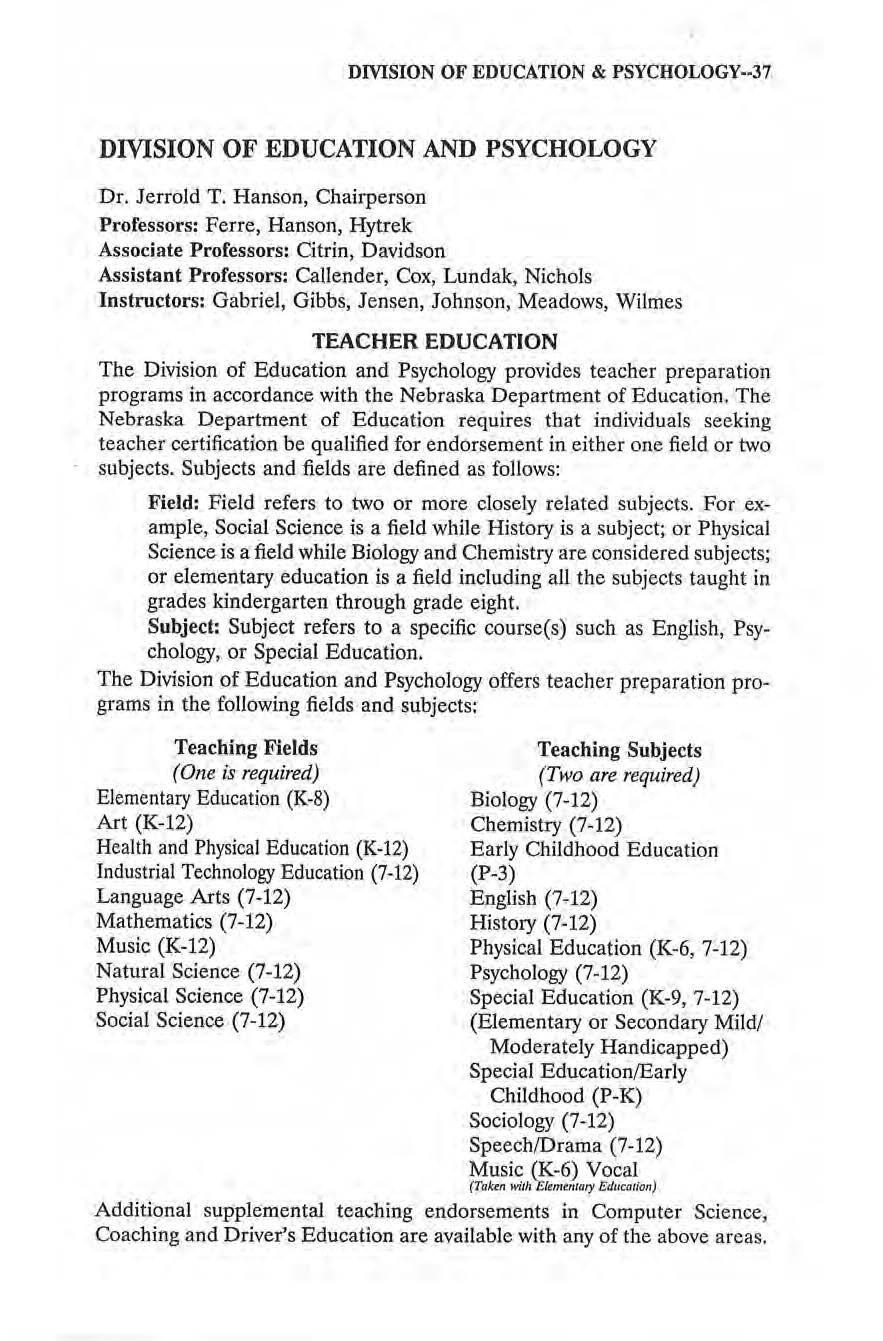
Field: F ield refe rs to two or more closely related subj ects. For example, Social Science is a field while History is a subject; or Physical Science is a field while Biology and Chemistry are considered subjects; or e lementary education is a field including all the subjects taught in grades kindergarten through grade eight.
Subject: Subject refers to a specific course(s) such as English, Psychology, or Special Education.
The D ivis ion of Education and Psychology offers teacher preparation programs in the fo llowing fields an d subjects:
Teaching Fields
(One is required)
Elementary Education (K-8)
Art (K-t2)
Healt h and Physical Education (K-12)
Industrial Technology Education (7-12)
Language- Arts (7-12)
Mathematics (7-12)
Music (K-12)
Natural Science (7-12)
Physical Science (7-12)
Social Science (7-12)
Teaching Subjects
(Two are required)
Biology (7-12)
Chemistry (7-12)
Early Childhood Education (P-3)
English (7-12)
History (7-12)
Physical Education (K-6, 7-12)
Psychology (7-12)
Special Education (K-9, 7-12)
(Elementary or Secondary Mild/ Moderately Handicapped)
Special Education/Early Childhood (P-K)
Sociology ( 7-12)
Speech/Drama (7-12)
Music (K-6) Vocal
(Tak,n with 'it,m,war; Ed11cotlon)
Additional supplemental teaching endorsements in Computer Science, Coaching and Driver's Education are availab le with any of the above areas.
DMSION OF EDUCATION & PSYCHOLOGY--37
The Division also offers a two-year program in Early Childhood Education leading to the Associate of Arts degree; however, th is is not a teacher certification program. For complete information regarding teacher education requir ements and teacher certification, contact the C ertification Officer, Division of Education at Peru State College or the Director of Teacher Certification, State Department of Education, Lincoln, Nebraska 68509 .
Admission to T~acher Education
Admission to Peru State College does not automatically permit admission to teacher education. Students planning to enter teacher education are required to file a formal application with the Teacher Education Committee.
Application for admission to teacher education will normally be made during the sophomore year in conjunction with enrollment in Ed 207: Orientation & Practicum. Students who transfer credit which includes this course will be required to make application during their first semester on campus. Non-degree students seeking endorsements only must apply immediately. The following criteria and conditions must be met by applicants for admission to teacher education:
1. Free from social probation.
2. Overall grade point average of at least 2.5.
3. Minimum score of 170-reading comprehension; 171-math; and 172composition on the Pre-Professional Skills Test (PPST).
4. Recommendations from three instructors who are in a position to assess the student as a prospective teacher.
5. Interview conducted by a representative of the Division of major emphasis
6. Evidence of proficiency in English and Math ematics as indicated by a grade of D -plus or above in college level courses or scores at or above the fiftieth percentile on the ACT.
No student wi ll be admitted to teacher education until all of the ab ove criteria have been met.
After consideration by the T eacher Education Committee, the applicant will be approved or disapproved for admission to teacher education. Applicants approved for a dmission to teacher education and their advisors will be notified by letter from the T eacher Education Committee
Applicants not approved for admission to teacher education and their advisors will be notified of the reasons for disapproval by the Teacher Education Committee. Applicants may request a review of the application and/ or a hearing before the T eacher Education Committee.

38--DIVISION OF EDUCATION
& PSYCHOLOGY
Admission to Student Teaching
Candidates who wish to student teach must submit an application for student teaching before the end of their junior year. To be el igibl e to enter stude nt teaching, students must meet the following requirements:
1. They must have received official notification of their acceptance into teacher education.
2 . They must have an overall GPA of at least 2.5.
3. They must have earned enough credits to graduate within one semester following student teaching.
4 They must have completed a minimum of 12 hours of credit at Peru State College.
5 . They must have provided a sworn statement that they have never been convicted of a felony.
Elementary Education
The Division of Education offers the B.S. in Education with a major in G[dticat§yand three additional options which students may elect. The B.S. in Education prepares a student to teach in Elementary Schools. The three additional options are: Elementary and Special Education; Elementary and Early Childhood Education; and Elementary and Early Childhood Spec ial Education. AH students completing the B.S. in Education must comp lete the core in Elementary Education and then, if they choose an additional option, must complete the requirements of that option. Thus, all students are required to complete the core in Elementary Education. The core courses required of all students completing the B.S. · Elementary Education

DMSION OF EDUCATION & PSYCHOLOGY--39
ar~ w'\~ M.~\C..'-1'-' i"'- I;(. l •H\,\~4-u.'"'1 I~~" -,..-Educ ~ 07 Orientation and Practicum 1 • 1 11 1~~~307 Practicum in Education (1'w 11 - ~"'1< hr-J 2 • 317 Educational Tests and Measurements 2 325 Teaching Language Arts in Elementary 2 326 Teaching Social Studies in Elementary 2 327 Methods of Teaching Elementary Math 2 328 Methods of Teaching Elementary Science 2 · 334 Teaching Reading in Elementary 3 · 400 Philosophical Foundations of Education 3 403 Diagnostic and Remedial Reading 3 • 410 Elementary Student Teaching 16 ' SpEduc 200 I ntroduction to Special Education 3 Psych 205 Educational Psychology 3 250 Human Growth and Development 3 · 255 Human Relations 3 1 Jc I\ _g o3 J.... t -\.. ~or- C°h,:-\ d.~ +1\Ml-tl,jl\ ~ I 3
A detailed description of the Elementary Education endorsement program and of the three optional programs are listed under their titles on the pages which follow. Elementary Education Major
Persons successfully completing this program will be endorsed to teach children in all elementary subjects in kindergarten through grade 8.
(Admittance to Teacher Education, General Studies Computer Science Requirements and completion of Level I courses are required before a student may advance to Level II)

40--DIVISION OF EDUCATION & PSYCHOLOGY Art 308 Art Exploration 3 Mus 251 Elementary Music Methods 2 PE
Physical Education in the Primacy Grades or 311 Physical Education in the Intermediate Grades 2
310
for Elementary Education Major LEVEL I • PRE-PROFESSIONAL 9\~.1~ I fl• ;;,. _v-,J '7 ~o g l u.,. 11 ' ef t' L c, Educ 207 Orientation and Practicum Psych 205 Educational Psychology 250 Human Growth and Development SpEdllc 200 Introduction to Special Education Total Hours 1 ' 3 3 3 I 10
Requirements
LEVEL II - CURRICULUM & INSTRUCTION

*Social Studies/Language Arts Block
Prerequisites for Social Studies/Language Arts Block: {Ed 317, Eng 301, Eng 203, Hist 113, Hist 114 & Geo 101)
Prerequisites
(Admittance to Teacher Education and completion of Levels I and II courses are required before a student may advance to Level III)
*Blocks may be taken in either orde1·.
DMSION OF EDUCATION & PSYCHOLOGY--41
325 Teaching
Teaching Social Studies in the Elementary School 2 ,
Practicum (Taken
,\ _\~., .3 l) \ ?~\.C.v'M--S 11t.,vJ,g~ y ~...5 Al"'\..(- I ·ay \ a,~ t f::, J. jlll I lIA/·, \' t r *Math/Science Block
Educ
Lang. Arts in the Elementary 2 ' Schoo l 326
307
with Ed 325 & 1 Ed 326)
Educ 327 Methods of Teaching Elementary Math 2 328 Methods of Teaching Elementary Science 2 ' 307 Practicum (Taken with Ed
and 1 i • Ed 328) ~A .,, ~~c, · I '\ ,•~':"OC"'M~~lt'f:'~~~IO'la" "" 3 0~ r~tv ~"t (A1,W.. • • f.v.'i\1.. r-11,~\ «,L -e.. f tt J1Jl Additional LEVEI.; II Educ 317 Tests and Measurements 2 · 334 Teaching Reading in the Elementary 3 .. School 400 Philosophical Foundations of Education 3 403 Diagnostic and Remedial Reading 3 , Total 21
for Math/Science Block: (Ed 317, and General Studies Math & Science Requirements)
327
LEVEL III - PROFESSIONAL STUDENT TEACHING
Eleme ntary Education candidates must earn 24 semester hours in on e of the following concentrations and 15 hours in each of two a dditional a reas commonly taught in elementary schools. Courses taken in the general studies program may be counted toward satisfying th.is requirement. An endorsement in Special Education, Early Childhood Education or E a rly Childhood/Special Education may also be substituted for the 2A hour block.
This program is for individuals seeking endorsement to teach in grades 7 through 12.
(Admittance to Teacher Education, General Studies Computer Scie nce Requirements and completion of Level I courses are required b e fore a student may advance to Level II.)

42 --DIVISION OF EDlJCATION &
PSYCHOLOGY
(Refer to Admission to Student Teaching Requ irement) Hours Educ 410 Elementary Student Teaching 16 · Elementary Education candidates are required to successfully complete the following courses: Art 308 Art Exploration 3 1 Mus 251 Elementary Music Methods 2 PE 310 Physical Education in the Primary Gra des,( Psych Eng or ( 311 Physical Education in the Intermediate _) Grades 2 ' 255 Human Relations 3 203 Literature for Children through Adolescence 3
C. Social Science A. Language Arts f .... ~,St.,\.-_ B. Math and Science U 1.1 \ D. Fin e Arts 1\1-'~+ M_v..,s-
EDUCATION
SECONDARY
Requirements for Secondary Education Major LEVEL I • PRE-PROFESSIONAL Educ # 207 Orientation and Practicum Psych 205 Educational Psychology 250 Human Growth and Development SpEduc 200 Introduction to Special Education Total Hours 1 3 3 3
(Admittance to Teacher Education and completion of Levels I and II courses are required before a student may advance to Level HI.)
Ill-Professional Student Teaching
In addition to the above requirements, students must take Psych 255: Human Relations.
K-1 2 Teach er Edu cation Programs
P eru State College offers programs to prepare individuals to teach from kindergarten through the twelfth grade in the are as of Art, Mus ic, and Physical Education.
Students working toward K-12 certification mus t meet the same requirements and follow the same professional teacher education programs as secondary ed ucation ca ndidates with the exception of practicum and stud ent teaching which must include experiences with both elementary an d secondary students.
Special Education-Mild/Moderately Hand icapped (Elementary or Secondary)
This program prepares individuals to teach mild/moderate ly handi capped students. It may be used in lieu of the 24 hour block requirement in elementary education or as one of the subject areas in secondary education. All K-9 Special Education students must also have an endorsement in Elementary Education. All 7-12 Special Education students must also have an addit ional endorsement in another 7-12 subject or field.

DMSION OF EDUCATION & PSYCHOLOGY--43
CURRICULUM
INSTRUCTION Methods of Teaching (content area) 3 Educ 300 Classroom Management and Effective Teaching in the Secondary School 2 309 Secondary Practicum (taken with Methods of Teaching) 2 Total 7
LEVEL II -
&
LEVEL
(Refe r to Admiss ion to Student T eaching Requirement) Educ 40 0 Philosophical Foundations of Educat ion 3 411 Secondary Student Teaching 12 434 Secondary Reading and Writing Across the Curriculum 3 Total 18
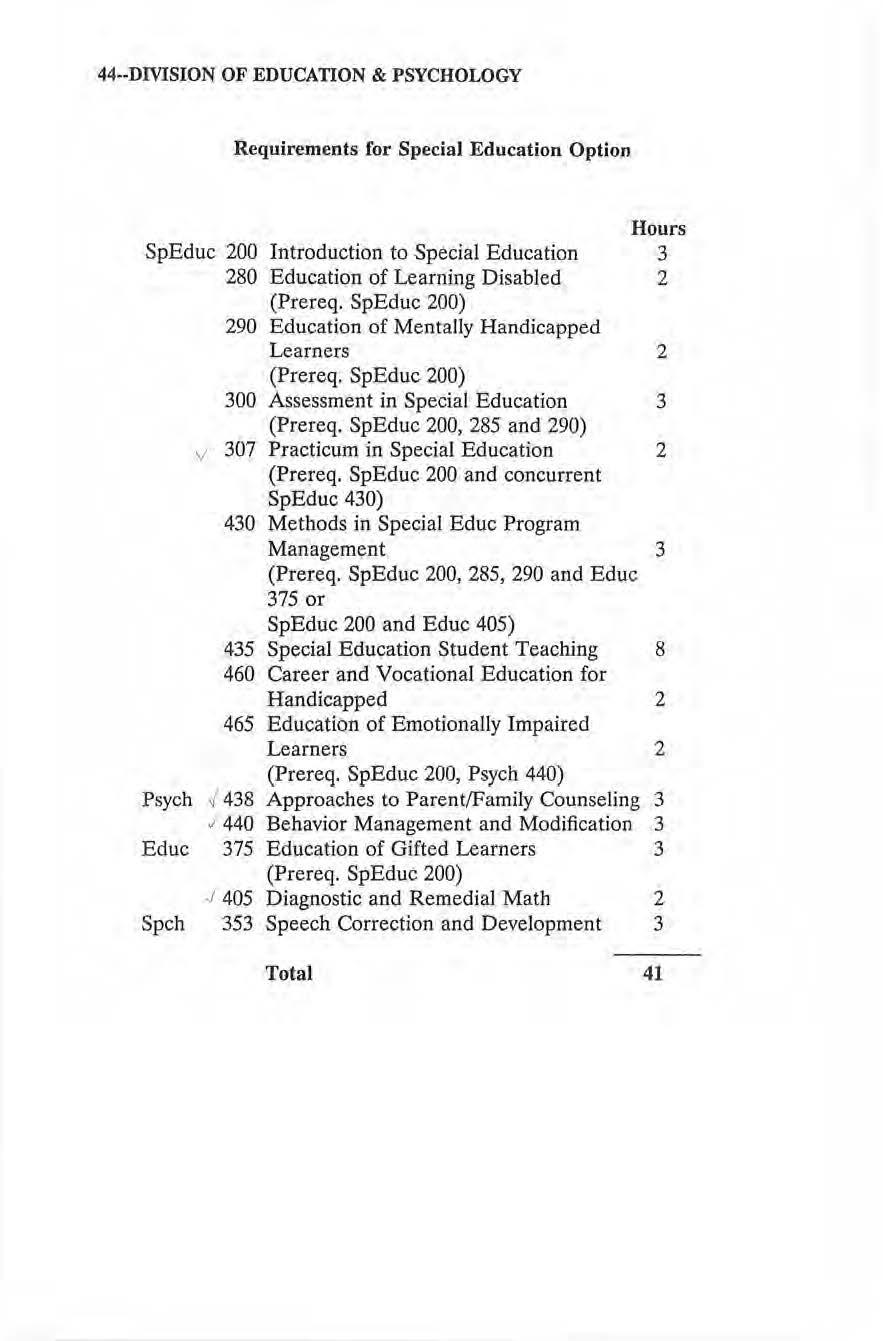
Requirements for Special Education Option Hours SpEduc 200 Introduction to Special Education 3 280 Education of Learning Disabl ed 2 (Prereq. SpEduc 200) 290 Education of Mentally Hanrucapped Learners 2 (Prereq. SpEduc 200) 300 Assessment in Special Education (Prereq. SpBduc 200, 285 and 290) 3 V 307 Practicum in Special Education 2 (Prereq. SpEduc 200 and concurrent SpEduc 430) 430 Methods in Special Educ Program Management 3 (Prereq. SpEduc 200, 285, 290 and Educ 375 or SpEduc 200 and Educ 405) 435 Special Education Student Teaching 8 460 Career and Vocational Education for Handicapped 2 465 Education of Emotionally I mpaired Learners 2 (Prereq. SpEduc 200, Psych 440) Psych 438 Approaches to Parent/Family Counseling 3 440 Behavior Management and Modification 3 Educ 375 Education of Gifted Learners 3 (Prereq. SpEduc 200) .J 405 Diagnostic and Remedial Math 2 Speh 353 Speech Correction and Development 3 Total 41
44--DMSION OF EDUCATION & PSYCHOWGY
Early Childhood Education
Requirements for Early Childhood Education Option
All students enrolled in the Early Childhood Program must also complete the Elementary Education Program. The student successful ly completing this program will be endorsed to teach children from birth through eight years, or third grade.
Requirements for Early Childhood Education Option
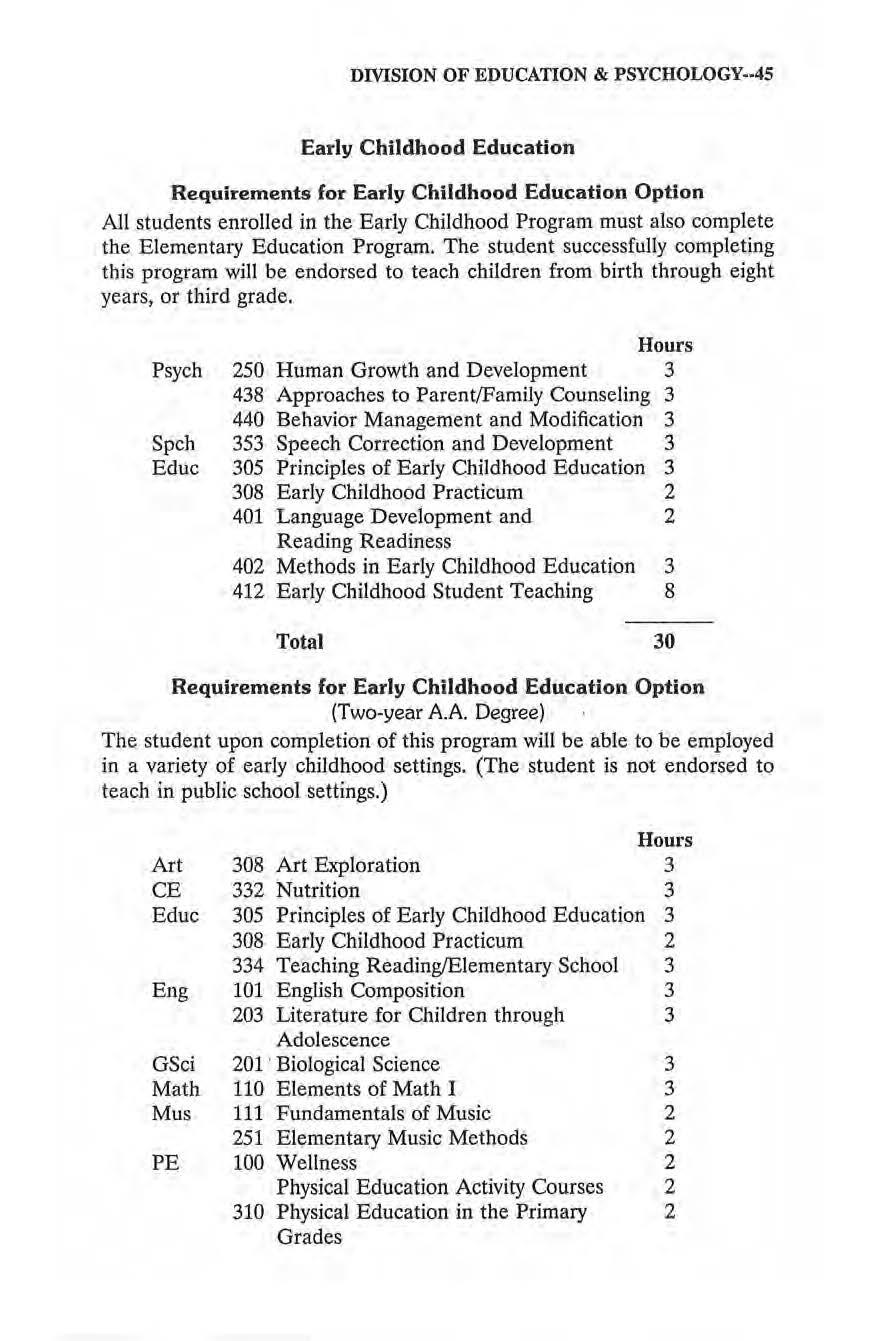
(Two-year A.A Degree)
The student upon completion of this program will be able to be employed in a variety of early childhood settings. (The student is not endorsed to teach in public school settings.)
DIVISION OF EDUCATION & PSYCROLOGY--45
Psych Speh Educ Hours 250 Human Growth and Development 438 Approaches to Parent/Family Counseling 440 Behavior Management and Modification 353 Speech Correction and Development 305 Prin cip les of Early Childhood Education 308 Early Childhood Practicum 401 Language Development and Reading Readiness 402 Methods in Early Childhood Education 412 Early Childhood Student Teaching Total 3 3 3 3 3 2 2 3 8 30
Hours Art 308 Art Exploration 3 CB 332 Nutrition 3 Educ 305 Principles of Early Childhood Education 3 308 Early Childhood Practicum 2 334 T eaching Reading/Elementary School 3 Eng 101 English Composition 3 203 Literature for O1ildren through 3 Adolescence GSci 201 · Biological Science 3 Math 110 E lements of Math I 3 Mus 111 Fundamentals of Music 2 251 Elementary Music Methods 2 PE 100 Wellness 2 Physical Education Activity Courses 2 310 Physical Education in the Primary 2 Grades
All students enrolled in the Early Childhood/Special Education Program must also complete the E lementary Education Program. Upon completion of the Early Childhood/Special Education program the student will be endorsed
teach students in infant, toddler, preschool and kindergart en settings
0 Requireme nts fo r Psychol o gy O ption (Teaching or Nonteach
All students majoring in Psychology must complete the psychology requirements listed below and any other degree requirements. Those students preparing to teach psychology in high school must also complete th e secondary professional education requirements.
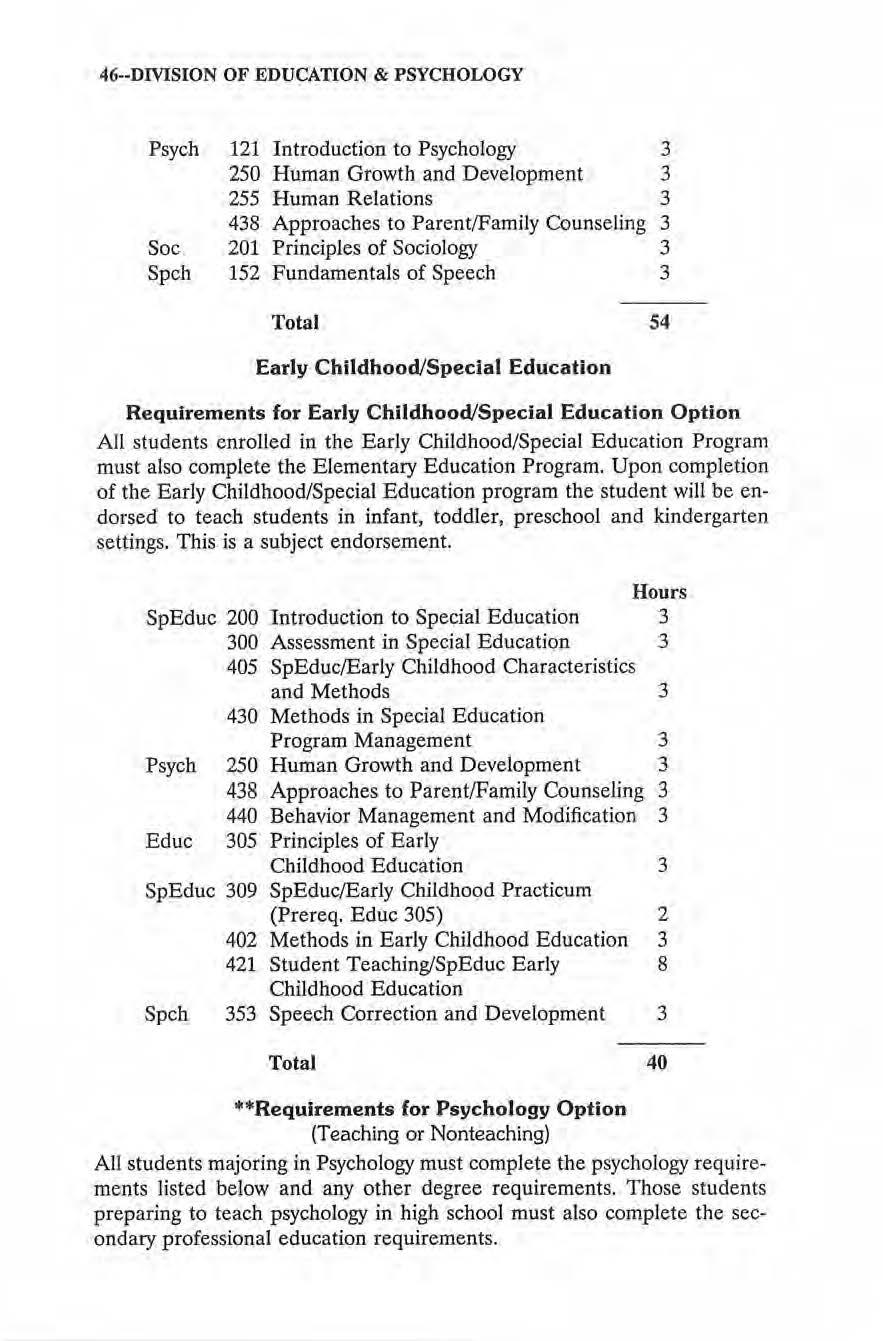
46--DMSION OF EDUCATION & PSYCHOWGY Psych Soc Speh 121 Introduction to Psychology 3 250 Human Growth and Development 3 255 Human Relations 3 438 Approaches to Parent/Family Counseling 3 201 Principles of Sociology 3 152 Fundamentals of Speech 3 Total 54 Early Ch il dho od/Special E duc a tion
for Early Childh ood/Special Educat io n Option
Requirements
to
This is a subject endorsement. SpEduc 200 Introduction to Special Education 300 Assessment in Special Education Hours 3 3 405 SpEduc/Early Childhood Characteristics and Methods 3 430 Methods in Special Education Program Management 3 Psych 250 Human Growth and Development 3 438 Approaches to Parent/Family Counseling 3 440 Behavior Managemen t and Modification 3 Educ 305 Principles of Early Childhood Education SpEduc 309 SpEduc/Early Childhood Practicum (Prereq. Educ 305) 402 Methods in Early Childhood Education 421 Student Teaching.lSpEduc Early Childhood Education 3 2 3 8 Speh 353 Speech Correction and Development 3 To t al 4 0
ing)
*Those students comp leting the requirements for the nonteaching psychology major may substitute any psychology elective for History 400.
*"Refer to the Psychology/Sociology major in the Humanities section for otber options.
HEALTH AN D PHYS ICAL
EDUCATION
The Division of Education offers programs for individ~als wlshlng to major \ f--

Physical Education which will enable graduates to become certified as
_pa,gcation-- teacher s in the public schools,.w-..p-repare.- for othe r--
.usmg the-Meaktf ~Fhysica-l-1rd'ttd-lKfrt-nfajor', to become qual ified for careers in Sport Management and to enable students to meet the re-
quirements for certification as coaches.
Psych *Hist Soc DMSION OF EDUCATION & PSYCHOLOGY--47 Req uirements for Psycho logy Subject Endorsement 121 245 250 255 305 320 440 450 400 201 Introduction to Psychology Psychology of Personality Hours 3 Human Growth and Development Human Re lations Social Psychology Psychology of Learning Behavior Management and Modification Abnormal Psychology Psychology Electives Methods of Teaching History and Social Science Principles of Sociology 3 3 3 3 3 3 3 6 2 3 Total 35 E
Anthropology Economics Geography History (not
Political Science Sociology Total 38
lectives from one or more Social Science cognate areas: 3
including Hist 400)
r ~tJ
'<:'
<,'<" -m
..F~l-
~rs
1)11~1\ l (' c) " .I _( /\;\ dJ>'i C •, I j I /1. P"' 'i "- v ' \ (f; /l "(/""- V H.(J.,[Y'h'] ! 1 f' ' -1. l) lv ,. r < ,),< .I Pin'} \ '-t'~J "kl• t> 't .1-wvi t ~1 i--c,(,-. .J , t<. ) l l_k _!. , .:, lv(f, f1 \J• ' , , , 1.1.1 , .r {:, ,1v t- ~ev· a,< In {V
I
The field endorsement in Health and Physical Education (K-12) will meet Nebraska state requirements to teach both Health and Physical Education. Students who seek the endorsement must meet the same requirements and follow the same professional teacher education program as secondary education candidates.

48--DMSION OF EDUCATION & PSYCHOWGY Health and Physical Educat ion (K-12)
(Teaching or Nonteaching)
Option
PE CE Soc Educ Physical Education Activities Hours 2 Physical Education Activities-Swimming 201 Principles of Physical Education 2 3 203 Gymnastics 205 Health Education 215 First Aid 216 Minor Sports 2 3 2 2 230 Rhythms and Dance/Elementary School 3 232 Aquatics for Elementary School 2 300 Prevention and Care of Sports Injuries 3 309 Organization and Administration of Programs in Health and Physical Education 2 310 Physical Education in the Primary Grades 2 311 Physical Education in the Intermediate Grades 312 Muscular Anatomy and Kinesiology 320 Special Methods in Health and Physical Education (Prerequisite: Admission to Teacher Education) 360 Physiology of Exercise 411 Health Programs/Elementary School 412 Foundations of Elementary and 2 3 2 3 3 Secondary School Health 3 415 Development of Basic Learning Abilities 3 416 Tests and Measurements in Physical Education 417 Adaptive Physical Education 332 Nutrition 340 The Family 415 Drug Use and Abuse Total 2 3 3 3 2 61
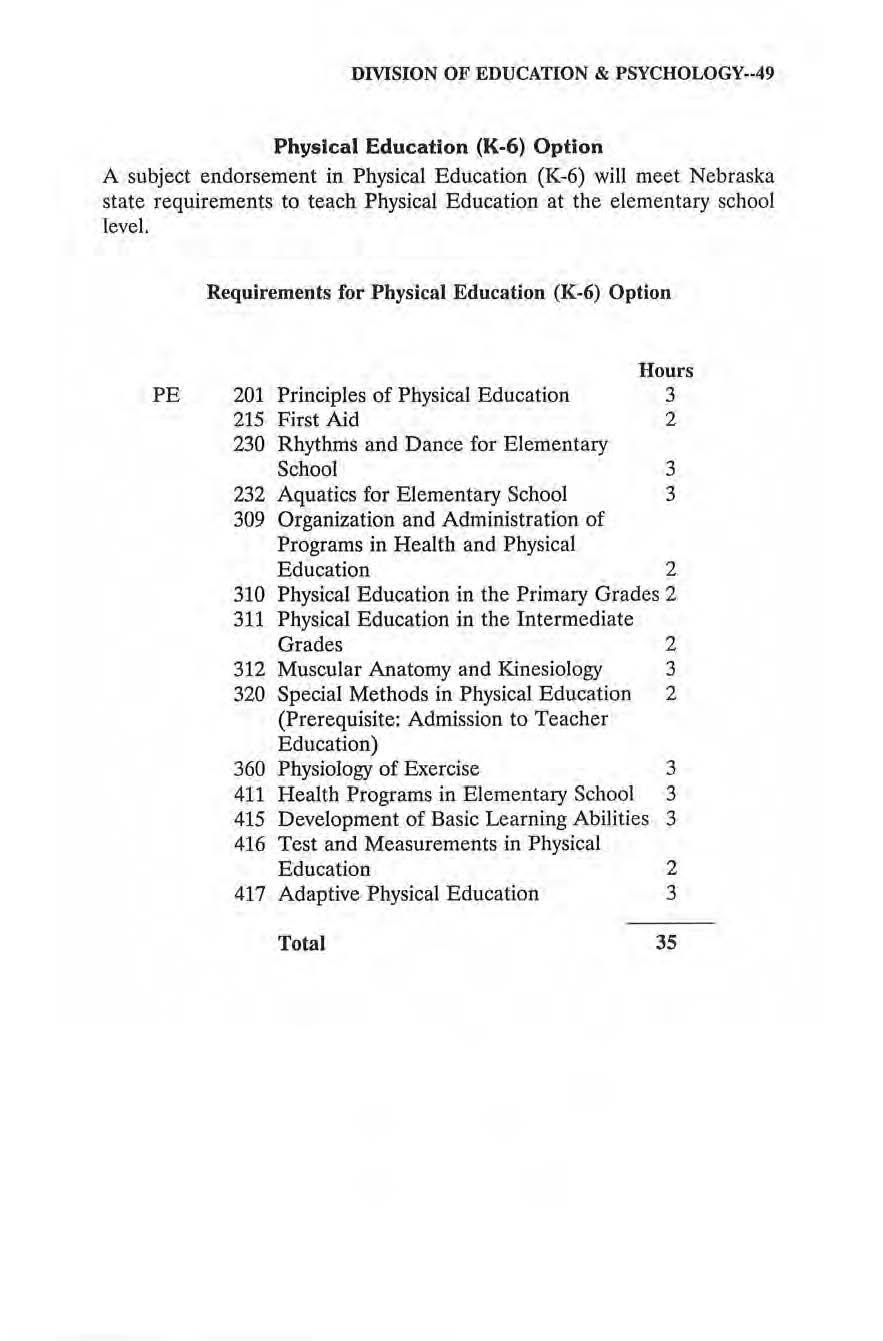
DMSION OF EDUCATION & PSYCHOLOGY--49
Education
PE Requirements for Physical Education (K-6) Option 201 Principles of Physical Education 215 First Aid 230 Rhythms and Dance for Elementary School 232 Aquatics for Elementary School 309 Organization and Administration of Programs in Health and Physical Hours 3 2 3 3 Education 2 310 Physical Education in the Primary Grades 2 311 Physical Education in the Intermediate Grades 2 3 2 312 Muscular Anatomy and Kinesiology 320 Special Methods in Physical Education (Prerequisite: Admission to Teacher Education) 360 Physiology of Exercise 3 411 Health Programs in Elementary School 3 415 Development of Basic Learning Abilities 3 416 Test and Measurements in Physical Education 417 Adaptive Physical Education Total 2 3 35
Physical
(K-6) Option A subject endorsement in Physical Education (K-6) will meet Nebraska state requirements to teach Physical Education at the elementary school level.
A subject endorsement in Physical Education (7-12) will meet Nebraska state requirements to teach Physical Education at the junior and senior high school leve
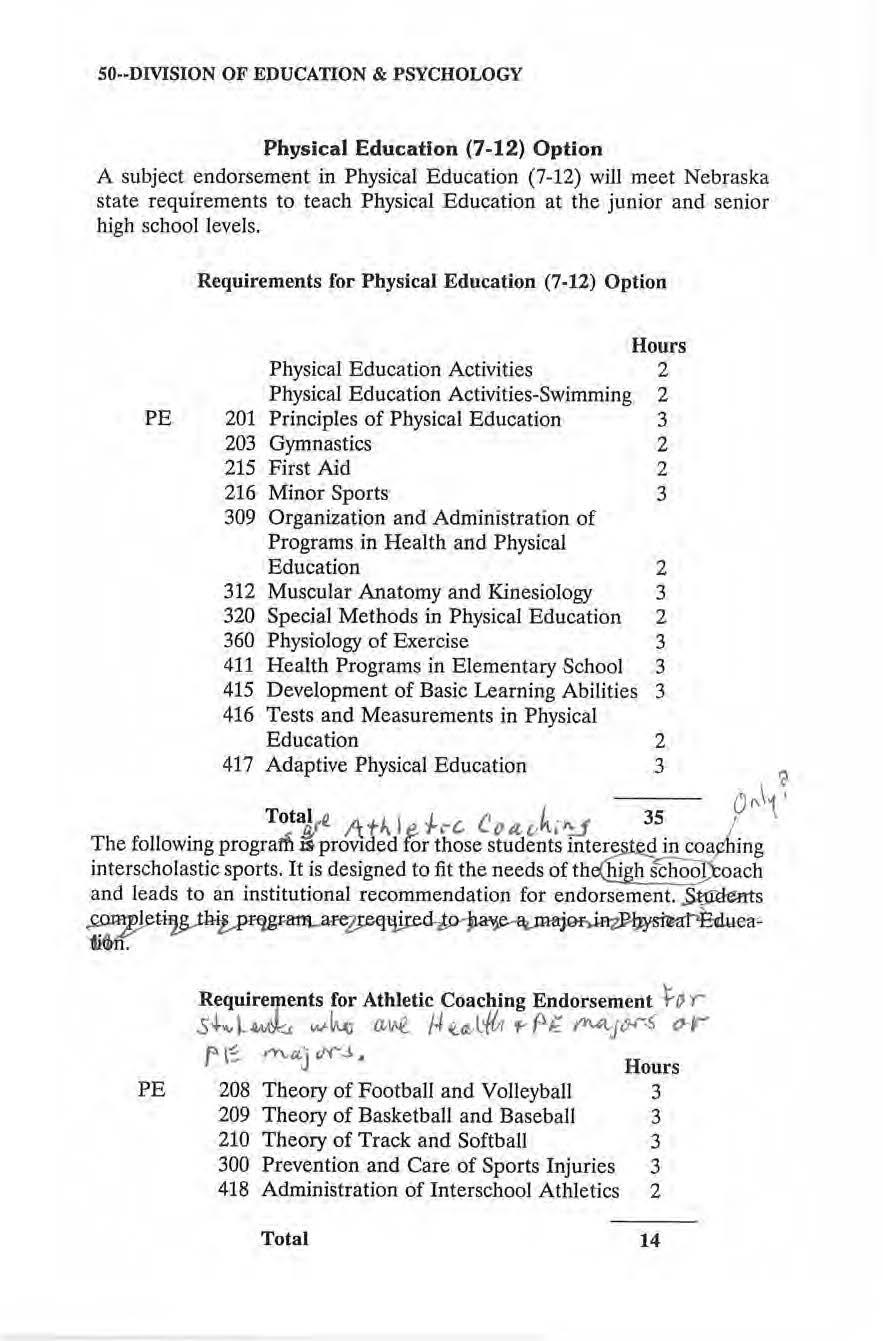
50 --DMSION OF EDUCATION & PSYCHOLOGY Physical Education (7-12) Option
PE Requirements for Physical Education (7-12) Option Physical Education Activities Hours 2 201 203 215 Physical Education Activities-Swimming Principles of Physical Education Gymnastics First Aid 216 Minor Sports 309 Organization and Administration of Programs in Health and Physical 2 3 2 2 3 Education 2 312 Muscular Anatomy and Kinesiology 3 320 Special Me t hods in Physical Education 2 360 Physiology of Exercise 3 411 Health Programs in Elementary School 3 415 Development of Basic Learning Abilities 3 416 Tests and Measurements in Physical Education 417 Adaptive Physical Education 2 3 '? o"\. Toti~ At". I -J-~e, Coa.e,,k.-~ 35 ' The
students intere din coa;tbing
schoofi:oach
~e:nts µ,mp~t,~~J;81ll..a~ajr.e~~j~~~ea'" ti~
YS~ l-~..t w-~ a~ /.I ta-L~&r ,,, {J-i; ~JY~ <>-i"" f' l~ ~a.J rl'("~ Hours PE 208 Theory of Football and Volleyball 3 209 Theory of Basketball and Baseball 3 210 Theory of Track and Softball 3 300 Prevention and Care of Sports Injuries 3 418 Administration of Interschool Athletics 2 Total 14
ls.
following program i, provided for those
interscho lastic sports. It is designed to fit the needs ofth i h
and leads to an institutional recommendation for endorsement.
Requ.ireipents for Athletic Coaching Endorsement t"
The following program is provided for those students interested in coacnin'g a.
interscholastic sports and who do not have a major in Physical Education. It is designed to fit the needs of the high school coach and leads to an institutional recommendation for endorsement. Students completing this program are required to have a major in an a rea other than Physical Education.
Sport Management Option
The Sport Management option provides the graduate with a combination of Physical Education and Business studies which will prepare the person to enter occupations in a variety of public and private endeavors such as intercollegiate and professional spor t settings, corporate or private fitness centers, park ilistricts and the growing sport-related industries. Career opportunities include those as directors of activity centers; club managers; fitness facility managers; directors of public relations for sport teams or organizations; program directors; business managers; ticket sales managers; and ilirectors of community centers.
Sport Management Option

DMSION OF EDUCATION & PSYCHOWGY--51 l-tec.tl..1.lii oJ Athletic Coaching Endorsement for Non-Physical Education /Jr A. ~ Pl~L , t;;J. M~ Majors lAutt'i. l c.,t~tf '1'" "-~ ~X' \
l
o, )
Hours PE 207 Theory of Coaching 3 300 Prevention and Care of Sports Injuries 3 360 Physiology of Exercise 3 414 Skill Progression in Athletic Performance 3 Total 12
\
l\~~v-."
General Studies Eng 101 English Composition Eng 201 Advanced English Composition Speh 152- Fundamentals of Speech CSci 102 Introduction to Computer Concepts Bus 229 Software Applications Math 110 Elements of Mathematics or Matb 125 Precalculus Hours 3 3 3 3 3 3 5

52--DMSION OF EDUCATION & PSYCHOLOGY Math Math Chem Biol Psych PE Business Bus Econ 111 Elements of Statistics or 340 Statistics 101 General Chemistry 102 I ntroductory Zoology Literature Aesthetics 255 Human Relations Non-Western Studies Western Studies American Studies 100 Wellness Physical Education Activities 228 Principles of Marketing 231 Principles of Financial Accounting 232 Principles of Managerial Accounting 350 Commercial Law 339 Business Finance 373 Organizational Behavior 434 Human Resources Management 221 Principles of Microeconomics 3 3 4 4 3 3 3 3 3 3 2 2 3 3 3 3 3 3 3 3 Physical Education PB 201 Principles of Physical Education 3 205 Health Education 3 215 First Aid 2 300 Prevention and Care of Sports Injuries 3 309 Organization and Administration 2 312 Muscular Anatomy and Kinesiology 3 417 Adaptive Physical Education 3 Educ 441 Cooperative Education Internship 8-12 Supporting courses Psych 250 Human Growth and DeveJopment 3 310 Psychology of Sports and Physical Activity 3 CE 332 Nutrition 3 SpEduc 200 Introduction to Special Education 3 Tota l 62-66
COURSE DESCRIPTIONS
Education
207 Orientation and Practicum (1 hour)
This course will provide a student considering education with an introduction to the Peru State College Teacher Education program and an opportunity to spend 30 clock hours in an elementary, junior high/middle, or secondary school to obseive the inner-workings of classrooms from the point of view of a teacher. Regularly scheduled, on-campus seminars will be held in conjunction with the school visits to discuss classroom experiences with other education students and faculty and to meet other course requirements.
(Each semester)
298 Specia l Topics in Education (1-4 hours) Freshman-Sophomore standing, (Offered as needed)
300
Classroom Management & Effective Teaching in the Secondary School (2 hours)
Prerequisite: Admission to Teacher Education
Tbjs course is intended to provide prospective secondary education students the opportunity to discuss the relationships between classroom management and effect ive teaching, to research and discuss current theory, research and practice in c l assroom management and effective teaching, discuss and practice lesson and unit planning and curricu lum design, and to discuss individual management styles and plans for their own classroom.
(Each semester)
305
Principles of Early Childhood Education (3 hours)
This course is designed to give students the theory and practice necessary for teaching and caring for children from infancy through age eight. It is an introduction to the professional preparation needed fo r preschools and child care.
(Each Fall semester)
307
Elementary Practicum (1 hour) i O\ \i t/ .s O 2
Prerequisites: Taken in conjunction with Ed 325 and 326; 327 and 328; Admission to Teacher Education and Completion of Level I Education courses.
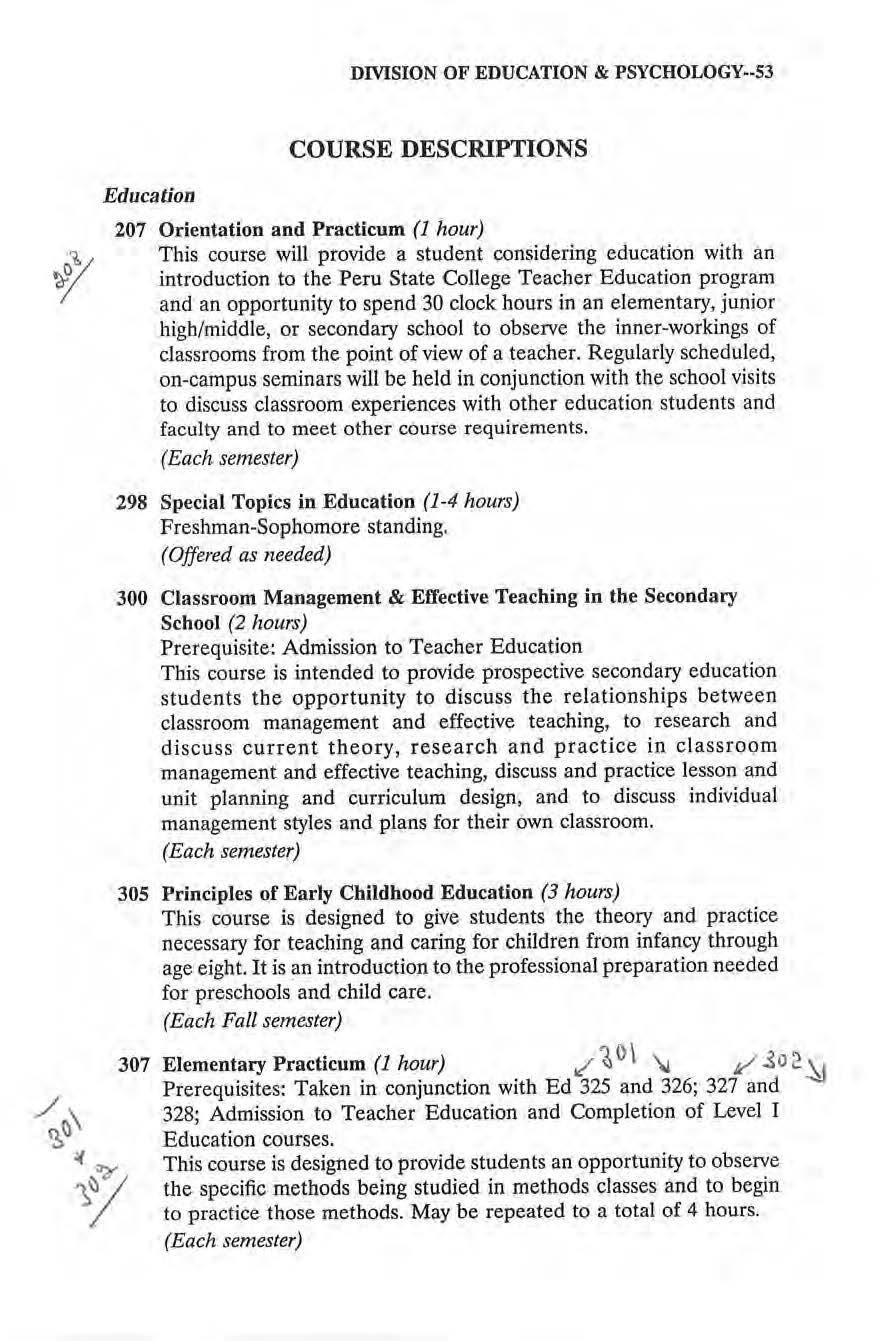
This course is designed to provide students an opportunity to observe the specific methods being studied in methods classes and to begin to practice those methods. May be repeated to a total of 4 hours.
(Each semester)
DMSION OF EDUCATION & PSYCHOLOGY- -53
3 08 Early Chi ldhood Practicum (2 hours)
Prerequisites: Admission to Teacher Education; concurrent registration in Ed 402. This course is designed to provide students an opportunity to observe the specific methods being studied in the methods class and to begin to practice those methods. May be r epeated to a total of 4 hours.
(Each semester)
309 Secondary Practicum (2 hours)
Prerequisites: Taken in conjunction wjth each Secondary Special Methods; Admission to Teacher Education and Completion of Level I Education courses.
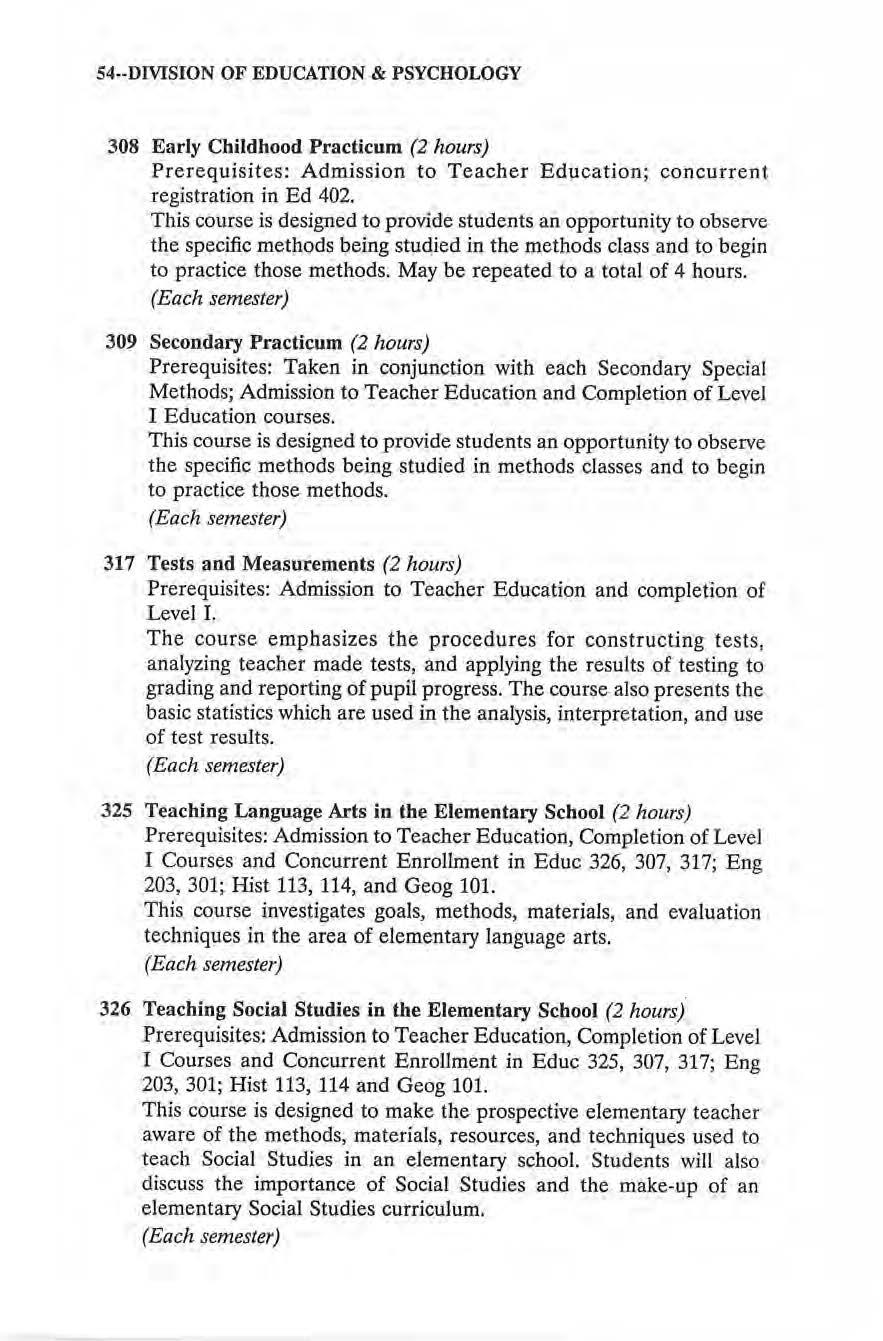
This course is designed to provide students an opportunity to observe the specific methods being studied in methods classes and to begin to practice those methods.
(Each semester)
317 Tests and Measucements (2 hours)
Prerequisites: Admjssion to Teacher Education and completion of Level I.
The course emphasizes the procedures for constructing tests, analyzing teacher made tests, and applying the results of testing to grading and reporting of pupil progress. The course also presents the basic statistics which are used in the analysis, interpretation, and use of test results.
(Each semester)
325 Teaching Language Arts in the E lementary School (2 hours)
Prerequisites: Admission to Teacher Education, Completion of Level I Courses and Concurrent Enrollment in Educ 326, 307, 317; Eng 203, 301; Hist 113, 114, and Geog 101. This course investigates goals, methods, materials, and evaluation techniques in the area of elementary language arts .
(Each semester)
326 Teaching Social Studies in the E lementary Schoo l (2 hours)
Prerequisites: Admission to Teacher Education, Completion of Level I Courses and Concurrent Enrollment in Educ 325, 307, 317; Eng 203, 301; Hist 113, 114 and Geog 101. This course is designed to make the prospective elementary teacher aware of the methods, materials, resources, and techniques used to teach Social Studies in an elementary school. Students will also discuss the importance of Social Studies and the make-up of an elementary Social Studies cutricu1um.
(Each semester)
54 --DMSION OF EDUCATION & PSYCHOLOGY
327 Teaching Math in the Elementary School (2 hours)
Prerequisites: Admission to Teacher Education, Completion of Level I Courses and Concurrent Enrollment in Educ 328, 307, 317 and General Studies Math and Science requirements. This course introduces and gives practice to students in the philosophical basis, techniques, instructional methods, organization, and learning activities of teaching elementary mathematics.
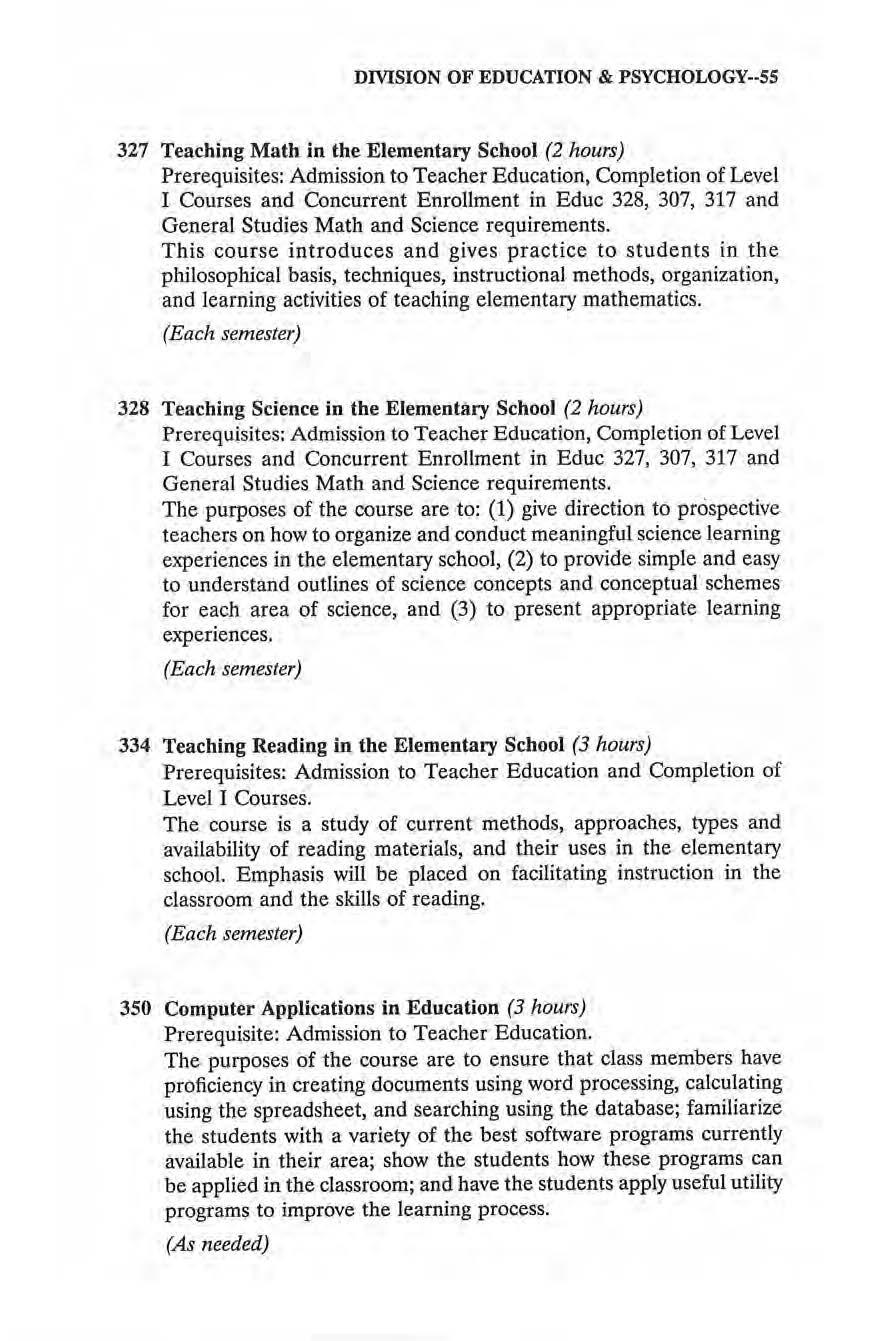
(Each semester)
328 Teaching Science in the Elementary School (2 hours)
Prerequisites: Admission to Teacher Education, Completion of Level I Courses and Concurrent Enrollment in Educ 327, 307, 317 and G e neral Studfos Math and Science requ irements. The purposes of the course are to: (1) give direction to prospective teachers on how to organize and conduct meaningful science learning experiences in the elementary school, (2) to provide simple and easy to understand outlines of science concepts and conceptual schemes for each area of science, and (3) to present appropriate learning experiences.
(Each semester)
334 Teaching Reading in the Elementary School (3 hours)
Prerequisites: Admission to Teacher Education and Completion of Level I Courses.
The course is a study of current methods, approaches, types and availability of reading materials, and their uses in the elementary school. Emphasis will be placed on facilitating instruction in the classroom and the skills of reading.
(Each semester)
350
Computer Applications in Education (3 hours)
Prerequisite: Admission to Teacher Educatio n.
The purposes of the course are to ensure that class members have proficiency in creating documents using word processing, calculating using the spreadsheet, and searching using the database; familiarize the students with a variety of the best software programs currently available in their area; show the students how these programs can be applied in the classroom; and have the students apply useful utility programs to improve the learning process.
(As needed)
DMSION OF EDUCATION & PSYCHOLOGY- -SS
375 E du cation of Gifted Learners (3 hours)
This course examines the historic and currently used definitions of gifted and talented, identifying characteristics, means of identifying and choosing the gifted and talented, individuals who have been identified in the present and past, and techniques. for teaching gifted and talented students in the regular classroom.
(Each Spring semester)
400 Philosophical Foundations of Education (3 hours)
Prerequisite: Taken immediately preceding Student Teaching, Philosophical Foundations of Education is a capstone course designed to assist the prospective teacher entering student teaching and, ultimately, the teaching profession. So that all students can draw on previously learned information when discussing the various objectives of the course, all elementary students will take this course during the semester prior to st ud ent teaching, and secondary students will take the course during their student teaching sem ester.
(Each semester)
401 Language Development and Reading Readiness (2 hours)
Prerequisites: Admission to Teacher Education and Psych 250. This course is designed to provide the learner with a background in the development of language and communication as prerequisites in reading readiness. Skills leading to reading and methods facilitating those skills will be addressed in a developmental approach.
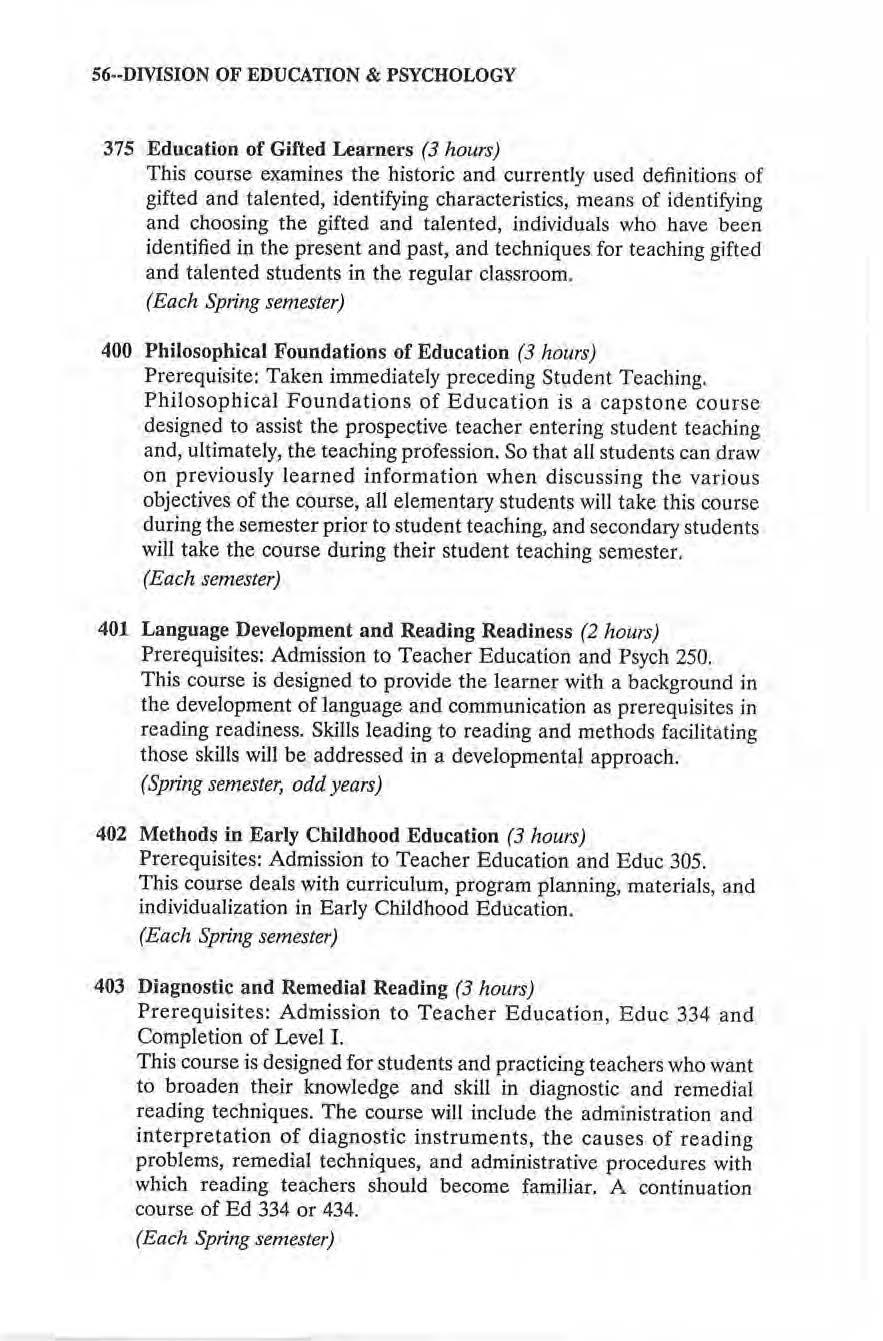
(Spring semester, odd years)
402 Methods in Early Childhood Education (3 hours)
Prerequisites: Admission to Teacher Education and Educ 305. This course deals with curriculum, program planning, materials, and individu alization in Early Childhood Education
(Each Spring semester)
403 Diagnostic and Remedial Reading (3 hours)
Prerequisites: Admission to Teacbet Education , Educ 334 and Completion of Level I.
This course is designed for students and practicing teachers who want to broaden their knowledge and skill in diagnostic and remedial reading techniques. The course will include the adm inistration and interpretation of diagnostic instruments, the causes of reading problems, remedial techniques, and administrative procedures with which reading teachers should become familiar. A continuation course of Ed 334 or 434.
(Each Spring semester)
56--DMSION OF
EDUCATION & PSYCHOLOGY
405 Diagnostic and Remed ial Mathematics (2 hours)
Prerequisites: SpEduc 200, Educ 327, Admission to Teacher Education.
This course is designed to provide a foundation in working with students who have special needs in the area of mathematics. Leaming theory and general techniques for dealing with instruction of students with special mathemat ics needs will be emphasized.
(Fall semester, even years)
410 Elementary Student Teach ing (8-16 hours)
Prerequisites: Admission to Student Teaching and Completion of Levels I and II.
A p ractical application of the principles of learning in the classroom with a progressive introduction into full teaching responsibilities at the elementary level. Students teach full-time for eight-sixteen weeks.
(Each semester)
411 Secondary Student Teaching (6-12 hours)
Prerequisites: Admission to Student Teaching and Completion of Levels I and II.
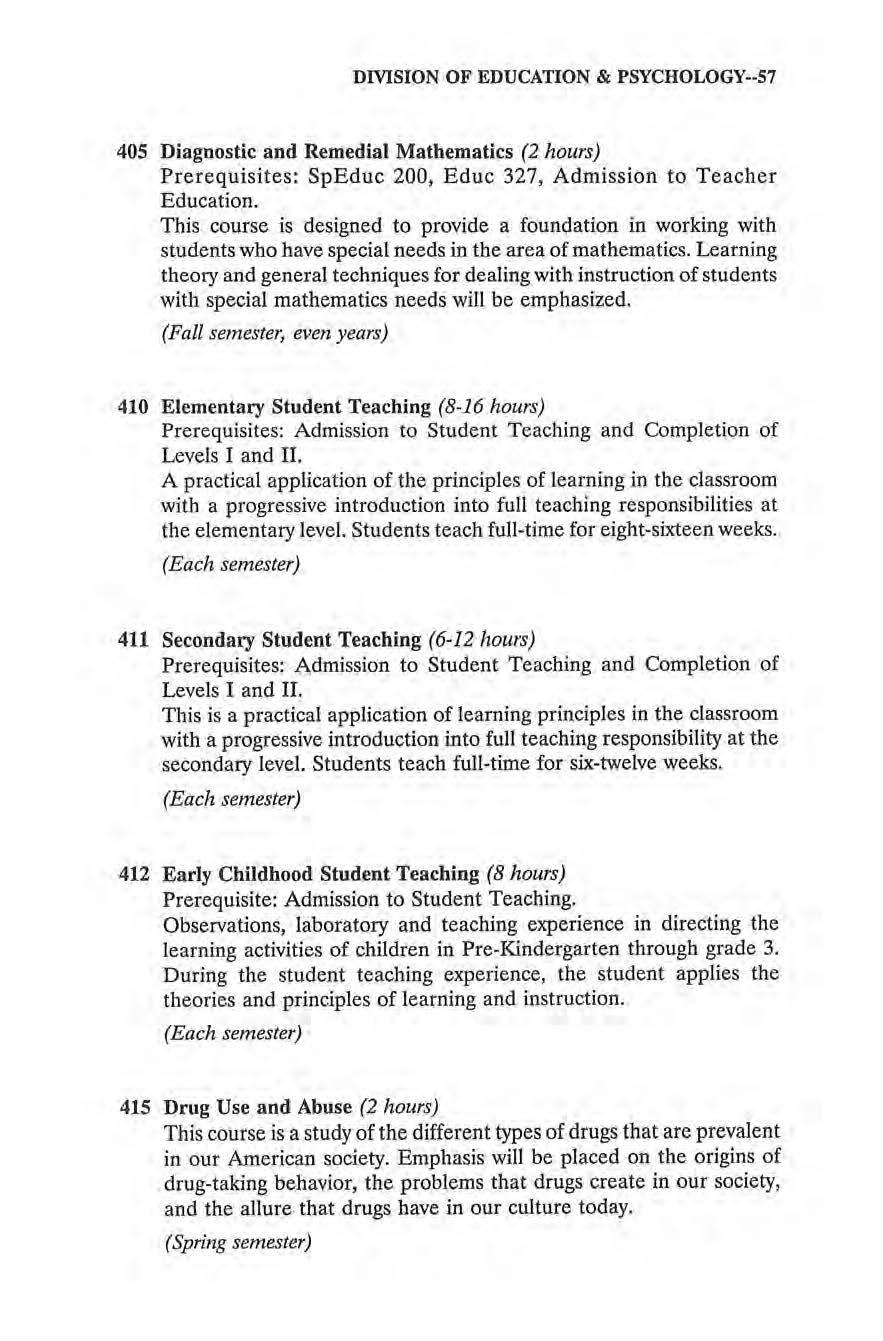
This is a practical application of learning principles in the classroom with a progressive introduction into full teaching responsibility at the secondary level. Students teach full-time for six-twelve weeks .
(Each semester)
412 Early Childhood Student Teach ing (8 hours)
Prerequisite: Admission to Student Teaching.
Observations, laboratory and teaching experience in directing the learning activities of children in Pre-Kinde rgarten through grade 3. During the student teaching experience, the student applies the theories and principles of learning and instru ction.
(Each semester)
415 Drug Use and Abuse (2 hours)
This course is a study of the different types of drugs that are prevalent in our American society. Emphasis will be placed on the origins of drug-taking behavior, the problems that drugs create in our society, and the allure that drugs have in our culture today.
(Spring semester)
DMSION OF EDUCATION & PSYCHOLOGY--57
434 Secondary Reading and Writing Across the Curriculum (3 hours)
Prerequisites: Admission to Teacher Education and Completion of Level I and Leve] II

The course will be a study of the current trends and practices in reading in the secondary schools. Emphasis will be placed on ways for teachers to improve reading skills for students as well as ways to use those skills to improve learning. The reading/writing relationship will be explored and students will b e introduced to the process method of writing instruction. Ways to incorporate t his method of writing into content area classrooms will be presented as well as other composition methods that can be used in the content areas .
(Each se1hester)
441 Cooperative Education Internship (1-12 hours)
Prerequisites: Upper-class standing, permissioh of Director of Cooperative Education and Chairperson of Education D ivision. This course is degjgned for any student majoring in any discipline listed within the Education Division and is to be taken near the end of the formal college course requirements. Students may enroll for 1-12 hours of credit upon approval of the Director of Cooperative Education and the Chairperson of the Education Division. Th e learning situation wilJ be organized and supervised by the Director of Cooperative Education. A minimum of forty hours of work experience will be required for each hour of credit for which t he student enrolls. This is not in lieu of the required teacher education practicums or student teaching.
(Each semester, Summer session)
498 Special Topics in Education (1-4 hours) Junior-Senior standing.
(Offered as needed)
499 Independent Study in Education (1-3 hours) Junior standing.
(Each semester)
Psychology
121 Introduction to Psychology (3 hours)
This course is a general introduction to contemporary psychology focusing on basic concepts, principles, terminology, trends in psychological research , and the application of this knowledge.
(Each semester)
58--DMSION OF EDUCATION & PSYCHOLOGY
205 Educational Psychology (3 hours)
This course will focus on the psychological principles underlying learning and effective teaching, the effect of social and personality factors on the learning process, and the application of learning theory to teaching.
(Each semester)
245 Psychology of Personality (3 hours)
This course will focus on the process of personality growth and adjustment. Through an examination of selected theoretical systems, different interpretations of this process will be presented.
(Fall semester, odd years)
250 Human Growth and Development (3 hours)
This course will focus on the physical, cognitive, social and emotional aspects of growth from birth through old age. In addition, factors thought to influence this growth will also be examined.
(Each semester)
255 Human Relations (3 hours)
Students will study issues of sens itivity to biases, perpetuation of biases in the use of language, critical examination of text books a nd other printed material for biases; contributions to our culture which have accompanied changes in demographic composition o f t he nation and leadership issues related to multi-cultural issues and appreciation of diversity in values, customs and styles, and personal interaction.
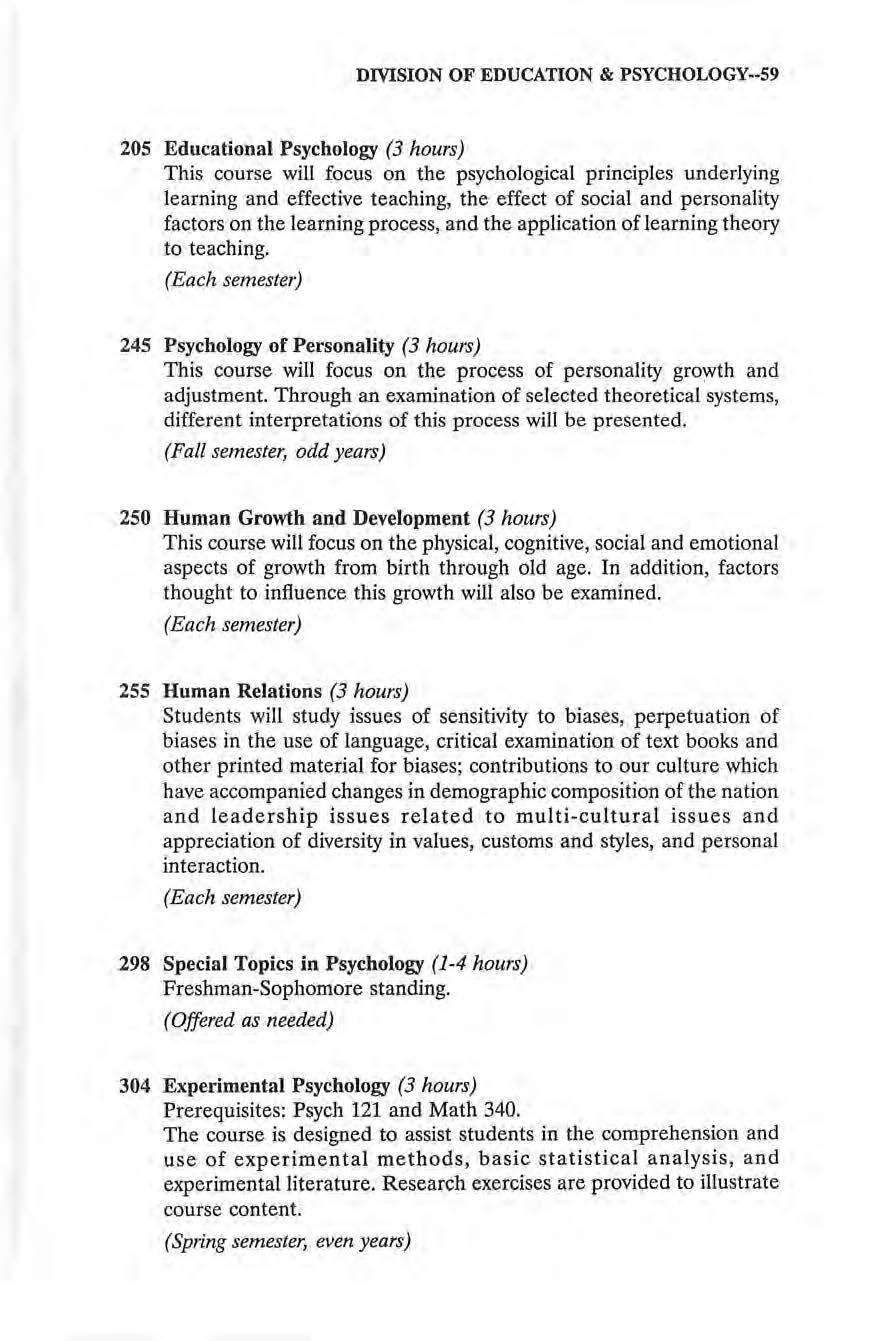
(Each semester)
298 Special Topics in Psychology (1-4 hours)
Freshman-Sophomore standing.
(Offered as needed)
304 Experimental Psychology (3 hours)
Prerequisites: Psych 121 and Math 340. The course is designed to assist students in the comprehension and use of experimental methods, basic sta tistica l ana lysis , and experimental literature. Research exercises are provided to illustrate course content.
(Spring semester, even years)
DMSION OF EDUCATION & PSYCHOLOGY--59
3 05 Social Psychology (3 hour.s)
Prerequ isite: Psych 121 or Soc 101.
Thi s course wilt focus on the effects of cultu re, society, social institutions, and socia l leantlng on the social attitudes and behavior of individuals within groups.
(Spring semester, odd years)
310 Psychology of Sports and Physkal Activities (3 hours)
Prerequisite: Psych 121.
This course examines the place of psychology in physical education and spor ts. It includes personality, attention and arousal, anxiety and intervention, theories of motivation, and social psychology of sports aggression, audience effects, team cohesion, and leadership in sports.
(Fall semester, even years)
320 Psychology of Learning (3 hours)
Prerequisite: Psych 121.
This course wi ll provide st udents with a broad, eclectic coverage of the field of learning and memory by addressing the wide range of issues an d problems within the field from stimulus-response to cognitive psychology.
(Spring semester, odd years)
431 Psychological Tests and Measurements (3 hours)
Prerequisites: Psych 121 and Math 340 or permission of the instructor.
The course will focus on the issues and problems surrounding psychological testing. Topics to be discussed include reliability, validity, construction, administration, nonns1 and interpretation as we ll as a swvey of current psychological tests.
(Fall semester, odd years)
437 Techniques of Counseling (3 hours)
Prerequisite: Psych 121.
The content, process, and practice of various counseling techniques wi11 be examined for their applicability to education, psychology and social work. Practical experience in the use of these techniques will also be provided.
(Spring semester, even years)

60--DMSlON OF EDUCATION & PSYCHOLOGY
438 Approaches to Parent and Family Counseling (3 hours)
Prerequisite: SpEd 200.
This course is designed for persons who are preparing to work with parents in family counseling. The changing nature and definition of "family" as it relates to today's society will be introduced. The eth ics, settings, referral process, basic counseling strategies and approaches will be addressed.
(Spring semester, odd years)
440 Behavior Management and Modification (3 hours)
Prerequisite: Psych 121.
The course will focus on the basic principles of behavior modification as well as survey some of the practical applications of this general approach to behavior change.
(Fall semester, even years)
45 0 Abnormal Psychology (3 hours)
Prerequisites: Psych 121, 250 and junior standing.
Focusing on persona li ty disorders, schizophrenia and manic depressives; this course would deal extensive ly with DSM -Ill-R categories of abnormal psychology.
(Spring semester, odd years)
498 Special Topics in Psychology (1-4 hours)
J unior-Senior stan ding.
(Offered as needed)
499 Independent Study in Psychology (1-3 hours)
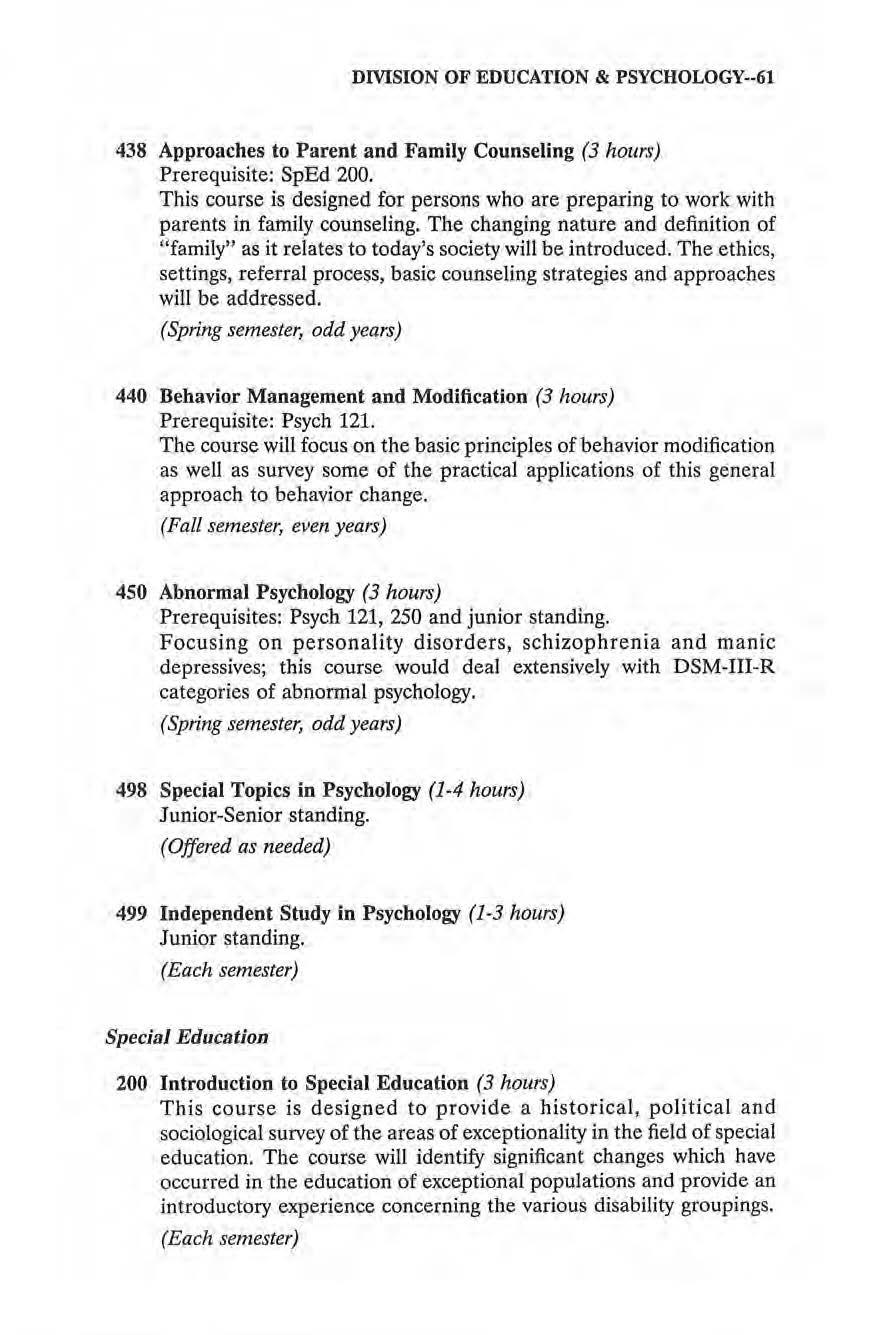
J unior standing.
(Each semester)
Special Education
200 Introduction to Specia l Education (3 hours)
This course is designed to provide a historical , political an d sociological survey of the areas of exceptionality in the field of special education. The course will identify significant changes which have occurred in the education of exceptional populations and provide an introductory experience concerning the var ious disabil ity groupings.
(Each semester)
DMSION OF EDUCATION & PSYCHOLOGY--61
280 Education of Learning Disab led (2 hours)
Prerequisite: SpEduc 200 or concurrent enrollment. This course has been designed to prepare the prospective teacher with the ability to diagnose deficit areas and areas of strengths, and to be able to know and implement various instructional procedures and appropriate educational materials for the L.D. child.
(Each Spring semester)
290 E d uca ti ou o f Menta lly Ha ndi capped Learne rs (2 hours)
Prerequisite: SpEduc 200 or concurrent enrollment. This course is designed to provide a survey of the characteristics, abilities, needs , the psychological and environmental, and cultural factors which contribute to retardation.
(Each Fall semester)
3 00 Assess ment in S pecial Ed ucation (3 hours)
Prerequisites: SpEduc 200, SpEduc 280, SpEduc 290 or concurrent enrollment, Admission to Teacher Education. Tests commonly used for children with suspected handicaps are interp reted.
(Each Fall semester)
307 Special Education Practicum (2 hours)
Prerequisites: Concurrent enrollment in SpEduc 430, Admission to Teacher Education.

The purpose of the course is to provide a classroom experience that will go beyond the observations provided in Education 207.
(Each semester)
405 Special Edu cation Early Childhood Cha racteristics and Methods (3 hours)
Prerequisites: SpEduc 200 and Admission to Teacher Education. This course is designed to enable the student to master the knowledge of the purposes, unique features, service delivery and issues in the neld of early childhood special education. Basic information about the foundations of early childhood special educat ion programs and sources of current research about this rapidly growing field will be studied. Current best practice instructional methods will be a major focus of this course.
(Spring semester, even years)
62--DMSION OF EDUCATION & PSYCHOLOGY
430 Methods in Special Education Program Management (3 hours)
Prerequisites: SpEduc 200, 280, 290, and Educ 375 or SpEduc 2 00 and Educ 405, Admission to Teacher Education. This course is designed to develop appropriate materials in the major area of academic study. Emphasis is on developing knowledge, skills, and techniques for successful teaching in special education.
(Each Fall semester)
435 Special Education Student Teaching (8 hours)
Prerequisite: Admission to Student Teaching. Observation, laboratory and teaching experience in the special education classroom. The student assumes full teaching responsibility.
(Each semester)
460 Career and Vocational Education for the Handicapped (2 hours)
Prerequisites: SpEduc 200, Admission to T eacher Education. The curriculum is designed to provide background information in vocational/career education for the mild/moderately handicapped. Vocational services, vocational evaluation, vocational counseling, work-study programs, job placement and follow-up, lesson plans and current models and materials used are included in the curriculum.
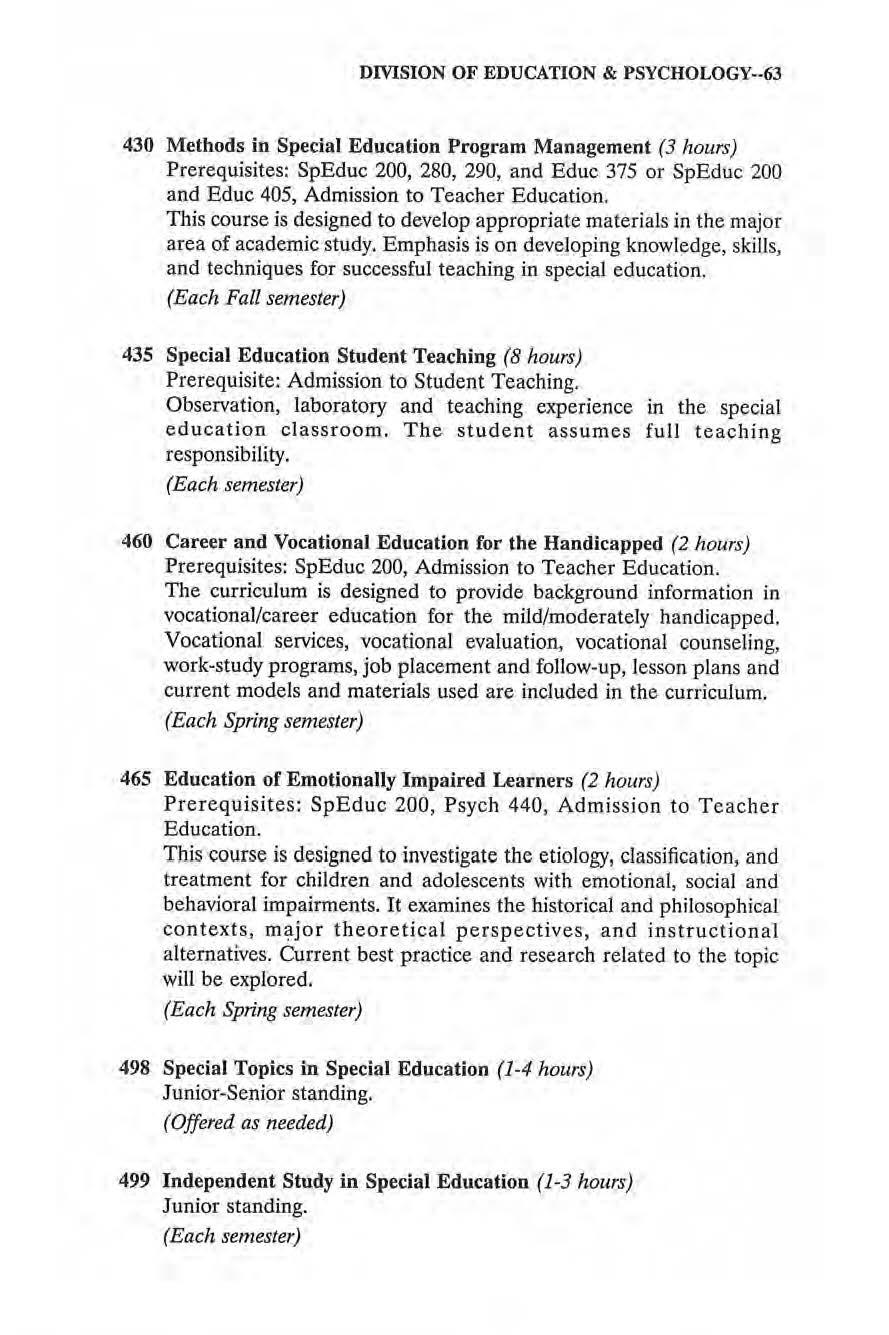
(Each Spring semester)
465 Education of Emotionally Impaired Learners (2 hours)
P rerequisites: SpEduc 200, Psych 440, A d mission to Teacher Education.
This course is designed to investigate the etiology, classification, and treatment for children and adolescents with emotional, social and behavioral impairments. It examines the historical and philosophical contextsJ m~jor theoretical perspectives, and instructional alternatives. Current best practice and research related to the topic will be explored.
(Each Spring semester)
498 Special Topics in Special Education (J-4 hours) Junior~Senior standing.
(Offered as needed)
499 Independent Study in Special Education (1-3 hours) Junior standing.
(Each semester)
DMSION OF EDUCATION & PSYCHOLOGY--63
Physical Education
Physical Education activities courses (PE 101-123) require two hours of attendance. Each student will be required to enroll in PE 100 Wellness. It wm be followed by two activity courses, of which one will be deve lopmental.

100 Wellness (2 hours)
This course is designed to acquaint the students with the philosophy, knowledge and techniques necessary to wr ite a personalized life -time fitness and we lln ess program. The course will include both theory and practical appl ication in the study of physical fitness and we!Jness , (Each semester)
101 Folk Dance-Maintenance (1 hour)
Prerequisite: PE 100.
A course designed to acquaint students with dance customs, steps, and formations from various countries (Fall seme3ter)
102 Square and Social Dance-Maintenance (1 hour)
Prerequisite: PE 100.
This course is designed to introduce students to danc e as a recreational and physical education activity. Dance elements and social responsibilities associated with dancing will be discussed. Various social and square dance patterns will be introduced. (Spring semester)
104 Golf-Maintenance (I lzoz1r)
Prerequisite: PE 100.
This course is designed to interest the beginning s tudent in golf. Emphasis will be placed on fundame ntal techniqu es of the game, rules of the game, and course etiquette. (Fall semester)
106 Badminton-Maintenance (Racquet Sports) (1 hour)
Prerequisite: PE 100.
This course is designed to introduce students to the fundamental skills a nd techniques of game. (Spring semester)
107 Basketball-Maintenance (1 hour)
Prerequisite: PE 100.
This course is designed to teach and de monstrate fundamental skil ls and techniques of basketball.
(Spring semester)
64- -DMSION OF EDUCATION &
PSYCHOLOGY
108 Soccer-Maintenance (1 hour)
Prerequisite: PE 100.
This course is designed to acquaint the students with the knowledge, techniques and rules of the game of soccer.
(Fall semester)
110 Tennis-Maintenance (1 hour)
Prerequisite: PE 100.
This course is designed to interest the beginning tennis player. Emphasis will be placed on basic fundamental skms of the game, rules of the game and court etiquette.
(Each semester)
111 Intermediate Tennis-Maintenance (1 hour)
Prerequisite: PE 100.
This course is designed to allow students to become more proficient in the game of tennis. Emphasis will be placed on advanced fundamental t echniques , strategy, and skill analysis.
(Each semester)
112 Beginning Swimming, Advanced Beginning Swimming a nd Basic Water Safety-Developmental (1 hour)
Prerequisite: PE 100.
This course is designed to introduce the student to the basic fundamentals of swimming. Emphasis will be p laced on basic strokes, advanced beginning strokes, rhythmic breathing, endurance, stroke modification and basic water safety.
(Fall semester)
113 Intermed iate Swimming and Basic Rescue - Deve lopmental (1 hour)
Prerequisite: PE 100.
This course is designed to help students become more proficient at swimming, techniques and rescue skills. Emphasis will be on endurance, versatility of swimming skills and aquatic emergencies. (Spring semeste,~
114 Advanced Swimming and Lifeguard Training-Developmental (1 hour)

Prerequisites: PE 100, Interm ediate swimming abil ity, and con sent of instructor.
This course is designed to allow the student to become proficient in life guarding techniqu es. Oppo r tunities for completion of requirements for Ame rican Red Cross Lifeguard Trainfog certificate.
(Fall semester)
DMSION OF EDUCATION & PSYCHOLOGY--65
115 Water Safety Instructor - Developmental (1 hour)
Prerequisites: PE 100 and 114.
This course is des igned to train students to instruct others in sw i mming skills. Emphasis will be place d on s tr oke analysis, movement in wa t er, teaching styles, demonstration ab ility , and endu rance capabilities.
(Spring semeste,)
116 Voll eyball-Maintenance (1 hour)
Prerequisite: PE 100.
This course is designed to introduce the student to vo lleyball as a coed recreational and physical education activity. Emphasis will be placed on volleyball skill tecimiques, playing strategies and rul es of the game .
(Fall semeste1)
117 Weight Training-Developmental (I hour)
Prerequ isite: PE 100.
This course is designed to introduce stude nt s to a variety of philosophies and stre ngth development techn iques. Emphasis will be placed on strengt h deve lopment, toning and endurance. Programs will be developed to meet individual needs.
(Each semester)
118 Softball-Ma inten ance (1 hour)
Prerequisite: PE 100.
This course is designed to assist the student or player in acqu iri ng the knowledge and skill s that are necessary for playing fast or slowpitch softba ll.
(Spring semester)
119 Restricted Activities-Developmental (I hour)

Prerequisite: PE 100.
This course is designed to meet the needs of stud ents who are unab le because of medical reasons to take general physical education act ivi ty courses. The class is on an individual basis, in o rde r to meet th e personal fitness needs of the student.
(Each semester)
120 Cycling-Developmental (1 hour)
Prerequisite : PE 100.
This course i s designed to teach the fundamen ta ls of cyc lin g tech niqu es. Stude nt must furnis h own bicycle.
(Spring semester)
66-- DIVISION OF EDUCATION &
PSYCHOLOGY
121 Aerobic Dance-Developmental (1 hour)
Prerequisite: PE 100.
This course is designed to introduce the student to a variety of aerobic conditioning activities and techniques. Emphasis is on body composition, body toning and cardiovascular endurance.
(Each semester)
122 Jogging-Developmental (1 hour)
Prerequisite: PE 100.
This course is desi gned to introduce the student to aerobic conditioning. Emphasis is on technique, aerobic capacity, .fitness development and individual student needs and abilities.
(Each semester)
123 Aquatic Fitness-Developmental (1 hour)
Prerequisite: PE 100.
This course is designed to introduce the student to a variety of aquatic fitness activities and techniques. Emphasis is on aerobic capacity, strength and flexibility.
(Each semester)
190 Varsity Sports (1 hour)
Requires successful participation in a varsity sport. (A maximW1Lof 4 hours may be applied to the qegr~e requirements.) N" \. L .
(Each semester) \kS, ..!.~(.\.~i W\. ,N .J.\-e.\. ~'-\-\11~1ry t-l.~14.-~.
201 Principles of Physical Education (3 hours)

Development of the field of Physical Education and its relationship to modern educational theory including history, principles of Physical Ed ucation as furnished by the basic sciences, and the philosophies of Physical Education.
(Fall semester)
203
Gymnastics - Tumbling (2 hours)
This course is designed to acquaint th e student with instructional techniques and skills in tumbling. Emphasis will be placed on ) teaching techniques, spotting, and evaluation. J t
(Fall semester, even years) M,~ 'fu&* l Q., U.,,>,.J) 1=b \ .J.. a,~H i ,,-QJ -
205
G~-S'<4J·r~i 1 : ~c h-~'1-( r-U(1'v' Health Education (3 hours)
A study of the function and care of the human body in health and disease with an emphasis on the harmful effects of stimrlan~ and narcotics . 4, l .n ..11 y.. { b .
(Fall s emeste1) /IA.. "Y._ ,w .(I.. \.-\.-S W l " 1 '1
DMSION OF EDUCATION & PSYCHOWGY--67
j- Gll,v,.,,_ J.'W
lli etl I\~"'£ ~Vi.:~ ,
~-\
207 Theory of Coac h ing (3 hours)
A study of the common problems facing coaches of interscholastic athletic programs. Emphasis is placed on scheduling, budgeting, organization of practice periods, pre and post-game management, and rules and interpretations.
(Sp,ing semester)
208 Theory of Footba ll and Volleyball (3 hours)
A study of offensive and defensive strategies in football and volleyball. Emphasis is placed on scheduling, budgeting, organization of practice periods, pre and post-game management, and ru les interpretation.
(Fall semester, odd years)
209 Theory of Basketball and Baseball (3 hours)
A study of offensive and defensive strategies in basketball and baseball. Emphasis is place on scheduling, budgeting, organization of practice periods, pre and post-game manageme nt, and rul es interpretation.
(Spring semester, even years)
210 Theory of Track and Softball (3 hours)
A study of techniques and skills required for events, organization of practice periods, management of meets and games, and rules interpretation. Includes organization and administration of the Peru Invitational Indoor Track Meet.

(Spring semester, odd years)
21S F irst Aid (2 hours)
American Red Cross course and lv!edica} Self Help~ ourse. 1
(Each semester) A\,1, /\ Jt- Lr I,{. 4. et/ '1-u ~IA.'+<1.J. T'( @'41.. $-t•lt •
216 Minor Sports (3 hours)
A study of the strategies and techniques involved in teaching selected Physical Education activities.
(Fall semester, even years)
230 Rhythms and Dance for Elementary Scbool (3 hours)
The exploration at an elementary level of the concepts and relationships of movement. Broadening the concept of self-education through the experience of basic rhythms and dance activities at the elementary level.
(Spring semeste,~ even years)
68 --DIVISION OF .EDUCATION & PSYCHOLOGY
J.
' J wt~\J\.
<1,.S. tr e..~ ~, I\J•"""'-"'·
232 Aquatics for Elementary School (2 hours)
Prerequisite: PE 112.
A program of aquatic activity, games and sports suited to the interests and capabiJities of the elementary student. In struction provid ed in skills, knowledge, and safety aspects of water related activities.
(Fall semester, odd ye4rs)
298 Special Topics in Physical Education (1-4 hours)
Freshman-Sophomore standing.
(Offered as needed)
3 00 Prevention and Care of Sports Injuries (3 hours)
Prerequisite: PE 312.
The nature and cause of injuries related to the physical activities of children and athletes.
(Spring semester)
3 09 Organization and Administration of Programs in Health and PE (2 hours)
Cons ideration of general principles of administrative techniques and responsibili ties for the field of Health and Physical Education.
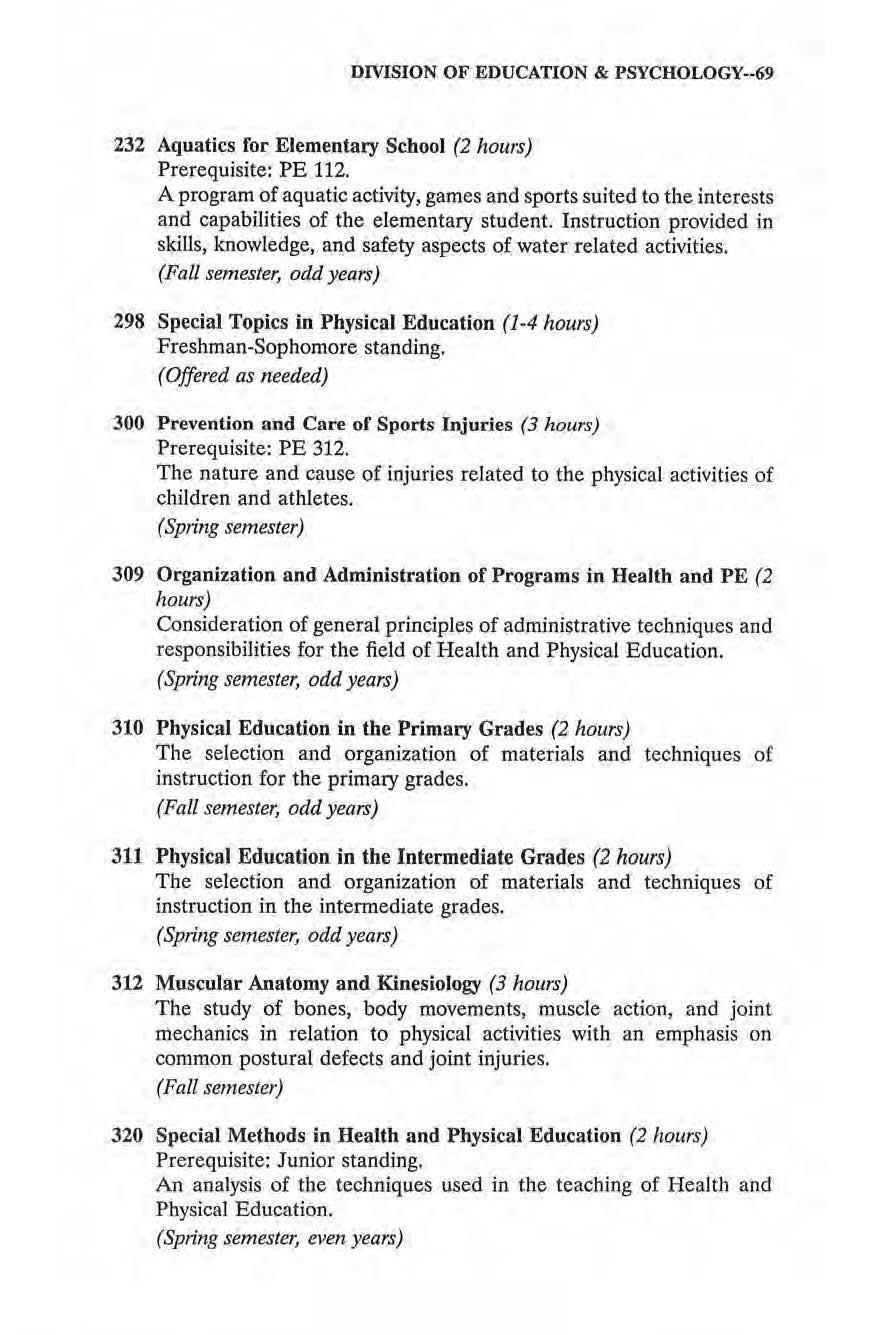
(Spring semester, odd years)
310 Physical Education in the Primary Grades (2 hours)
The selection and organization of materials and techniques of instruction for the primary grades.
(Fall semester, odd years)
311 Physical Education in the Intermediate Grades (2 hours)
The selection and organization of materials and techniques of instruction in the intermediate grades.
(Spring semester, odd years)
312 Muscular Anatomy and Kinesiology (3 hours)
The study of bones, body movements, muscle action, and joint mechanics in relation to physical activities with an em phasis on common postural defects and joint injuries.
(Fall semester)
320 Special Methods in Health and Physica l Education (2 hours)
Prerequisite: Junior standing.
An analysis of the techniques used in the teaching of Health and Physical Education.
(Spring semeste,; even yea rs)
DIVISION OF EDUCATION & PSYCHOLOGY--69
360 Physiology of Exercise (3 hours)
A working understanding of how exercise affects the diffe rent systems of the body.
(Spring semester)
411 Health Programs in th e Elementary School (3 hours)
Prerequisite: PE 205 .
The purpose of this course is to provide for the development of the elementary school health program. Emphasis will be placed on a schedule for Health instruction which will allow for planned teaching and integration of Health into the elementary school program.
(Fall semester, even years)
4 12 Founda tions o f E lementary and Second ary School Health {3 hours)

The purpose of the course is to provide a foundation for the implementing of an effective e lementary and secondary health instruction plan. Emphasis will be placed on materials essential to health instruction.
(Spring semester, even years)
414 Ski ll Progression in Athle ti c Performa nce (3 hours)
A study of the physical, psychological, and sociological factors governing the development of athletic skills from the time of birth to the utilization of these skills in interscholastic athletic competition.
(Fall semester)
415 The Developmen t o f Bas ic Lea rning Ab ilities (3 hours)
An introduction to screening, remedia l techniques, and activities involving basic learning abilit ies in the area of (1) gross-motor development, (2) sensory-motor integration, (3) perpetual-motor skills, and (4) social skills.
(Spring semester, odd years)
416 Test an d Meas u remen ts in Physical Ed uca tion (2 hours)
The purpose of this course is to p r ovide an understanding of essential statistical techniques, relevant measurement theory, and available tests to enable the student to develop valid methods of evaluation.
(Spring semester, even years)
4 17 Adaptive Physical Ed ucation (3 hours)
Prerequisites: Psych 250 and PE 312.
A study of philosophy, proced ures, and practices in adapted phys ical education.
(Spring semester, odd years)
70--DMSION OF
EDUCATION & PSYCHOLOGY
418 Administration of Interschool Athletics (2 hours)
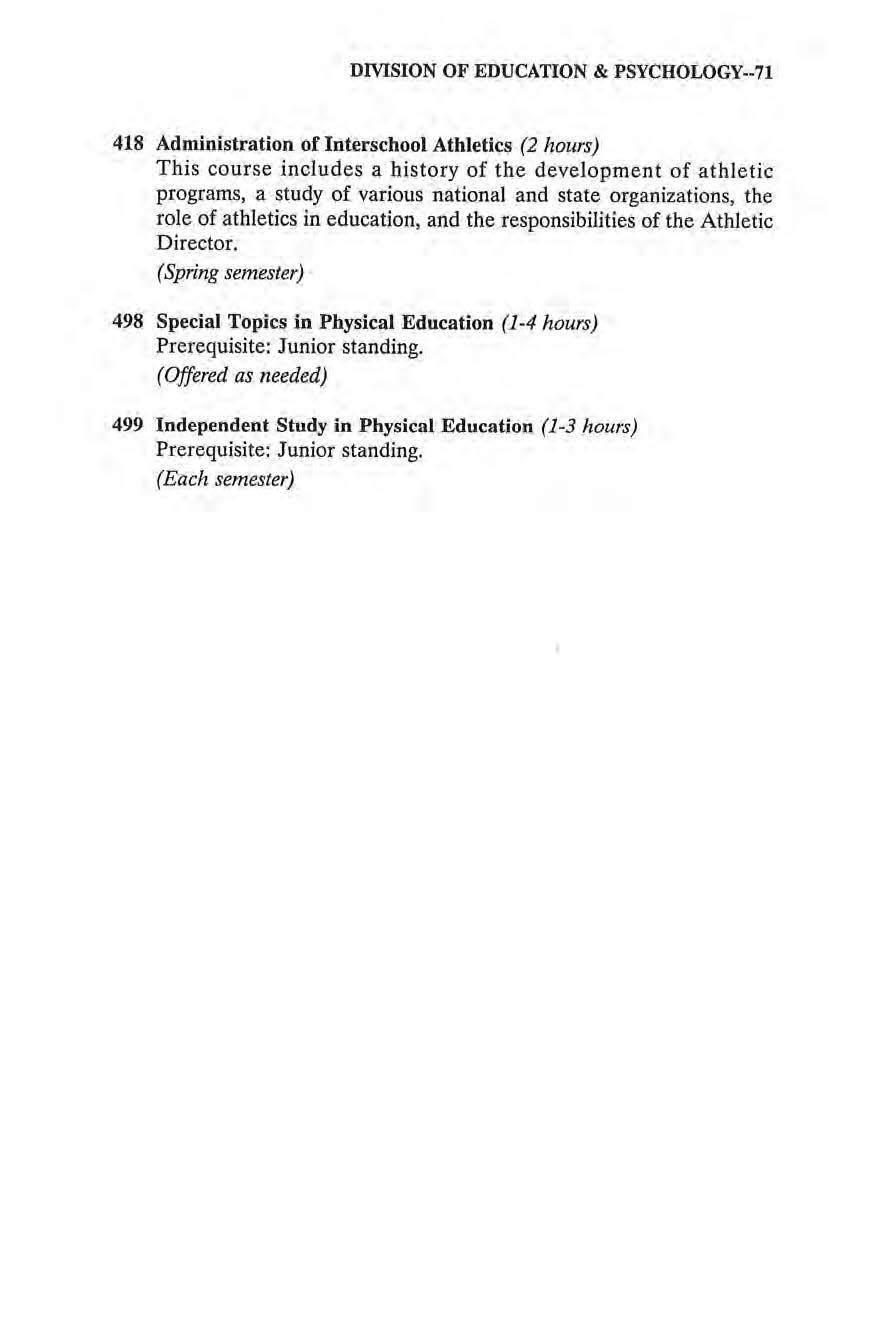
This course includes a history of the deve l opment of athletic programs, a study of various national and state organizations, the role of athletics in education, and the responsibilities of the Athletic Director.
(Spring semester)
498 Special Topics in Physical Education (1-4 hours)
Prerequisite: Junior standing.
(Offered as needed)
499 Independent Study in Physical Education (1-3 hours)
Prerequisite: Junior standing.
(Each semester)
DMSION OF EDUCATION & PSYCHOLOGY--71
DMSION OF HUMANITIES
Dr. David M. Edris, Chairperson
Professors: Barrett, Eckert, Ediger, Edris, Hahn, Harper, Sherwood
Associate Professors: Anderson, Davis
Assistant Professors: Holtz, Kruse, McCrann
Instructors: Emerson, V a n Oyen
The Division of Humanities offe rs majors in Art, English, Music, Psychology-Sociology, Social Science, and Speech and Drama. A curriculum has been developed for each of these areas designed to meet specific degree r equ irements and provide preparation for careers in teaching and nonteaching professions. The English Major provides options for either English or the broader area of Language Arts. The Social Science Major provides options for History, and the bro ader area of Social Sciences. The P sychology-Sociology major provides options for Psychology, Sociology, Psychology/ Sociology combined, and a Composite Human Services option. Majors in the visual and performing arts areas provide various t eaching and nonteaching options in Art, Music, and Speech and Drama.
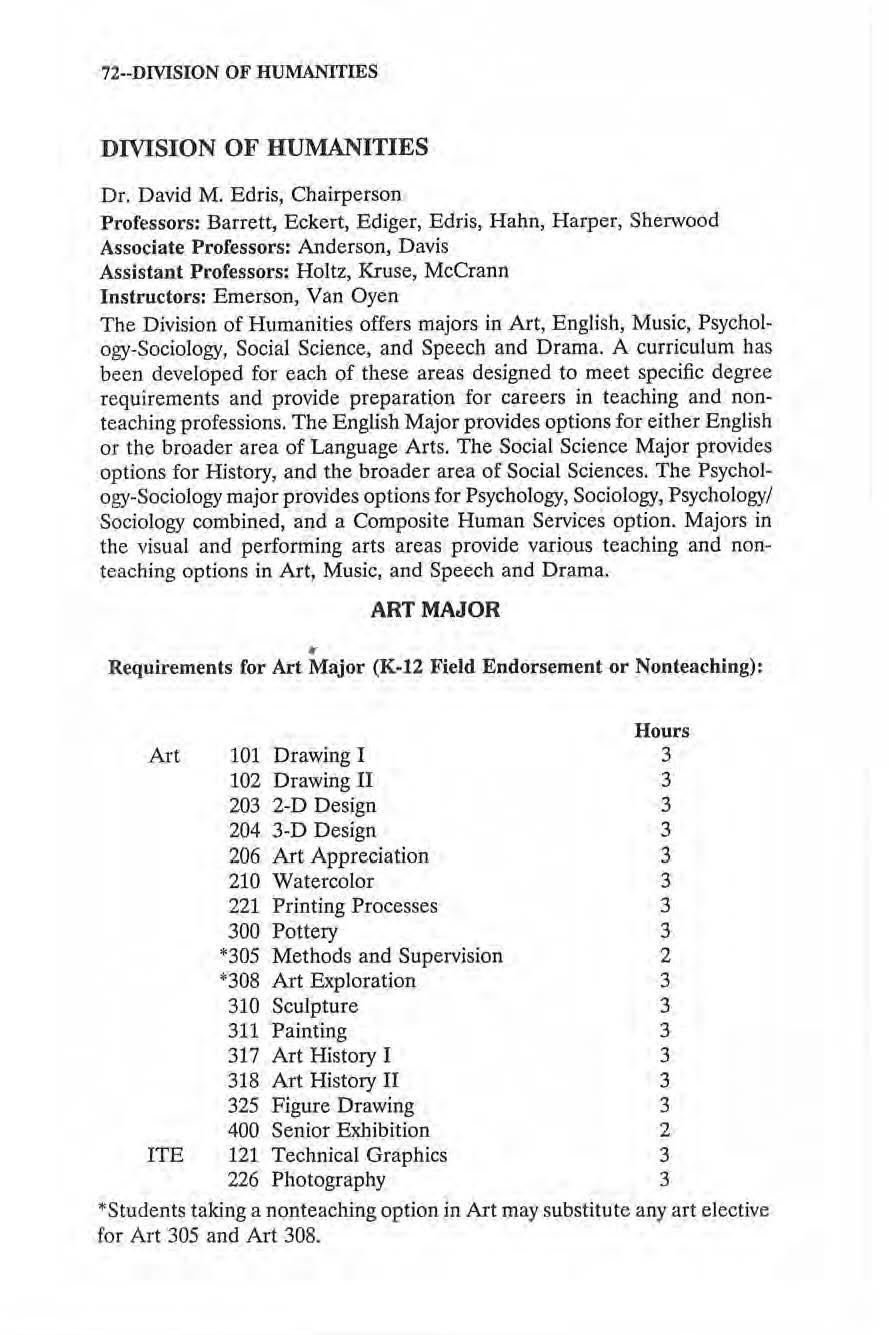
ART MAJOR
"'Students taking a nonteaching option in Art may substitute any art elective for Art 305 and Art 308.
72--DMSION
OF HUMANITIES
.. Requirements for Art Major (K-12 Field Endorsement or Nonteaching) : Art ITE 101 Drawing I 102 Drawing JI 203 2-D Design 204 3-D D esign 206 Art Appreciation 210 Watercolor 221 Printing Processes 300 Pottery *305 Method s and Supervision *308 Art Exploration 310 Sculpture 311 Painting 317 Art History I 318 Art History II 325 Figure Drawing 400 Senior Exhibition 121 Technical Graphics 226 Photography Hours 3 3 3 3 3 3 3 3 2 3 3 3 3 3 3 2 3 3
Art electives (select 6 hours from the following) 6
All students majoring in English must complete the English core requirements and the requirements for one of the listed options (A or B)
A. Requirements for English Language Arts Option (7-12 Field

DMSION OF HUMANITIES--73
Art 111 Lettering (3 hours) 300 Pottery (in addition to
3 hours) 310 Sculpture (in addition to required 3 hours) 311 Painting (in addition to requir ed 3 hours) 498 Special Topics in Art (1 to 4 hours) Total 58 ENGLISH
required
MAJOR
English Core Requirements: Hours 3 Eng 101 English Composition 201 Advanced English Composition 202 Appreciation of Literature 301 Traditional Grammar 440 History of the English Language Total 3 3 3 3 15
: Eng Speh Jour Educ 225 Short Story 309 Creative Writing 324 American Literature I 325 American Literature II 418 Shakespeare 152 Fundamentals of Speech 232 Introduction to Theatre 254 Public Speaking Hours 3 3 3 3 3 3 3 3 355 Play Production in the Secondary School 357 Interpretative Reading 3 3 3 3 2 1 100 Introduction to Mass Communications 234 Beginning JournaHsm 235 News Editing 401 Journalism Practicum 434 Secondary Reading and Writing Across the Curriculum 3
Endorsement)
Select 9 hours from the following with at least one course each from th e British Literature and Modem Literature selections.
*Students preparing to teach in mjddle school or junior h igh school are required to take Eng 203.
B. Requirements for English Option (7-12 Subject En dorsement 01· N
Select 9 hours from the following with at least one course each from th e British Literature and Modern Literature selections

74--DMSION OF BUMANITlES
British Literature: Eng 318 Early Romantic Literature 321 Romantic Period 323 Victorian Period Modern Literature: Eng 307 Seminar in the Modern Novel 328 Modern Poetry 443 Modern Drama Cieneral Literature: *Eng 203 Literature for Children through Adolescence 222 The Hellenic-Hebraic Tradition 306 Nebraska Literature 441 Pre-Shakespearean Drama 442 Post-Shakespearean Drama Total 3 3 3 3 3 3 Hours 3 3 3 3 3 51
Hours "'Eng 305 Practicum in Composition 3 309 Creative Writing 3 324 American Literature l 3 325 American Literature TI 3 418 Shakespeare 3 Speh 357 Interpretative Reading 3 Journ 234 Beginning Journalism 3 *Educ 434 T eaching Secondary Reading 3
onteaching):
B ritish Literature: Eng 318 Early European Literature 321 Romantic Period 323 Victorian Period 3 3 3
*Students taking a nonteaching option in English may s ubstitute for Eng 305 and Ed 434 any course from the English electives.
**Students preparing to teach in middle school or junior bjgh school are required to take Eng 203.
MUS IC MAJOR
Alt students majoring in Music must complete the Music Core Requirements and the requirements for one of the listed options (A, B, or C).

DMSION OF HUMANITIES--75 Modern Literature: Eng 307 Seminar in the Modern Novel 328 Modern Poetry 443 Modern Drama General Literature: **Eng 203 Literature for Children through Adolescence 222 The Hellenic-Hebraic Tradition 225 The Short Story 306 Nebraska Literatur e 441 Pre-Shakespearean Drama 442 Post-Shakespear ean Drama Total 3 3 3 3 3 3 3 3 3 33
Music Core Requirements: Mus 141 Music Theory I 142 Music Theory II 241 Music Theory III 242 Music Theory IV 441 Music History I (Antiquity to 1750) 442 Music History II (1750 to present) 462 Conducting Total Hours 3 3 3 3 2 2 2 18
Candidates for the K-12 Vocal/In strumental Music Field Endorsement must (1) give a 30 minute recital at the conclusion of the junior level of applied music studies, (2) pass a piano proficiency examination prior to the "professional semester," and (3) have formal experience on a wind instrument, a keyboard instrument, and voice.

B. Requirements for Vocal/Elementary Music Option (K-6 Subject Endorsement):
Candidates for the K-6 Vocal/Elem e ntary Music Subject Endorsement must pass a piano profici ency examination prior to the "professional semester."
76--DIVISION OF HUMANITIES
Mus 101 College Band or 102 College Choir 7 251 Elementary Music Methods 2 252 Secondary Music Methods 2 341 Mus ical Form and Counterpoint 3 342 Arranging 2 351 Brass Methods 2 352 Woodwin d Methods 2 36 1 String Methods 2 362 P e rcussion Methods 2 451 Integrated Studies - Instrumental 2 452 Integrated Studies - Vocal 2 Applied Music (select 10 hours as follows) Major performance area (voice, instrument, or keyboard) 4 Instrument 2 Voice 2 Piano 2 Total 38
A. Requirements for Vocal/Instrumental Music Option (K-12 Field Endorsement):
Mus 102 College Choir 113 Class Guitar 251 Elementary Music Methods 342 Arranging Hours 4 1 2 2 Applied Music (select 8 hours as follows) Major performance area (voice, instrument, or keyboard) 2 Instrlll)]ent 2 Voice 2 2 Total 17
C. Requirements for Music • Nonteaching Option:
All students majoring in the Music - Nonteaching option, in addition to completing the Music Core Requirements, must satisfy the requirements for one of the listed options (C.1. through C.5.). Students completing one of the performance options must give a Junior Recital and a Senior Recital. Students completing the Music - Nonteaching Option must give a Junior Recital.
C.l. Requirements for Music • Nonteaching Option:
Applied Music:
Major applied area (voice, instrument, keyboard)
Secondary applied area (voice, instrument, keyboard)
C.2. Requirements for Vocal Performance Option
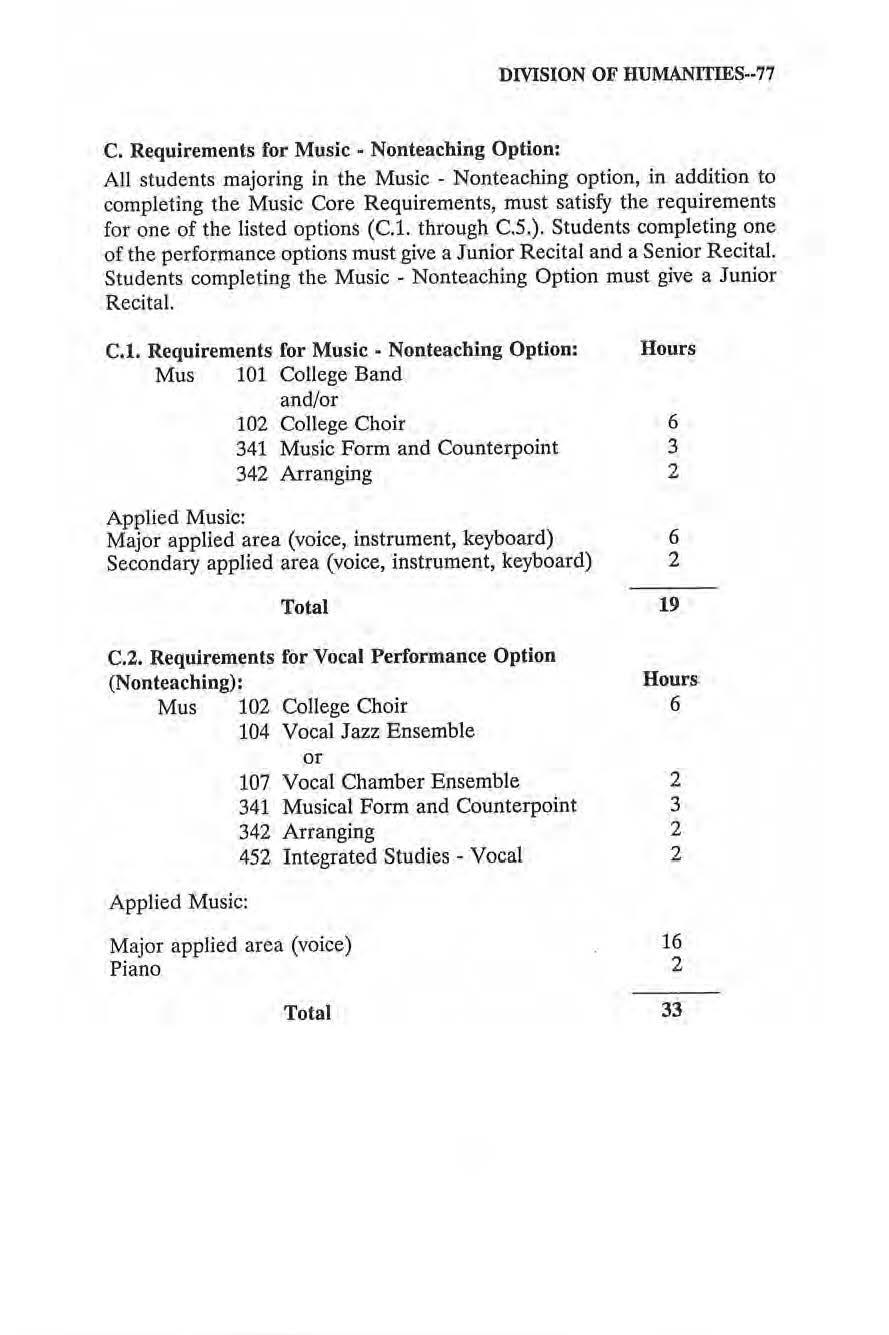
DMSION OF HUMANITIES--77
Mus 101 College Band and/or 102 College Choir
Music Form and Counterpoint
Arranging
341
342
Total
(Nonteaching): Mus 102 College Choir 104 Vocal Jazz Ensemble or 107 Vocal Chamber Ensemble 341 Musical Form and Counterpoint 342 Arranging 452 Integrated Studies - Vocal Applied Music: Major applied area (voice) Piano Total Hours 6 3 2 6 2 19 Hours 6 2 3 2 i 16 2 33
C.5. Requirements for Music Marketing Option (Nonteaching):
Students who select one of the Music - Nonteaching options may combine selected studies in business with the compl e ted Music Core Requirements and one of the above listed nonteaching options in order to prepare for a career in the music industry. Below are suggested business courses. The busin e ss requirements may be selected through consultation with a business advisor, tailoring the program to meet each student's needs or special business interests. 'Twenty-one hours of business courses are required.
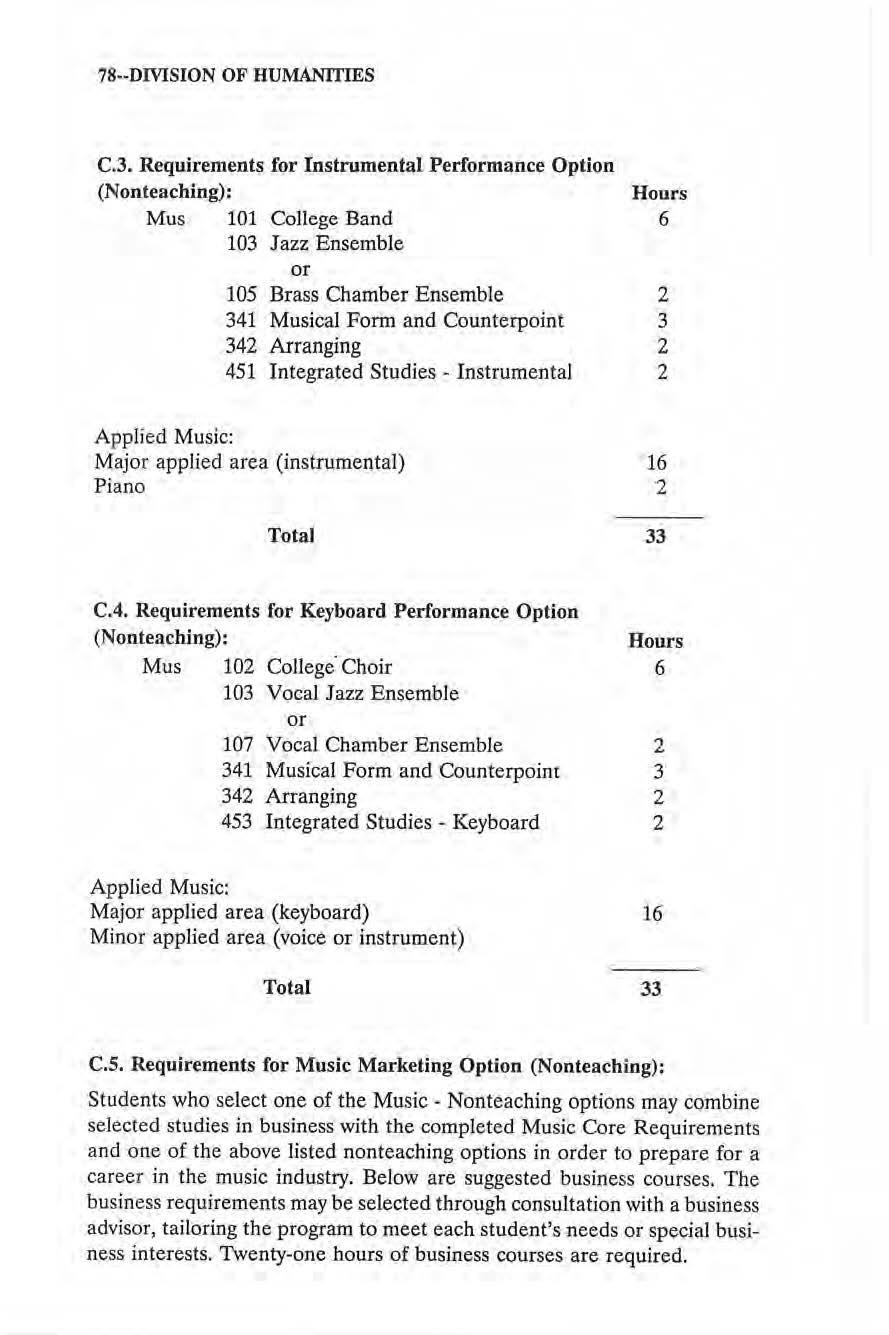
78--DMSION OF HUMANITIES
Instrumental Performance Option (Nonteaching): Mus 101 College Band 103 Jazz Ensemble or Hours 6 105 Brass Chamber Ensemble 2 341 Musical Form and Counterpoint 3 342 Arranging 2 451 Integrated Studies - Instrumental 2 A p plie d Music: Majo r applied area (instrumental) Piano Total
C.3. Requirements for
(Nonteaching): Mus 102 College· Choir 103 Vocal Jazz Ensemble or 107 Vocal Chamber Ensemble 341 Musical Form and Counterpoint 342 Arranging 453 Integrated Studies - Keyboard Applied Music: Major applied area (keyboard) Minor applied area (voice or instrument) Total 16 2 33 Hours 6 2 3 2 2 16 33
C.4.
Requirements
for Keyboard Performance Option
NOTE: It is the policy of the Music D epartment that all Music majors participate in band or choir each semester.
Mu sic students are required to attend recitals and concerts in partial fulfillment of their graduation requirements. Mus ic majors working toward a Bachelor of Fine Arts degree in Education are required to give a junior recital. Music majors working toward a Bachelor of Science or a Bachelor of Arts degree are required to give a junior and senior r ecital.
Applied Music: Private instruction is provided in voice, piano, woodwinds, brass and percussion. The re is no charge for private lessons to students within the department. Those outside the department may register for lessons at the established rate.
Music education majors are required to show a proficiency in piano to meet the demands of their classroom activities. At least two semester hours of private voice instruction are required for music education majors .
Psychology-Socio l ogy Major
Students majoring in Psychology-Sociology must complete the Psycho logySociology Core Requirements and the requirements for one of the listed options (A through D).

DMSION OF HUMANffiES--79 Suggested Business Requirements: Bus 250 Salesmanship 328 Principles of Marketing 411 Marketing Strategies 412 Sales Management 413 Purchasing 430 Industria l Market ing Eng 308 Technical Writing Total Hours 3 3 3 3 3 3 3 21
Psychology-Sociology Core Requirements: P sych 121 Principles of Psychology 255 Human Relations Soc 201 Principles of Sociology Total Hours 3 3 3 9
Electives (select 9 hours in one or more areas listed below)

80--DIVISION OF HUMANITIES
Requirements for Psychology/Sociology Option (Nonteacbing) : Psych 245 Psychology of Personality 250 Human Growth and Development 305 Social Psychology 320 Psychology of Leaming Soc 250 Community Organization
one) 300 Contemporary Social Problems 320 Sociology of Education 340 The Family 420 History and Introduction to Modern Sociological Theory Psych 440 Behavior Modification or 450 Abnormal Psychology (Select one) Hours 3 3 3 3 3 3 3 3 3 3 Soc. 225 Introduction to Cultural Anthropology 3 or 230 Soci9logy of Women 3
A.
(Select
Psychology electives Sociology electives Social Work electives Total
Requirements for Psychology Option (7-12 Subject Endorsement or Nonteaching): Psych 245 Psychology of Personality 250 Human Growth and Development 305 Social Psychology 320 Psychology of Learning 440 Behavior Modification 450 Abnormal Psychology 9 42 Hours 3 3 3 3 3 3
B.
Electives from one or more of the social science cognate areas of anthropology, economics, geography, history (not including Hist 400), political science, or sociology.
*Students taking a nonteaching option in Psychology may s ubsti tute any psychology e lective for Hist 400.
C. Requirements for Sociology Option (7- 12 Subject Endorsement or Nonteaching):
*Students taking a nonteaching option in Sociology may substitute any sociology elective for Hist 400.
D. Requirements fol' Composite Human Services Option (Nonteachin g): In addition to completing the Psychology-Sociology Core R e quirements, the student must compl ete the Composite Human Services Core Requirem ents and one other cognate area listed (1, 2, or 3). Field Work practicums or internships taken to satisfy requirements in one cognate area may not be applied to another.

DMSION OF BUMANITIES-·81 Electives iri psychology 6 *Hist 400 Methods of Teaching History and Social Science 2
3 Total 29
Soc 250 Community Organization 300 Contemporary Social Problems 320 Sociology of Education 340 The Family 420 History a nd Introductio n to Modern Sociological Theory Electives in Sociology Hours 3 3 3 3 3 12 *Hist 400 M ethods of Tea ching His tory and Social Science 2 Total 29
Co mpos ite Human Services
Psych 250 D evelopmental Psychology 305 Social Psychology Soc 250 Communi ty Organization 260 Rural Sociology 300 Contemporary Social Problems 340 The Family Hours 3 3 3 3 3 3
Col'e Requirem e nts:

82--DIVISION OF HUMANITIES Sociology Elective (select one listed below) 3 Soc 360 Criminology or 370 Ethnic Group Relations or 420 History and Intro to Modern Sociological Theory SoWk 280 Introduction to Social Work 3 310 Social Services 3 375 Casework 2 390 Groupwork 2 430 Fieldwork Practicum 3 Coll 400 Career Strategies 1 Government Elective (select one listed below) PSci 201 American National Government or 202 State and Local Government Total 3 38 Composite Human Services Cognate Areas (Select 1, 2, or 3): 1. Mild/Moderately Handicapped Services Cognate: SpEduc 200 Introduction to Special Education 370 Education of Emotionally Impaired Learners 460 Career and Vocational Education for the Handicapped PE 312 Kinesiology and Anatomy 417 Adaptive Physical Education Psych 437 Techniques of Counseling 440 Behavior Modification Hum 441 Cooperative Education Internship Elective (select one listed below) Speh 353 Speech Correction and Development or CEc 332 Nutrition Total Hours 3 3 2 3 3 3 3 1 3 24
All students majoring in Social Science must complete the Social Science Core Requirements and the requirements for one of the listed options (A or B).

DMSION OF HUMANITIES--83 2. Industrial/ Organizational Serv ices Cognate: Bus 338 Principles of Marketing 373 Organizational Behavior 414 Supervisory Problems 434 Human Resource Management Psych 245 Psychology of Personality 437 Techniques of Counseling Hum 441 Cooperative Education Internship Total 3. Leisure Management Services Cognate: Bus 338 Principles of Marke ting 434 Human Resource Management PE 205 Health Education 2 15 First Aid Hours 3 3 3 3 3 3 1 19 Hours 3 3 3 2 312 Kinesiology and Anatomy 3 360 Physiology of Exercise 3 415 Development of Basic Learning Abilities 3 CEc 332 Nutrition 3 Hum 441 Cooperative Education Internship 1 Total 24 SOCIAL SCIENCE MAJOR
Social Science Core Requirements: Hist 113 American History before 1865 114 American History after 1865 201 World History before 1500 202 World Civilization after 1500 Total Hours 3 3 3 3 ll
OF HUMANITIES
A. Requirements for Social Science Option (7- 12 Field Endorsemen t):
the 12 hour social science cognate area above, select electives in the remaining social science cognate areas of anthropology, economics, geography, political science,
with
*S tudents taking a nonteaching option in Social Science may substitute any history elective for Hist 400.
B. Requiremen ts for History Option (7-12 S ubje ct Endorsement or Nonteachiog):
*Students taking a nonteach ing option in History may substitute any history elective for Hist 400.
SPEECH AND
MAJOR
Students majoring in Speech and Drama must complete the Speech and Drama Core Requirements and the requirements for one of the listed options (A or B).

84--DMSION
Hours Electives in history 12
400 Methods of Teaching History and Social Science 2
12
24
50
*Hist
Electives in one of the social science cognate areas of economics, geography, political science, psychology, or sociology.
Excluding
psychology, or sociology,
at least 3 hours in each cognate area.
Total
Hours Electives in history 18 *Hist 400 Methods of Teaching History and Social Science 2 Electives from one or more of the social science cognate areas of anthropology, economics, geography, political science, psychology, and sociology. 6 Total 26
DRAMA
Speech and Drama Core Requirements: Speh 152 Fundamentals of Speech 232 Introduction to Theatre 235 Stagecrafts 254 Public Speaking 353 Speech Correction and Development 357 I nterpretative. Reading Tota l Ho urs 3 3 3 3 3 3 18
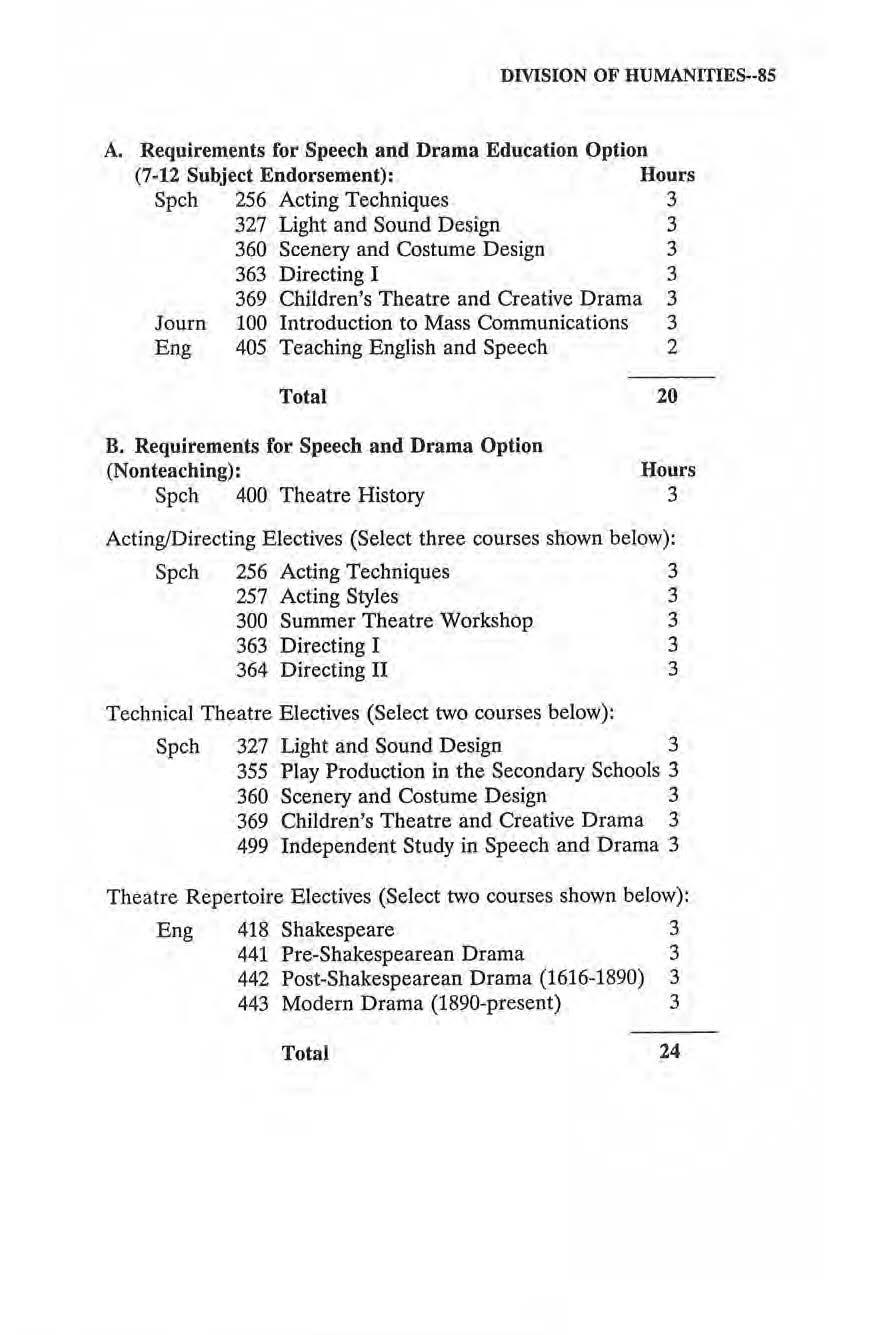
DIVISION OF lllJMANITIES--85
for Speech and Drama Education Option (7-12 Subject Endorsement): Hours Speh 256 Acting Techniques 3 327 Light and Sound Design 3 360 Scenery and Costume Design 3 363 Directing I 3 369 Children' s Theatre and Creative Drama 3 Journ 100 Introduction to Mass Communications 3 Eng 405 Teaching English and Speech 2 Total
for Speech and Drama Option (Non teaching): Speh 400 Theatre History 20 Hours 3 Acting/Directing Electives (Select three courses shown below): Speh 256 Acting Techniques 3 257 Acting Styles 3 300 Summer Theatre Workshop 3 363 Directing I 3 364 Directing II 3 Technical Theatre Electives (Select two courses below): Speh 327 Light and Sound Design 3 355 Play Production in the Secondary Schools 3 360 Scenery and Costume Design 3 369 Children's Theatre and Creative Drama 3 499 Independent Study in Speech and Drama 3 Theatre Repertoire Electives (Select two courses shown below): Eng 418 Shakespeare 3 441 Pre-Shakespearean Drama 3 442 Post-Shakespearean Drama (1616-1890 ) 3 443 Modern Drama (1890-present) 3 Total 24
A. Requirements
B. Requirements
Pre-Legal Study
Adequate preparation for entrance into a ranking law school requires a bachelor's degree. Neither the committee on pre-legal education of the American Bar Association nor leading law schools specify a particul a r un ~ dergra duate major or prescribe a specific pre-law program, but they do stress the ability to read perceptively, to write intelligently, to use a library, and to evaluate evidence.
Success in law school requires intellectual depth and breadth as well a s certain skills and insights relevant to law study. Since many of the goals of legal education are also the goals of liberal education, law schools recommend that pre-law students obtain the widest possible undergraduate experience consistent with their professional objectives. Literate, wellinformed students with broad general educations tend to succeed in Jaw school. Those students aspiring to enter Jaw school, then , may major and/ or mi.nor in any number of fields that will aid them fo attaining the followin g :
" Skills in writing and oral communication.

* A broad understanding of the English language.
* A solid background of American history and government.
* A broad knowledge of society and its i nstitutions.
* A fundamental understanding of business, including basic accounting skills.
* Critical thinking and the ability to reason.
The undergraduate cutticula of Peru State College provides a sound foundation for pre-law study and offer students an opportunity to challenge and expand their capacities to the fullest. Students p lanning a legal career should inform their academic advisor of this fact early in their undergraduate years in order for the students and the advisor to make important decisions regarding tbe selection of courses. During the senior y.e ar the student will need to register for the Law School Admissions Test (LSAT). Acceptance into law school will depend upon many factors, of which scores on the LSAT and grade point average are usually but partial criteria.
86--DMSION OF HUMANITIES

DMSION OF HUMANITIES--87 Suggested Pre~Law Courses English 075 Speed Reading 301 Traditional Grammar 308 Technical Writing 309 Creative Writing Speech 254 Public Speaking 357 Interpretative Reading History 113 U.S. History Before 1500 114 U.S. History After 1500 201 World Civilization to 1500 202 World Civilization since 1500 Political Science 201 American National Government Sociology 201 Principles of Sociology 225 Introduction to Cultural Anthropology Business 231 Principles of Financial Accounting Economics 220 Principles of Macroeconomics Math 340 Statistics Philosophy 201 Introduction to Philosophy Suggested Major Fields of Study English History Social Science Sociology Business
Art
Course Descriptions

101 Drawing I (3 hours)
A study of basic drawing techniques using a variety of drawing media. (Each Fall semester)
102 Drawing II (3 hours)
Prerequisite: Art 101.
A continuation of Drawing I with an emphasis on figure drawing and improving of techniques.
(Each Spring semeste,~
1t1 Lettering (3 hou rs)
This course introduces the student to the single stroke, Gothi c Roman, manuscript alphabets, poster design, an d commercia l techniques.
(Each Fall semester)
203 2-D Design (3 hours)
A study of two-dimensional design with an emphasis on color theory. (Each Spring semester)
204 3-D Design (3 hours)
A study of three-dimensional design using a variety of media.
(Each Fall semester)
206 Art Appreciation (3 hours)
The study of art principles throug h crafts, painting, sculpture, and architecture.
(Each semester)
210 Water Col o r Painting (3 hours)
Prerequisite: Art 101 , 102, 203.
This course emphasizes compositions in color using opaque and transparent water color.
(Each Spring semester)
22.1 Printing Processes (3 hours)
This course introduces the history and techniques of the graphic arts of block printing, etching, lithography, and silk screen printing.
(Each Spring semester)
88--DMSION OF HUMANITIES
298 Special Topics in Art (J-4 hours)
Freshman-Sophomore standing.
(Offered as needed)
300 Pottery (3 hours)
Prerequisite: Art 204.
This course offers experiences in hand-built and thrown projects including a basic study of glaze preparation and clay analysis. Students are limited to 3 hours credit per semester. This course may be repeated for a total of 6 hours.
(Each Fall semester)
305 Methods and Supervision (2 hours)
Prerequisites: Art 101, 103, and 203 or 204.
The study of contemporary art education teaching techniques, lesson plans, teaching experiences, and the ordering of materials with an emphasis upon the use of materials in the school art program.
(Each Spring semester)
308 Art Exp loration (3 hours)
A study of the purpose of art education in the elementary school program. The student is presented with a survey of the history and philosophy of art in t he elementary school and becomes active ly involved i n art activities designed for the elementary school classroom.

(Each semester)
310 Sculpture (3 hours)
Prerequisite: Art 203.
T his course introduces experiences in three-dimensional form using a variety of materials. Students are limi ted to 3 hours credit per semester. The course may be repeated for a total of 6 hours.
(Each Spring semester)
3U Painting (3 hours)
Prerequisites: Art 101, 203.
Trus course introduces s tud io activities in acrylic painting techniques. Students are limited to 3 hours credit per semester. The course may be repeated for a total of 6 hours.
(Each Fall semester)
DMSION OF HUMANITIES- -89
317 Art History I (3 hours)
A study of painting, scu lp ture, and architecture from ancient times to the Baroque. (Fall semester, even years)
318 Art History ll (3 hours)
A study of art from the 1800s through contemporary a rt trends. (Fall semester, odd years)
325 Figure Drawing (3 hours)
Prerequisite: Art 101, 102, 203.
F igure Drawing is a course that deals with drawing of the human anatomy from live models.
(Each Fall semeste,)
400 Senior Exhibition (2 hours)
Prerequisite: Senior standing.
(Each semester)
498 Special Topics in Art (1-4 hours)
Junior-Senior standing.
(Offered as needed)
499 Independent Study in Art (1-3 hours)
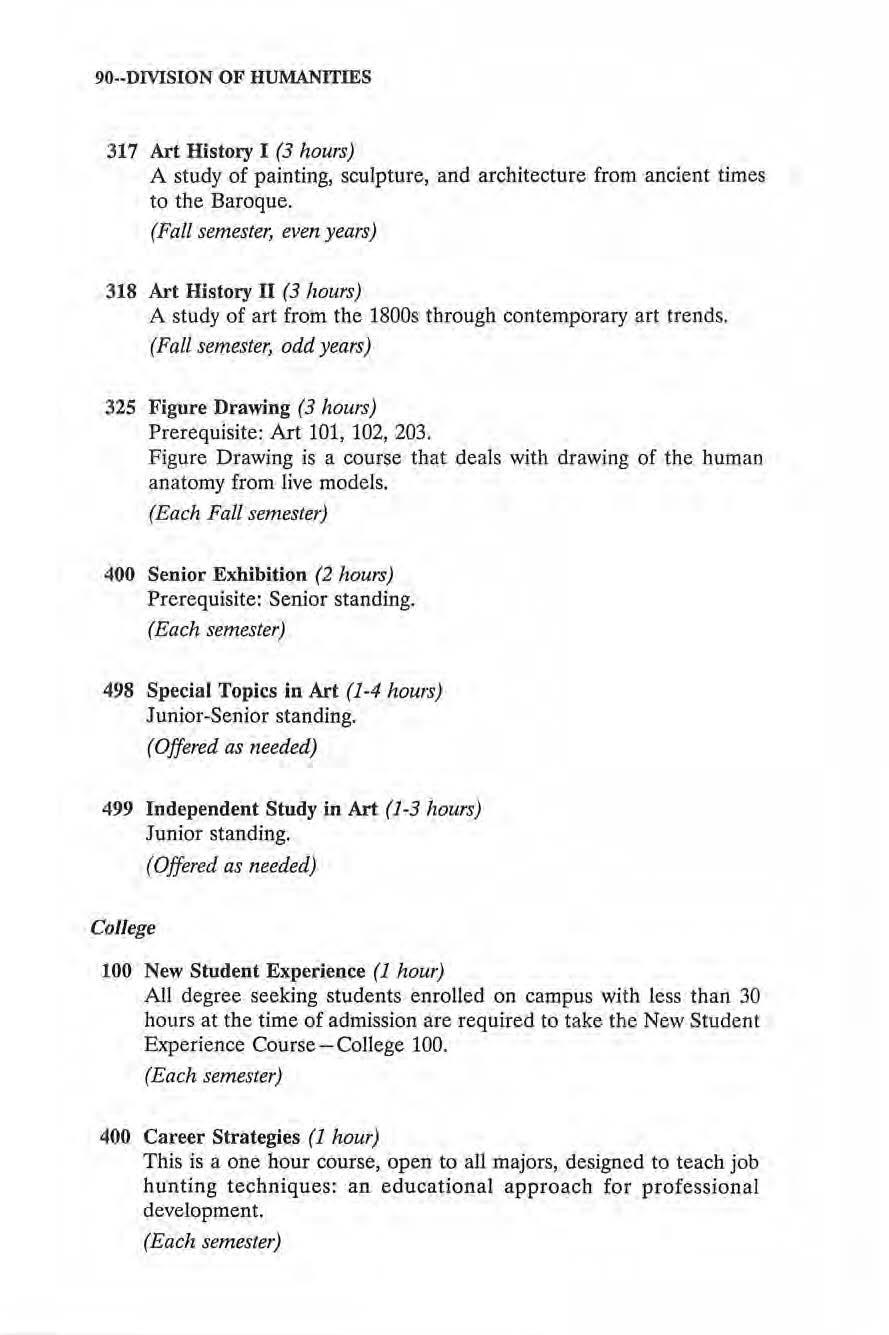
Junior stand ing.
(Offered as needed) College
100 New Student Experience (1 how)
All degree seeking students enrolled on campus wi th less than 30 hours at the tim e of admission are required to take the New Student Experience Course-Coll ege 100.
(Each semester)
40 0 Career Strategies (1 hour)
This is a one hour course, open to all majors, designed to teach j ob hunting techniques: an educational approach for profess ional development.
(Each semester)
90 --DMSION OF
HUMANITIES
English
060 Study Skills (1 hour, credit/no credit)
This course is designed to help students learn effective study skills which can be used to promote academic success in college. Units to be covered include managing time, improving memory, taking lecture notes, reading textbooks, taking examinations, writing themes and reports, malting oral reports, improvin g scholastic motiv ation, improving interpersonal skills, and improving concentration. This course is required of all freshman probationary students who have attempted 21 hours or less. This course is open to all students.
(Each semester)
070 Read ing (1 hour, credit/no credit)
This course is designed to help students learn effective read ing ski ll s which can be used to promote academic success in college. Units to be covered include reading comprehension, vocabulary devel opme nt , and word knowledge. This course is a developmental requirement for students identified as needing reading improvement training. Students required to enroll in English 070 must successfully complete the post-test with the necessary passing score befo r e enrolling in English 101. Students who do not earn the n ecessary passing score will be required to enroll in English 071.
(Each semester)
071 Readin g (I hour, credit/no credit)
This course is a continuation of English 070 reading; that is, this course is designed to help students learn effective reading skills which can be used to promote academic success in college. Units to be covered include r eading comprehension, vocabulary development, and word knowledge. This course is a developmental requirement for students identified as needing reading improvemen l training. Students required to enroll in English 071 must successfully complete the post-test with the necessary passing score before enroll ing in English 101. Students who do not earn the necessary passing score will be required to visit with the Vice President for Student Affairs to discuss independent course options that can be devised by the director of the Communication Skills Center to promote student success.
(Each semester)

DMSION OF HUMANITIES--91
075 Speed Reading (1 hour, credit/no credit)
This course is designed to help students learn effective speed reading skills which can be used to promote academic success in college. Units to be covered i,nclude warm-up letters, warm-up words, column reading, eye movement, paced reading, and timed reading. This course is open to all students.
(Each semester)
080 Composition (1 hour, credit/no credit)
This course is designed to help students learn effective writing skills which can be used to promote academic success in college. Units to be covered include capita li zation, grammar, punctuation, spelling, planning, developing paragraphs, composition skills, and English fundamentals. This course is a developmental requirement for students identified as needing writing improvement training. Students required to enroll in English 080 must successfully complete the posttest with the necessary passing score before enrolling in English 101. Students who do not earn the necessary passing score will be required to enroll in English 081.
(Each semester)
081 Composition (1 hour, credit/no credit)
This course is a continuation of English 080 composition; that is, this course is designed to help students learn effective writing skills which can be used to promote academic success in college. Units to be covered include capitalization, grammar, punctuation, spelling, planning, developing paragraphs, composition skills, and English fundamentals This course is a developmental requirement for students identified as needing writing improvement training. Students required to enroll in English 081 must successfully complete the posttest with the necessary passing score before enrolling in English 101. Students who do not earn the necessary passing score will be required to visit with the Vice President for Student Affairs to discuss independent course options that can be devised by the director of the Communication Skills Center to promote student success.
(Each semester)
101 English Composition (3 hours)
A study of the principles of clear and effective expression as applied to the sentence, paragraph, and the whole composition. A review of grammar, mechanics, and correct usage. Training in organization, and the writing of short and long papers. Required course for all freshmen . (Note: Students who rank at the 85th percentile or higher on the English portion of the ACT may be excused from English 101.)
(Each semester)
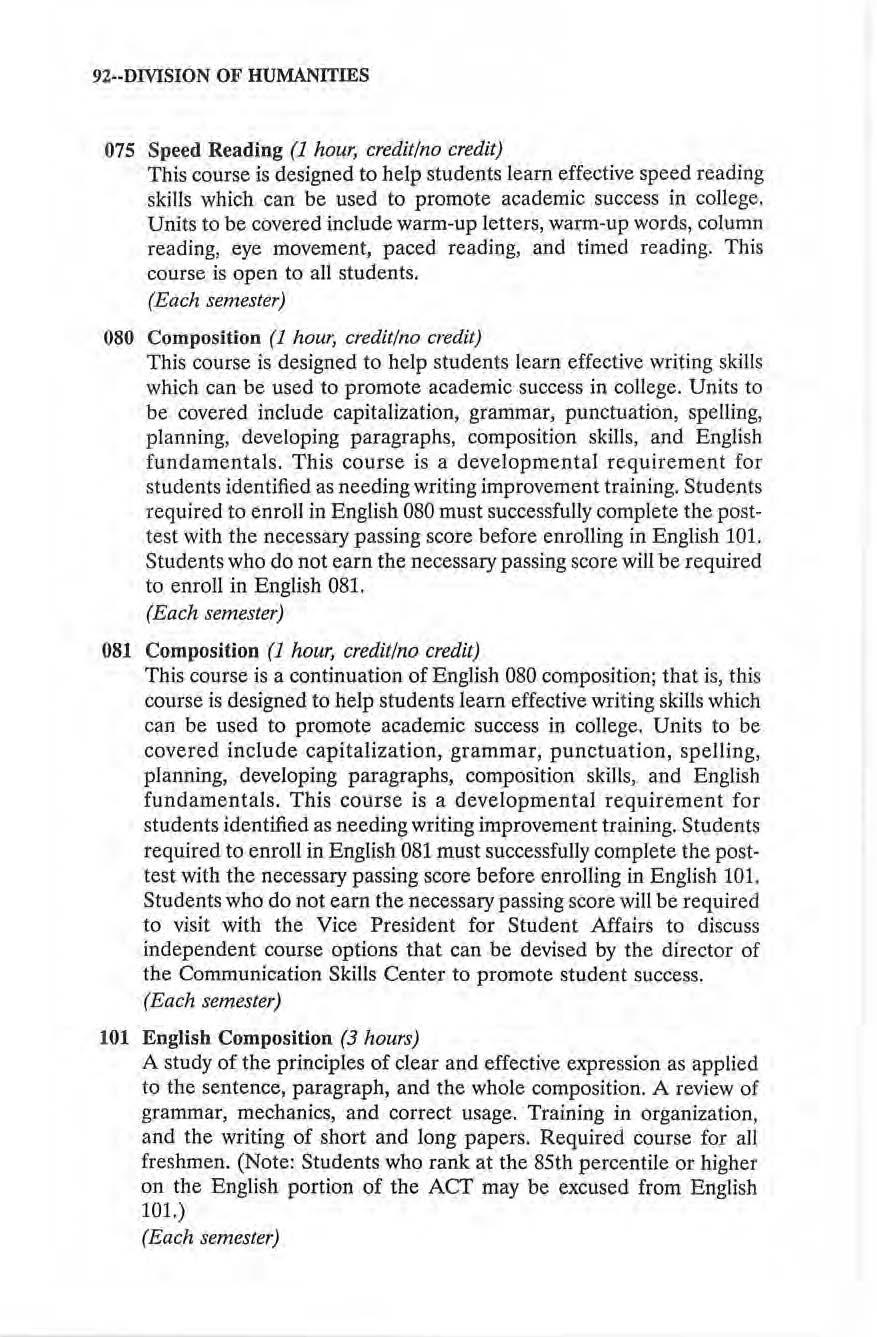
92--DIVISION OF HUMANITIES
201 Advanced English Composition (3 hours)
Prerequisite: One semester elapsed time following successful completion of English 101.
Advanced training in writing a variety of types of papers with emphasis placed on writing which requires the student to think critically, support generalizations, and appropriately acknowledge sources of information.
(Each semester)
202 Appreciation of Literature (3 hours)
Meets a general education r equi rement designed to increase the student's appreciation of literature with an emp hasis on modern literary forms.
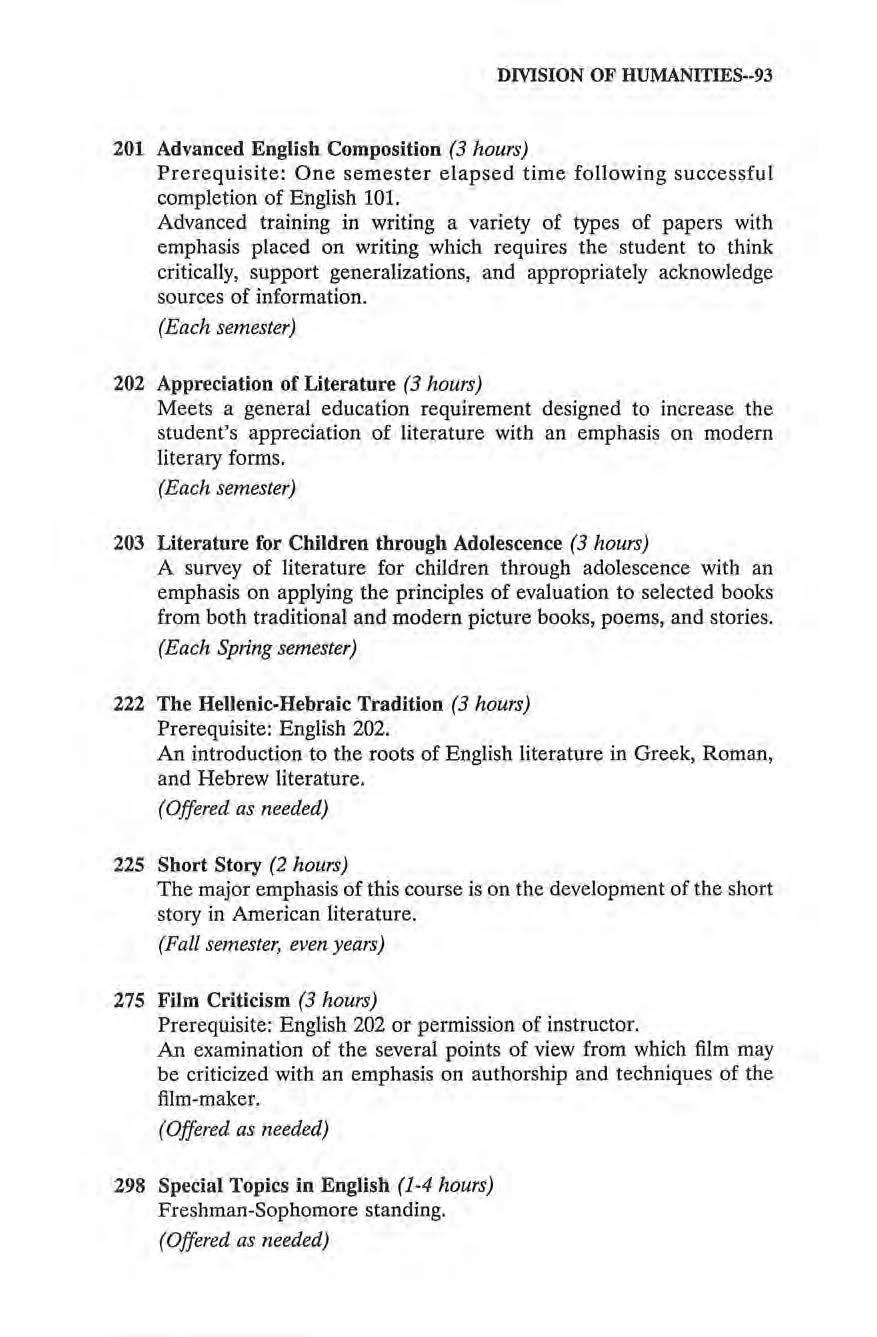
(Each semester)
203 Literature for Children through Adolescence (3 hours)
A survey of literature for children through adolescence with an emphasis on applying the principles of evaluation to selected books from both traditional and modern picture books, poems, and stories.
(Each Spring semester)
222 The Hellenic-Hebraic Tradition (3 hours)
Prerequisite: English 202.
An introduction to the roots of English literature in Greek, Roman, and Hebrew literature.
(Offered as needed)
225 Sbort Story (2 hours)
The major emphasis of this course is on the d evelopment of the short story in American literature.
(Fall semester, even years)
275 Film Criticism (3 hours)
Prerequisite: English 202 or permission of instructo r.
An examination of the several points of view from which film may be criticized with an emphasis on a uthorship and t echniques of the film-maker.
(Offe red as needed)
298 Special Topics in English (1-4 hours)
Freshman-Sophomore standing.
(Offered as n eeded)
DMSION OF HUMANITIES--93
301 Traditional Grammar (3 hours)
The emphasis of this course is on an in-depth analysis of sentence structure.
(Spring semeste1; even years)
305 Practicum in Composition (1-3 hours)
An investigation of the relation shi p between such factors as the study of rhetorical theory, grammar, reading level, and liste ning skill in determining a student 's ability to communicate effectively.
(Fall semester, even years)
306 Nebraska L iterature (3 hours)
Prerequisite: Consent of the department. An introduction to the works of Nebraska writers and literature about Nebraska.
(Offered as needed)
307 Seminar in the Modem Novel (3 hours)
A study of modern fiction a s it mirrors the philosophical, sociological, psychological, and scientific thought of the twentieth century, (Fa ll semester, odd years}
·308 Techn ical Writing (3 hours)
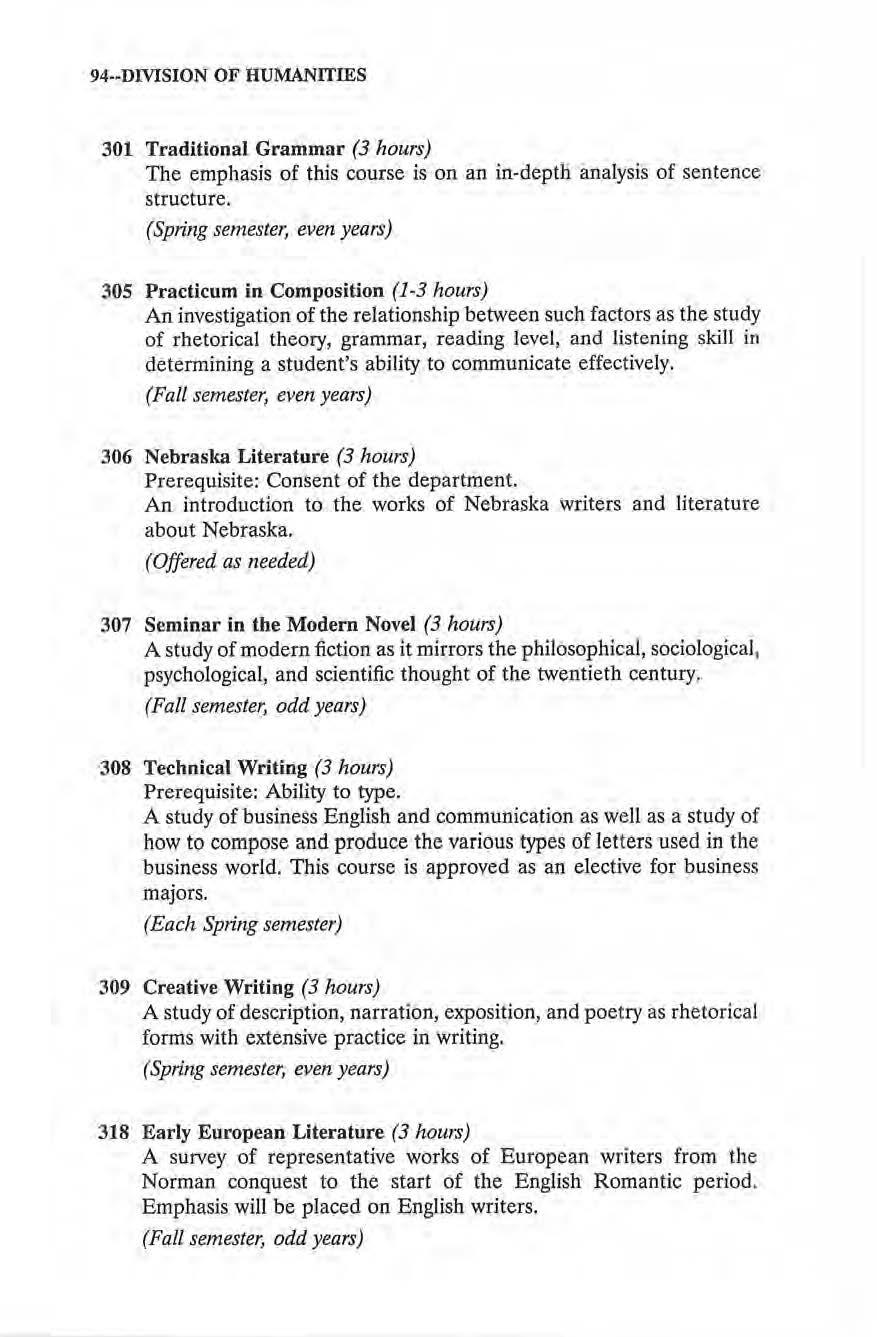
Prerequisite: Ability to type. A study of business English and communication as well as a study of how to compose and produce the various types of let t ers used in the business world This course is approved as an elective for business majors.
(Each Spring semester)
309 Creative Writing (3 hours)
A study of description, narration, exposition, and poetry as rhetorical forms with extensive practice in Writin,g.
(Spring semester, even years)
3 18 Early European Literature (3 hours)
A survey of representative works of European writers from the Norman conquest to the start of the English Romantic period Emphasis will be placed on English writers.
(Fall semester, odd years)
94--DMSION
OF llUMANITIES
321 Romantic Period (3 hours)
A study of t he maj or Romantic poets. Some attention is given to the novel and pre-Romant ics such as Blake.
(Spring semester, odd years)
323 Victor:ian Pel'iod (3 hours)
Nineteenth century England as seen by the major poets and nove lists with some attention given to the prose writers.
(Fall semester, even years)
324 Ame r ican Literature I (3 hours)
An historical survey of significant American writing from the Colonial Period to 1865. Major writers receive chief emphasis.
(Fall semester, odd years)
3 25 American Litera ture II (3 hours)
A continuation of English 324 from 1865 to p r esent.
(Spring semester, even years)
328 Modern Poetry (3 hours)
A study of British and American poetry of this century and its relevance to contemporary literature and life.
(Spring semester, even years)
405 Teaching English and Speech (2 hours)
A study of the basic objectives and the scope of English, speech, and debate in the secondary curriculum. Current techniques used in teaching the three areas are examined and eva luated.
(Spring semester, even years)
418 Shakespeare (3 hours)
A study of representive plays and sonnets.
(Spring semester, even yea rs)
440 History of the English Language (3 hours)
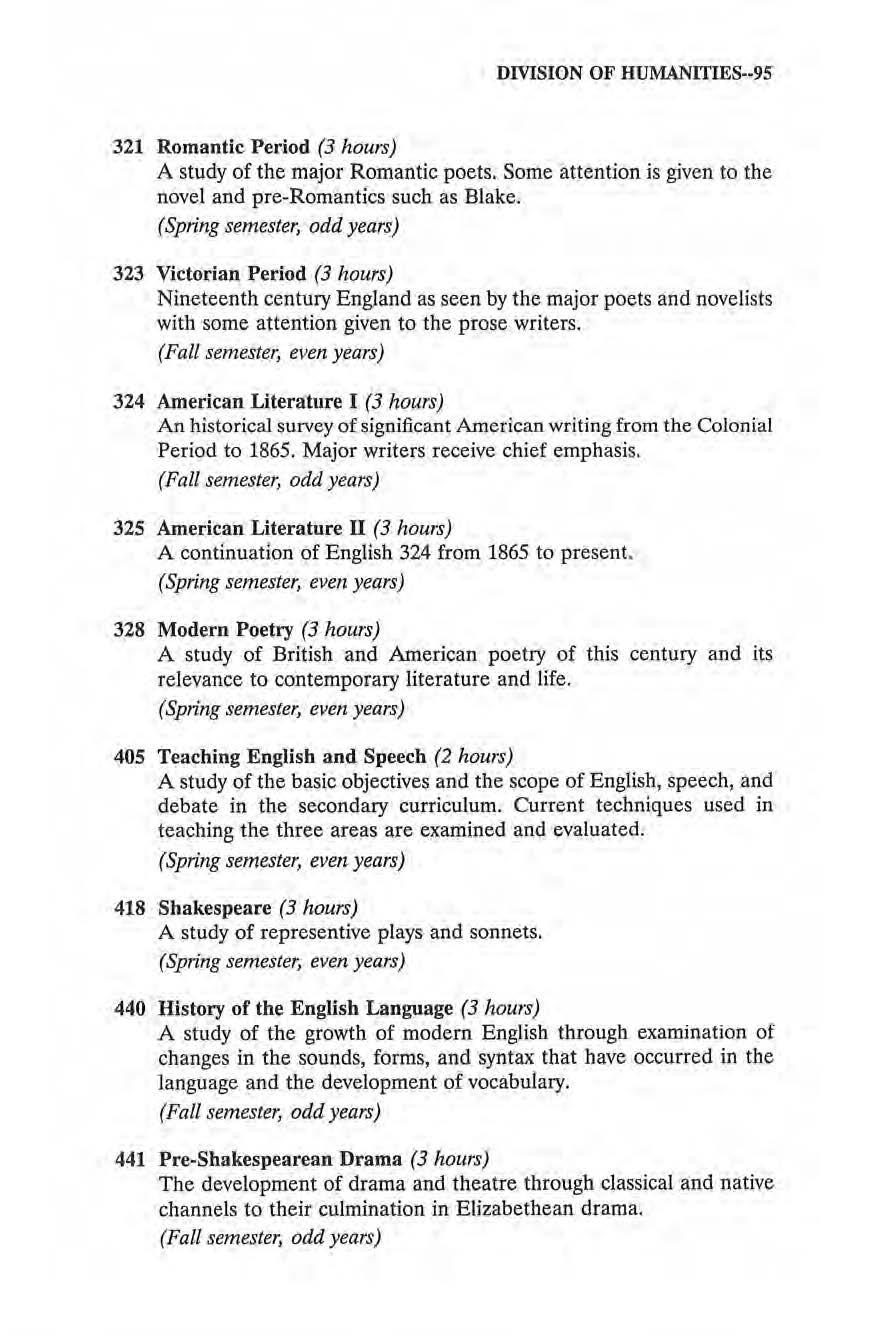
A study of the growth of modern Engli sh through examination of changes in the soun ds, forms, and syntax that have occurred in the language and the development of vocabulary.
(Fall semester, odd years)
441 Pre-Shakespearean Drama (3 hours)
The development of drama and theatre through classical and native chan nels to their culminatio n in Elizabethean drama.
(Fall semester, odd years)
DIVISION OF HUMANITIES--95
442 Post-Shakespearean Drama (1616-1890) (3 hours)
This course provides the basis for the appreciation and understanding of the variety and growth of dramatic literature during the years following the death of Shakespeare to the advent of modern theatre .
(Fall semester, even yeats)
443 Modern Drama 1890-present (3 hours)
This course provides the student the opportunity to follow the growth of modern dramatic techniques in the western world, the interaction of these techniques with the modern movements in art, music and other art forms, an d to make the student aware of his recent heritage of dramatic literature and its position in the world of thought and emotion.
(Spring semester:, odd years)
498 Special Topics in English (1-4 hours)
Junior-Senior standing.
(Offered as needed)
499 Independent Study in English (1-3 hours)
Junior standing.
(Each semester)
Geography
101 Princi ples of Physical Geography (3 hours)
The introductory study of the relationship of man and environment, with an emphasis placed upon climate regions of the world. 1\vo hours lecture and two hours of laboratory are requfre d
(Each Fall semester)
103 Huma n Geography (3 hou rs)

Human Geography is the study of the human elements of the environment with emphasis on the origins of culture, population trends, world cultures, economies of man, and urban and political systems.
(Spring semeste1; odd years)
298 Special Topics in Geography (1-4 hours)
Freshman-Sophomore stand ing.
(Offered as needed)
96--DMSION
OF HUMANITIES
300 Geography of Asia (3 hours)
Prerequisite: Geog 101.
A regional study of the major countries of Asia with emphasis on relief, climate, resources, gove rnment, and industrial development.
(Offered as needed)
305 Economic Geography (3 hours)
Prerequisites: Geog 101 and 103.
An analysis of world land resources, agricultural products, forest and marine resources., basic mining industries, manufacturing, trad e patterns, and transportation routes.
(Spring semester, even years)
310 Geography of Africa (3 hours)
Prerequisite: Geog 101.
A geographical analysis of the continent. Emphasis is placed upon the recent spirit of nationalism and the economic and physical base of selected nations.
(Offered as needed)
311 Urban Geography (3 hours)
Study of the origin, distribution , internal structure and functions of urban developments with an e mphasis on location features of economics and cultural phenomena.
(Offered as needed)
312 Geography of Anglo-America (3 hours)

Prerequisite: Geog 101 or senior standing.
A study of the United States and Canada by natural regions. In each case an evaluation of the physical and economic base will be made in the li ght of the present economic condition.
(Offered as needed)
313 Geography of South America (3 hours)
Prerequisite: Geog 101.
The geographic regions of South America are analyzed in their natural, political, and economic settings as well as the economic relations between South America and the United States.
(Offered as needed)
DMSION OF IHJMANITIES--97
326 Conservation of Natural Resources (3 hours)
An evaluation of soil , water, mineral, forestry, fish, air, and recreation resources in order to develop an appreciation of their importan ce and the seriousness of environme ntal problems.
(Offered as needed)
404 History and Philosophy of Geography (2 how'$)
Prerequisites: Geog 101 and 103.
A study of the basic philosophies of geography including the study of the basic geographic thought from ancient to modern times. Independent study through readings and research papers.
(Offered as needed)
497 Political Geography (3 hours)
Prerequisites: Geog 101 and 103. The study of Geography as a factor in the differentiation of political phenomena in various parts of the world. The modern state in r e lation to its environment and the interrelationship of nations as a result of their geographical strengths and weaknesses is stressed.

(Offered as needed)
498 Special Topics in Geography ( 1-4 hours)
Junior-Senior standing.
(Offered as needed)
499 Independent Study in Geography (1-3 hours) Junior standing.
(Each semester)
History
113 American History to 1865 (3 hours)
A study of the discovery, exploration, colonization, the Revolution of the U.S. and its problems to the end of the Civil War.
(Each Fall semester)
114 American History after 1865 (3 hours)
A study of reconstruction , the last frontiers , the rise of big business, imperialism, and the role of the U.S. in the two World Wars and their aftermath.
(Each Spring semester)
98- -DMSION
OF JIUMANITIES
201 World Civilization to 1500 (3 hours)
A survey of the beginnings of civilizations in the great river valleys and their diffusion to later civilizations in the Middle Ea.st and Europe. Particular attention will be given to the c ultural and political institutions of the West which furnish our own cultural heritage.
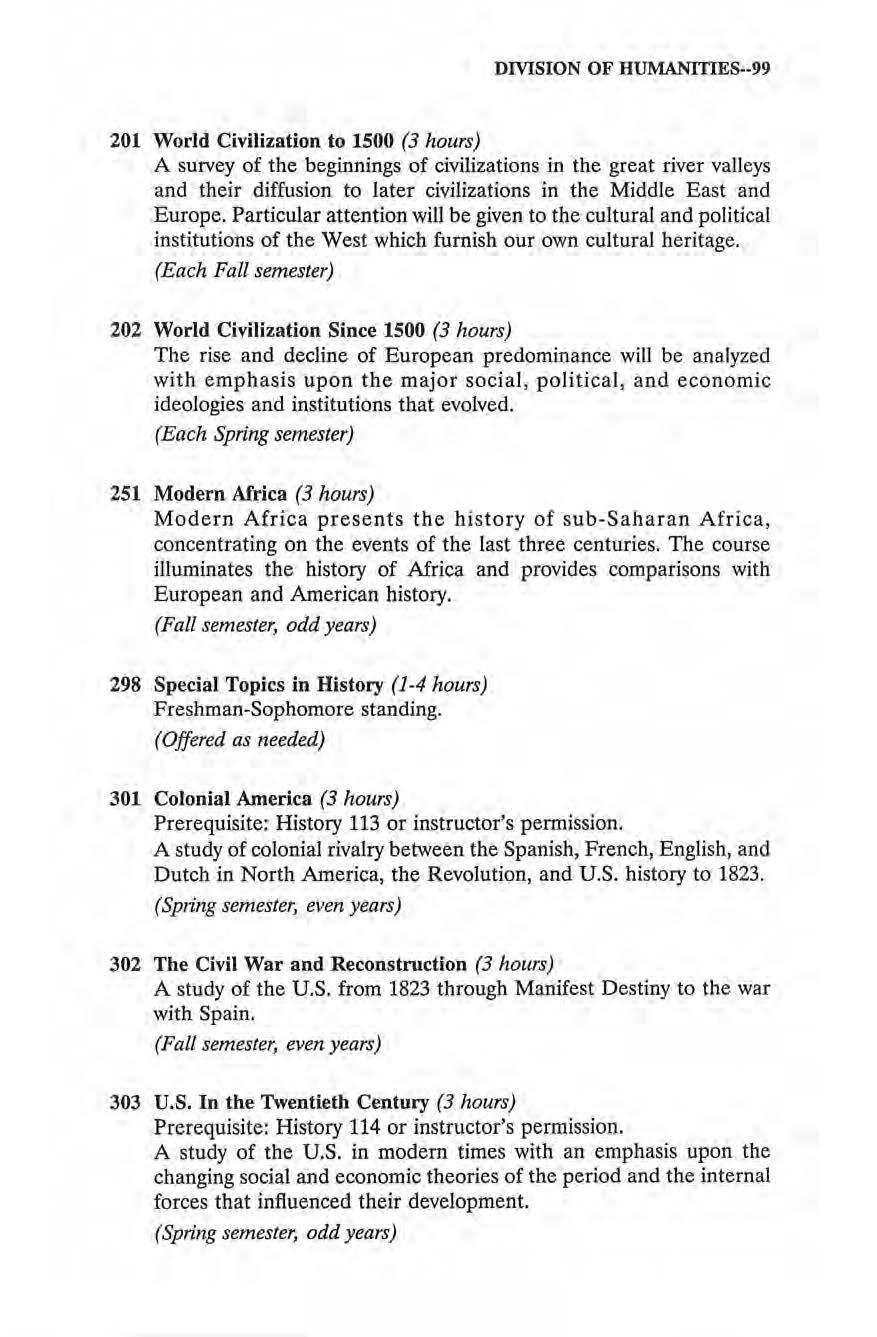
(Each Fall semester)
202 World Civilization Since 1500 (3 hours)
The rise and decline of European predominance will be ana lyzed with emphasis upon the major socia l , political, and economic ideologies and institutions that evolved.
(Each Spring semester)
251 Modern Africa (3 hours)
Modern Africa presents the history of sub-Saharan Africa, concentrating on the events of the last three centuries. The course illuminates the history of Africa and provides comparisons with European and American history.
(Fall semester, odd years)
298 Special Topics in History (1-4 hours)
Freshman-Sophomore standing.
(Offered as needed)
301 Colonial America (3 hours)
Prerequisite: History 113 or instructor's permission.
A study of colonial riva lry between the Spanish, French, English, and Dutch in North America, the Revolution, and U.S. history to 1823.
(Sp1ing semester, even years)
302 The Civil War and Reconstruction (3 hours)
A study of the U.S. from 1823 through Manifest Destiny to the war with Spain.
(Fall semester, even years)
303 U S. In the Twentieth Century (3 hours)
Prerequisite: History 114 or instructor's permission.
A st udy of the U.S. in modem times with an emphasis upon the changing social and economic theories of the period and the internal forces that influenced their development.
(Spring semester, odd years)
DMSlON OF BUMANITIES--99
100--DMSION OF HUMANITIES
304 Black Experience in America (3 hours)
This survey course investigates black life and culture in America from 1619 to the present.
(Fall semester, odd years)
329 History of Nebraska (3 hours)
A survey of the political, econom ic, social, and constitutional development of Nebraska from prehistoric times to the present. (Spfing semester, even years)
343 English History from 1688 (3 hot1rs)
Prerequisite: History 202 or instructor's permission. A survey of the social, political, and economic development of England since the Glorious Revolution. The course covers the social and religious impact of the English Parliamentary system, the effects of the Industrial Revolution upon the British Empire, and the prospects of the modern welfare state of contemporary England. (Spring semeste,; odd years)
345 Modern Europe (3 hours)
Prerequisite: History 202 or instructor's permission. A comparative historical analysis of the ongoing process of modernization in Europe. l'he emphasis is on movements and institutions such as Liber alism, Conservatism, Romanticism, Socialism, Imperialism, and Totalitarianism from 1815 to the present (Spring semeste1; even years)

4 00 Methods of Teaching History and Social Science (2 hours)
Instruction in the methods of teaching high school His tory and Social Science.
(Each Fall semester)
411 American Frontier (3 hours)
Prerequisite: History 113 or permission.
A study of the importance of the frontie r in American History from colonial times to the 20th century. (Spring semester, odd years)
455 History of Russia and the Soviet Union (3 hours)
An analysis of the social, cultural, political, and economic evolution of Russia under the Tsars and the formation of the Soviet Union.
(Spring semeste,; even years)
499 Special Topics in History (1-4 hours)
Junior-Senior standing.
(Offered as needed)
499 Independent Study in History (1-3 hours)
Junior standing.
(Each semester)
Humanities
441 Cooperative Education Internship (1-12 hours)
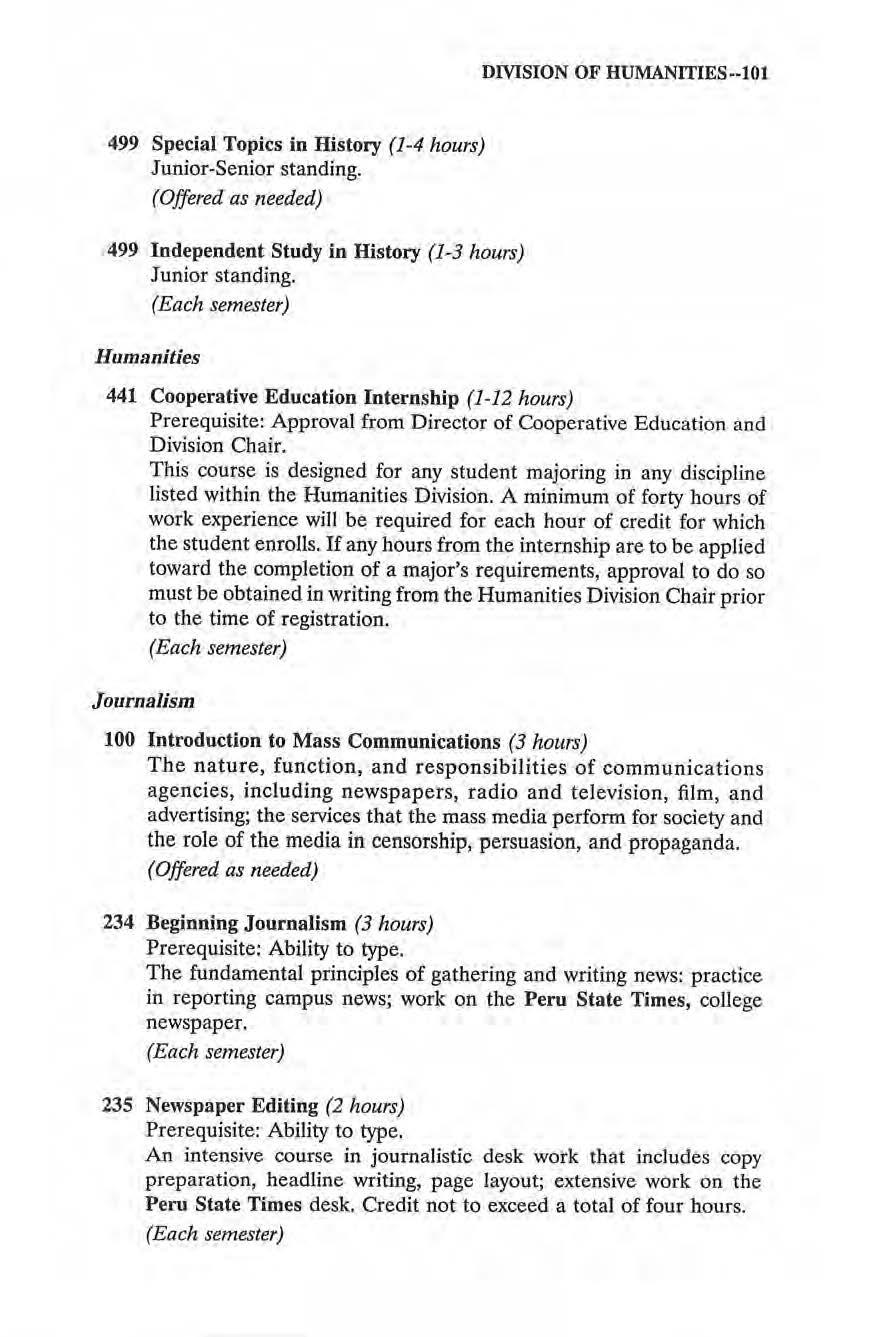
Pre requisite: Approval from Director of Cooperative Education and Division Chair.
This co urse is designed for any student majoring in any ctiscipline listed within the Humanities Division. A minimum of forty hours of work experience will be required for each hour of credit for which the student enrolls. If any hours from the intemship are to be applied toward the compJetion of a major's requirements , approval to do so must be obtained in writing from the Humanities Division Chair prior to the time of registration.
(Each semester)
Journalism
100 Introduction to Mass Communications (3 hours)
The nature, function, and responsibilities of communications agencies, including newspapers, radio and television, film, and advertising; the services that the mass media perform for society and the role of the media in censorship, persuasion, and propaganda.
(Offered as needed)
234 Beginning Journalism (3 hours)
Prerequisite; Ability to type.
The fundamental principles of gathering and writing news: practice in reporting campus news; work on the Peru State Times, college newspaper
(Each semester)
235 Newspaper Editin g (2 hours)
Prerequisite: Ability to type. An intensive course in journalistic desk work that includes copy preparation, headline writing, page layout; extensive work on the Peru State Times desk. Cred it not to exceed a total of four hours.
(Each semester)
DMSION OF HUMANITIES--101
298 S pec i a l T op ics in J our n a lis m (2 lzours)
Prerequisite: Journalism 234, or permission of instructor. The fundamental principles of designing, organiz ing and publishing a college publicat ion will be experienced in this cla ss through work on college projects.
(Offered as needed)
300 Co mmunica tio ns Law (3 lwurs)
A study of the media's legal context wit h an emphasi s on the iss ues of libel, contempt, access to public records, invasion of privacy, criticism, and copyright.
(Sp ring semester, odd years)
401 J o urna lis m P r acticu m (1 hour)
Prerequisites: Ability to type, Journ 234 and 235. Practicum students will be involved in the production of the college newspaper and/o r college yearbook. C redit not to exceed one credit ho u r each semester. May be repeated for up to six hours credit.
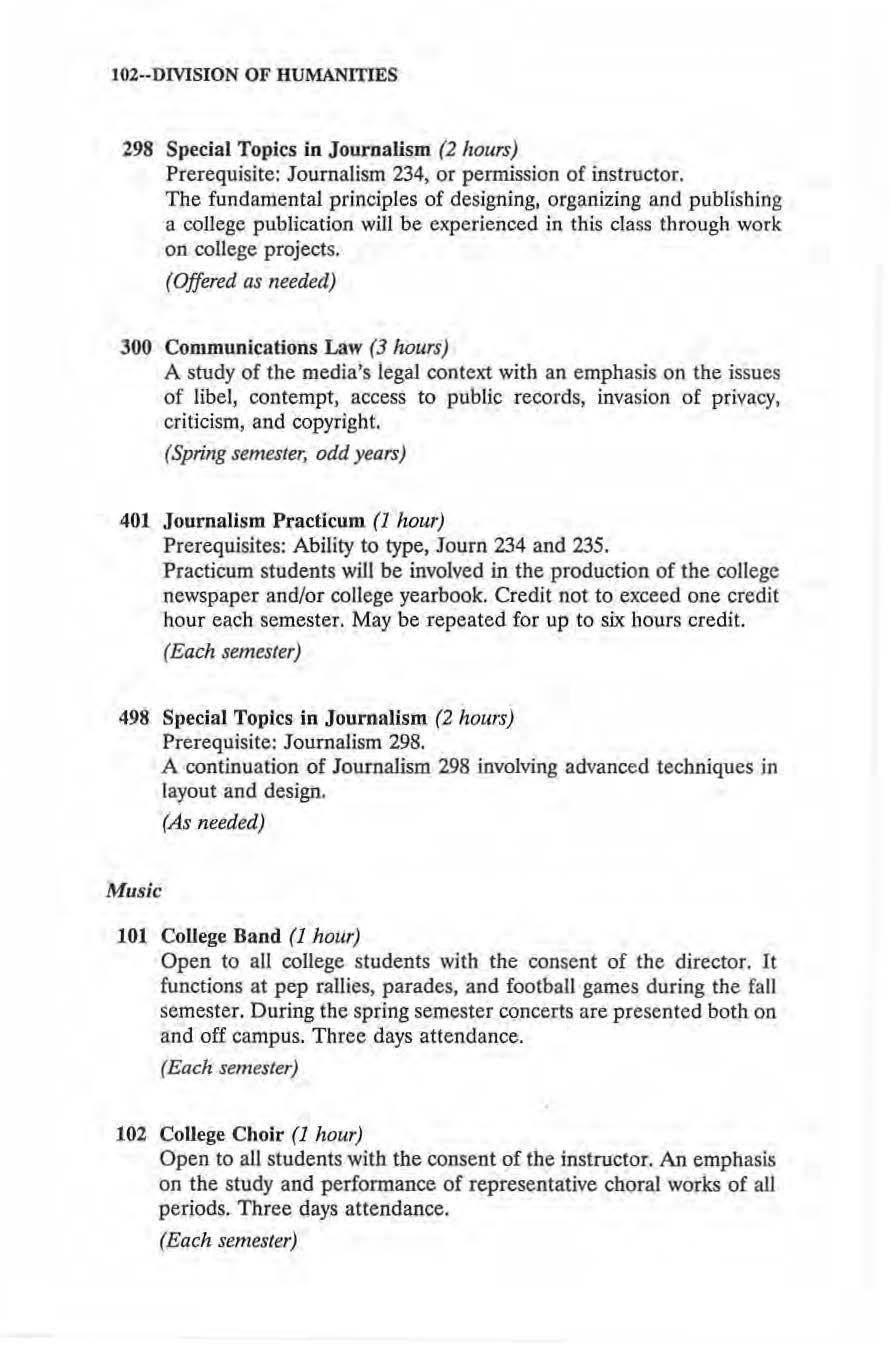
(Each semester)
498 S peci a l To pics in J o urn alis m (2 hours)
Prerequisite: J ourna lism 298.
A contin uat ion of Journalism 298 involving advanced techniques jn layout and design .
(As needed)
101 College Band (1 hour)
Open to all college students with the consent of the director. lt functions at pep rallies, parades, and football games during th e fa ll semester. D u ring the spr ing semester concerts are presente d both on and off campus. T hree days attenda n ce.
(Each semester)
1 02 Co llege C hoir (1 hour)
Open to all students with t h e consent of the instructor. An emphasis on the study and performance of representative choral works of all periods Thr ee days attendance.
(Each semester)
102--DMS IO N OF HUMANITIES
us i c
M
103 Jazz Ensemble (1 hour)
Open to all students by audition and the consent of th e instructor. An emphasis is placed on the study and performance of music m all popular idioms and performs concerts on and off campus.
(Each semester)
104 Vocal Jazz Ensemble (1 hour)
Open to all students by audition and consent of the instructor. An emphasis is placed on study and performance of vocal music in all popular idioms and performs concerts on and off campus.
(Each semester)
105 Brass Chamber Ensemble (1 hour)
Open to all students with the consent of the instructor. An emphasis is placed upon the study and performance of brass lit erature in all the chamber music idioms and concerts are performed on and off campus.
(Each semester)
106 Woodwind Chamber Ensemble (1 how)
Open to all students with the consent of the instructor. An emphasis is placed upon the study and performance of woodwind literature in all the chamber music idioms and concerts are performed on and off campus.
(Each semester)
107 Vocal Chamber Ensemble (1 hour)
Open to all students with the consent of the instructor. An emphasis is placed upon the study and performance of vocal literature in all the chamber music idioms and concerts are performed on and off campus.
(Each semester)
111 Fundamentals of Music (2 hows)

An introduction to the rudiments of music, including letter and syllable names of notes, time values of notes and rests , time and key signatures, chromatics, intervals, chords, keyboard experience, and the writing of original melodies.
(Each Fall semester)
112 Beginning Class Piano (1 hour)
Beginning instruction on the piano.
(Each semester)
DMSION OF HUMANITIES--103
113 Beginning Class Guitar (1 hour)
An introduction to the basic chords, melodies, note reading, tuning, and styles of performance- for the beginning guitarist. (Each semester)
121 Applied Music-Voice (1-2 hours)
Private voice instruction on the freshman level. (Each semester)
122 Applied Music-Woodwinds (1-2 hours)
Private woodwind instruction on the freshman level. (Each semester)
123 Applied Music-Brass (1-2 hours)
Private brass instruction on the freshman level. (Each semester)
124 Applied Music-Percussion (1-2 hours)
Private percussion instruction on the fr eshman level, (Each semester)
125 Applied Music-Keyboard (1-2 hours)
Private keyboard instruction on the freshman level. (Each semester)
131 Applied Music-Voice (J-2 hours)
Prerequisite: Music 121.
Continuation of private voice instruction on the advanced freshman level.
(Each semester)
132 Applied Music-Woodwinds (1-2 hours)

Prerequisite: Music 122.
Continuation of private woodwind instruction on the advanced freshman level.
(Each semester)
133 Applied Music-Brass (1-2 hours)
Prerequisite: Music 123.
Continuation of private brass instruction on the advanced freshman level, (Each semester)
104--DMSION OF HUMANITIES
134 Applied Music-Percuss ion (1-2 hours)
Prerequisite: Music 124.
Continuation of private percussion instruction on the advanced freshman level.
(Each semester)
135 Applied Music-Keyboard (1-2 hours)
Continuation of private keyboard instruction on the advanced freshman level
(Each semester)
141 Music Theory l (3 hours)
This course is an integrated study of the th eoretical practices of the 18th and 19th centuries. It includes a review of clefs, scales, key signatures, intezvals, triads, and basic rhythmic notation, studies in melodic, rhythmic, and harmonic dictation, and sightsinging,
(Each Fall semester)
142 Music Theory ll (3 hours)
This course is an integrated study of the theoretical practices of the 18th and 19th centuries. It includes the study of secondary triads, six-four chords, dominant and supertronic sevenths, elementary modulation, studies in melodic rhythmic and harmonic dictation and sightsinging.
(Each Spring semeste,)
211 Music Appreciation (3 hours)
A survey of the various forms and styles of music ranging from folk songs to opera, oratorio, and symphony. Selected works are analyzed and discussed through the use of records.
(Honors Program Course)
HP 212 Introduction to Non-Western Musics (3 hours)
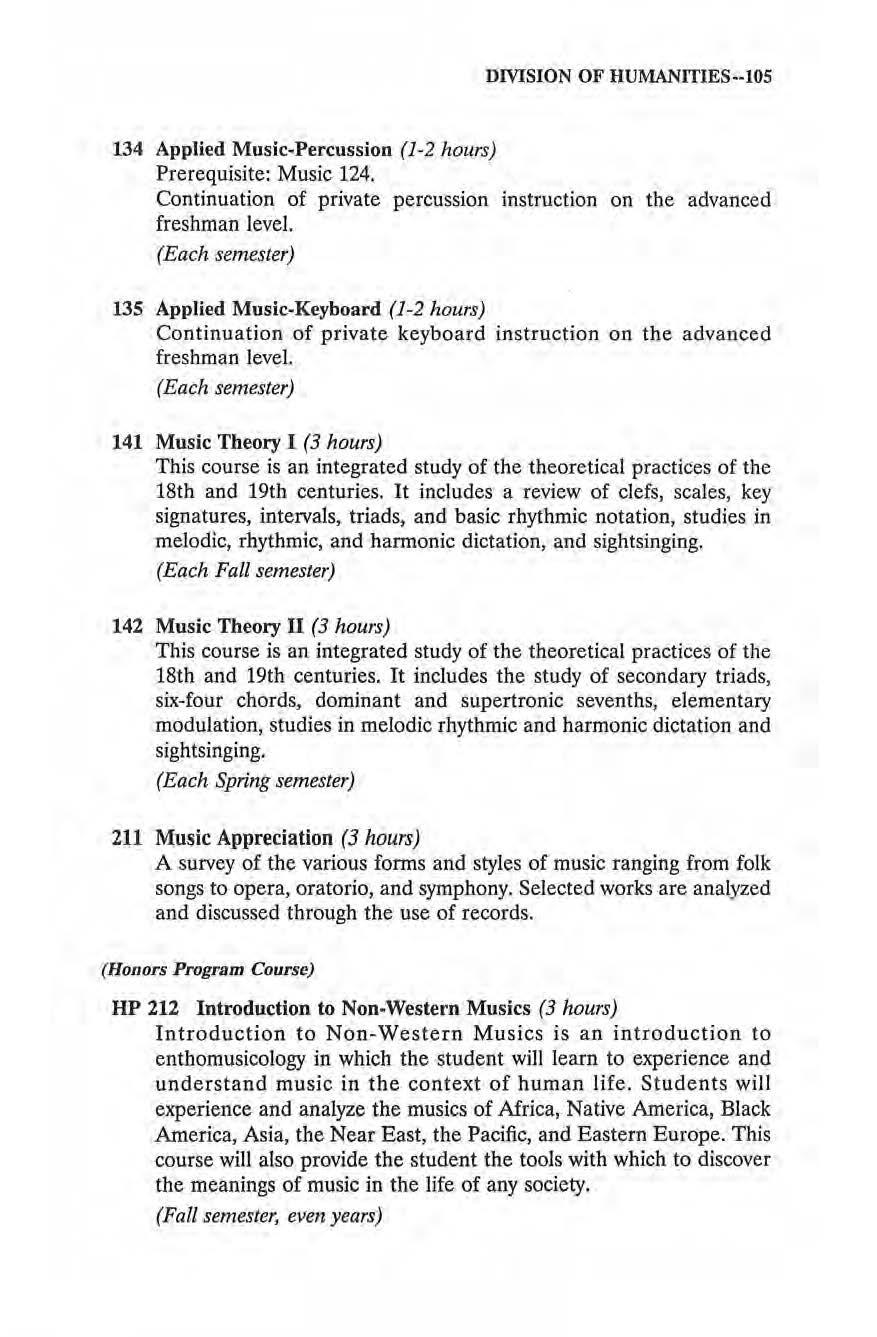
Introduction to Non-Western Musics is an introduction to enthomusicology in which the student will learn to experience and understand music in the context of human life. Students will experience and analyze the musics of Africa, Native America, Black America, Asia, th e Near East, the Pacific, and Eastern Europe. This course will also provide the student the tools with which to discover the meanings of music in the life of any society.
(Fall semester, even years)
DMSION OF HUMANITIES--105
106-•DIVISION OF HUMANITIES
221 Applied Music-Voice (1-2 hours)
Prerequisite: Music 131.
Continuation of private voice instruction on the sophomore level.
(Each semester)
222 Applied Mosic-Woodwinds (1-2 hours)
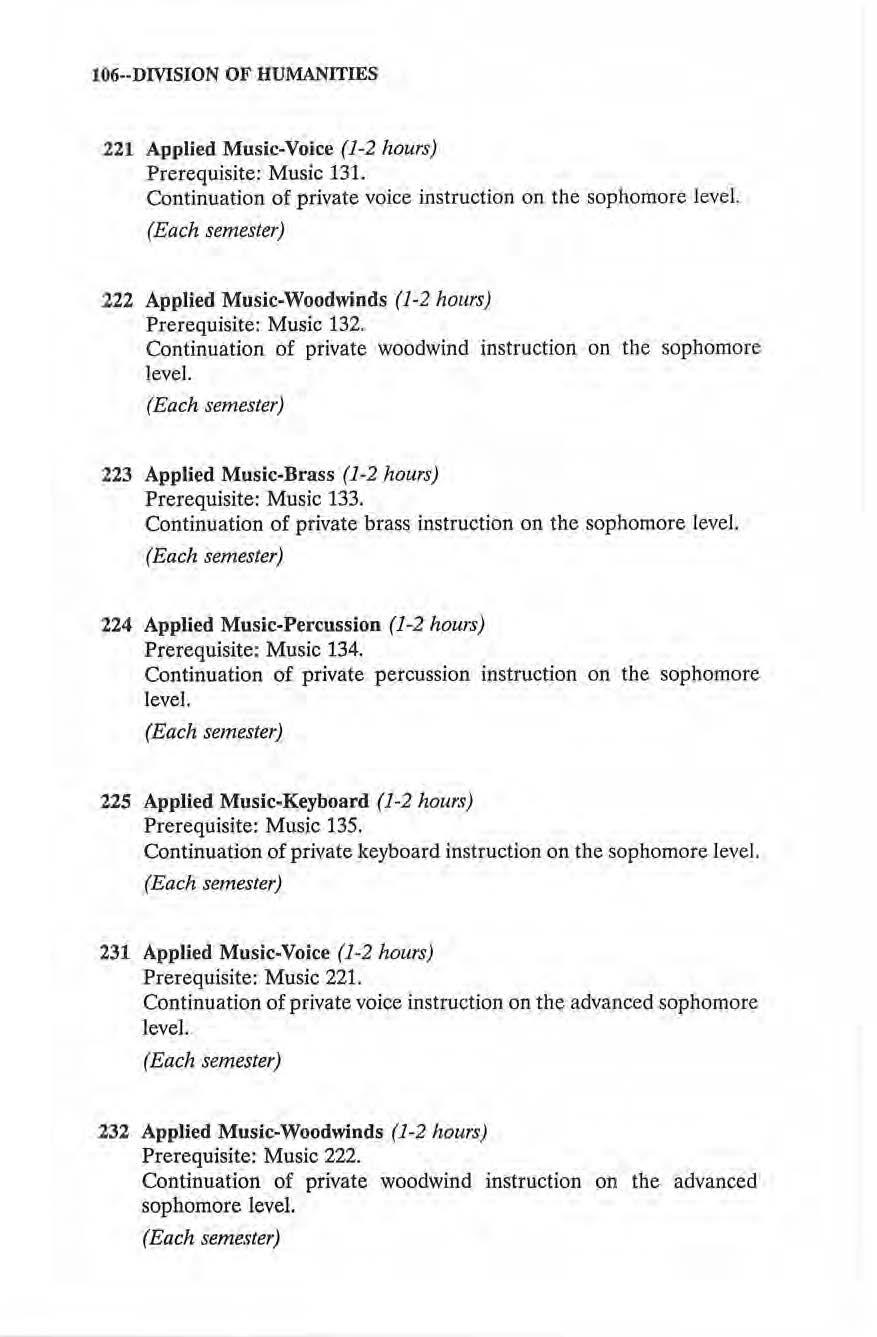
Prerequisite : Music 132.
Continuation of private woodwind instruction on the sophomore level.
(Each semester)
223 Applied Music-Brass (1-2 hours)
Prerequisite: Music 133.
Continuation of private brass instruction on the sophomore level.
(Each semester)
224 Applied Music-Percussion (1-2 hours)
Prerequisite: Music 134.
Continuation of private percussion instruction on the sophomore level.
(Each semester)
225 Applied Music-Keyboard (1-2 hours)
Prerequ isite: Music 135.
Continuation of private keyboard instruction on the sophomore lev el.
(Each semester)
231 Applied Music-Voice (J-2 hours)
Prerequisite: Music 221.
Continuation of private voice instruction on the advanced sophomore l evel.
(Each semester)
Z32 Applied Music-Woodwinds (1-2 hoz~rs)
Prerequisite: Music 222.
Continuation of private woodwind instruction on the advanced sophomore level.
(Each semester)
223 Applied Music-Brass (1-2 hours)
Pre requisite: Music 223.
Continuation of private brass instruction on the advanced sophomore level.
(Each semester)
234 Applied Musi c-Percussion (J-2 hours)
Prerequisite: Music 224.
Continuation of private percussion instruction on the advanced sophomore level.
(Each semester)
235 Applied Music-Keyboard (1-2 hours)
Prerequisite: Music 225.
Continuation of private keyboa rd instruction on the advanced sophomore level.
(Each semester)
241 Music Theory III (3 hours)
Prerequisite: Music 142.
This cou r se is an integrated study of the theoretical practices of the 18th and 19th centuries. It includes a detailed study of the ch ro matic harmonic practices of th e 19th century, a survey of 20th century theoretical practices, stud ies in melodic, rhythmic, and harmonic dictation, and sightsinging.
(Each Fall semester)
242 Music Theory IV (3 hours)
Prerequisite: Music 241
This course is an in tegrated study of the theoretical practices of the 18th and 19th centuries. It includes a detailed study of the chromatic harmonic practices of the 19th century, a survey of 20th century theoretical practices and studies in melodic, rhythmic, and harmonic dictation and sight singing.

(Each Spring semester)
2 51 Elementary Music Methods (2 hours)
Prerequisite: Music 111 or music major.
A study of modern teaching techniques for children'.s musi c literature.
(Each Spring semester)
DMSION OF HUMANITIES --10 7
2-52 Secondary Music Methods (2 hours)
A study of vocal materials and vocal conducting as presented in secondary schools. (Fall semester; even years)
298 Special Topics in Music (1-4 hours)
Freshman-Sophomore standing. (Offered as needed)
321 Applied Music-Voice (1-2 hours)
Prerequisite: Mu sic 231
Continuation of private voice instruction on the junior level. (Each semester)
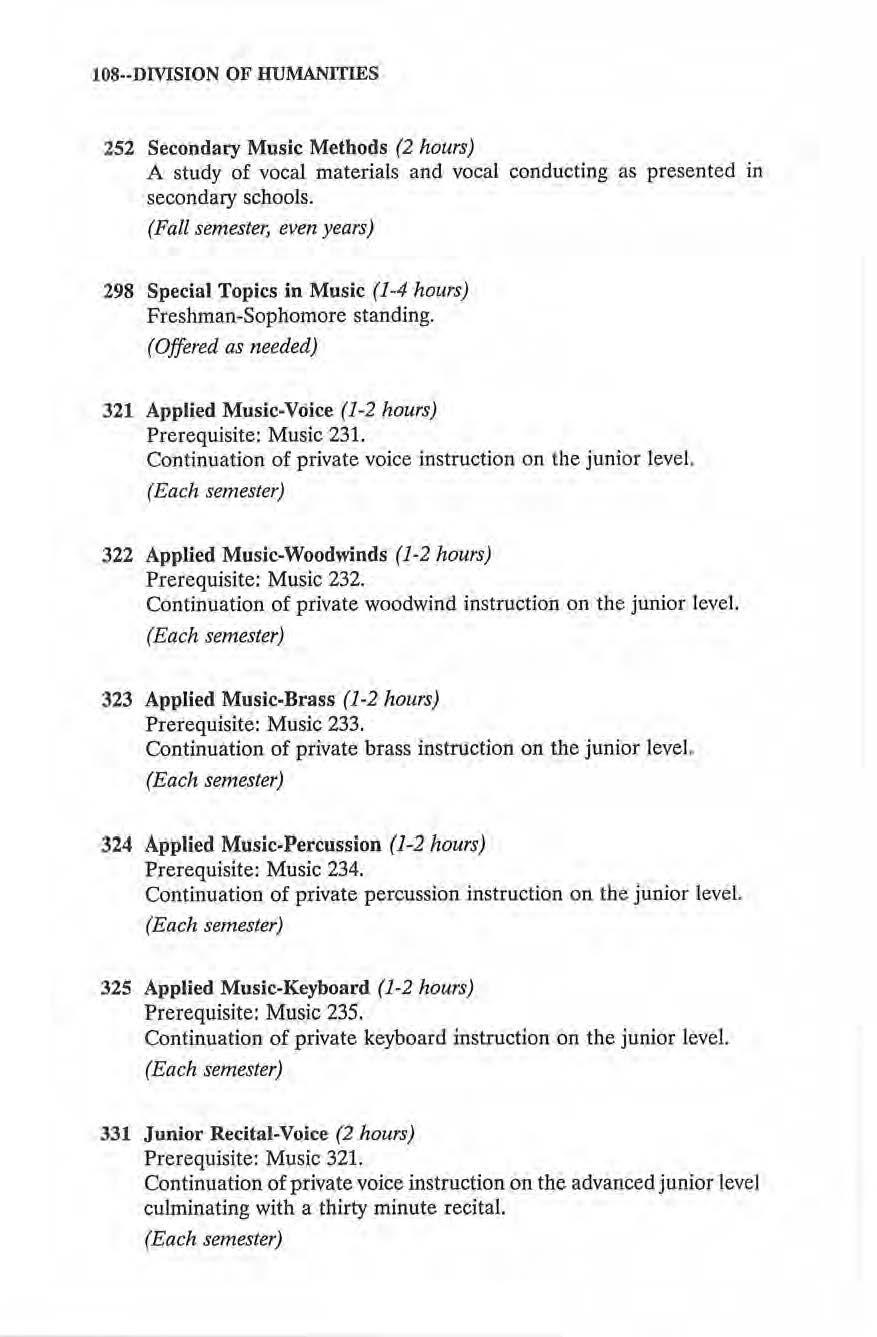
322 Applied Music-Woodwinds (1-2 hours)
Prerequis ite: Music 232.
Continuation of private woodwind instruction on the junior leve l. (Each semester)
323 Applied Music-Brass (J-2 hours)
Prerequisite: Music 233 .
Continuation of private brass instruction on the junior level. (Each semester)
324 Applied Music-Percussion {1-2 hours)
Prerequis ite: Music 234.
Continuation of private percussion instruction on the junior leve l. (Each semester)
325 Applied Music-Keyboard (1-2 hours)
Prerequisite: Music 235.
Continuation of private keyboard instruction on the junior level. (Each semester)
331 Junior Recital-Voice (2 hours)
Prerequisite: Musjc 321.
Continuation of private voice instruction on the advanced junior level culminating with a thirty minute recital. (Each semester)
108--DMSION OF HUMANITIES
332 Junior Recital-Woodwinds (2 hours)

Prerequisite: Music 322.
Continuation of private woodwind instruction on the advanced junior l evel culminating with a thirty minute r ecital.
(Each semester)
333 Junior Recital-Brass (2 hours)
Prerequisite: Music 323.
Continuation of private brass instruction on the advanced junior level culmina6ng with a thirty minute recital.
(Each semester)
334 Junior Recital-Percussion (2 hours)
Prerequisite: Music 324.
Continuation of private percussion instruction on the advanced junior level culminating with a thirty minute recital.
(Each semester)
335 Junior Recital-Keyboard (2 hours)
Prerequisite: Music 325.
Continuation of private keyboard instruction on the advanced junior level culminating with a thirty minute recital.
(Each semester)
341 Musical Form and Counterpoint (3 hours)
Prerequisite: Music 142.
This course is an analytical study of different forms and styles in music and their application including two and three part eighteenth century style, descant, and invention .
(Fall semester, odd years)
342 Arranging (2 hours)
Prerequisite: Music 142.
A course in practical scoring and arranging for band and orchestra and voices.
(Spring semester, even years)
351 Brass Methods (2 hours)
A study of brass instruments and brass pedagogical techniques with actual playing experience.
(Spring semester, even years)
DMSION OF HUMANITlES--109
OF HUMANITIES
352 Woodwind Methods (2 hours)
A stu dy of woodwind i nstruments and woodwind pedagogical techniques with actual playing experience. (Spring semester, odd years)
361 String Methods (2 hours)
A study of stringed instruments, including the guitar, and string pedagogical techniques with actual p laying experience.
(Fall semester, even years)
362 Percussion Methods (2 hours)
A study of percussion instruments and percussion pedagogical techniques with actual playing experience. (Fall semester, odd years)
421 Applied Music-Voice (1-2 hours)
Prerequisite: Music 331.
Continuation of private woodwind instruction on the senior level. (Each semester)
422 Applied Music-Woodwinds (1-2 hours)
Prerequisite: Music 332.
Continuation of private woodwind instruction on the senior level. (Each semester)
423 Applied Music-Brass (1-2 hours)
Prerequisite: Music 333.
Continuation of private brass instruction on the senior level. (Each semester)
424 Applied Music-Percussion (1-2 hours)
Prerequisite: Music 334.
Continuation of private percussion instruction on the senior level. (Each semester)
425 Applied Music-Keyboard (1-2 hours)
Prerequisite: Music 335.
Continuation of private keyboard instruction on the senior level. (Each semester)
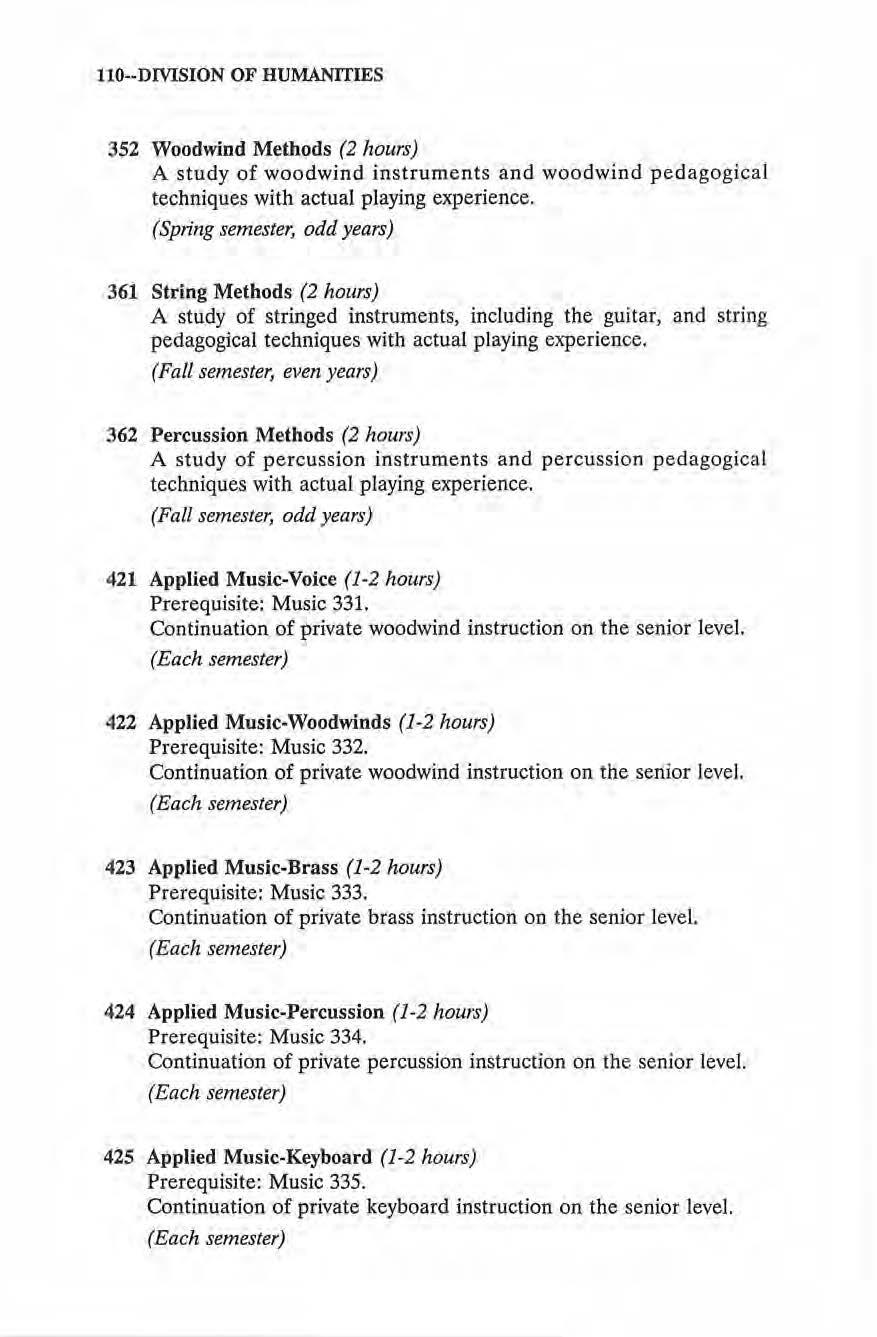
110--DMSION
431 Senior Recital-Voice (2 how:r)

Prerequisite: Music 421.
Continuation of private voice instruction on the advanced senior level culminating with a sixty minute recital.
(Each semester)
432 Senior Recital-Woodwinds (2 hours)
Prerequisite: Music 422.
Continuation of private woodwind instruction on the advanced senior level culminating with a sixty minute recital.
(Each semester)
433 Senior Recital-Brass (2 hours)
Prerequisite: Music 423.
Continuation of private brass instruction on the advanced senior level culminating with a sixty minute recital.
(Each semester)
434 Senior Recital-Percussion (2 hours)
Prerequisite: Music 424.
Continuation of private percussion instruction o n the advanced senior level culminatin g with a sixty minute recital.
(Each semester)
435 Senior Recital-Keyboard (2 hours)
Prerequisite: Music 425.
Continuation of private keyboard instruction on the advanced senior level culminating with a sixty minute recita l.
(Each semester)
441 Music History I (antiquity to 1750) (2 hours)
A study of the development of music from antiquity through the end of the Baroque period with stylistic analysis of musical examples.
(Spring semester, odd years)
442 Music History II (1750 to Present) (2 hours)
A study of the development of music from the beginning of the Classical period to the present with stylistic analysis of musical examples.
(Fall semester, odd years)
DMSION OF BUMANITIES--111
OF HUMANITIES
451 Integrated Studies-Instrumental (2 hours)
Prerequisite: Junior standing.
An introductory study of different organizational and pedagogical techniques for various wind instrument ensemb l es and th ei r respective repertoires.

(Spring semester, even years)
452 Integrated Studies-Vocal (2 hours)
Prerequisite: Junior standing.
A study of the International Phonetic Alphabet, foreign language diction, basic pedagogical concepts and an introduction to vocal repertoire.
(Fall semeste,; odd years)
453 Integrated Studies-Keyboard (2 hours)
Prerequis ite: Junior standing.
An introductory study of different pedagogical concepts and an introduction to keyboard repertoire.
(Offered as n eeded)
462 Conducting (2 hours)
The knowledge of baton techniques, reading and interpreting a musical score, and the presentation of techniques of rehearsing instrumental organizations are stressed.
(Fall semester, even years)
498 Special Topics in Music (1-4 hours)
Junior-Senior standing.
(Offered as needed)
499 Independent Study in Music (1-3 hours) Junior standing.
(Each semester)
Philosophy
201 Introduction to Philosophy (3 hours)
An introduction to philosophy through the selected writings of outstanding philosophers. Lectures and class discussions on such topics as ethics, philosophy of history, philosophy of religion, and metaphysics are stressed.
(Fall semeste1; odd years)
112--DMSION
Political Science
201 American National Government (3 hours)
A thorough introduction to the U.S. political system, its institution s and processes. Topics will include the constitutional founding , federalism, political culture, Congress, the Presidency, judiciary, bureaucracy, public opinion and the media, the electoral process, and civil liberties.
(Each semester)
202 State and Local Government (3 hours)
Description and analysis of political institutions and behavior in American states with interstate comparisons and comparisons between state and national political systems. Lecture topics includ e the development and role of American local government, its forms and structures, and the relationship to the federal government.

(Fall semester, even years)
298 Special Topics in Political Science (1-4 hours)
Freshman-Sophomore standing.
(Offered as needed)
301 Comparative Government (3 hours)
A comparative analysis of political systems and institutions of Great Britain, France, the Federal Republic of Germany, and the Soviet Union. The course emphasis is on political culture, comparative political history, chief executives, legislatures, political part ies, interest groups, courts, and policy making with ample comparisons to the U.S.
(Spring semester, odd years)
426 American Constitutional Law (3 hours)
Prerequisite: Pol. Sci. 201 or 202 or instructor ' s permission .
A study of the historical and political context of constitutional doctrine through major decisions. Th e emphas is is on constitutional growth as it relates to the fundamental structure of Americ an government and the social order.
(Spring semester, even years)
467 The Far East (3 hours)
This course is concern e d with the political traditions and historical evolution of the area, the impact of the West and its profound influences on the political order, and today's revolutionary situation.
(Fall semester, odd years)
DIVISION OF HUMANITIES--113
498 Special Topics in Political Science (1-4 hours) Junior-Senior standing.
(Offered as needed)
499 Independent Study in Political Science (1-3 hours) Junior standing, (Each semester)
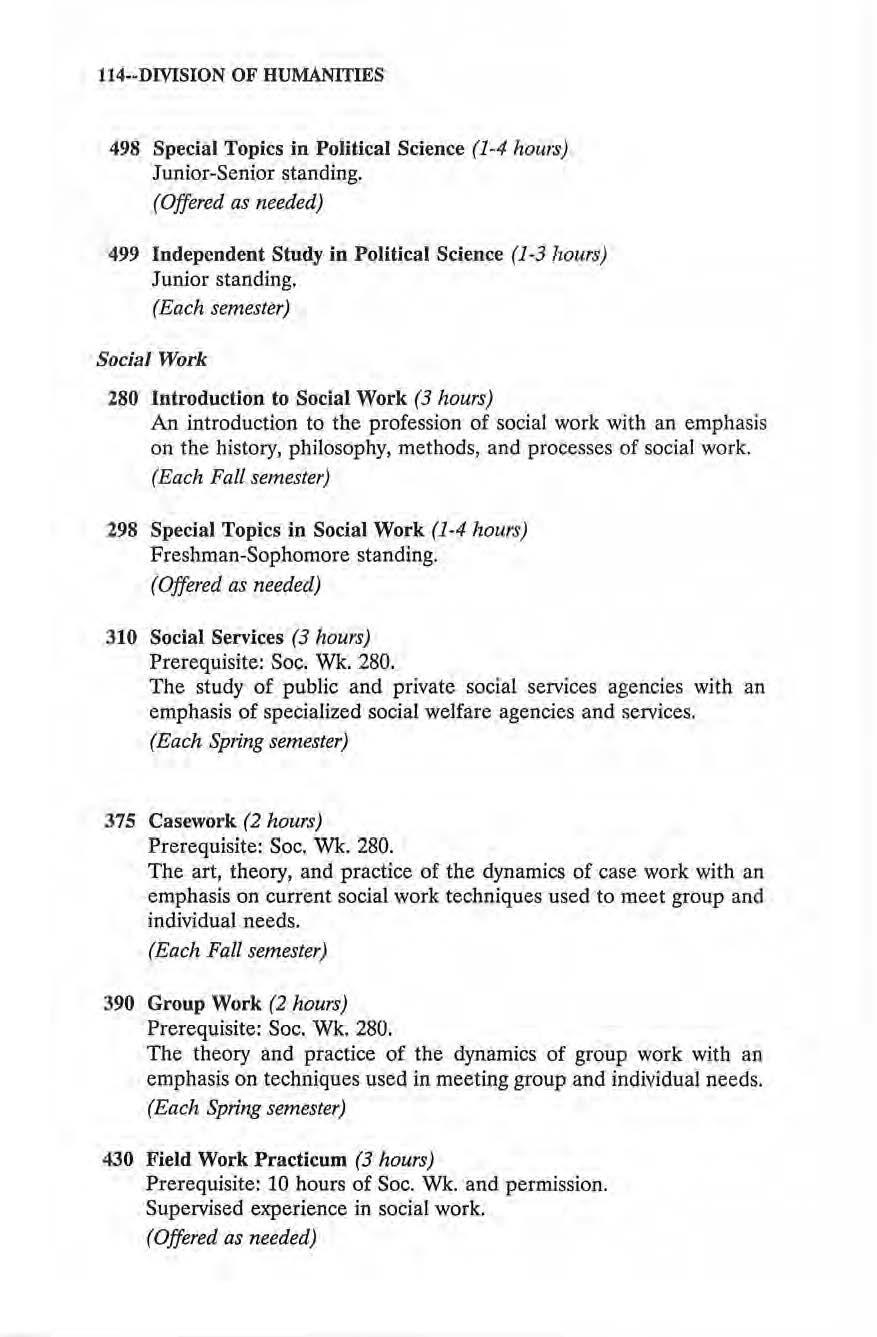
Socia l Work
280 Introduction to Social Work (3 hours)
An introduction to the profession of social work with an emphasis on the history, philosophy, methods, and processes of social work.
(Each Fall semester)
2 98 Special Topics in Social Work (1-4 hours) Freshman-Sophomore standing.
(Offered as needed)
3 10 Social Services (3 hours)
Prerequisite: Soc. Wk. 280.
Th e study of public and private social services agencies with an emphasis of specialized social welfare agencies and !lervices.
(Each Sp1ing semester)
375 Casework (2 hours)
Prerequisite: Soc. Wk. 280.
The art, theory, and practice of the dynamics of case work with an emphasis on current social wor k techniques used to meet group and individual needs.
(Each Fall semester)
390 Group Work (2 hours)
Prerequisite; Soc. Wk. 280.
The theory and practice of the dynamics of group work with an emphasis on techniques used in meeting group and individual ne eds.
(Each Spring semester)
430 Fie ld Work Practicum (3 hours)
Prereq uisite: 10 hours of Soc. Wk. and permission. Supervised experience in social work.
(Offered as needed)
114--DMSION OF HUMANITIES
498 Special Topics in Social Work (1-4 hours)
Junior-Senior standing.
(Offered as needed)
499 Independent Study in Social Work (1-3 hours)
Junior stand ing.
(Each semester)
Sociology
201 Principles of Sociology (3 hours)

A st udy of cultures and their relationship to specific social problems, social in stitutions, ethnic groups, and the major problems of social policies.
(Each Fall semester)
225 Introduction to Cultural Anthropology (3 hours)
A comparative and historical approach to the religion, social organization, subsist e nce patterns, and other aspects of the great variety of cultures around the world.
(Each Spring semester)
230 Sociology of Women (3 hours)
A brief history of women's role and status as well as society's attitude toward women.
(Fall semester, even years)
250 Community Organization (3 hours)
Prerequisite: Soc. 201.
The focus of this course is on the urban community, basic patterns of social and ecological organization, an d factors contributing to community integration and disorganization.
(Fall semester, odd years)
260 Rural Sociology (3 hours)
Prerequisite: Soc. 201.
An examination of rural societies with an analysis of rural groups, institutions, and rural-urban relations.
(Spring semester, even years)
298 Special Topics in Sociology (1-4 hourS)
Freshman-Sophomore standing.
(Offered as needed)
DIVISION OF HUMANITIES--115
3 00 Contemporary S o cial P roblems (3 hours)
An introduction to the causes, treatment, a n d prevention of selected social problems with particular emphasis on the problems of conflict and ineq u ality.
(Each Fall semester)
32 0 Sociology of Ed ucation (3 hours)
Prerequisite: Soc. 201.
An applicat ion of sociological pr inciples to the education process. T he relat i onship between stratification and education, the importance of interaction patterns on the educational process, the effect of other institutions on education, and the role of education as a dynamic institution in a changing society are stressed.

(Spring semester, even years)
321 S o ciology of Re lig io n (3 hours)
A study of t he role of religion in life, from early societ ies to the present. T he course stresses Sociological Theory of Religion and includes materials from Anthropology, Archeology, Macro-sociology, History, and compar ative religions.
(Offered as needed)
3 40 Th e Family (3 hours)
Prerequisite: Soc. 201.
An examination of the role of the family in contemporary society w ith an emphasis on the factors influencing the family structure, functions, and roles, and their implications for both the community and individuals at varying stages of the fam ily life cycle.
(Each Spring semester)
360 Crimi nology (3 hours)
An examination of the nature and causes of crime as a social phenomenon
(Fall semester, odd years)
370 Eth nic-Group Relation s (3 hours)
Prerequisite: Soc. 201.
A study o f the nature of minority groups and their d istribution in American society with an examination of the melting pot thesis in a pluralistic society.
(Spring semester, odd years)
116--DMSION OF ffiJMANITIES
420 His tory and Introduction to Modern Socio logica l Theory (3 hours)
Pr erequis ite: Soc. 201 and p ermiss ion.
An overview of earlier socio logical theorists and their contributio ns to curren t sociological theory.
(Spring semeste,; odd years)
498 Special T opi cs in Sociology (1-4 hours)
Junior-Senior s tandin g.
( Offered as needed)
499 Independent Study in So ciol ogy (1-3 hours)
Junior s tanding.
(Each semester)
Spa nish
101 Introduc tory Spanish (5 hours)
An introduct ory course in Spanish dea ling with grammar, reading, writing, and conversing.
(Each Fall semester)
102 Spanish II (3 hours)
Prerequisite: Spanis h 101 Intro duc tory Spanish. Span ish II emphasizes i ncreased profici ency in conversat ional situ a tions, grammar, reading, and writing.
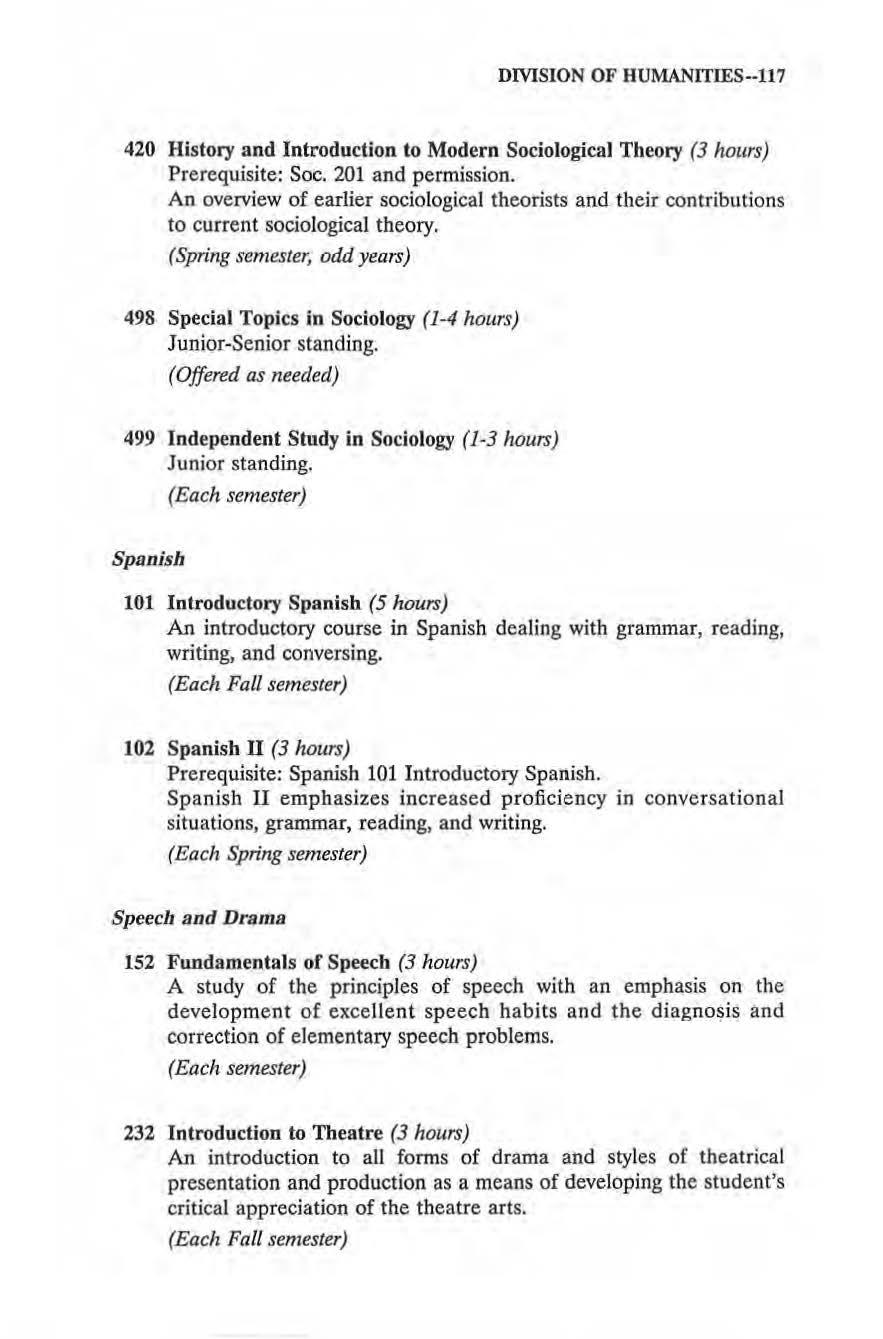
(Each Spring semester)
Speech and Drama
152 F undame ntal s of S peech (3 hours)
A st udy of the principles of speech with an emphasis o n th e development of exce ll e nt spe ec h habits and the diagno~is and correction of elementary speech problems.
(Eac h semester)
232 Introduction to Theatre (3 hours)
An introduct ion to a ll fo rm s of drama and styles of theatrical presentation and production as a mean s of developing t he student's critical appreciation of the t h eatre ar ts
(Each Fall semester)
DMSION OF HUMANITIES--11 7
235 S tagecrafts (3 hours)
An introduction to the study and practice of the basic aspects of technical theatre production including sets, lighting, costuming, sound, properties, and make-up.
(Each Spring semester)
254 Public Speaking (3 hours)
A study of the forms of address, speech organization, composition, delivery, and Parliamentary rules with practice required in various public speaking situations including public meetings and group discussions, radio and television broadcasting, inte rviewing, roleplaying, and debate.

(Each semester)
256 Acting Techniques (3 hours)
A concentration on stage movement and pantomim e with an emphasis on the development of the creative imagination and the use of stage conventions and techniques.
(Fall semester, even years)
257 Acting Styles (3 hours)
This course provides intensive t raining in stage business, dialogue and characterization, character analysis, and the principles of dramatic interpretation.
(Fall semester, odd years)
298 Special Topics in Speech and Drama (1- 4 hours)
Freshman-Sophomore standing.
(Offered as needed)
300 Summer Theatre Workshop (3 hours)
This course offers practical training in all aspects of theatre production including acting, set design, lighting , costuming, make-up, improvisation, music, and dancing.
(Summer Session only)
327 Light and Sound Design for Stage and Television (3 hours)
Prerequisite: Speh 235. This course studies the theory and practice of stage and television lighting and sound systems with an emphasis on color, acoustica l, and light problems.
(Spring semester, odd years)
118--DMSION
OF HUMANITIES
353 Speech Correction and Development (3 hours)
This course identifies the uniqu e educational problems of children with speech deficiencies with an emphasis on identification and remediation.
(Each semester)
355 Play Production in the Secondary School (3 hours)
This course for the director of dramatics in schoo ls and communities answers the fundamenta l questions of play selection, casting, directing, steps in rehearsal, scenery, lighting, costume, make-up, and business organization.
(Fall semester, odd years)
357 Interpretative Reading (3 hours)
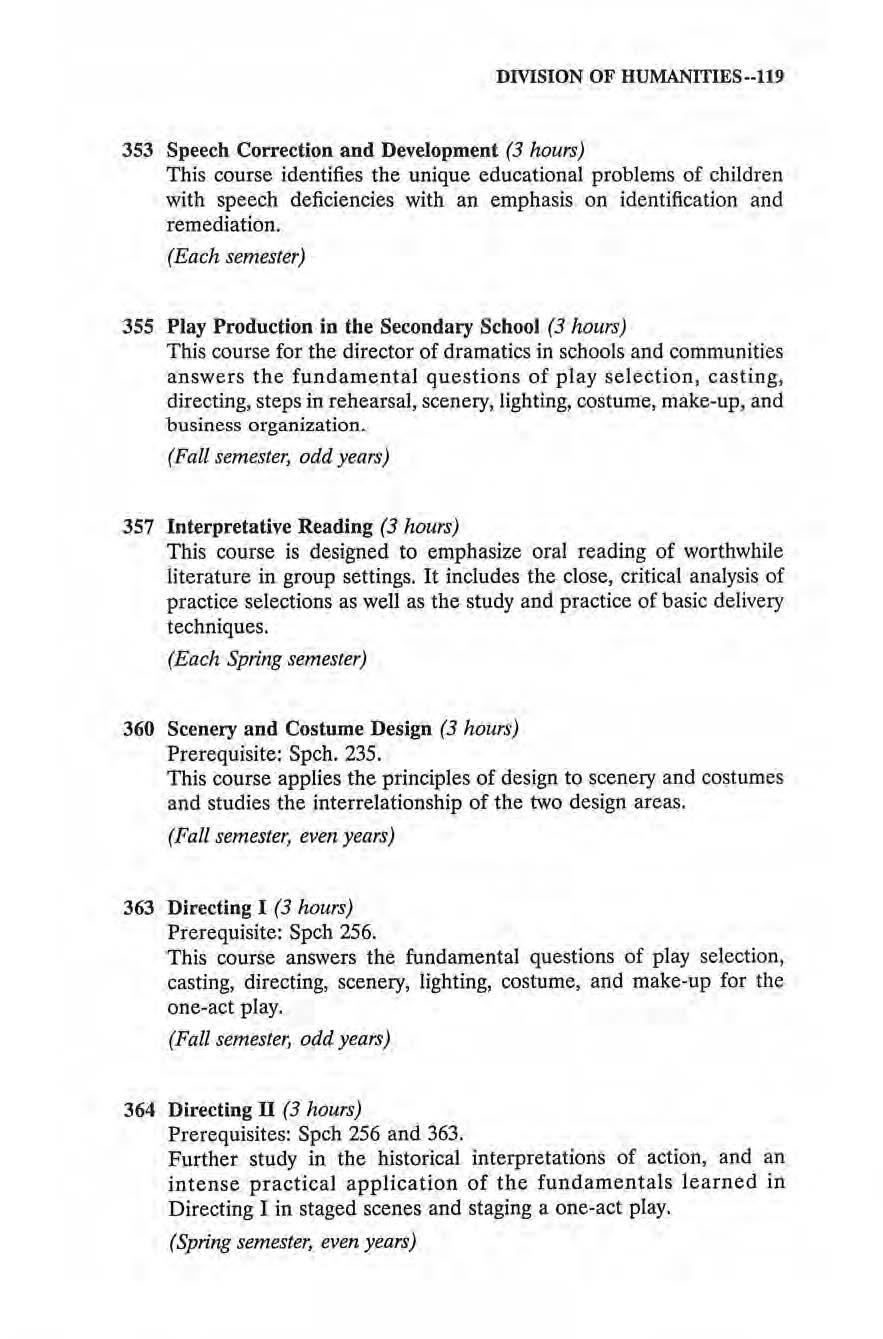
This course is designed to emphasize oral reading of worthwhile literature in group settings. It includes the close, critical analysis of practice selections as well as the study and practice of basic delivery techniques.
(Each Spring semester)
360 Scenery and Costume Design (3 hours)
Prerequisite: Speh. 235 .
This course applies the principles of design to scenery and costumes and studies the interrelationship of the two design areas.
(Fall semester, even years)
363 Directing I (3 hours)
Prerequisite: Speh 256.
This course answers the fundamentaJ questions of play selection, casting, directing, scenery, lighting, costume, and make-up for the one-act play.
(Fall semestetj odd years)
364 Directing II (3 hours)
Prerequisites: Speh 256 and 363. Further study in the historical interpretations of action, and an intense practical application of the fundamentals learned in Directing 1 in staged scenes and staging a on e-act play.
(Spring semester, even years)
DMSION OF HUMANITIES--119
369 Children's Theat.re and Creative Dramatics (3 hours)
The study and active participation in th e two different concepts of drama for young people. Creative dramatics, in which children with the guidance of an imaginative leader create scenes or plays and perform them using improvised dialogue and action with personal development as the go al , and Children's Theatre which utilizes written scripts directed and performed as a complete production for child audiences.
(Fall Semester, even years)
400 Theatre Hi story (3 hours)
This course will exam in e the nature, function, and literature of the theatre from its beginning to the present day. The approach will consist of a study of each of the major periods in theatre hjstory and representative plays of that period.

(Fall semester, odd years)
498 Special Topics in Speech and Drama (1-4 hours)
Junior-Senior standing
(Offered as needed)
499 Independent St udy in Speech a nd Drama (1-3 hours) Junior standing. (Each semester)
120--DIVISION OF HUMANITIES
DMSION OF SCIENCE AND TECHNOLOGY
Dr. David L. Pippert, Chairperson
Professors: Long, Pappas, L. , Pippert, Russell
Associate Professors: Longley, Pappas, C.
Assistant Professors: Evans, Fegan, McCaslin, Udey
Instructors: Haddad, Hinrichs
The Division of Science and Technology offers course work in the areas of Biological Science, Chemistry, Computer Science, General Science, Geology, Industrial Technology and Education, Mathematics, and Physics. Specific programs within the Division are designed to satisfy a wide variety of career goals by providing prerequisites for graduate study, offering teaching e ndorsements at the secondary level, and providing course work for personal enr ichment.
The Division offers B.A and B.S. degrees with majors in Computer Science, Natural Science, Mathematics and Industrial Technology and Education. Area of specialization (options) within the Natural Science major include Biological Science, Wildlife Ecology, Chenustry, Natural Science, Nuclear Technology, and Physical Science. Areas of specialization within the Industrial Technology and Education major include Industrial Management Technology, Electronics/Robotics Technology, Power and Transportatio n Technology, and Construction Technology.
Teacher education programs for endorsement in B iology, Chemistry, Computer Science, Natural Science, Industrial T echnology, Mathematics, and Physical Science are also available. The subject endorsements in Biology and Chemistry do not satisfy the requirements for a major unless a second subject endorsement is obtained. The Computer Science endorsement is designed to complement the requirements for one field or two subject endorsements in other areas.
The technology options within the Division provide practical applicatfons and the understanding of modern technology. The major objective is to enable individuals to prepare for professional, occupational, or personal living needs through study and laboratory activities. The curriculum is designed to help students acquire the knowledge and skills necessary to obtain entry level employm ent in their area of preparation or to provide a basis for further advanced study.
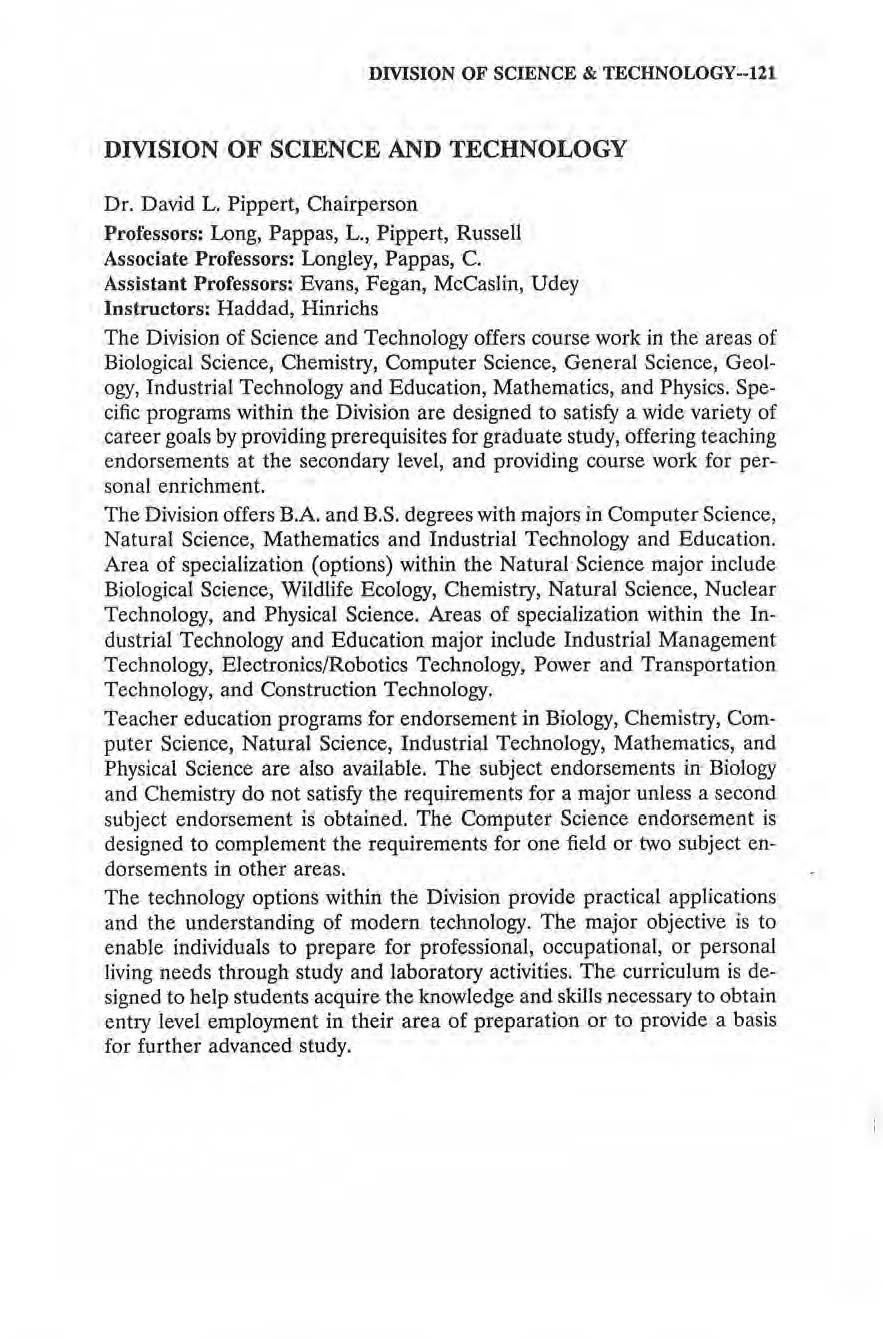
DMSION OF SCIENCE & TECHNOLOGY--12l
Natural Science
The Natural Science Bachelors Degree Program (B.S., B.A. or B.S. in Ed) consists of a core of courses to provide the students with a general background. In addition to completing these core courses, the student must also select and complete one of the several options within the curriculum. These options will allow the student to work towards one of a variety of career and occupational goals.
Requirements for Biologica l Science Optio n
The Biological Science option is designed for students planning to enroll in a graduate or professional school after completion of the baccalaureate degree.

122--DMSION OF SCIENCE & TECHNOLOGY
Chem Biol CSci Bus Natural Science Core Courses 101 Genera l Chemistry 102 General Chemistry 102 Introductory Zoology 103 BASIC Programming or 229 ~pplications Tota l Hours 4 4 4 3 1S
Hours Biol 101 Introductory Botany 4 203 Invertebrate Zoology 4 215 Pl ant Systematics 3 304 Comparative Anatomy 4 317 Ecology 4 404 Genetics 3 407 Developmental Biology 4 412 Experimental Biology 3 Electives in Bio logy 8 Total 37
Requirements for Wildlife Ecology Option
Th e Wildlife Ecology option fs designed for students interested in caree rs as conservation officers or park rangers.
Requirements for Biology Subject Endorsement Option
A biology subject endorsement is offered as part of the teacher education program. A second subject endorsement is required in order to satis fy the requirement for a major

DMSION OF SCIENCE & TECHNOLOGY--123
Biol 101 Introductory Botany 203 Invertebrate Zoology 215 Plant Systematics 225 Freshwater Biology 317 Ecology 395 Mammalogy 404 Genetics 411 Ornithology 486 Wildlife Management Techniques Math 340 Statistics Electives in Biology Total Hours 4 4 3 3 4 3 3 3 3 3 8 41
Biol Chem GSci Math 101 Introductory Botany 203 Invertebrate Zoology 215 Plant Systematics 301 Microbiology 304 Comparative Anatomy 312 Human Physiology 317 Ecology 404 Genetics 303 Organic Chemistry 100 Physics 125 Precalculus Mathematics I Select from: Geol 201, 202, 203 Total Hours 4 4 3 4 4 4 4 3 5 4 5 1-4 45-48
Requirements for Chemistry Subject Endorsement Option

A chemistry subject endorsement is offered as part of the teacher education program. A second subject endorsement is required in ord er to satisfy th e requirement for a major.
Th e requirements listed represent bo th the education and non-education degree programs. If the teaching endorsement is chosen, attention must be given to the additiona l courses required for entrance into the teacher education program
In the teacher education program,
124--DMSION OF SCIENCE & TECHNOLOGY
Chem Math GSci Phys 205 Principles of Qualitative Analysis 206 Principles of Quantitative Analysis 303 Organic Chemistry 304 Organic Chemistry 431 Biochemistry 499 Independent Study in Chemistry 225 Calculus with Analytic Geometry I 100 Physics or 201 General Phys ics Select at least 2 hours from: Geol 201, 202, 203 TotaJ Hours 4 4 5 5 4 .3 5 4 2-4 36-3 8
for Natura
Science
Requirements
)
Option
professional
Natural Science is a field endorsement. Hours Biol 101 I ntroductory Botany 4 203 I nvertebrate Zoology 4 312 Human Physiology 4 317 Ecology 4 Chem 142 Introductory Organic and Biochemistry 4 205 Principles of Qualitative Analysis 4 Phys 201 General Physics 4 202 General Physics 4 GSci 499 Indep. Study - Modern Physics 4 ITE 328 Analog Electronics 3 Geo! 201 Physical Geology or 202 Rocks & Minerals OT 203 Introducti on to Fossils 4 304 Meteorology and Climatology 3
semester.
Additional work in eith er Biology, Chemistry, Physics or Earth Science is required so that the ca ndidate has complet e d at least 20 semester hours in one of these subjects. Requi
In addition to t he specific coursework requirements listed below, the candidate for this option must also be a licensed reactor operator. Questions regarding this program should be directed to the Chairperson of the Division of Science and Technology.
The requirements listed represent both the education and non-educat ion degree programs. If the t eaching endorsement is chosen, attention must be given to the additional course required for entrance into the teacher education program professional semester. In the teacher education program, Physical Science is a fie ld endorsement.

DMSION OF SCIENCE & TECHNOLOGY--125 Phys 306 Astronomy Select 10 hours from: Math 126, 225, 226 Total 3 1 0 59
rements for Nuclear Technology Option
Ma th 225 Calcul us with Analytic Geometry I 226 Calculus with Analytic Geometry II Phys 201 General Physics 202 General Physics Bio l 210 Hum an Anatomy ITE 127 Power(fransportation Systems 132 Materials Processing I 233 Fun dam entals of Elect/Electronics Computer Science or Nuclear Physics elective Total Requirements for Physical Science Option Hours 5 5 4 4 4 3 3 3 3 34
Hours Chem 205 Princip les of Q ualitative Analysis 4 303 Organic Chemistry 5 304 Organic Chemistry or 206 Principles of Quantitative Anal. 4.5 GSci 100 Physics 4
After completing a core curriculum, two options are available to students interested in a Computer Science major-the technical option and the business application option. Students majoring in other areas and seeking background in computers may select the Computer Science minor.

Phys 201 General Physics 202 General Physics 306 Astronomy ITE 328 Analog Electronics. Geol 201 Physical Geolqgy 202 Rocks and Minerals or 203 Introduc6on to Fossils 304 Meteorology and Climatology Select 10 hours from: Math 126, 225, 226 Total Computer Science 4 4 3 3 4 3 3 51-52
U6--DIVISION OF SCIENCE & TECHNOLOGY
CSci Computer Science Core Courses 102 Introduction to Computer Concepts 103 BASIC Programming 203 COBOL Programming 204 Computer Programming I 206 Computer Programming II 208 Computer Systems 304 File Processing 306 Operating Systems and Computer Architecture 315 Computer O rganization 404 Data Structures and Analysis of Hours 3 3 3 3 3 3 3 3 3 Algorithms 3 406 Organization of Programming Languages 3 408 Senior Project 4
*Stude nts who have succe ssfully completed m a thematics courses equivalent to Math 125 and Math 12 6 may have these courses waived. Cors ent of Divi sion Chairperson is required. If consent is given, only 55 hours are re quired for the major .
Requirements for Computer Science-Technical Option
Select 12 hours from the following Mathematics courses:

DMSION OF SCIENCE & TECHNOLOGY--127 M a th 125*Precalculus Mathematics I 126*Precalculus Mathematics II 340 Statistics 418 Linear Algebra Total 5 5 3 3 53
Math 225 Calculus with Analytic Geometry I 226 Calculus with Analytic Geometry 1I 306 Modern Algebra 327 Calculus wi th Analytic Geometry III 328 Diffe rential Equations 404 Mathematical Modeling 430 Discrete Structures Total Hours 5 5 3 3 3 3 3 12
for Computer Science-Business Applications Option Hours Bus 231 Principles of Financial Accounting 3 232 Principles of Managerial Accounting 3 Select 6 houi:s from the following Bus 373 Organization Behavior 3 371 Cost/Managerial Accounting I 3 Econ 220 Principles of Macroeconomics 3 221 Principles of Microeconomics 3 Total 12
Requirements
To obtain the endorsement, teacher education students must also satisfy the requirement of a major in either one field or two subjects.
Mathematics
The mathematics major has two options, a mathematics option and a mathematics education option (field endorsement). The mathematics option allows a student to graduate with either a Bachelor of Arts or a Bachelor of Science degree with a major in mathematics. The mathematics education student graduates with a Bachelor of Science in Education degree ,
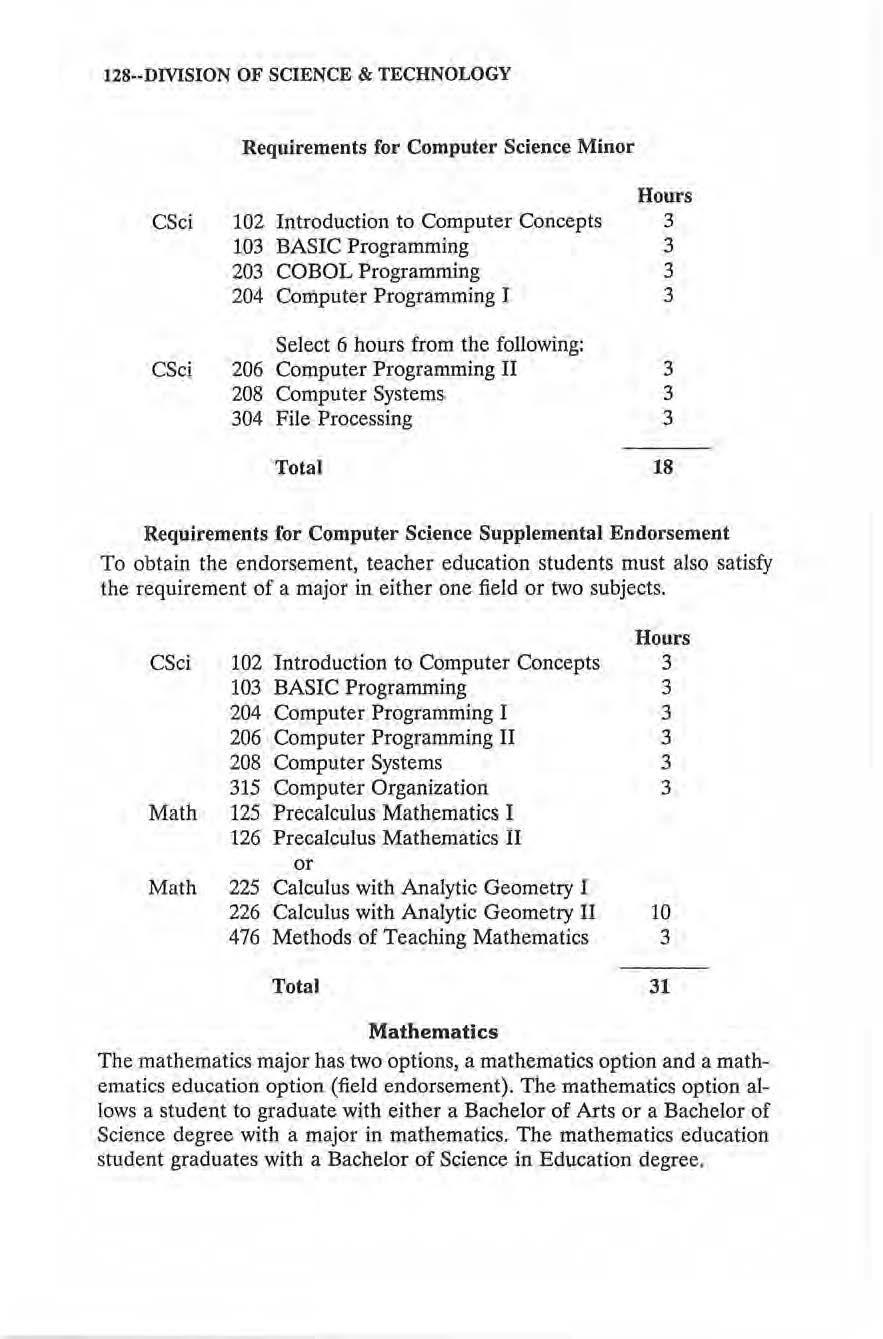
128--DMSION OF SCIENCE & TECHNOLOGY Requirements for Computer Science Minor CSci CSci 102 Introduction to Computer Concepts 103 BASIC Programming 203 COBOL Programming 204 Computer Programming l Select 6 hours from the following: 206 Computer Programming II 208 Computer Systems. 304 File Processing Tota l Hou:rs 3 3 3 3 3 3 3 18
for Computer Science Supplemental Endorsement
Requirements
CSci 102 Introduction to Computer Concepts 103 BASIC Programming 2 04 Computer Programming I 206 Computer Programming II 208 Computer Systems 315 Computer Organization Math 125 Precalculus Mathematics I 126 Precalculus Mathematics II or Math 225 Calculus with Analytic Geometry r Hours 3 3 3 3 3 3 226 Calculus with Analytic Geometry 11 10 476 Methods of Teaching Mathematics 3 Total 31
If the mathematics education option is chosen, attention must be given to the additional course work requirements for entrance into the secondary teacher education program and to the professional semester. Mathematics is a field endorsement in the teacher education program. Students who have taken mathematics courses equivalent to Math 125 and 126 should begin their program with Math 225. Consent of the Division Chairperson is required.
21
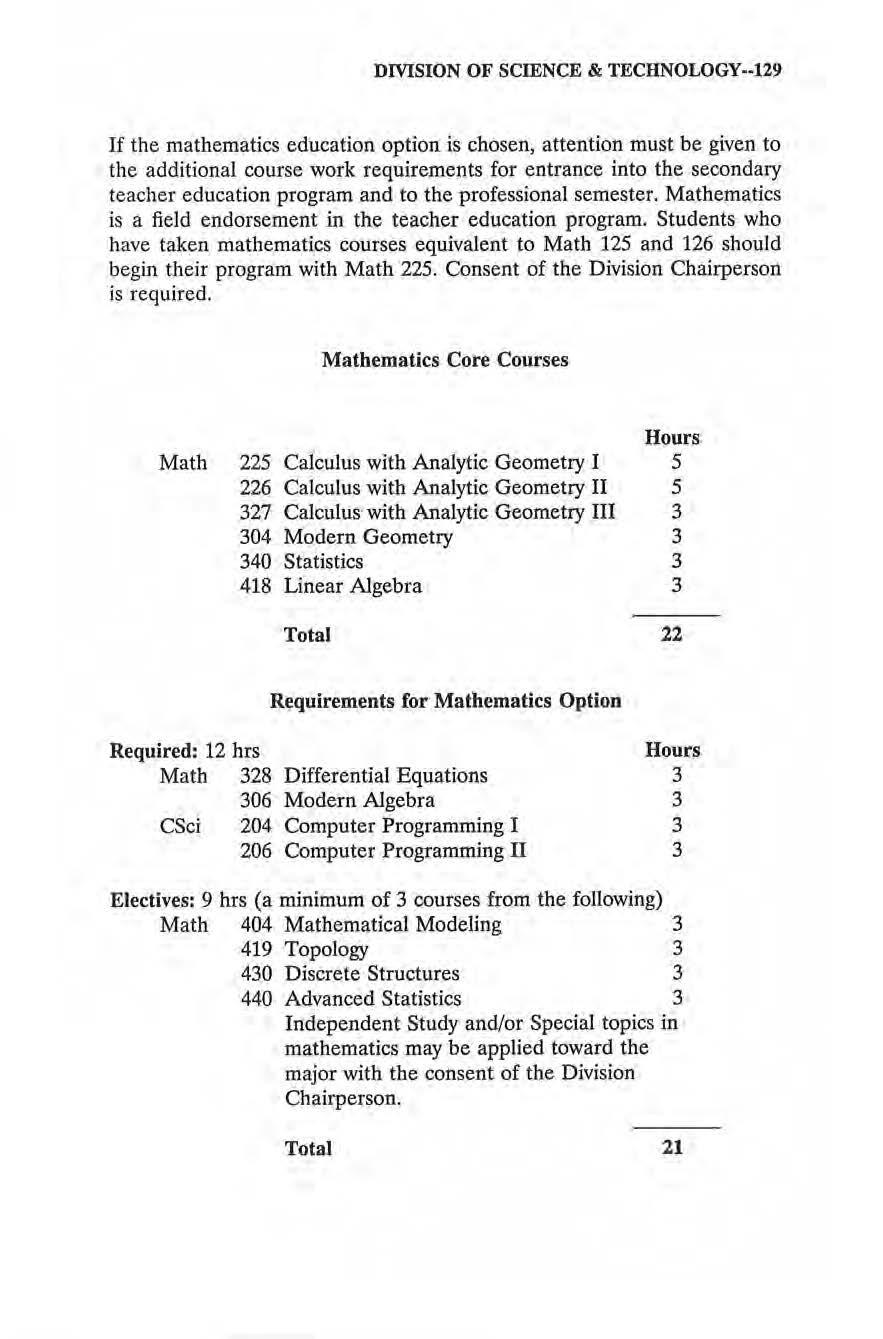
DMSION OF SCIENCE & TECHNOLOGY--129
Math Mathematics Core Courses 225 Calculus with Analytic Geometry I 226 Calculus with Analytic Geometry II 327 Calculus·with Analytic Geometry Ill 304 Modern Geometry 340 Statistics 418 Linear Algebra Total Hours 5 5 3 3 3 3 22 Requirements for Mathematics Option Required: 12 hrs Hours 3 Math 328 Differential Equations 306 Modern Algebra CSci 204 Computer Programming I 206 Computer Programming II 3 3 3 Electives: 9 hrs (a minimum of 3 courses from the following) Math 404 Mathematical Modeling 3 419 Topology 3 430 Discrete Structures 3 440 Advanced Statistics 3 Independen t Study and/or Special topics in mathematics may be
toward the major with
Total
applied
the consent of the Division Chairperson.
* A student who has taken Mathematics courses equivalent to Math 125 and 126 may waive the precalculus requirement. In such cases, a total of 42 hours are needed for the field endorsement. Consent of the Division Chairperson is requited.
Industrial Technology and Ed uc ation
The Industrial Technology and Education Bachelors Degree Program consists of a core of technical courses to provide the student with a broad general background of technology. T he several options available within the curriculum enable the student to specialize in one of a number of different occupational or professional areas.

130--DMSION OF SCIENCE &
Requirements for Mathematics Field Endorsement Option Required: 19 hrs Hours Math 125 Precalculus Mathematics I 5* 126 Precalculus Mathematics II 5* 404 Mathematical Modeling 3 CSci 100 In troduction to Computer Applications 3 103 Basic Programming 3 Electives: 6 hrs (a minimum of 2 courses from the following) Math 306 Modern Algebra 3 328 Differential Equations 3 419 Topology 3 430 Discrete Structures 3 440 Advanced Statistics 3 Independent study and/or Special topics in mathematics may be applied toward the major with the consent of the Division Chairperson. Total
TECHNOLOGY
25
Industrial Technology Education Option
The Industrial Technology Education option is for those who plan to teach Industrial Technology in public or private secondary schools. The professional education requirements must be met in addition to the courses listed for a teaching endorsement.
Industrial Management Technology Option
The curricu lu m for the Industrial Management Technology option is designed for students whose main objective is preparation for technician and managerial positions in industry. The curriculum has been developed to include a combination of technical and business courses in order to prepare the graduate for employment in an industrial enterprise.
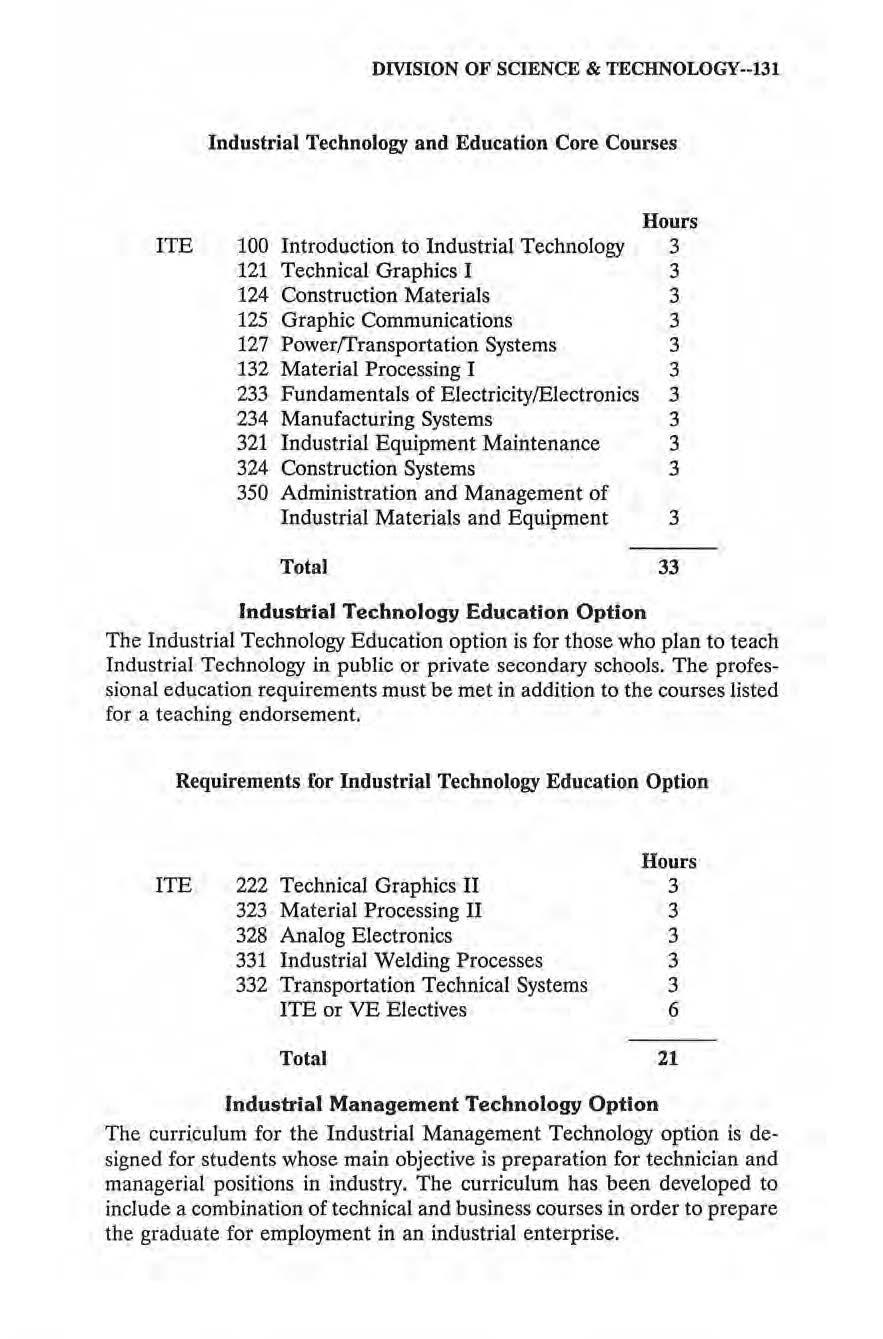
1TB DIVISION OF SCIENCE & TECHNOLOGY--131 Industrial Technology and Education Core Courses 100 Introduction to Industrial Te chnology 121 Technical Graphics I 124 Construction Materials 125 Graphic Communications 127 Power/Transportation Systems 132 Material Processing I 233 Fundamentals of Electricity/Electronics 234 Manufacturing Systems 321 Industrial Equipment Maintenance 324 Construction Systems 350 Administration and Management of Industrial Materials and Equipment Total Hours 3 3 3 3 3 3 3 3 3 3 3 33
Requirements for Industrial Technology Education Option ITE 222 Technical Graphics 11 323 Material Processing U 328 Analog Electronics 331 Industrial Welding Processes 332 Transportation Technical Systems ITE or VE Electives Total Hours 3 3 3 3 3 6 21
The Electronics/Robotics Technology option provides the graduate with a background in math and science as well as an emphasis in theory and laboratory work in electronics and robotics technology. Graduates may qualify for positions in technical sales, supervision of technicians, supervision of maintenance or similar positions dealing with electronics or robotics.

132--DIVISION OF SCIENCE & TECHNOLOGY Requirements for Industrial Management Technology Option Bus 231 Principles of Financial Accounting 251 Legal Environment and Contract Law 328 Principles of Marketing 373 Organizational Behavior 434 Human Resource Management 222 Technical Graphics Il 323 Material Processing II 338 Industrial Safety 370 Robotics Applications 380 Time and Motion Study 381 Quality Assurance 480 Industrial Management Internship (Only 6 hours of Internship will be allowed) or Upper Division Industrial Technology Hours 3 3 3 3 3 3 3 3 3 3 3 6 Electives 6 Total 39 Electronics/Robotics Technology Option
Requirements for Electronics/Robotics Technology Option ITE 328 Analog Electronics 332 Transportation Technical Systems 333 CAD/CAM 338 Industrial Safety 370 Robotics Applications 410 Digital Electronics 415 Microprocessors ITE Electives Math 125 Precalculus Math I Hours 3 3 3 3 3 3 3 3 s
The Power and Transportation Technology option provides the education necessary to qualify for positions of technical supervision, and technical sales or service. The curriculum includes technical studies in power and transportation, math, science, and business.

Phys Bus DMSION OF SCIENCE & TECHNOLOGY--133 201 General Physics 202 General Physics Elect 6 hours from the following: 251 Legal Environment and Contract Law 328 Principles of Marketin,g 373 Organization Behavior 434 Human Resource Management Total 4 4 3 .3 3 3 43 Power and Transportation Technology Option
Requirements for Power and Transportation Technology Option ITE Math Phys Bus 328 Analog Electronics 331 Industrial Welding Processes 332 Transportation Technical Systems 334 Automotive Systems and Maintenance 338 Industrial Safety 410 Digital Electronics 412 Microprocessors Hours 3 3 3 3 3 3 440 Engine Tune-Up and Electrical Systems 441 Suspension and Brake Systems 3 1 1 442 Power Transmission Mechanics 125 Precalculus Math I 201 General Physics Elect 6 hours of the following: 251 Legal Environment and Contract Law 328 Principles of Marketing 373 Organizational Behavior 434 Human Resource Management Total 1 5 4 3 3 3 3 39
Construction Technology Option
The Construction Technology option is designed to prepare individuals for positions in the construction industry as estimators, insp e ctors , technicaJ specification writers, project managers, maintenance supervisors, qu a lity coutrol specialists, and labor-management relations personn e l.
F or those seeking an endorsement in Vocational Trades and Industrial Edu cation , th e following is required in addition to th e general degre e program.
1. An emphasis in Industrial T e chnology Education
2 . A minimum of 12 semester hours in an a rea of sp e cia lization, e. g., carpentry, auto mechanics, etc.
3 . Six hours from the following vocational courses:
a. Vocational Education 441/541
b. Vocational Education 442/542
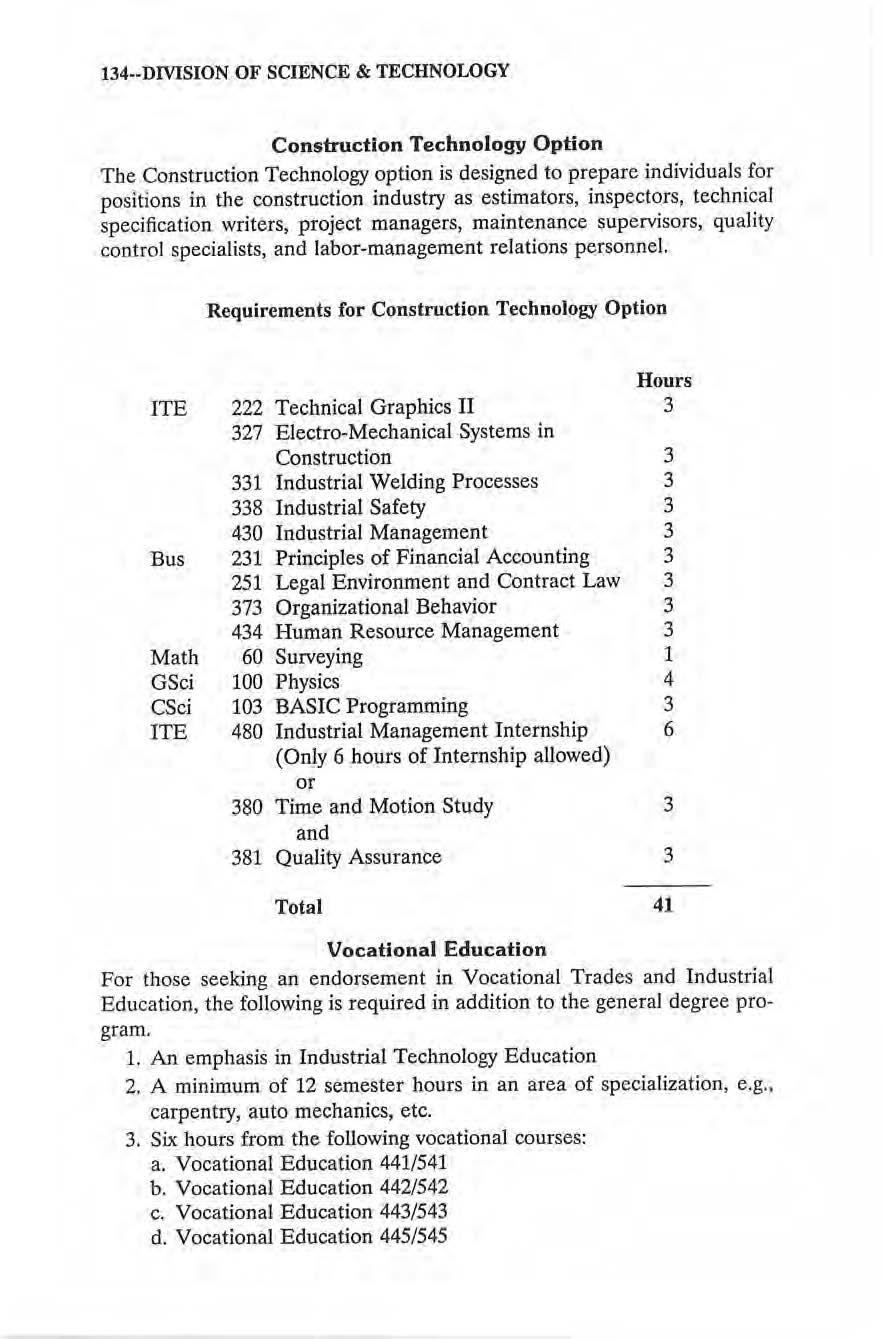
c. Vocational Education 443/543
d. Vocational Education 445/545
134 --DMSION OF SCIBNCE & TECHNOLOGY
Requirements for Construction Technology Option ITE Bus Math GSci CSci ITE 222 T e chnical Graphics II 327 Electro-Mechanical Systems in Construction 331 Industrial Welding Processes 338 Industrial Safety 430 Industrial Management 231 Principles of Financial Accounting 251 Legal Environment and Contract Law 373 Organizational Behavior 434 Human Resource Management 60 Surveying 100 Physics 103 BASIC Programming 480 Industrial Management Inte rnship (OnJy 6 hours of Internship allowed) or 380 Time and Motion Study and 381 Quality Assurance Total Vocational Education Hours 3 3 3 3 3 3 3 3 3 1 4 3 6 3 3 41
4. Student teaching in a vocationally approvable program. If st udent teaching is not done in a vocational approvab le program, an extra 3 semester hours of profess ional vocational courses are r equired.
5. The candidate shall have a minimum of 2000 hour s of paid occupational experience in an area closely related to the field in which he/ she is preparing to teach.
a. If more than 5 ye ars has elapsed since th e experience, a maximum of 1000 hours of the occupational experience can be accep ted and the program sha ll require, in addition, V .E. 444: Industrial In tern• s hi p with a minimum of 360 clock hour s of supervised employment in an area closely related to the field in which the candidate is preparing to teach
OR
The can did ate shall have a minimum of 1000 clock hours of fulltime employment or the equivalent in accumulated part-time emp loyment p lus comp letio n of V.E. 444 : Indu s tria l Interns hi p, with a minimum of 360 clock hours of supervise d work experience in an area closely related to the field in which the candidate is prep a ring to teach .
Driver Ed ucation
To qualify for an endorsement in driver education a person must complete a field or two subject areas. An additiona l requirement for the endorsement is a valid Nebraska driver's license.
P re-Profession a l Program s
The transfer programs listed in this section may require from one to four years to complete. They do not represent academic majors. Students plan• ning to complete a degree at P e ru State must satisfy the requirements for a s pecific academic major in addition to completing the requirements for one of these programs.

DMSION OF SCIENCE & TECHNOLOGY•·l35
Hou rs ITE 240 Car Care 2 o r 334 Automotive Systems and Maintenance 3 337 Driver Ed/Traffic Safety I 3 338 Industrial Safety 3 340 Driver Ed/Traffic Safety II 3 PE 215 First Aid 2 Tota l 13-14
Pre-Dental and Pre-Med ical
Below is a suggested outline for both programs. The students are advised to secure a cata log from the professional school they expect to attend as individual schoo ls may vary in requirements for pre-dental and pre-medical programs.
The requirements for forestry schools vary. Early in the p re-forestry program st ud ents sho uld consult th e catalog of th e college they plan to attend later. Grades of below average will probably not transfer.
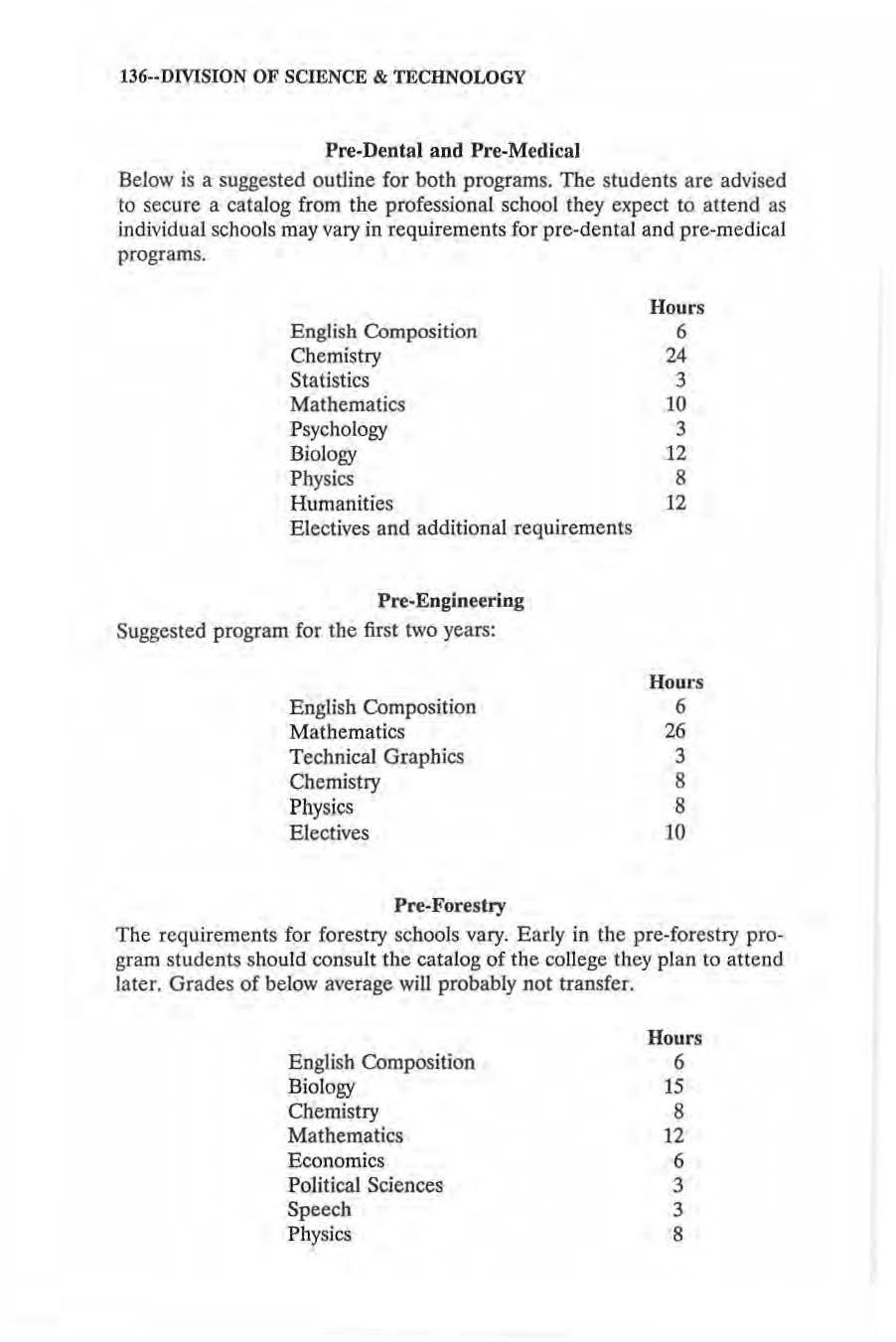
136-- DMSION OF SCIENCE & TECHNOLOGY
English Composition Chemistry Statistics Mathematics Psychology Biology Phys ics Humanities Electives and additional requirements Pre-Engineering Suggested program for the first two years: English Composition Mathematics Technical Graphics Chemistry Phys ics Electives Pre-Forestry Hours 6 24 3 10 3 12 8 12 Hours 6 26 3 8 8 10
English Composition Biology Chemistry Mathematics Economics Political Sciences Speech Phys ics Hours 6 15 8 12 6 3 3 8
Pre-Mortuary
Th e following program is suggested as a prerequisite for ente ring a college o

The following program is suggested for students interested in nuclear medicine
Applicants for a physician assistant program must have satisfactorily comp lete d a minimum of 60 semester hours including the following courses:
DMSION OF SCJENCE & TECHNOLOGY--137
f mortuary science: English Composition Mathematics Chemistry Biology Speech Physical Education Accounting Electives Pre-Nuclear Medicine Technology Hours 6 5 12-16 12 6 5 6 4-8
technology: General Chemistry Biology Physics English Composition Principles of Sociology Introduction To Psychology College Algebra Pre-Physician Assistant Hours 8 4 4 6 3 3 4
English Composition Biology Hours 6 8 (Zoology and Anatomy Recommended) Chemistry 8 4 6 4 (General and Organic) College Algebra Psychology Physics Electives 26
Pre-Radiologic Tech nology
The following program is suggested:
Applicants to a co ll ege of pediatric medicine must have completed the following prerequisite courses:
The following cou rses are suggested for admittance into a dental hygie ne program :

138--DMS IO N OF SCIENCE &
TECHNOLOGY
English Composition Psychology or Sociology Biology Mathematics Pre-Pocliatric Medicine Hours 6 6 8 3
Biology General C h emistry Organic Chemistry Physics English Composition Pre-Dental Hygiene Hours 8 8 10 8 6
English Composition General Chemistry Introductory Zoology Introductory Botany G enetics P r inciples of Sociology Introduction to P sychology Nutrition First Aid Wellness Fundamentals of Speech Social Sciences E lectives Humanities Electives History Elective Hours 6 8 4 4 3 3 3 3 3 3 3 9 9 3
Pre-Osteopathic Medicine
In addition to a total of at least 90 semester hours of credit, students accepted for admission must have completed coursework in the following specific areas:
The basic science and humanities requirements for nursing programs vary depending on the school selected and the level of training offered (i.e., diploma, associate degree or baccalaureate degree program). The pre-nursing student is urged to obtain a copy of the catalog of the nursing school selected to insure proper planning for transfer. The following courses are suggested for a one-year pre-nursing program:
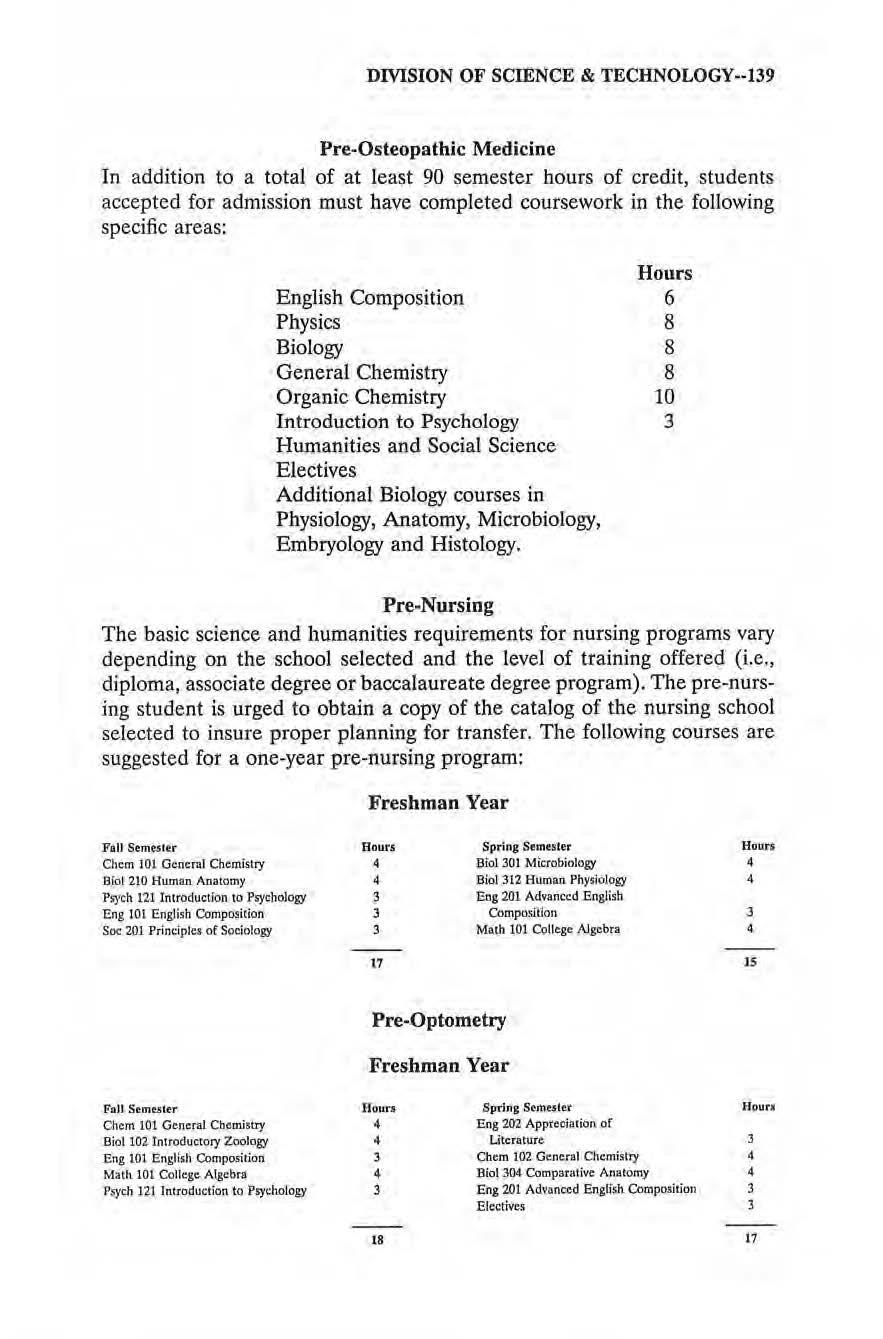
Fall Seme.ster
Chem IOI Goncrul Chemistry
erot• 210 Human Anatomy
P~ych 121 Introductfon 10 Psychology
Eng JOI English Co'mposition
Soc 201 Prindples of Sociology
Foll Semt.!itfr
Chem 101 General Cbca,j• ll:y
P~ych 121
DIVISION OF SCIENCE & TECHNOLOGY- -13 9
English Composition Physics Biology General Chemistry Organic Chemistry Introduction to Psychology Humanities and Social Science Electives Additional Biology courses in Physiology, Anatomy, Mi crobiology, Embryology and Histology.
Hours 6 8 8 8 10 3
Pre-Nursing
Introductory Zoology
Biol !OZ
Eng 101 Engl/sh Composition Math 101 College Algebra
Freshman Year Hours 4 t7 Sprin,g Semester -6fol 301 Mtcrobiology Biol 312 Humon Physiology Eng 201 Advanced English Compmillon Moth I OI Q,llege Algebra Pre--Optometry Freshman Year f lours 4 4 3 4 3 l8 Spring Se.mulu Eng 20'2 Apprcoiation of Utcrature Chem 102 General CJ,cmi,try Biol 304- Comp:uativc Anatomy Eng 201 Advanced E,,glfsh Composition Electives Huu:rs 4 4 J JS Mouu 17
Introduction to Psychology
140-·DMSION OF SCIENCE & TECHNOLOGY
hours of coursework which must include the following:
requires a minimum of 60
Restricted electives should be from the following areas: Humanities, Social Sciences, and Behavioral Sciences. Additional electives should be selected from the areas of P hysics, Chemistry, Computer Science, Mathematics, Business Administration. Students should refer to college pharmacy cataJogs for more information.
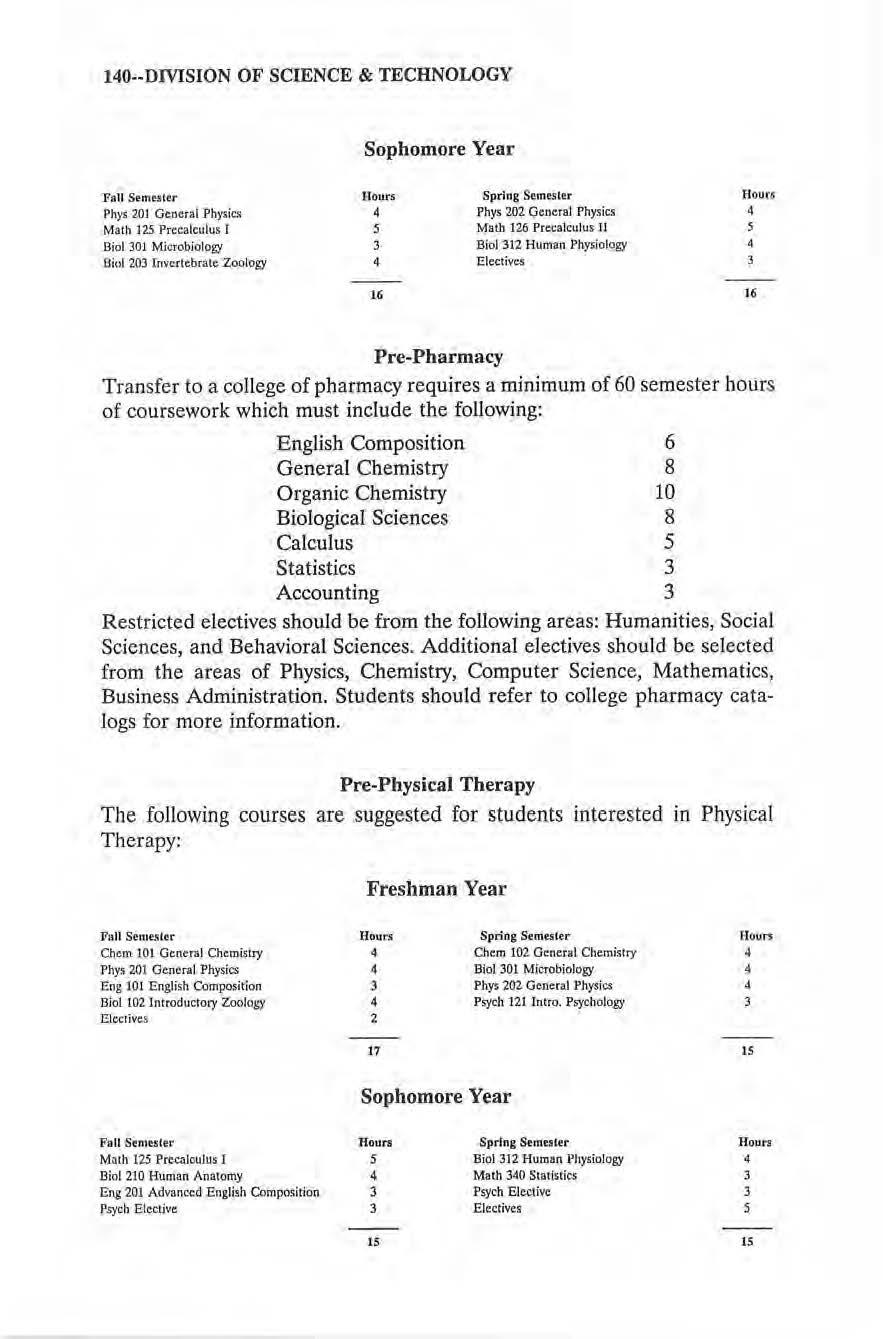
Pre-Physical Therapy
The following courses are suggested for students intereste d in Physical Therapy:
Foll SemHter Phy, 201 Geocral Physics Math 125 Procaleulus I Biol 101 Microbiology Oiol 203 rnvcrtebrate Zoology Sophomore Year Uours 4 16 Spring Scmrsler Phys 202 Geuera'I Physics Math 126 Prec3 lcu lus 11 Biol 312 Human Physiology Elec1ives Pre•Pbarmacy Hours 4 s 16 Transfer to
pharmacy
English Compos ition General Chemistry Organic Chemistry Biological Sciences Calculus 6 8 10 8 5 Statistics 3 Accounting 3
a college of
semester
li'nll Semester Chem 101 General Chemisuy Phys 201 Oenoral Physics Eng 101 English Composi tion Btol 102 Introductory ZoolQgy Elecrivcs Frall Sen1ester Mnth 125 Pm:aloulu, I Biol 210 Human Anatomy Eng 201 Advanced English Composition Psych Elective Freshman Year Ifours 4 4 ) 4 2 17 Spriog Semester Chem 102 General Chemisuy Biol 301 Mlcrobiology Ph~ 202 General Physics Psych 121 Intro. P,yoholoSY Sophomore Year Hours s 4 3 3 15 Spring S,mr,t,r Biol 3l2''Hurnan Physiology Math 340 Statistics Psych Elective Electives Houn 4 4 4 3 15 lfour-s 4 3 3 5 IS
Pre-Respiratory Therapy
The following courses are suggested for students interested in entering a baccal aureate program in respiratory therapy,
Speh 152
11D II Se meskr Ohcm 101 Gcnctnl Chcmisrry
210 Human Anatomy
Pre-Veterinary
The courses listed below are suggested for Veterinary Science. Fall Semt!let
101 General Chemi•try
102 Tnlroductory Z,,ology
Math 101 College Algebra or
Malit 125 PreCllicUlu, Mnlhcmatles 1 GSd l 00 Physics Foll Som•s!er Chom 205 l'rineip les or
303
102
Chomislry Speh 152 Pundamentals of Speech Biot 3 12 Hum1111 l'hysiolol!)'
101 Engtilo Composition

DIVISION OF SCIENCE & TECUNOLOGY--141
Voll Scmcst•r Biol
In1roductory
Eng
English Composition
Fundamen1als
Fine
Electives Eh:ctivc1
Biol
GScI
l'hy•ics or Phy,
General Physics Elective:, Freshman Year Hours 4 :; 3 3 3 16 Spring Semest,r B iol 301 Mimibiology t,lath
College Algcbru Psych
Intro.
Psyeholo8)' Ek.ctiYCli Sophomore Year Bonn 4 4 4 4 16 S pring Semcsier Chem
General Chcmislry Biol
Human Pbysiology Elective.
lOl
Zoology
101
or Speh
Arts
I 00
201
101
121
10
102
312
Chem
Biol
or Cbcm
Organic Chemistry Eng 201 Advanced English Composition Biol 407 Developmental Biology Eteetlves Freshman Year Rour,i 4 4 4.5 4 16•17 Spring Semester Chem
Eng
Eleo1ivcs Sophomore Year Hour, Spring Semu terChem
J'riMiples of Quon1ila1ive Analysis or 4.5 Chom 304 Organic Chemistry Biol 304 Comp~rative Anoromy 3 Iliot 404 Genetics 4 16-17 Hours 4 4 3 6 17 Hours 4 4 8 16 Hours 4 '.l 4 3 17 Hours 4.5 4 3 11-U
Quollt~tivc Annlysi1
General
206
142--DMSION OF SCIENCE & TECHNOLOGY
Medical Technology
During the first three years the student must satisfy th e General Studies requirements for graduation, complete a minimum of 90 semester hours applicable toward a baccalaureate degree, complete 24 semester hours of Chemistry, 15 hours of Bio logy, and at least one course each in Mathematics and Physics. The fourth year, which consists of a full twelve-month program, is spent in residence at an approved schoo l of Medical T echno logy.
Suggested Program for Medical Technology

~·•II Sc" ocste, Eng 101 English Composition
Math I 25 l'rccalculus Mathematics I Biol 102- lntroductory Zoology
Chem 101 General Chcmisll)'
Physica'I Education activities
Col 100 New Student Experience
Freshman
Fnll Se.mesltr
P&ych 121 Tntrod11c1ion to Psychology
Eng "202 Apprec1ation of Utcraturc
Chem 205 Prlnclple.s of Qual ilotive
Ana lysis
Hist 113 U.S. History lo 1865 or
Hist 201 Wo rld Civ!liz.atlon to 1500
Biol 407 Developmental Biology
Fon Sem-es1er Chem 303 Organic Chemistry
Phys 201 General Physie.<
Biol 404 Genet/cs
PE 100
Wellness
Year
Spring Semester J Spc,h 152 Fundomentol, or Sp~•o.h 5 Math 126 Prccalculu• A Mathomatks n 4 Hist 114 U.S. History since 1865 l Chem 102 General Chcmisiry
103 BASIC Programming 18 Sophomore Year Hour.s 3 3 4 17 Spclne: Stmealer .Biol 304 Comparative. Anotomy Biol 312 Human Physiology
206 Princlple.s of Quanlitnlivc Annl)'!is
American National Government Art 206 Art Apprccratlon or Music 211 Music Apprecialio11 Junior Year nours: s 4 3 2 14 Spring S-eme.ste.r Chem 304 O rgan,<- Chemistry Biol 301 M1crobiology Eng 201 Advanced English C:Omposi1ion Technical Learning Electlves Senior Year
Hours
CSci
Chem
PSci•201
of Medical Technology. 1:fOUfjJ 3 5 3 4 3 18 Bour,, 4 4 18 16
Twelve month program at an approved school
Natural Resources
2 Plus 2 Agreement
Tile 2 Plus 2 Agreement in Natural Resources is a joint program betwe e n Peru State College (P SC) and the Colleges of Agricultural Sciences and Natural R esources (CASNR) at the University of Nebraska - · Lincoln (UNL) which allows PSC students to continue their education and study in a major leading to a Bachelor of Science Degree in Natural Resources. The agreement provides a basic knowledge plus specialized co urse work in natural resources. A student enrolled in this program may transfer all satisfactorily completed academic credits identified in the course schedule listed below, and enter CASNR to study in a major leading to a Bachelor of Science Degree in Natural Resources. Details of the agreement may be obtained from the Chairperson of the Division of Science a nd T echnology.
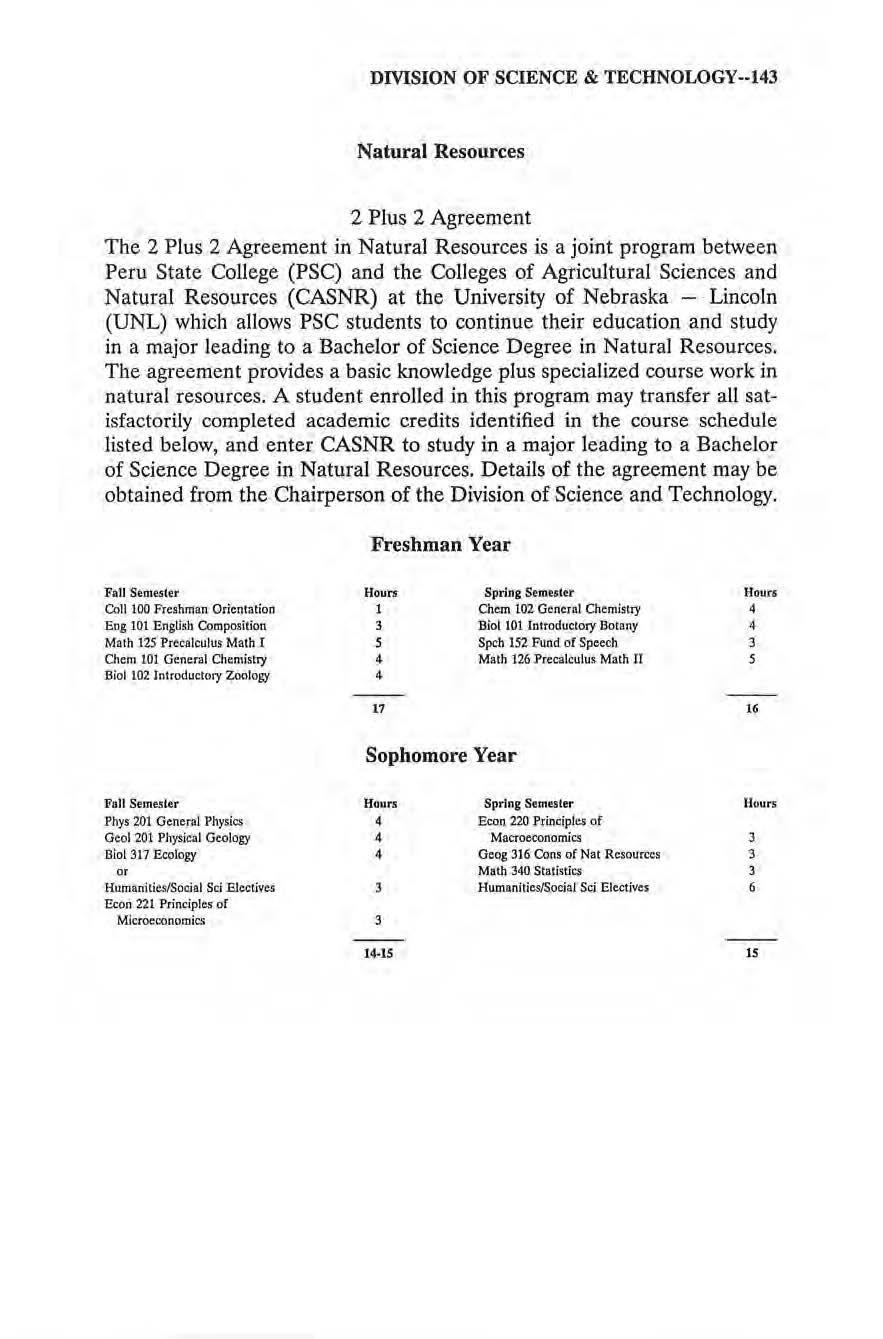
DIVISION OF SCIENCE & TECHNOWGY--143
Fall Semester Coll 100 Fre,hman Orientation Eng 101 EngU,h Composition Moth 125 Precalculus Math I Chem 101 General Chem istry Biol 102 Jntroducloiy Zoology Fall Semesler Phys 201 General Physics Geo! 201 Physical Geology Biol 317 Ecology or liumanitics/Soojal Sd Elcclives Econ 221 Principles or Mkroeconomics Freshman Year Hour, I 3 s 4 4 17 Spring S•muccr Chem 102 General ChemiSltJ' Biol lOI Introductory Botany Speh 152 Fund of Speech Math 126 Precalculu, Math II Sophomore Year Hours 4 4 4 14-15 Spring SemHCer Econ 220 Pcincjplos of Mncrocconomks Geog 316 Cons of Nat Resources Math 340 Statistic, Hwnonitios/Soeial Sci Elective, Houro 4 4 3 s 16 Hours 3 3 6 I S
Biologica l Science
Course Descrip tions
101 Intro ductory Bo tany (4 hours)
T his is a course designed for science and non-science majors wh ich includes theoretical and pract ica l aspects of plant functions . Three hours classwork, two hours laboratory.
(Each Spring semester)
102 Introd uctory Zool ogy (4 hours)
This is a basic course for science and non-science majors which includes cell biology, genetics, embryology, p hysiology, ecology, and animal behavior. Three hou rs cl asswork, two hours labor atory.
(Each Fall semester)
203 Invertebra te Zoology (4 hours)
Prerequisites: Biol 101 and 102.
This course introduces the structure, classification, behavior, medical , and evolutionary relationships of invertebrate animals. T hree hours classwork, two hours laboratory.
(Fall semester, even years)
210 Human Anato my (4 hours)
This course is a comprehensive examination of the cell biology, histology, embryology, genetics, skeletal system and muscular system of humans. T he course is designed for students in aJlied health and pre-nursing.
(Each Fall semester)
215 Pla nt Sys tematics (3 hours)
Prerequisites: Biol 101 and Biol 102.
The principles and methods of plan t taxonomy and nomenclature are studied in this course T hree hours classwork,
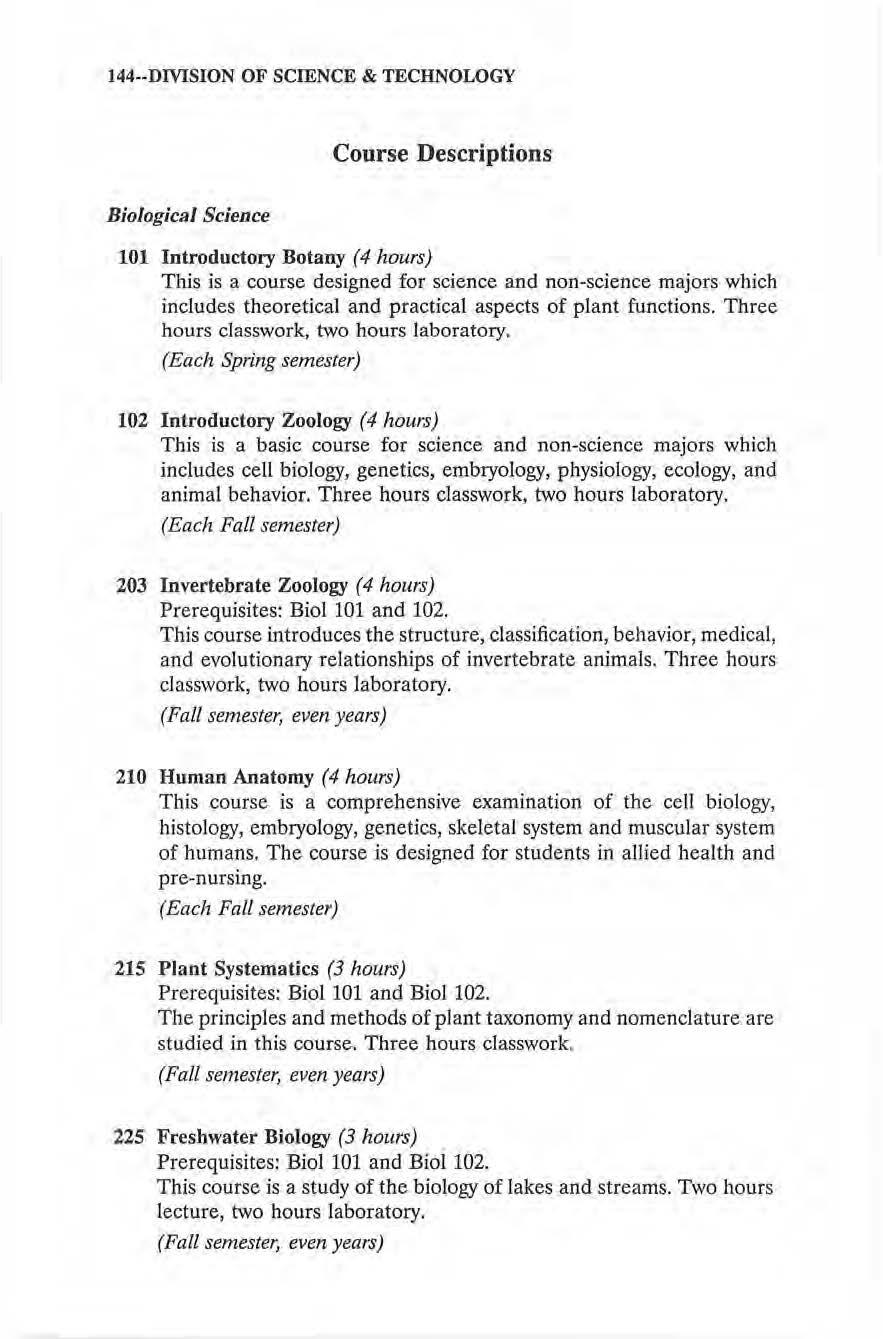
(Fall semester, even years)
2-25 Fres h water B iology (3 hours)
Prerequisites: Biol 101 and Biol 102.
This course is a stu dy of the biology of lakes and streams. Two hours lecture, two hours laboratory.
(Fall semester, even years)
144 DMSION OF SCIBNCE & TECHNOWGY
298 Special Top ics in B i o lo gy (1 -4 hours)
Freshman-Sophomore standing.
(Offered as needed)
301 M ic robiol ogy (4 hours)
Prerequisites: Biol 101 and Biol 102; or Biol 210. This course provides an introduction to the field of microbiology with emphasis on medical laboratory skills and microbiology technique. Two hours classwork, four hours laboratory.
(Each Spring semester)
304 Co mparative Anatomy (4 hours)
Prerequisites: Biol 101 and Biol 102. The evo l utionary relationships of vertebrates are studied anatomically in this course. Three hours classwork, two hours laboratory.
(Spring semester, odd years)
312, Human Physio l ogy (4 hours)
Prerequisites: Biol 102 and Biol 210. This course examines the functions of the human body including the nervous, cardiovascular, respiratory, endocrine, urinogenital , digestive, and immune systems. Emphasis is placed on the body's homeostatic control mechanisms.
(Each Spring semester)
317 Ecology (4 hours)
Prerequisites: Biol 101 and Biol 102. Organisms including their interactions with each other and their envir onment are studied in this course. Three hours classwork, two hours laboratory.

(Fall semester, odd years)
395 Mamma l ogy (3 hours)
Prerequisites: Biol 101 and 102.
This course is a study of mamma ls with an emphasis on midwestern species. Two hours lecture, two hours laboratory.
(Fall semester, odd years)
404 Genetics (3 hours)
Prerequisites: Biol 101 and 102.
In this course Mendelian principles of heredity with special emphasis on current advances are covered. Three hours classwork.
(Fall semester, odd years)
DMSION OF SCIENCE & TECHNOLOGY--145
405 Histology (4 hours)
Prerequisite: Biol 102. This course studies the microscopic anatomy of mammalian tissue and organ systems with an emphasis on medical applications. Three hours classwork, t\vo hours laboratory.
(Offered as needed)
407 Developmental Biology (4 hours)
Prerequisites: Biol 101 and Biol 102. This course is a study of the mechanisms of development in plants and animals. Three hours classwork, two hours laboratory.

(Spring semester, even years)
411 Ornithology (3 hours)
PreTequisites: Biol 101 and Biol 102. This course is a study in avian biology includin g morphology, physiology, taxonomy, breeding, and ecology. Two hours lecture, two hours laboratory.
(Sp,ing semester, odd years)
412 Experimental Biology (3 hours)
Prerequisites: Biol 101 and Biol 102, and 8 hours upper division Biology courses.
Students will examine current biological topics of interest tbal emphasize scientific method, interpretation, and a nalysis. Three hours lecture.
(Spring semester, even years)
486 Wildlife Management Techniques (3 hours)
Prerequisites: Biol 101 and 102.
Contemporary techniques of conservation and management of wildlife are studied. Three hours lecture.
(Spring semeste,, even years)
497 Wildlife Biology Internship (3 hours)
Prere quisite: Junior status, prior approval of the Chairperson of the Natural Science Division, and acceptance as an intern by the Nebraska Grune and Parks Commission. Students will work with a Biology faculty member and commission employees on a wildlife biology related project.
(Offered as needed)
146--DIVISION OF SCIENCE &
TECHNOLOGY
498 Special Topics in Biology (l-4 hours)
Junior-Senior standing.
(Offered as needed)
499 Independent Study in Biology (1-3 hours)
Junior standing.
(Each semester)
Chemistry
101 Genera l Chemistry (4 hours)
Prerequis ite~ High schoo l aJgebra.
An introduction to the fundamentals of chemistry, topics such as atomic theory, chemical bonding, stoichiometry, solutions, and pH are covered. Three hours classwork, two 110urs laboratory.
(Each Fall semester)
102 General Chemistry (4 hours)
Prerequisite: Chem 101. This course is an application of the fundamentals of chemistry, including states of matter, oxidation-reduction, thermochemistry, chemical equilibrium, kinetics, nuclear chemistry, and descriptive chemistry. Three hours classwork, two hours laboratory.
(Each Spring semester)
l42 Introductory Organic and Biochemistry (4 hours)
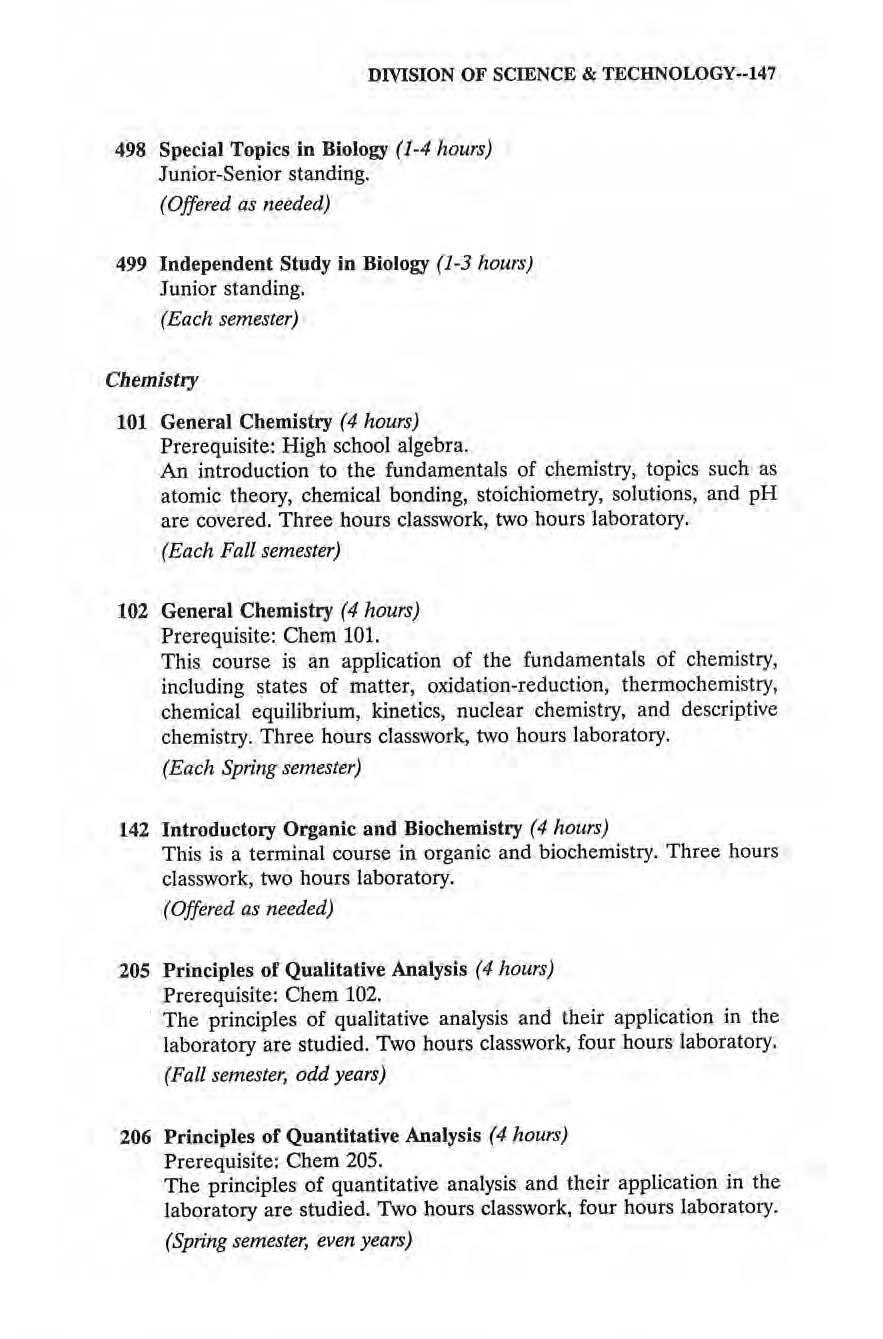
This is a terminal course in organic and biochemistry. Three hams classwork, two hours laboratory.
(Offered as needed)
205 Prin ciples of Qualitative Analysis (4 hours)
Prerequisite: Chem 102.
The principles of qualitative analysis and their application in the laboratory are studied. Two hours classwork, four hours laboratory.
(Fall semester, odd years)
206 Principles of Quantitative Analysis (4 hours)
Prerequisite: Chem 205.
The principles of quantitative analysis and their application in the laboratory are studied. Two hours classwork, four hours laboratory.
(Spring semester, even years)
DMSION OF SCIBNCE & TECHNOLOGY --147
298 Special Topics in Chemistry (1-4 hours)
Freshman-Sophomore standing.
(Offered as needed)
3 03 Organic Chemistry (5 hours)
Prerequisite: Chem 102. This course introduces the chemistry of aliphatic and aromatic compounds with the mechanisms and stereochemistry. Three hours classwork, four hours laboratory.
(Fall semester, even years)
304 Organic Chemistry (5 hours)
Prerequisite: Chem 303.
Thi s course is a contin uation of Chem 303 with emphasis on the chemistry and detection of functional groups. Th e laboratory emphasis is on methods of qualitative organic analysis. Three hours classwork, four hours laboratory.
(Spring semester, odd years)
431 Biochemistry (4 hours)
Prerequisite: Chem 304.
The chemical foundations of molecular biology with an e mphasis on the molecular aspects of intermediary me tabolism are studied. Three hours classwork, two hours laboratory.
(Fall semester, odd years)
498 Special Topics in Chemistry (1-4 hours)
Junior-Senior standing.
(Offered as needed)
499 Independent Study in Chemistry (1-3 hours) Junior standing.
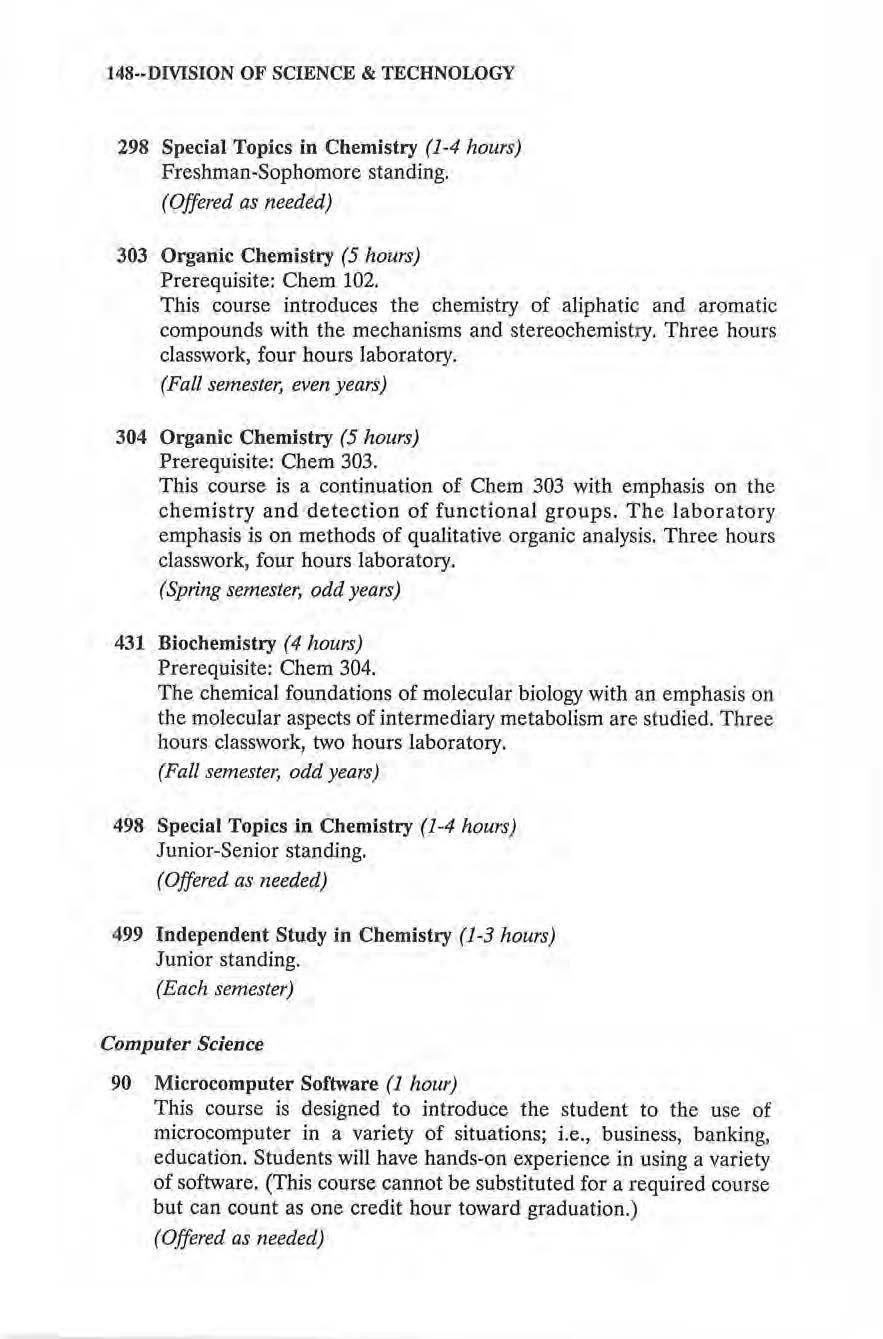
(Each semester)
Computer Science
90 Microcomputer Software (1 hour)
This course is designed to introduce the student to the use of microcomputer in a variety of situations; i.e., business, banking, education. Students will have hands-on experience in using a variety of software. (This course cannot be substituted for a required course but can count as one credit hour toward graduation.)
(Offered as needed)
148--DMSION OF SCIENCE & TECHNOLOGY
100 Introduction to Computer Applications (3 hours)
This course provides an ovexview of the history and evolution of computers and software. Issues such as the future of computers, their social impact, and the ethics of computer use are also considered. Students receive direct instruction and directed experience on an integrated software package that includes word processor, spreadsheet, and data file manager. 1\vo hour lecture, two hours laboratory.
(Each semester)
102 Introduction to Computer Concepts (3 hours)
This course is designed to develop a general knowledge about computers. This includes technical knowledge about hardware and software with regard to their operation and how they are used to solve problems. The course also includes an awareness of how computers affect society. Students will use software simulation projects that demonstrate the use of the computer to solve common problems,

(Each, semester)
103 BASIC Programming (3 hours)
The BASIC language and its application to problem solving in mathematics, science, and business. Microcomputer applications are emphasized, starting with simple operations and progressing into string manipulation, arrays, subroutines, graphics and file manipulation.
(Each semester)
203 COBOL Programming (3 hours)
Prerequisite: CSci 102 or permission. An introduction to ANS COBOL and its application to business computing. This course emphasizes structured analysis and design of programs illustrating business applications.
(Each semester)
204 Computer Programming I (3 hours)
This course provides an introduction to programming and algorithm development using Pascal with elements of program structure and subprogram usage. Problem solving techniques including stepwise refinement are applied to problems in mathematics and business with algorithms for searching, merging, and sorting introduced.
(Each semester)
OMSION OF SCIENCE & TECHNOWGY--149
206 Computer Programming Il (3 hours)
Prerequisite: CSci 204. This course introduces programming and algorithm development u sing the C Programming Language. The study of stepwise refinement and top-down programming, testing, and debugging is continued with a emphasis on string processing, inte rnal searching and sorting, and recursion. Data structures including s tacks, queues, deques, linked lists are also built and manipulated.
( Each semester)
208 Computer Systems (3 hours)
Prerequisite: CSci 203 or 204. The principles of operation and assembly programming of the DEC VAX systems are introduced. Topics to be studied include computer structure and machine language, addressing techniques, macros, program segmentation and linkage conventions, file input-output, assemblers, and interpreters.
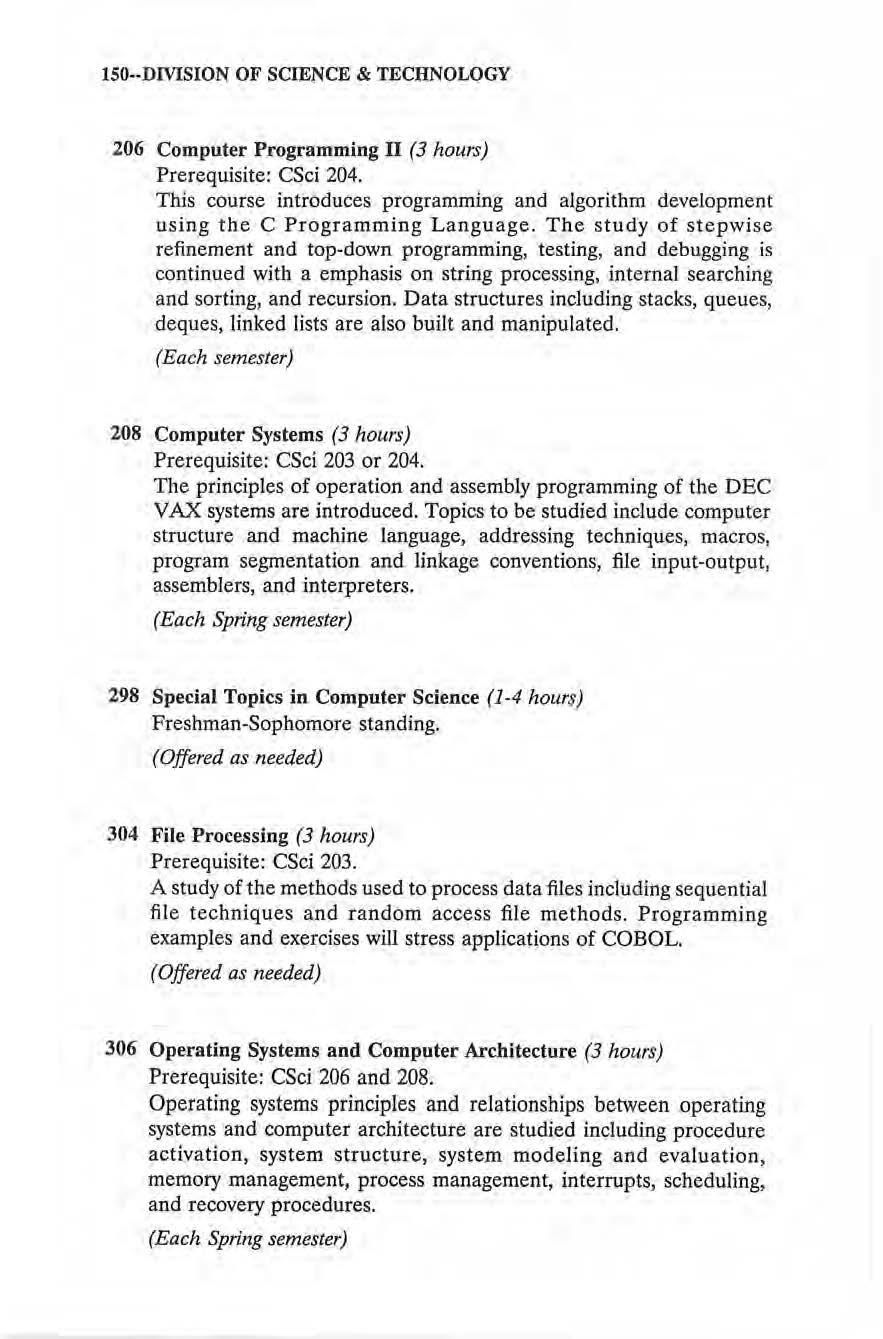
(Each Spring semester)
298 Special Topics in Computer Science (1-4 hour$) Freshman-Sophomore standing.
(Offered as needed)
304 File Processing (3 hours)
Prerequisite: CSci 203. A study of the methods used to process data files including sequential fil e t e chniques and random access file methods. Programming examples and exercises will stress applications of COBOL.
(Offered as needed)
306 Operating Systems and Computer Archltecture (3 hours)
Prerequisite: CSci 206 and 208. Operating systems principles and relationships between operating systems and computer architecture are studied including procedure activation, system structure, system modeling and evaluation , memory management, process management, interrupts, scheduling, and recovery procedures.
(Each Spring semester)
150--DMSION OF SCIENCE &
TECHNOLOGY
315 Computer Organization (3 hours)
Prerequisite: CSci 206.
The organization and structure of the hardware components of computers are covered with logic design , number representation and arithmetic, computer architecture, and interfacing emphasized. A detailed l aboratory study of a representative micro-processor system is a major portion of the course.
(Each Fall semester)
404 Data Structures and Analysis of Algorithms (3 hours)
Prerequisite: CSci 204.
Thi s course is a study of the internal representation and manipulation of data. The topics covered include stacks, queues, lists, tree, graphs and graph and tree algorithms, design and analysis of sorting, merging, and searching algorithms, memory allocation and deallocation, and database management systems.
(Offered as needed)
406 Organization of Programming Languages (3 hours)
P rerequisite: CSci 208.
A study of the structure and implementation of computer languages. The topics covered include language definition and structure, d ata types and structure, control structures, run time considerations, compilers and interpreters, lexical analysis, and parsing.
(Offered as needed)
408 Senior Project (4 hours)
Prerequisite: 15 hours of computer science (200 or above). The student will study the analysis, design, implementation, testing, and documentation of a complete system. This project is chosen in consultation with the instructor to apply skills and integ rate knowledge acquired in undergraduate studies.
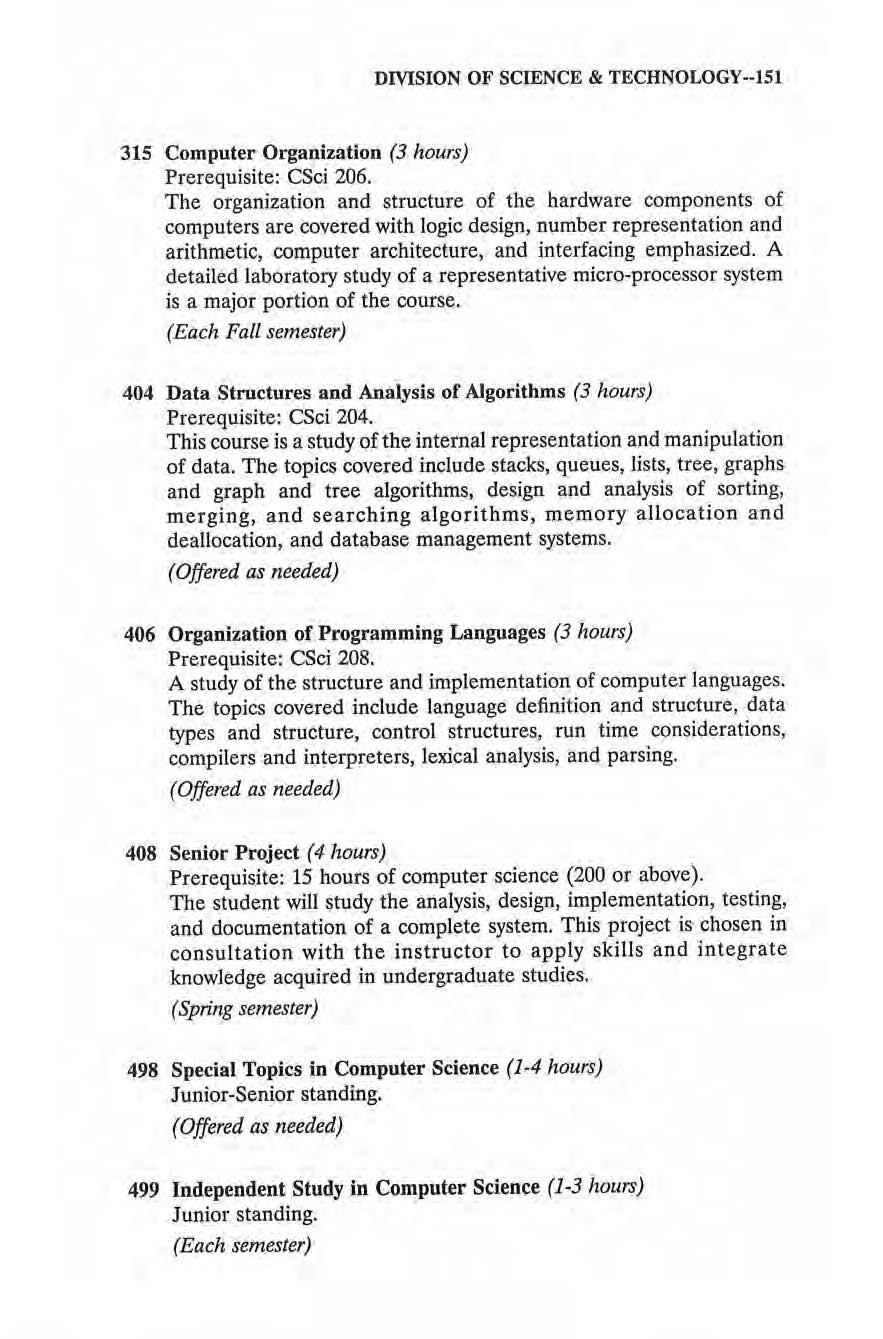
(Spring semester)
498 Special Topics in Computer Science (1-4 hours)
Junior-Senior standing.
(Offered as needed)
499 Ind.ependent Study in Computer Science (1 -3 hours)
Ju nior standing.
(Each semester)
DMSION OF SCIBNCE & TECHNOLOGY--151
Consumer Economics
322 Nutrition (3 hoitrs)
Fundamental principles of human nutrition , its development through research as related to the needs of individuals according to their age, sex, and occupation are studied.
(Each Fall semester)
General Science
100 Physics (4 hours)
This c-0urse is designed to acquaint the student with physics. The areas of energy, mechanics, heat, electricity, sound , and light are surveyed. Three hours classwork, ,two hours laboratory.
(Fall semester, even years)
130 HeaJth Careers Internship (3 hours)
Prerequisite: Prior approval of the Chairperson of the Natural Science D ivision to insure that appropriate arrangements have been made for the interµship.
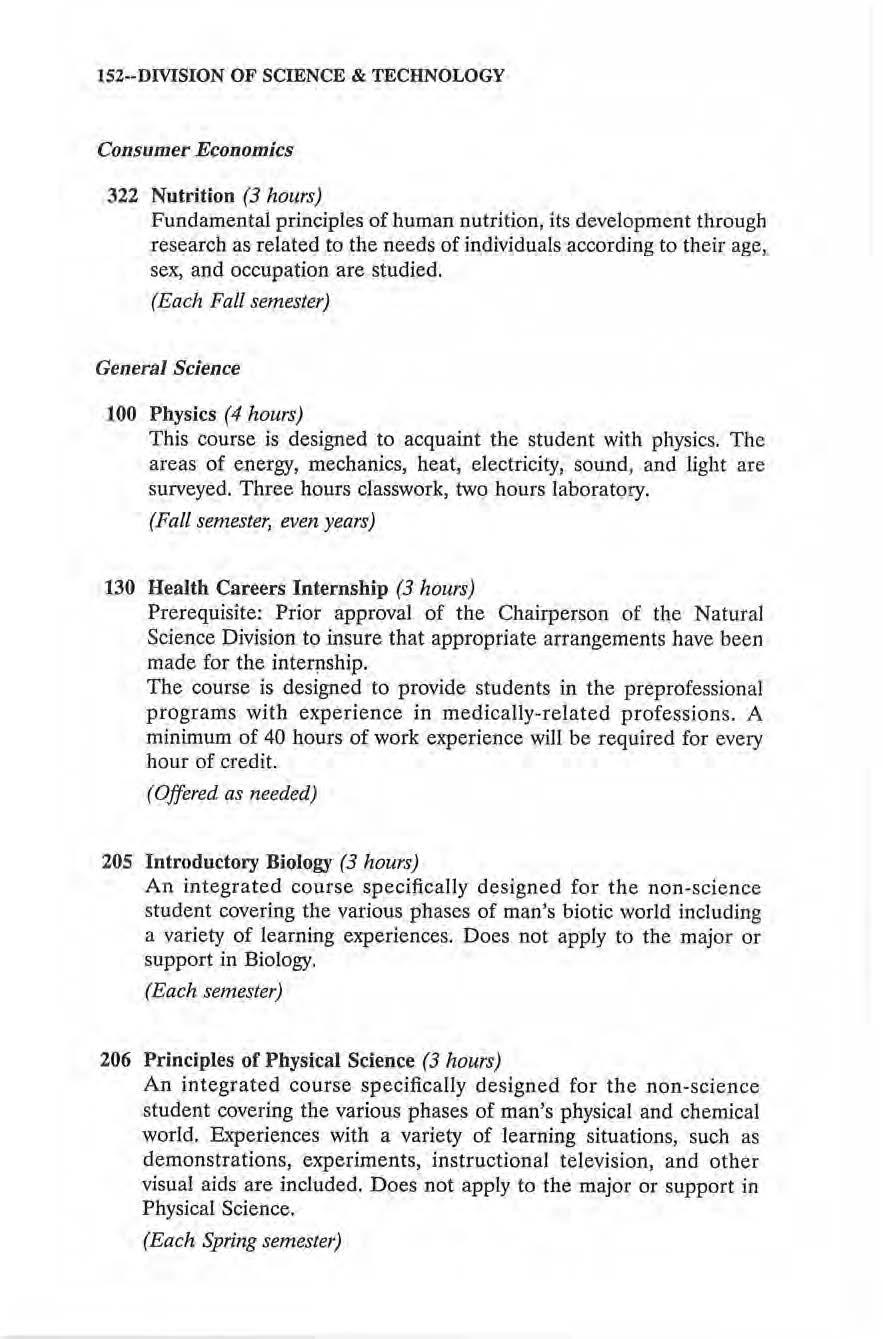
The course is designed to provide students in the preprofessional programs with experience in medically-related profession s. A minimum of 40 hours of work experience will be required for every hour of credit.
(Offered as needed)
205 Introductory Biology (3 hours)
An integrated course specifically designed for the non-science s tudent cove ring the various phases of man ' s biotic world including a variety of learning experiences. Does not apply to the major or support in Biology.
(Each semester)
206 Principles of Physical Science (3 hours)
An integrated course specifically designed for the non-science student covering the various phases of man's physical and chemical world. Experiences with a variety of learning situations, such as demonstrations, experiments, instructional television, and other visual aids are included. Does not apply to the major or support in Physical Science.
(Each Spring semester)
152--DIVISION OF SCIENCE & TECHNOLOGY
232 Energy (3 hours)
A study of energy resources with a focus on both nuclear and conventional power stations, design operation, cost, governmental regulations, safety, and environmental effects. Field trips to nuclear and conventional generation stations are required .
(Each Fall semester)
298 Specia l Topics in General Science (1-4 hours)
Freshman-Sophomore standing
(Offered as needed)
411 Cooperative Education Internship (1-12 hours)
This course is designed for any student majoring in any discipline listed with in the Division of Science and Technology and is to be taken near the end of the formal college course requirements. Students may enroll for 1-12 hours of credit upon approval of the Director of Cooperative Education and the Chairperson of the Science and Technology Division. The learning situation will be organized and supervised by the Directo r of Cooperative Education. A minimum of forty hours of work experience will be required for each hour of credit for which the student enrolls

(Each semester, summer)
476 Methods of Teaching Science (3 hours)
This course introduces the objectives, content and methods of classroom and laboratory teaching techniques.
(Fall semester, even years)
497 Aerospace Science (3 hours)
A workshop designed to provide an understanding of aerospace developments which are vitaJ to our social, economic, and political env ironm ent.
(Summer Session)
498 Special Topics in Gene ra l Science (1-4 hours)
Junior-Senior standing.
(Offered as needed)
499 Independent Study in General Science (1-3 hours) Junior standing.
(Each semester)
DMSION OF SCIENCE & TECHNOLOGY--153
Geology
201 Physical Geology (4 hours)
An introduction to the theories of the earth's origin and tl1e study of the earth's structure a n d materials with a special emphasis o n rock, minerals, and landforms. Three hours 1ecture, two hours faboratory.
(Offered as needed)
202 Rocks and Minerals (1-3 hours)
An introductory course to the study of the physical prop erties of rocks and minerals stressing -field work at mineral and rock lo calities in S.E. Nebraska.
(Offered as needed)
203 Introduction to Fossils (1 -3 hours)
Tnis is an introductory cou rse to the methods of interpreting the fossil record through actual field work at fossil locations in S.E. Nebraska.
(Offered as needed)
298 Special Topics in Geology (1-4 hours)
Freshman-Sophomore standing.
(Offered as needed)
301 Historical Geology (4 hours)
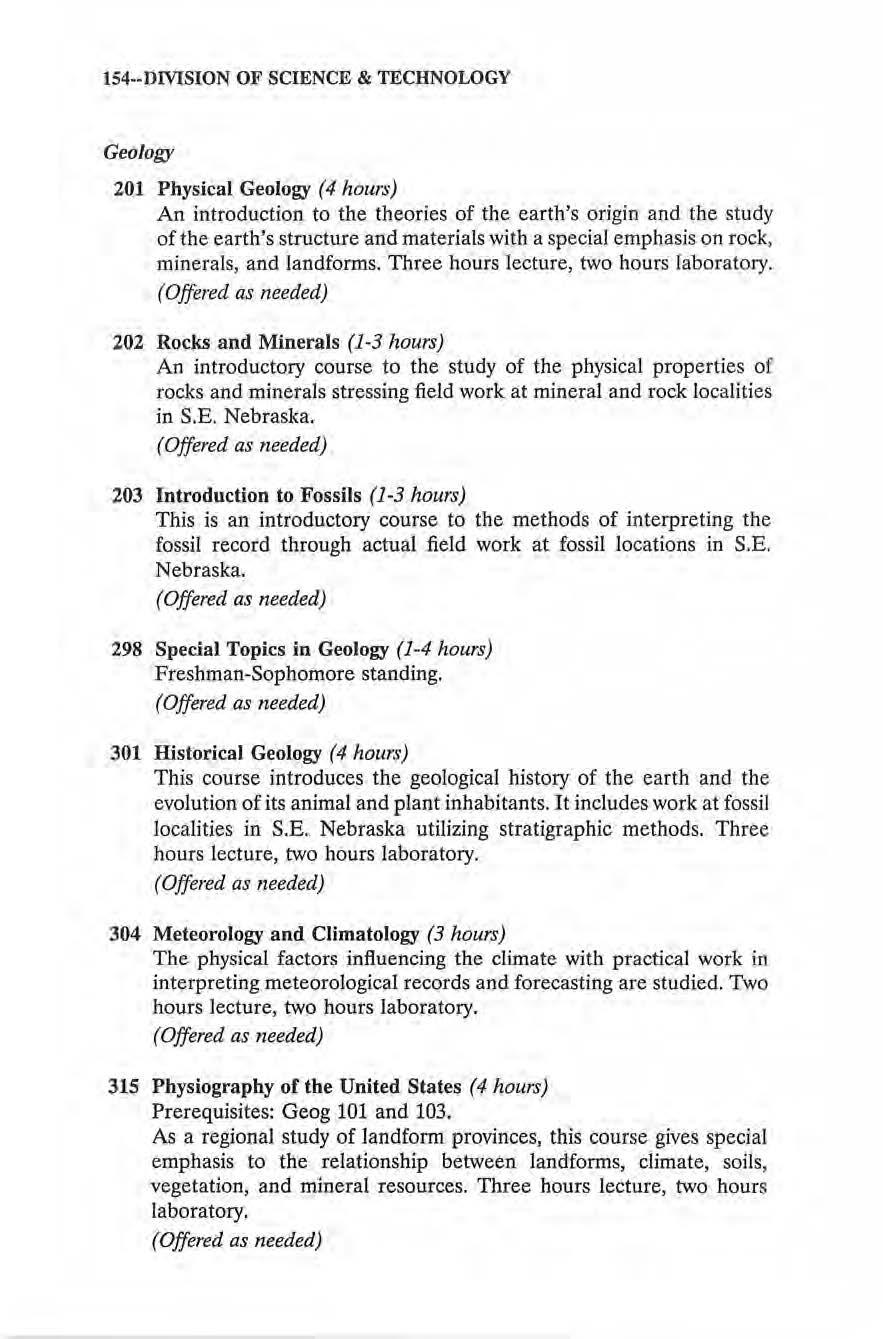
This course introduces the geological hlstory of the earth and the evolutio n of its anima l and plant inhabitants. It includes work at fossil localities in S.E. Nebraska utilizing stra tigraphic methods. T hree hours lecture, two hours laboratory.
(Offered as needed)
3 04 Meteo rology and C limatology (3 hours)
The physical facto r s influ encing the climate with practical work in interpreting meteorological records and forecasting are studied Two hours lecture, two hours laboratory.
(Offered as needed)
3 15 Physiography of the United States (4 hours)
Prerequisites: Geog 101 and 103.
As a regjonal study of Jandform provinces, this course gives special e mphasis to the relationship between landforms, climate, soils, vegetation, and mineral resources. Three hours lecture, two hours laboratory.
(Offered as needed)
154--DMSION OF SCIENCE & TECHNOLOGY
498 Special Topics in Geology (1-4 hours)
Ju nior-Senior standing.
(Offered as needed)
499 Independent Study in Geology (1-3 hours) Junior standing.
(Offered as needed)
Industrial Technology and Education
100 Introduction to lndustrial Technology (3 hours)
This course provides a broad-based, syste ms approach to the study of industrial technology. Emphasis will ht: un conceptualizing the base components and the inter-relationship of the communications, transportation , manufacturing and construction systems.
(Each Fall semester)
121 Technical Graphics (3 hours)
As a course concerned with the fundamentals of Technical Graphic communications, it includes the following areas of study and l ab experiences: graphic design, shape description, multiview projection, computer graphics and sectional views.
(Eac h Spring semester)
124 Construction Materials (3 hours)
T his course provides an introductory study of construction materials. Topics include the selection, application , and processing of those materials used in typical residenti a l and li ght commercial construction systems.
(Each Spring semester)
125 Graphic Communications (3 hours)
A course to study the theory and practice of graphic communications and related careers. The course will include basic study and practice in drafting, design, graphics arts, and photography. A series of inte rrelated activities will be completed to demonstrate the indu stria l practices utilized in each area.
(Each Fall semester)

DIVISION OF SCIENCE & TECHNOLOGY--155
L27 Power{I'ransportation Systems (3 hours)
This course is a basic study of the production control and transportation of mechanical, electrical, and fluidic power. It deals with the interrelationships of these three factors as they are integrated into the power/transportation systems of modern technology.
(Each Fall semester)
132 Material Processing I (3 hours)
This course provides an introduction to the study of separating, forming, and combining of industrial materials. Areas of study will include the processing technology associated with metals, composites, and synthetic materials.
(Each Spling semester)
222 Technical Graphics ll (3 hours)
Prerequisite: IIB 121.
The course is designed as a continuation of Technical Graphics I. It is concerned with technical drawing as they relate to industrial practices. It includes the following areas of study and lab experiences: auxiliary views, threads, oblique projection, gears and cams, design and working drawings, manufacturing processes, computer-aided design and reproduction and contro l of drawings.
(Each Spling semester)
226 Photography I (2-3 hmm)
This course studies the theory and practice in the basic fundamentals of photography including composition, exposure, lighting, developing, contact printing and enlarging. The third hour credit gained by additional assignments. Each student must have a camera.
(Each Fall semester)
233 Fundamentals of Electricity/Electron ics (3 lwurs)
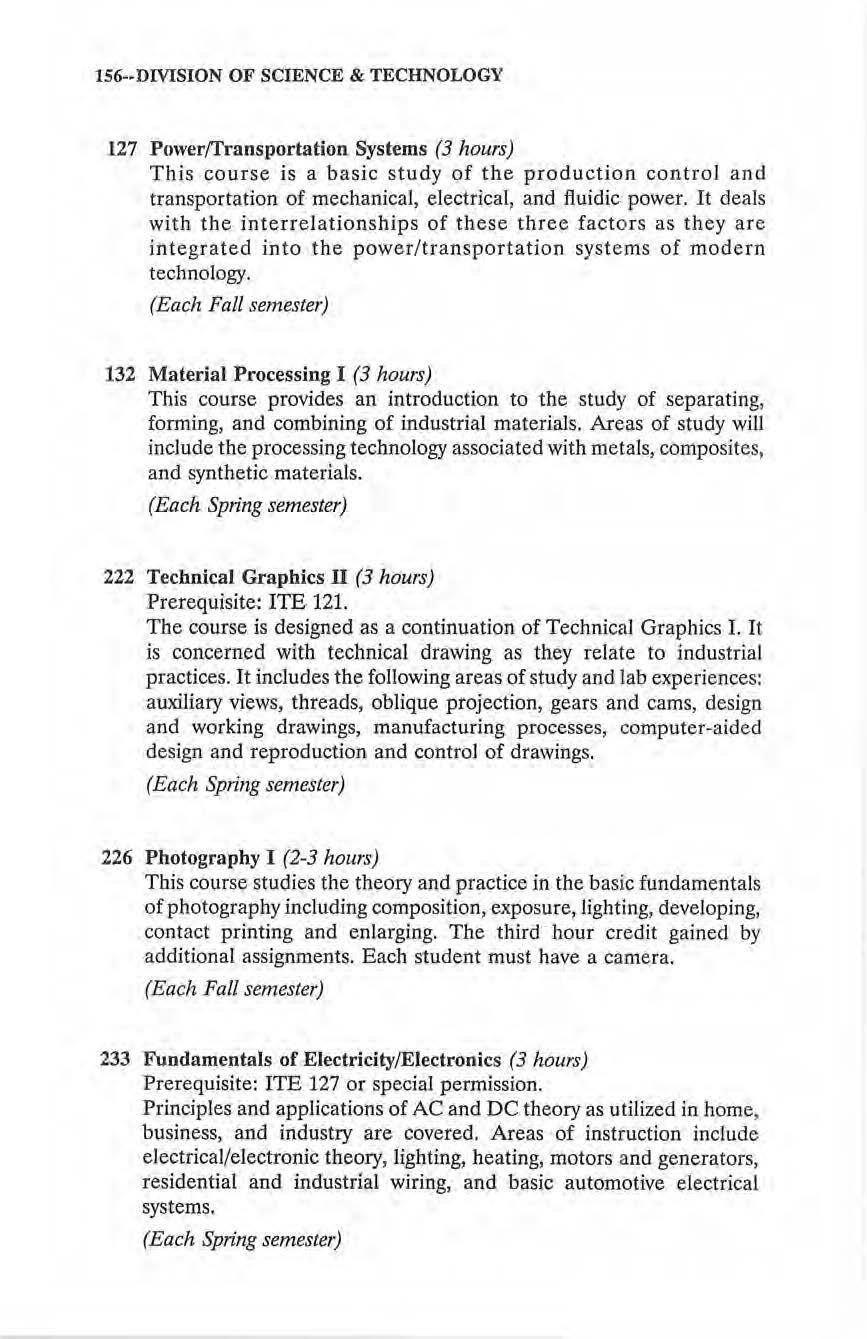
Prerequisite: ITE 127 or special permission.
Principles and applications of AC and DC theory as utilized in home, business, and industry are covered. Areas of instruction include electrical/electronic theory, lighting, heating, motors and generators, residential and industrial wiring, and basic automotive electrical systems.
(Each Spring semeste,)
1S6--DMSION OF SCIENCE & TECHNOLOGY
234 Manufactur ing Systems (3 hours)
Pre requisite: ITE 124.
This course is an introduction to manufa c turing systems and production techniques. Typical units of study include managem e nt , personnel, and production systems with emphasis on product desjgn, process engineering, line production, and product marketing.
(Each Spring semester)
2.39 Silk Screening Techniques (3 hours)
This course is a study of the basic theory, materials , and processes used in silk screen printing.
(Offered as needed)
240 Car Care (2 hours)
This course is designed to provide the student with a basic knowledge of purchasing, maintaining, insuring, and operating the modern automobile. Consumer information is stressed together with basic knowledge of automotive lubrication, tune-up, and diagnosis. This course does not apply on the Industrial Technology a nd Education major.
(Offered as needed)
298 Special Topics in Industrial Technology and Education (1-4 h o urs ) Fr eshman-Sophomore standing.
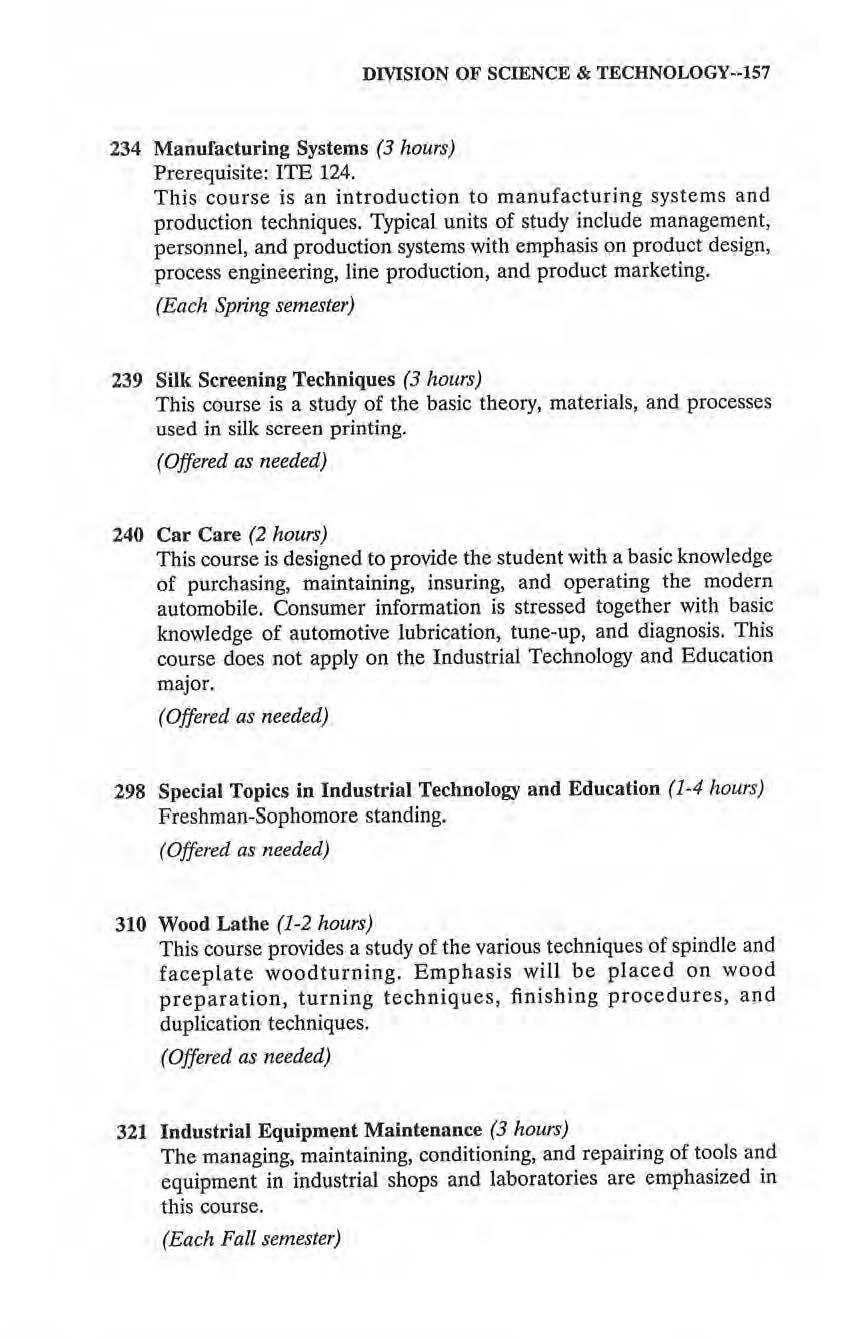
(Offered as needed)
310 Wood Lathe (1-2 hours)
This course provides a study of the various techniques of spindle and faceplate woodturning. Emphasis will be placed on wood preparation, turni'ng techniqu e s, finishing procedures, and duplication techniques.
(Offered as needed)
321 Industrial Equipment Maintenance (3 hours)
The managing, maintaining, conditioning, and repairing of tool s and equipment in industrial shops and laboratories are emphasized in this course.
(Ea ch Fall semester)
DIVISION OF SCIENCE & TECHNOLOGY - -157
322 Elementary Technology Education (3 hours)
This course is designed to develop s kill s and knowledge in working with ceramics, metals, plastics, wood and other craft materials , Instruction will include specifying and purchasing craft supplies and methods of incorporating these activities into school and community programs Recommended for e lementary school teachers, recreation majors, and for people interested in leisure time crnft activities.
(Each semester)
323 Material Processing II (3 hours)
Prerequisite: ITE 132.

Advanced techniques in manufacturing processes of machining and casting are covered. This course wi11 also includ e the study of chemical and physical properties of metals, composit e, and synt hetic materials.
(Each Fall semester)
324 Construction Systems (3 hours)
Prerequisite: ITE 124.
Thfa course will examine the management and production techniqu es associated with residential, comm ercial, and civil construction projects. The course is organized upon the Construction Specifications Index (C.S. I.) concept. Emphasis will be on site preparation, and on substructure and superstructure systems.
(Fall semester, even years)
325 Photogt"aphy II (2-3 hours)
Prerequisite: ITE 226.
A course designed to continue with the practices and techniques learned in Photography I. The subject matter will include such items as: types of cameras, lenses, films and developers as well as color slides and color prints.
(Offered as needed)
327 Electro -Mechanical Systems in Construction (3 hours)
This course will examine the design, selectio:n, and installation of electrical mechanical systems in residential and light commercial applications. Emphasis will be on electrical, plumbing, and heating, ve ntilating and air conditioning (HVAC) systems.
(Offered as needed)
158- -DMSION OF
&
SCIENCE
TECHNOLOGY
328 Analog Electronics (3 hours)
P re requisite: ITE 233 or special permission. As a study of the principles and applications of electronics in control and com munication equipment. In struction in the theory and ap plication of solid state and electronic devices in power supplies, amplifiers, oscillator, and various other circuits will be given

(Each Fall semester)
329 Desktop Publishing (3 hours)
Prerequis ites: CSci 100, Eng 201 and ability to type. This course is designed to study and utjlize the modern techniques of the computer scanner and laser printer to develop a publishing system. Emphasis will be placed on computer principles and functional appl i cations of desktop publishing. Business communications in the form of reports, forms and resumes will also be addressed.
(Offered as needed)
331 Industrial Welding Processes (3 hours)
This course is a study of separating and combinin g a variety of materials by modern welding procedures. Major laboratory activities will include gas metal arc welding, tungsten inert gas welding, shielded metal arc welding, oxyacetylene welding, as well as electric and gaseous cutting processes.
(Fall semester, odd years)
332 Transportation Technical Systems (3 hours)
This course is a study of the applications of electric, mechanical and fluid power as utilized in transportation systems. Units of study include hydraulics, pneumatics, internal combustion eng in es , alte rnative power sources.
(Spring semester, odd years)
333 Computer Aided Design/Computer Aided Manufacturing (3 hours)
The purpose of this course is to integrate the design process (CAD) with the manufacturing process (CAM). Emphasis will be p laced on CAD applications (AutoCad) and CNC operat ion and control.
(Spring semester, even years)
334 Automotive Systems and Maintenance (3 hours)
Student will acquire technical information in the fundamentals and economics operation of the modern automobile in this course.
(Each Fall semester)
DMSION OF SCIENCE & TECHNOLOGY--159
337 Driver Education and Traffic Safety I (3 hours)
Prerequisite: Twenty thousand miles or two years of driving experience free of repeated chargeable accidents and moving violations. This course will include presentation of materials a nd methods of traffic safety and driver training with emphasis upon attitude, skill development, organization and adminis tration, d r iving regulations and safe automotive operation.
(Summer Session, offered as n eeded)
338 Industrial Safety (3 hours)
Thi s course is designed to familiarize the student with safety management and accident prevention as related to industry. Emphasis will be placed in the following areas: Occupational, Personnel, Transportation, Waste Management, and Management of Safety Programs.
(Each Spring semester)
339 Computer Aided Design (2 hours)
Prerequisite: ITE 121.
Computer Aided Design is a course designed to introduce the student to the use of computers, digitizing pad and plotters in designing and drawing products in the industrial world. Projects will be encountered that will de al with: graphs and charts, architectural design and technical drawings.
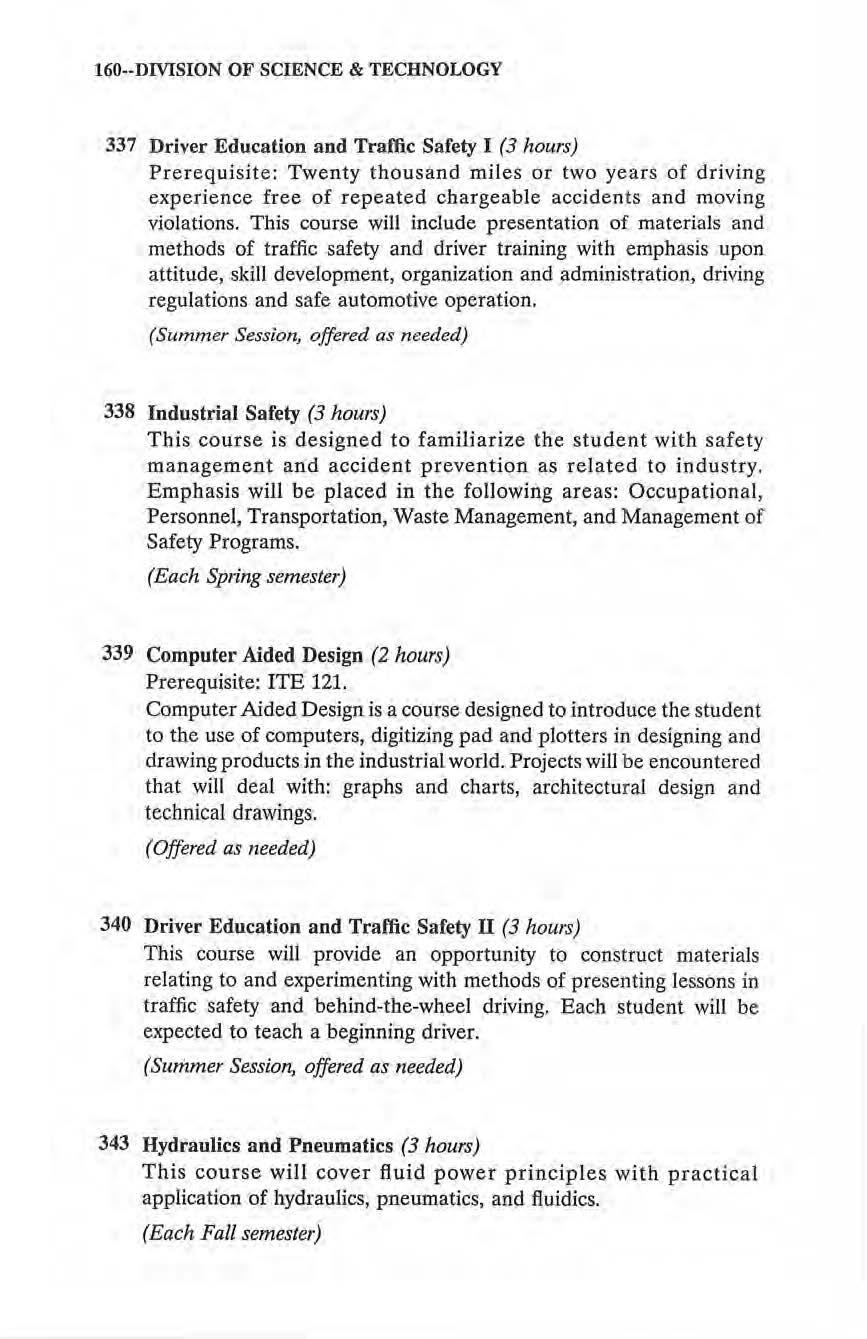
(Offered as needed)
340 Driver Education and Traffic Safety II (3 hours)
'!'his course will provide an opportunity to construct materials relating to and experimenting with methods of presenting lessons in traffic safety and behind-the-wheel driving. Eacb student will be expected to teach a beginning driver.
(Summer Session, offered as needed)
343 Hydraulics and Pneumatics (3 hours)
This course will cover fluid power principles with pract i cal application of hydraulics, pneumatics, and fluidics.
(Each Fall semester)
160--DlVISION OF SCIENCE & TECH
NOLOGY
350 Administration and Management of Industrial Materials and Equipment (3 hours)
This course is designed to acquaint the student with the procurement, disbursement, and use of industrial tools, machines, and materials. I t includes the planning and organizing of shops for efficient material handling and machine use.
(Each Fall semester)
355 Private Pilot Ground School (3 hours)
This course includes all items needed to pass the written examination required to receive a pilot's license. Course content includes basic aerodynamics, weather patterns, types of aircraft, history of flying, government regulation safety, navigation, and the duties and responsibilities of a private pilot.
(Offered as needed)
370 Robotic Applications (3 hours)
This course provides instruction in the fundamentals and management of robots in industry I t will introduce the student to the evolution, classification, safety, economics, sociological impact, and future capabilities of industrial robots, as well as developing a familiarization of present uses in a variety of industrial applications.
(Fa ll semester, even years)
380 Time and Motion Study (3 hours)
This course is the study and application of work measurement systems and the analysis of work for methods improvement by use of motion economy, process charting, flow diagramming , operator training and suggestion systems.
(Offered as needed)
381 Quality Assurance (3 hours)
A course in the techniques and procedures of determining and maintaining the quality of industrial products, random sampling and other statistical procedures used in the manufacturing and service sector to determine if products meet specifications are covered. Also, product quality improvement by design and structural features is discovered.
(Offered as needed)

DMSJON OF SCIENCE & TECHNOWGY- -161
162--DMSION OF SCIENCE & TECHNOLOGY
400 Community Facilities (2 hours)
Basic r eview of water treatment and distribution system, wastewater collection and treatment, disposal systems, street and highway design , solid waste disposa l, and environmental standards.
(Offered as needed)
405 Study of Industries Workshop (3 hours)
Thi s course is designed to develop an awareness of technological advancements in a variety of contemporary industries. A broadbased overview of the organization and the taxonomy of American industry will be observed.
(Offered as needed)
410 Digital E l ectronics (3 hours)
Prerequ isite: ITE 328 or permission.
As a study of digital integrated circuits, topics, covered will include numbering systems, logic gates, flip flops, r egisters, clocks, and memories.
(Spring semester, even yea,:v)
415 Microprocessors (3 hours)
Prerequisite: ITE 410.
The fundamental concepts of microprocessors including softwar e, hardware, and interfa ce techniques are covered. Industri a l applications will also be examined.
(Spring semester, odd years)
425 Educational Methods in Industrial Technology (3 hours)

The course will emphasize history, philosophy, and trends of the industrial technology movement; the goals and objectives o f Industrial Technology Education in the secondary school; teaching methods and aids, laboratory di scipline, testing, grading, and safety in Industrial Technology Education classes; and an introduction to Industrial Technology clubs and their values in the total school program.
(Each Spring semester)
427 Construction Planning and Design (3 hours)
Prerequisite: 1TB 222.
The principles of planning a dwelling to fit modern needs are discussed. Drawings will include a plot plan, floor plan, four elevations, sections and details. Specifications will be determined by the student for the dwe lling.
(Spring semeste,; even years)
430 Industri al Management (3 hours)
The study of Industrial Management for industry. Topic areas will include cost estimating, production control, inventory control , forecasting, and scheduling.
(Fall semester, odd years)
440 Engine Tune-up and Electrical Systems (1 hour)
Prerequisite: ITE 334.
This course covers the utilization of diagnostic equipment and methods in testing and servicing electronic engine systems and fuel system components.
(Spring semester, even years)
441 Suspension and Brake Systems (1 hour)
:Prerequisite; 1TB 334.
This course includes c l assroom and laboratory activity in the diagnosis, service, and repair of steering and brake systems.
(Spring semester, even years)
442 Power Transmission Mechan is ms (1 hour)
Prerequisite: ITE 334.
This course includes classroom and laboratory activity in the diagnosis , service, and repair of transmissions and drive trains.
(Spring semester; even yea rs)
455/
555 Computer Aided Manufacturing in Education (3 hours)
Prerequisite: Junior or Senior ITE major. This course will address computer programming concepts for computer numerically controlled (C.N.C.) machines. Standard in dustr y G-codes and M-codes will be initialized . Introductory robotic programming and applications will be an integral part of the course.
(Offered as needed)
450/
550 Flexible Manufactm·ing Systems (3 hours)
Prerequisite: Junior or Senior ITE major. This course will address computer programming concepts for computer numerically controlled (C.N.C.) machines. Standard industry G-codes a nd M-codes will be utilized. Introductory robotic programming and applications will be an integral pa r t of the course.
(Offered as needed)

DMSION OF SCIENCE & TECHNOLOGY- -163
164--DMSION OF SCIENCE & TECHNOLOGY
480 Industrial Management Internship (6 hours)
Prerequisite: Junior or Senior ITE major with approval of the Science and Technology Chairperson. A student may enroll in six hours of credit for an approved work experience program. A minimum of 40 hours of work experience will be required for every hour of credit awarded. The learnin g experience is organized and supervised by staff from the Industrial Technology staff.
(Offered as needed)
498 Special Topics in Industrial Technology and Education (I-4 hours)
Prerequisite: Junior-Senior standing.
(Offered as needed)
499 Independent Study in Industrial Technology and Education (1-3 hours)

Prerequisite: Junior standing. Approval by department. For majors only.
(Each semester)
Mathematics
060 Surveying (I hour)
Prerequisite: Knowledge of Trigonometry. This course introduces fundamental theory and practice, use of the transit, U.S. Public Land Surveys, and field office work.
(Offered as needed)
080 Arithmetic (I hour, credit/no credit)
This course is designed to help students learn effective mathematics skills which can be used to promote academic success in college. Units to be covered include computations, concepts, word problems, and algebra and geometry. This course is a developmental requirement for students identified as needing mathematics improvement training. Students required to enroll in Math 080 Arithmetic must successfully complete the post-test with the necessary passing score before enrolling in the general studies mathematics elective. Students who do not earn the necessary passing score will be required to enroll in Math 081 Arithmetic.
(Each semester)
081 Arithmetic (1 hour, credit/no credit)
This course is a continuation of Math 080 Arithmetic; that is, this course is designed to help students learn effective mathematics skills which can be used to promote academic success in college. Units to be covered include computations, concepts, word problems, and algebra and geometry. This course is a developmental requirement for students identified as needing mathematics improvement training. Students required to enroll in Math 081 Arithm e tic must successfully complete the post-test with the necessary passing score befo re enrolling in the general studies mathematics elective. Students who do not earn the necessary passing score will be required to visit with the Vice President for Student Affairs to ruscuss independent course options that can be devised by the director of the Communications Skills Center to promote student success.
(Each semester)
101 Coll ege Algebra (4 hours)
Prerequisite: One year of high school a lgebra. This course is for students who specifically n eed algebra in certain pre-professiona l programs. It covers fundamental algebraic principles and processes and is not to be taken for credit by students who h ave completed Math 125.
(Offered as needed)
107 AJgebra/l'r igonometry (4 hours)
This course is a study of basic algebraic and trigonometric concepts with an emphasis on linear and quadratic equations and systems. Trigonometric concepts will be studied from the right triangle and the oblique triangle appro ach.
(Offered as needed)
110 Elements of Mathematics (3 hours)
This course is designed to give the non-mathematical student the opportunity to use basic operations, succeed in mathem a tical modeling and unders tand deductive and inductive reasoning. The general concep ts covered will include sets, logic, numeration systems, the numb er system (natural numbers through the real s), metri c system, equations, inequalities, problem solving, graphs, functions and geometry.
(Each semester)

DMSION OF SCIENCE & TECHNOLOGY--165
111 Elements of Statistics (2 hours)
This course is designed to give the non-mathematical stu dent an association with elementary probability and descriptive statistics. The course will give th e student the opportunity to use the basic operations, succeed in mathematical modeling, understand deductive reasoning and, most of all, become familiar with statistical procedures. The general concepts covered will include permutations, combinations, probability, frequency distributions, graphs, measures of central tendency and dispersion, use of the Normal Curve, and regression and cor relation.
(Each semester)
125 Precalculus Mathematics I (5 hours)
This course is intended for students who plan to pursue a college program requir ing a substantial amount of training in mathematics. The content of the course includes a r eview of a lgebra, including number systems, equations, inequa l ities and graphing, an introduction to the study of functions and their graphs , the study of algebraic, exponential and logarithmic functions, and an introduction to systems of equations and linear algebra.
(Each Fall semester)
126 Precalcu lus Mathematics II (5 hours)
Prerequisite: Math 125 .
This course is intended to continue the mathematic training of the student whose college program requires a substantial amount of training in mathematics. This course includes the study of trigonometric functions and analytic trigonometry, an introduction to analytic geometry and an introduction to the study of sequences and series.

(Each Spring semester)
209 Business Calcu lus (3 hours)
Prerequisite: Math 107 and 125 or equivalent. This course introduces the theory and application of differe ntiation and integration to business decisions. Does not apply toward the Mathematics major.
(Each Spring semester)
225 Calculus with Analytic Geometry I (5 hours)
Prerequisite: Math 125 and 126 or equivalent. This course includes the study of analytic geometry, functions, limits, continuity, velocity, differentiation, maxima and minima, highe r order derivatives, techniques of graphing, and related topics.
(Each Fall semester)
166--DMSION OF SCIENCE & TECHNOLOGY
226 Calculus with Analytic Geometry II (5 hours)
Prerequisite: Math 225 or equivalent. This course includes the study of the differentiation of logarithmic and exponential functions, antiderivatives and the de:finit e integral, integration, inverses and related topics .
(Each Spring semester)
298 Special Topics in Mathematics (1-4 hours)
Fresh man-Sophomore standing.
(Offered as needed)
304 Modern Geometry (3 hours)
Prerequisite: 10 hours of college Mathematics. This is a course designed primarily to prepare mathematics teachers for dealing with a modern high school mathematics program including the point set approach to geometry.
(Fall semester, even years)
306 Modern Algebra (3 hours)
Prerequisite: 10 hours of college Mathematics. This course is a study of the various algebraic systems arising in modem mathematical computations. It includes a study of sets, mapping and operations, relations, development of the real number system, integral domains and fields, polynomial domains, and the complex number field.
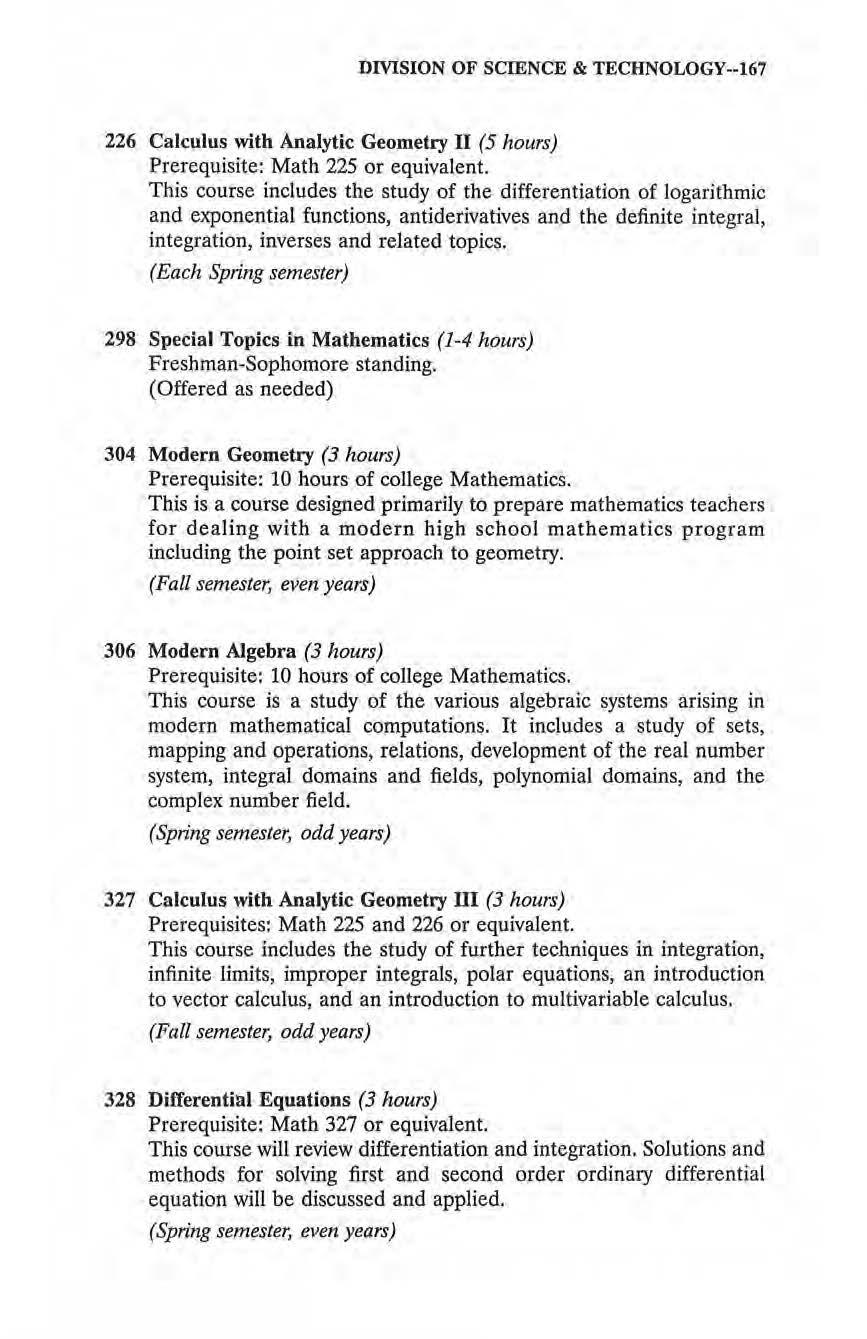
(Spring semester, odd years)
327 Calculus with Analytic Geometry m (3 hours)
Prerequisites: Math 225 and 226 or equivalent. This course includes the study of further techniques in integration, infinite limits, improper integrals, polar equations, an introduction to vector calculus, and an introduction to multivariable calculus.
(Fc~ll semester, odd years)
328 Ditferentin l Equat ions (3 hours)
Prere quisite: Math 327 or equivalent. This course will review differentiation and integration . Solutions and methods for solving first and second order ordinary diffe r enti al equation will be discussed and applied.
(Spn'ng semester, eve11 years)
DMSION OF SCIENCE & TECHNOLOGY-- 167
340 Statistics (3 hours)
A study of the methods of summarizing and interpreting data, e lementary probability, and its relation to distributions. Th e meanings, importance, and application of the normal and binomial distributions and the m eth ods of random sampling, testing of hypotheses, analysis of paired data, and interpretation of standardized test scores are covered.
(Each semester)
404 Mathematical Modeling (3 hours)
Prerequisite: 10 hours of Cbllege Mathematics. This course provides an introduction to topics in mod ern mathematics including graphs and networks, map coloring, finite differences, Pascal's triangle, the Pigeonhole Principle, Markov chains, linear programming, and game theory.
(Fall semester, even years)
418 Linear Algebra (3 hours)
The theory of linear transformation in vector spaces, the representation of linear spaces in matrices, linear functional, and the application of these concepts are covered.
(Fall semester, odd years)
419/
519 Topology (3 hours)
A modem treatment of topology with an emphasis on fundamental concepts and the principal results of homology theo1y, topological spaces, linear graphs, set theory, metric interpretations, and related topics.
(Spring semester, even years)
430/
530 Discrete Structures (3 hours)
Prerequisite: Math 126.
A study of some of the mathematical concepts useful to the computer sciences including number systems, logic, truth tables, sets and relations , boolean algebra, logic circuits , vectors, matrices, determinants, graphs, directed graphs, finite machines, and automata.
(Offered as needed)

168--DMSION OF SCIENCE & TECHNOLOGY
440/
540 Advanced Statistics (3 hours)
Prerequisite: Math 340.
This course continues the study of methods of summarizing and interpreting data, with special emphasis on non-normally distributed statistics, hypotheses testing, multivariate analysis and non-linear analysis of data.
(Spring semester, odd years)
476 Methods of Teaching Mathematics (3 hours)

This course introduces the objectives, content and methods of classroom teaching in mathematics.
(Fall semester, even years)
498 Special Topics in Mathematics (1-4 hours)
Junior-Senior standing.
(Offered as needed)
499 Independent Study in Mathematics (1-3 hours) Junior standing.
(Each semester)
Phys ics
201 General Physics (4 hours)
The topics of mechanics, sound , and heat are included in thi s mathematically-based physics course. Three hours classwork , two hours laboratory.
{Fall semester, odd years)
202 General Physics (4 hours)
Prerequisite: Physics 201 or permission. The topics of light, electricity, and magnetism are included in this mathematically-based physics class, Three hout s classwork, two hours laboratory.
{Spring semester, even years)
206 Great Ideas in Astronomy (3 hours)
This course in an introduction to astronomy, with emphasis on those ideas and discoveries which have had, and continue to have, s trong influence on our modern culture and world view.
(Offered as needed)
DMSION OF SCIENCE & TECHNOLOGY--169
211 General Physics (Calculus) (4 hours)
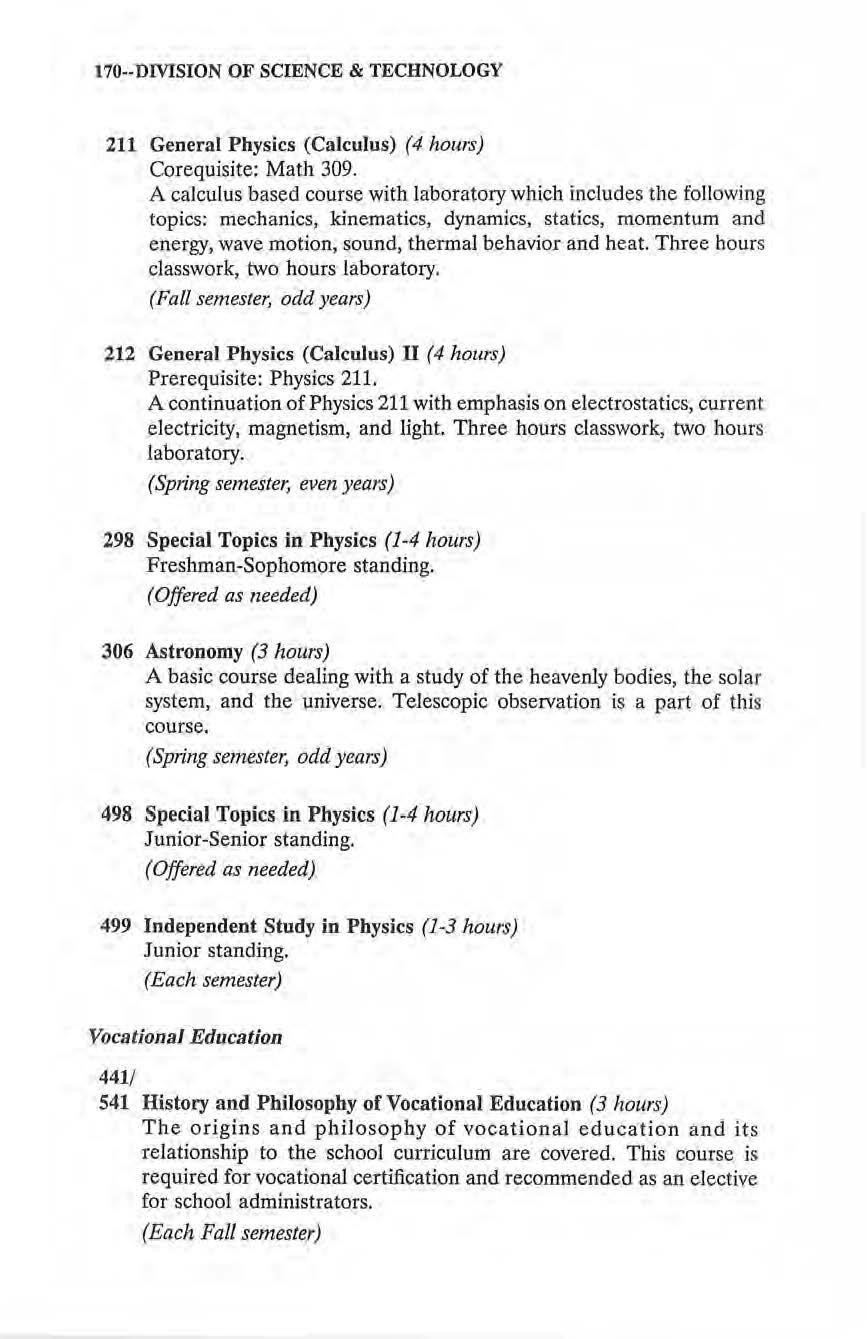
Corequisite: Math 309.
A calculus based course with laboratory which includes the following topics: mechanics, kinematics, dynamics, statics, momentum and energy, wave motion, sound, thermal behavior and heat. Three hours classwork, two hours laboratory.
(Fall semester, odd years)
:212 General Physics (Calculus) ll (4 hours)
Prerequisite: Physics 211.
A continuation of Physics 211 with emphasis on electrostatics, current e lectricity, magnetism , and light. Three hours classwork, two hours laboratory.
(Spring semester, even years)
298 Special Topics in Physics (1-4 hours)
Freshman-Sophomore standing.
(Offered as needed)
306 Astronomy (3 hours)
A basic course dealing with a study of the heavenly bodies, the solar system, and the universe. Telescopic observation is a part of this course.
(Spring semester, odd years)
498 Special Topics in Physics (1-4 hours) Junior-Senior standing.
(Offered as needed)
499 Independent Study in Physics (1-3 hours) Junior stand ing.
(Each semester)
Vocational Education
441/
541 History and Philosophy of Vocational Education (3 hours)
The origins and philosophy of vocational ed u cat ion and its relationship to the school curriculum are covered. This course is required for vocational certification and recommended as an elective for school administrators.
(Each Fall semester)
170--DMSION OF SCIENCE & TECHNOLOGY
442/ 542 Organization and Administration of Vocational Ed ucation (3 hours)
This course provides a study of the principles and policies governing the administration of vocational educationa l programs in high schools, technical schools, junior co ll eges, and adult education programs.
(Sp,ing semester, even years)
443/
543 Coordination Techniques in Vocational Education Programs (3 hours)
This course analyzes Vocational Cooperative Programs and their relationship to the high school, junior college, and adult vocational programs The emphasis is on the organization and supervision of cooperative programs, duties and responsibiliti es of the coordinator, selection and placement of students, and evaluation of st uden ts, training stations and the cooperative program.
(Spring semester, odd years)
444 Industrial Internship (1-3 hours)
This internship provides a work experience for students preparing to teach in a vocational program. The work experience includes an acceptable type of wage-earning emp loyment in a business, manufacturing p lant or processing industry approved by a qualified teacher coordinator.
(Summer sessions)
445/
545 Vocational Special Needs (3 hours)
This course is designed to help future teachers determine the needs, modify the curriculum, and carry out instructional plans for disadvantaged and handicapped students. Emphasis will be placed on changing teacher's attitudes towards specia l students and the need for vocationa l and practical arts teacher involvement in the Individualized Educational Prog ram development. I nformation concerning funding, teacher certification, etc. will be an integral part of this course.
(Offered as needed)

DMSION OF SCIENCE & TECHNOLOGY--17 1
HONORS PROGRAM
The purpose of the Honors Program is to challenge academically gifted students with new ideas and perspectives. An Honors course should be the beginning of a student's lifetime interest in the serious and difficult issues of our day. Honors courses are usually interdisciplinary in approach. Since class size is limited and student eligibility requ ires higher than average academic qualifications, Honors classes typically are challenging, innovative, and interesting.
Honors courses are designed to stimulate an inquiry model of learning through a seminar structure. The Honors Program is an opportunity for personal growth and an inspiration for a lifetime of intellectual curiosity. Honors Program students may attend special cultural or schol astic events throughout the academic year as well as interact with visiting scholars on the Peru State College campus.
To complete the Honors Program, students need at least 15 hours of Honors classes. 1\vo of these courses are required: HP 101 - Twentieth Century Issues- Literary Styles (meets the General Studies Literature requirement) and HP 400 - Ethics and Social J ustice-Capstone course (meets the General Studies Western Studies requirement). Four additional Honors courses are offered on a regu lar basis; students must take at least three of these courses to fulfill the 15 credit hour requirement. All regularly scheduled Honors courses fulfill requirements of Peru State College's General Studies Program. I n addition to the two courses already described, the following four courses will be offered: (choose three)
1) HP 201 Making Sense: Art in the World (Satisfies the General Studies Aesthetics requirement.)
2) HP 204 Contemporary Asian Cultures (Satisfies the General Studies Non Western Studies or Human relations requirement, but not both.)
3) HP 205 Science and Society (Satisfies one of the General Studies Science course requirements.)
4) HP 212 Introduction to Non-Western Musics (Satisfies the General Studies Non-Western Studies requirement.) Students apply to the Honors Program through the Coordinator. Admission is based on the following criteria:
1) 24 ACT composite, or
2) A cumulative grade point average of 3.3 for at least 12 semester hours at Peru State College and a ranking in the top one-fourth of their high school graduating class, or
3) A cumulative grade point average of 3.3 for at least 12 semester hours at Peru State as a non-traditional student, or
4) Permission of the Honors Program Committee on written application for students with special abilities or achievements.

172- -HONORS PROGRAM
I~ they meet the eligibi lity requirements o f th e Honors Program, Presid ential, Board of Trustee, and Non-Resident Scholarship students are required to enroll in one Honors course during their first year at Peru State College. They then have the option to continue in or to drop the program.
All students wishing to continue in the program must finish eac h academic year with at least a 3.00 cumulative grade point average. To be considered Honors Program graduates, students must have maintained at least a 3.00 cumulative grade point average, and completed the 15 credit hour requirement.
Students who successfully complete the Honors Program are designated as Honors Program graduates. They are recognized at Commencement and on their permanent college records.
Course Descriptions
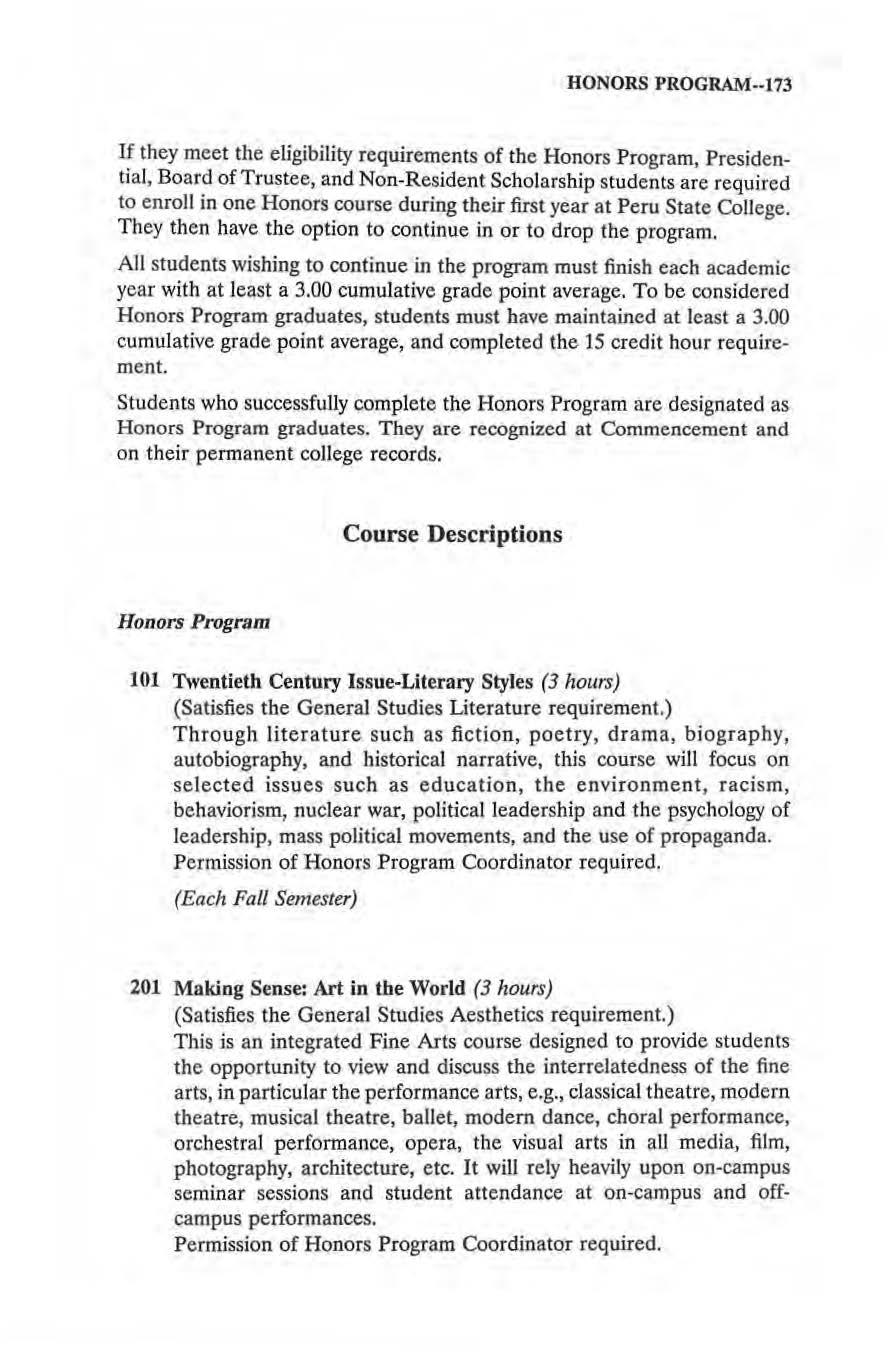
Honors Program
101 1\ventieth Century Issue-Literary Styles (3 hours)
(Satisfies the General Studies Literature requirement.)
Through literature such as fiction, poetry, drama, biography, autobiography, and historical narrative, this course will focus on selected issues such as education, the environment, racism, behaviorism, nuclear war, political leadership and the psychology of leadership, mass political movements, and the use of propaganda.
Permission of Honors Program Coordinator required.
(Each Fall Semester)
201 Making Sense: Art in the World (3 hours)
(Satisfies the General Studies Aesthetics requirement.)
This is an integrated Fine Arts cou rse designed to provide students the opportunity to view and discuss the interrelatedness of the fine arts, in particular th e performance arts, e.g., classical theatre, modern theatre, musical theatre, ballet, modem dance, choral performance, orchestral performance, opera, the visual arts in all media, film, photography, archi tecture, etc. It wiU rely heavily upon on-campus seminar sessions and student attendance at on-campus and offcampus performances.
Permission of Honors Program Coordinator required.
HONORS PROGRAM--173
204 Contemporary Asian C u ltures (3 hours)
(Satisfies the General Studies Non-Western Studies or Hum an Relations requirement, but not both.)
This course will introduce societies and cultures of the Far Eastern cou ntries with emphasis on Japan, Korea, and China. The course covers such topics as the group, relativism, education, business, religion, role of women, and psychological traits. In addition , students will look at the c urrent iss ues affecting the United States a nd Asian countries.
Permission of Honors Program Coordinator required.
205 Science a nd Society (3 hours)
(Satisfies one of the General Studies Science course requirements.) This course will focus on the scientific method, and the impact that science has on society and individuaJs. Topics to be considered will be the relationships of science, ethics, politics, moral issues, and societal goals. Students will read published articles, write about, and discuss the topi cs of this class. The course topics will be considered in light of a single discipline within science, evo luti onary biology. Permission of the Honors Program Coordinator required.
212 Introd uc tion to Non-Western M u sics (3 hours)
(Satisfies the General Studies Non-Western Studies requirement.) This course is an introduction to ethnomusicology in which the student will learn to experience and understand music in the context of human life. Students will experience and analyze th e musics of Africa, Native America, Black America, Asia, the Near East , the Pacific, and Eastern Europe. Thi s course will also provide th e student the tools with which to discover the meanings of music in the life of any society.

Permission of the Honors Program Coordinator required. (Each Fall semester)
400 Eth nics and Social J u s tice (3 hours)
(Satisfies the Gen eral Studies Western Studies requirem ent.)
This course examines contrasting conceptions of social justice and the idea society as these appear in some of the major thinkers in the tradition of Western ethica l philosophy.
Permission of the Honors Program Coordinator required.
(Each Spring semester)
174--HONORS PROGRAM
ACADEMIC REGULATIONS, POLICIBS, AND PROCEDURES
Admission to the College
Admission to Peru State College is granted to students who have graduated from accredited Nebraska high schools and who have not previously attended college, qr out-of-state students who meet the College's admissions standards.
Admission of Tra nsfer Students
Peru State College accepts transfer students from other accredited colleges and universities. After the student has been admitted, an official evaluation (Progress Sheet) is completed which identifies the applicability of previous work to the student's expressed major and degree program .
m<lAimum of 66 semester credit hours from a vocational/technical/com~ unity college may be applied toward a degree from Peru State.
Transfer students who already have a significant amount of credit toward their major will have tbeir transcripts reviewed by the approptiate Division Chairperson, in consultation with the Vice President for Academic Affairs, to determine if a possible 6-15 credit hours of designated coursework in the major is required.
Students who seek admission and are accepted while on probation from their last college are placed on probation for one semester and are subject to all the policies of probation at the College.
01c 0, tudents who have been suspended from another co llege will not be cont 1 sidered for admission until the period of suspension has expired and tbe ) / l"V Liacts of the dismissal are provided. .,
Students who discontinue their attendance at Peru State ; ing a se ~ and then attend another college or university before seeking readmission
assified as trans£~""'"'" · ---------------
Transfer students who have previously attended Peru State are classified as transfer students and not readmitted students.
Admission of Non-High School Graduates
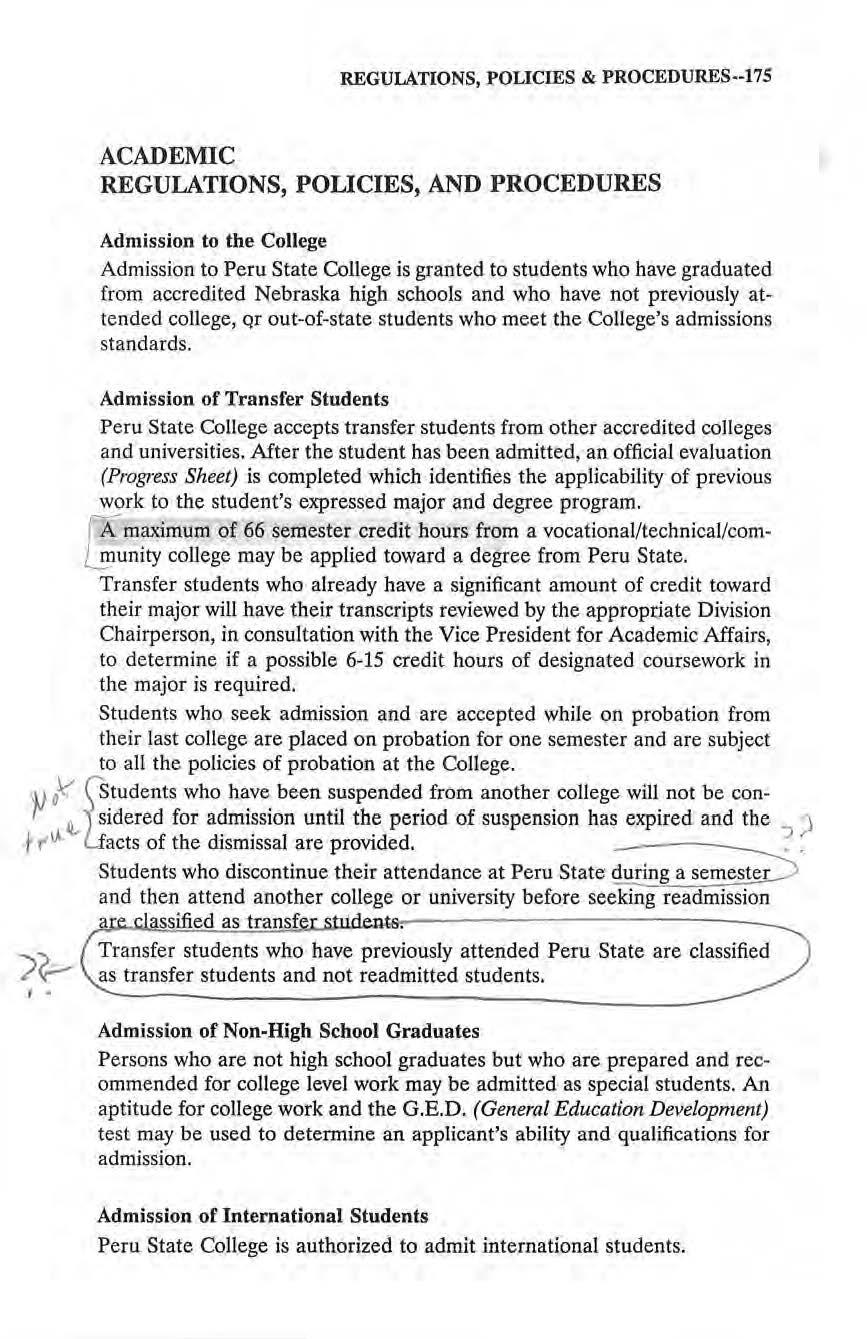
Persons who are not high school graduates but who are prepared and recommended for college level work may be admitted as special students. An aptitude for college work and the G.E.D. (General Education Development) test may be used to determine an applicant's ability and qualifications for admission.
Admission of International Students
Pem State College is authorized to admit international students.
REGUIATIONS, :t>OLICms & PROCEDURES--175
..,,.A
'tJ
I •
POLICIES & PROCEDURES
Admission from Non-Accred ited Co lleges
Students who seek admission to Peru State from non-accredited colleges must meet all the requirements of a first time student. Each application must be accompanied by an official transcript of all previous col lege work, The c redits earned at non-accredited institutions will be accepted provisionaUy and val idated upon the satisfactory completion of 30 semester credit hours at Peru State. Satisfactory completion is defined as a cumulative grade point average of 2. 00 or higher.
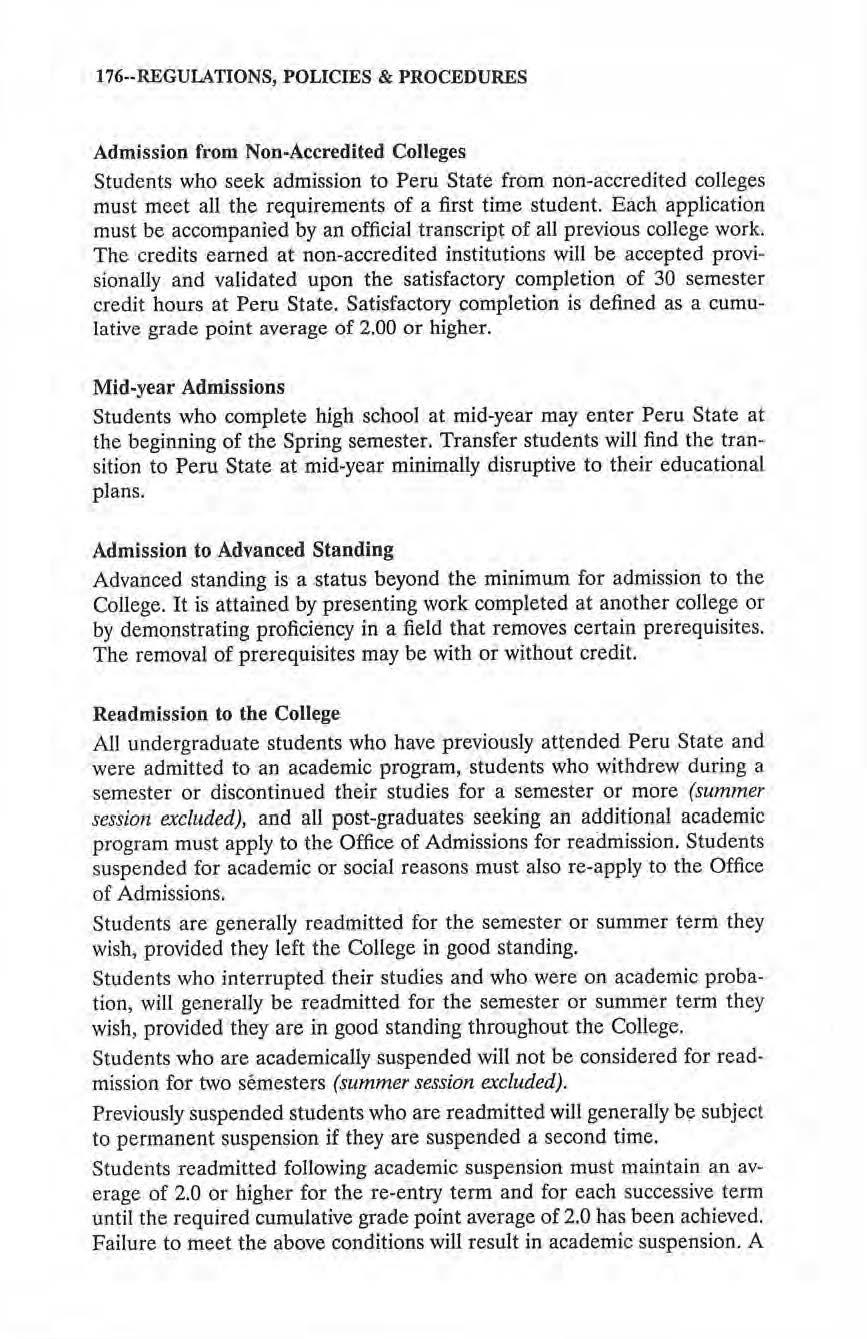
Mid-year Admissions
Students who complete high school at mid-year may enter Peru State at the beginning of the Spring semester. Transfer students will find the trans ition to Peru State at mid-year minimally disruptive to their educational plans.
Admission to Advanced Standing
Advanced standing is a status beyond the minimum for admission to the College. It is attained by presenting work completed at another college or by demonstrating proficiency in a field that removes certain prerequisites. The removal of prerequisites may be with or without credit.
Readm ission to the Co llege
All undergraduate students who have previously attended Peru State a nd were admitted to an academic program, students who withdrew during a semest e r or discontinued their studies for a semester or more (s ummer session excluded), and all post-graduates seeking an additional academic program must apply to the Office of Admissions for readmission. Students sus pe nded for academic or social reasons must also re-apply to the Office of Admissions.
Students are generally r eadmit ted for the semester or summer term they wish, provided they left the College in good standing.
Students who interrupted their studies and who were on academic probation, will generally be readmitted for the semester or summer term they wish , provided they are in good standing throughout the College.
Students who are academically suspended will not be considered for readmission for two semesters (summer session excluded).
Previously suspended students who are readmitted will generally be subject to permanent suspension if they are suspended a second time.
Students readmitted following academic suspension must maintain an average of 2 0 or higher for the re-entry term and for each successive term until the required cumulative grade point average of 2.0 has been achieved. Failure to meet the above conditions will result in aca demic suspension . A
176--REGULATIONS,
student who has been suspended twice is generally not considered for readmission.
Transfer students who have been previo usly suspe nded ar e subject to the same policies as readmitted students.
Readmitted students may continue with their previous academic program as outlined in the catalog current when they were first admitted, provided they meet the provisions of the normal progress policy. Some additional requirements may be expected because of changes within programs. I n addition, readmitted students should not expect to continue in a program that has been or is be ing phased out of the curriculum.
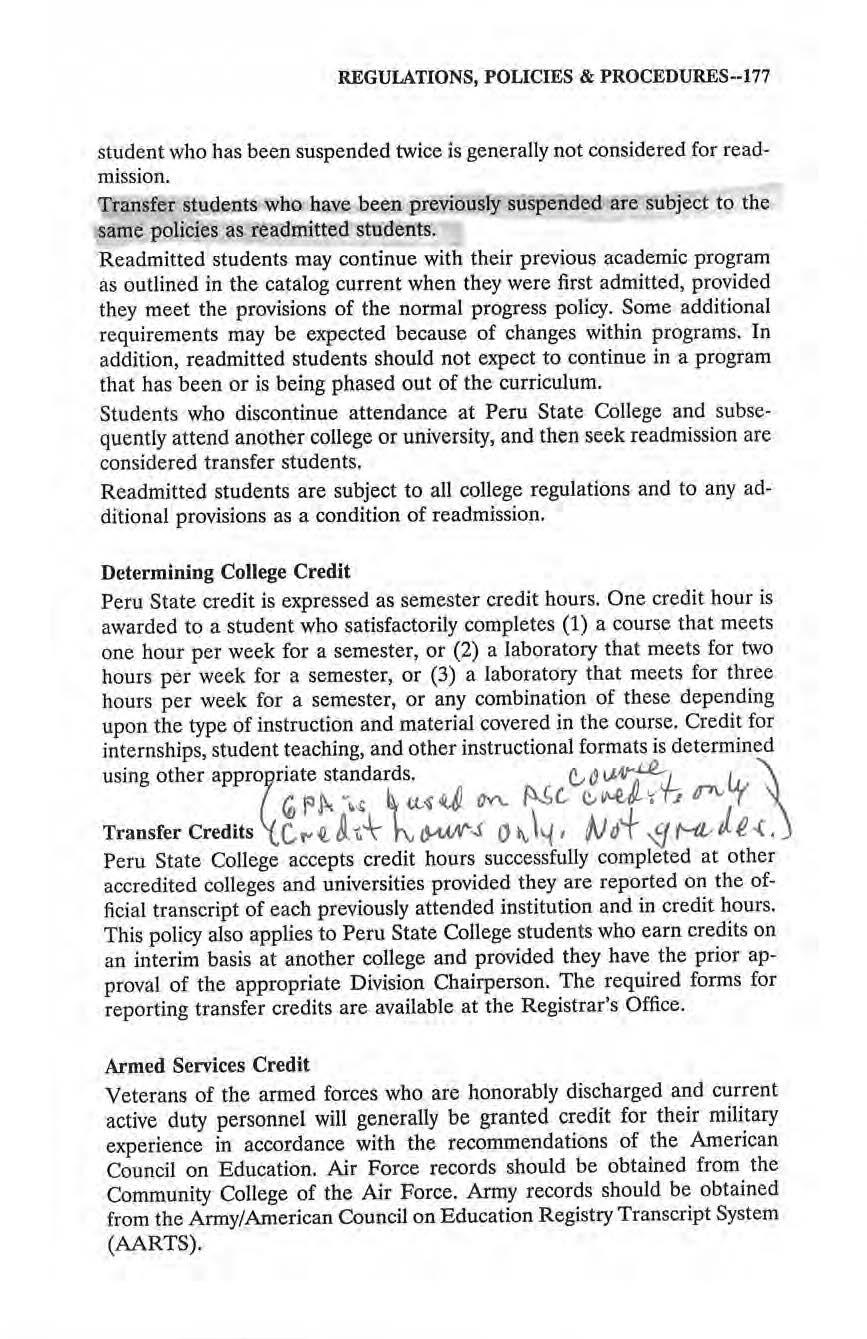
Students who discontinue attendance at Peru State College and s ubsequently attend another college or university, and then seek readmission are considered transfer students.
R eadmitted s tudents are subject to all coll ege regulations and to any additional provisions as a condition of readmission .
Determining Co ll ege Credit
Peru State credit is expressed as semester credit hours. One credit hour is awarde d to a student who satisfactorily completes (1) a course that meets one hour per week for a semester, or (2) a laboratory that meets for two hours p e r week for a semester, or (3) a laboratory that meets for three hours per week for a semester, or any combination of these depending upon the type of instruction and material covered in the course. Credit for internships, student teaching, and other instructional formats is determined using other appro~ riate standards.
C.,JtJ.~/ Ii , ~
' FJ\ v~-S U.,~ (]'A- ~l, C, '; (J "'T Transfer Credits cf" t ! i+ ~..s O \"{ , iJ tf- '(/ t-(1.,, J€ {. Peru State College accepts credit hours successfully completed at other accredited colleges and universities provided they are reported on the official transcript of each previous ly attended institution and in credit hours. This policy also applies to Peru State College students who earn credits on an interim basis at another college and provided they have the prior approval of the appropriate Division Chairperson. The required forms for reporting transfer credits are available at the Registrar's Office.
Armed Services Credit
Veterans of the armed forces who are honorably discharged and current active duty personnel will generally be granted credit for th eir military experience in accordance with the recommendations of the American Council on Education. Air Force r ecords should b e obtained from the Community College of the Air Force. Army records should be obtained from the Army/American Council on Education Registry Transcript System (AARTS).
REGULATIONS, POLICIES & PROCEDURES--177
Extra-institutional Credit Students may earn college credit for experiences and accomplishments attained outside of the normal college setting. Credit may be granted through standardized examination programs or the credit recommendations of the Guide to the Evaluation of Educational Experiences in the Armed Services and The National Guide to Educational Credit for Training Programs. Th e College's general policy for awarding credit for extra-institutional leru-nin g is:
1. Only individuals who have not participated in scheduled coursework are eligible to receive extra-institutional credit.
2. Extra-institutional credits are considered transferred credits and are subject to the same policies as other transfer credits.
3. A maximum of 66 semester credit hours earned through extra-institutional validation may be applied to the 125 semester hour minimum required for a bachelor's degree, unless otherwise specified.
4. Credit examinations may be earned only once in a single subject. A similar subject test in another testing program will not earn additional credits.
Institutional Examinations Students, due to el-perience and/or personal improvement, may qualify for credit in lower division courses through the procedure of an interview and a written examin ation provjded the examination is made available by the respective academic divisions. The student must, through an interview, satisfy a faculty committee that he/she has had a formal or informal experience in which the course content may have been met before the student will be given a written comprehensive examination.

The amount of credit to be allowed, the course for which substitution, if any, is made, and the particular graduation requirements which may be satisfied, will be determined by the Chairperson of the division and will be s ubject to all general graduation requirements, The student must register for the course and pay the tuition charges before writing the examinations. The letter grade received is recorded °f the studenrs transcript. t:, r- 41,,ik ~ql.(.,r,{
lr t.~bdc.i.
~'\t11
~
t.,_,d,"<
r~~••
. '1"Vv #t ..c M-.J r «
Students may earn credit through several standardized examrnation programs. Credits earned from the CLEP subject exam only (College Level Examination Program ), DANTES (Defense Activity Nontraditional Education Support), PEP (Proficiency Examination Program), and Advanced Placement Program can satisfy certain Peru State degree requirements. Students should contact the Office of Cooperative Education and Career Services for specific information about the College's regulations and procedures for standardized examinations.
178--REGULATIONS,
POLICIES & PROCEDURES
+.. u~ /\~'t-
~\;,Cf-e~
+o
ai:t~1
iiiai1"oJ~ • .,
-1
~-,/J.}~ it,),~~
~,
Credit for High School Students
In high schools where Peru State has a formal early entry agreement, th e principal will decide wbich students are qualified to take college courses. High school students who have not completed their junior year and wish to enroll in a Peru State credit course must have the recommendation of their principal and the approval of the Col1ege's Vice Pre sident for Academic Affairs before enrolling.
Any high school student approved to register for a college credit course will have the appropriate information compiled on a college transcript.
Independen t Study
Independent study courses are available in nearly every subject area and are numbered 499. They require at least junior standing and are only for students who are capable of independent research, work, or study. An I ndependent Study is a carefully crafted learning activity with specific objectives and methods of evaluation developed in consultation with a faculty member. The following regulations apply to independent study courses:

1. No more than six hours of Independent Study may be counted toward a degree.
2. No more than three hours of I ndependent Study may be taken each semester. o~- .:; u. "'- ""%t" \.- e-r>"'-,
3. Independen t study courses should not be used to replace required courses. In hardship cases, the final decision will be made by the Division Chairperson of the course affected.
4. Regardless of the type of Independent Study, the student must meet with the instructor at least once a week.
S. The title and course outline for each Independent Study must be submitted to the Division Chairperson and·Vice President for Academic Affairs by the end of the second week of the semester. ff\f" ~,J..-1"\,e..,.., -ft.,...,..,
Cooperative Ed ucatio n
The Cooperative Education internship program provides students with the opportunity to gain valuab le work experience while earning academic credit in all majors. Employment occurs in positions which are relevant to a student's major or career inter ests. The program is primarily available to upper-class students, including off-campus and non-traditional st udents. A flexible registration schedule allows students to enroll at any t ime during a semester. To help facilitate a mutually beneficial work experience for the student, each placement is approved and monitored by the Cooperative Education staff.
REGULATIONS, POLICIES & PROCEDURES-- 179
180--REGULATIONS, POLICIES & PROCEDURES
Private Instruction
Private instruction is available in music. Music students receive private instruction without charge as part of their major. Other students pay the rate per session listed in the Expenses and Financial Aid section of the catalog.
Correspondence Courses
Peru State does not offer correspondence courses, but is a correspondence testing center. Inquiries about testing shoul d be directed to the Office of Continuing Education.
Variable Credit Courses
The credit hours to be earned and the coursework to be completed are determined at the time of registration. Students do not have the option of reducing or increasing credit hours or coursework after the free drop/add period at the beginning of the term.
Repeat Courses
Students may and are urged to repeat courses they have failed. The initial course title and F grade are not removed from the student's permanent record , but the repeat grade is used to determine the n ew grade point a verage . There may also be occasions when students repeat a course for review on an audit basis without a change of grade.
If students repeat a course they have passed, the higher grade is used to compute the grade point average It is the student's responsibility to notify the Computer operator of all repeat courses when registering fo r the co it~ es are paid for repeated courses but additional credit I ~, ours are not earned. ' 1t

Audit
Registration to audit a course implies no credit. The student pays the regular tuition and fee charges but is not required to write tests, examinations, and/or papers. No grade is given in audited courses nor can credit be given at a later date.
Incomplete Coursework
Incomplete coursework may be completed through the instructor to earn a passing grade. This must be done within the next semester whether the student is in attendance or not or the record will show an F. This policy does not apply to students who have filed an application for graduation.
t h..t.tt,,.~tett
e,. QU'r.f <., ,.; (.{-4 f """ .,,(Ju-< Y , _____ 11-2 , de~ f ~ .f fe,J-,
Classification of Students
Students are classified according to the number of semester cred it hours earned:
Freshman Sophomore Junior Senior
0 to 29 credits
30 to 59 credits
60 to 89 credits
90 and over
Post-graduate stude nts have earned a bachelor's degree or higher and are earning additional undergraduate credit. Non-degree students are qualified persons who are enrolled primarily to satisfy an occupational need or personal interest.
Academic Progress Sheet

An academic progress sheet guides and records a student's progress to graduation and is maintained by the Registrar and student. The progress sheets are normally issued during the second semester of attendance for freshman; transfer students' sheets are initiated as soon as possible following full admission to the College. -
Academic Load
Peru Campus Students
Students who are enrolled for 12 credit hours or more during a semester are considered full-time students. However, the normal course load for a student who expects to complete a bachelor's degree within eight semesters (4 years) is 15-16 hours. The maximum load without special permission is 17 hours; more than 17 hours requires the approval of the Chairperson of the division in which the student is majoring. The Registrar may approve 18 credit hours provided the student obtained a minimum 3.5 grade point average the previous semester. The maximum credit hour load is 21 and may not be exceeded. Class withdrawals subsequent to the add/drop p erio d are included in the credit hour load.
Veterans and other eligible persons attending Peru State under the benefits of Chapter 34 and 35, Title 38, U.S.C., as full-time students must be enrolled for at least 12 semester hours, or the equivalent.
REGULATIONS, POLICIES & PROCEDURES 181
Offutt Air Force Base and Southeast Community College Students
Courses at these sites are scheduled on an eight-week cycle. The academic load for an eight-week session is:
For each eight-week session when students are not registered for student teaching, they may register for a maxim.um of 12 semester credit hours with Peru State. The 12 hours include any independent study courses.
For the eight-week session when students are registered for student teaching, they may register for a maximum of 11 hours with Peru State. The 11 hours include any independent study courses.
Change in Registration
Students are responsible for the accuracy of each registration and are u ltimately responsible for meeting all degree requirements.
A change in registration is processed at the Registrar's Office. No full semester courses may be added after the published final date to add courses. When applicable, tuition charges will be refunded only during the official add/drop period.
Change in Maj or
Students who elect to change majors after their sophomore year should be aware that their graduation may be delayed. Also, if students change their major, they may have to follow the requirements in the current catalog rather than the one in effect at the time they were admitted to the College to pursue a degree program.
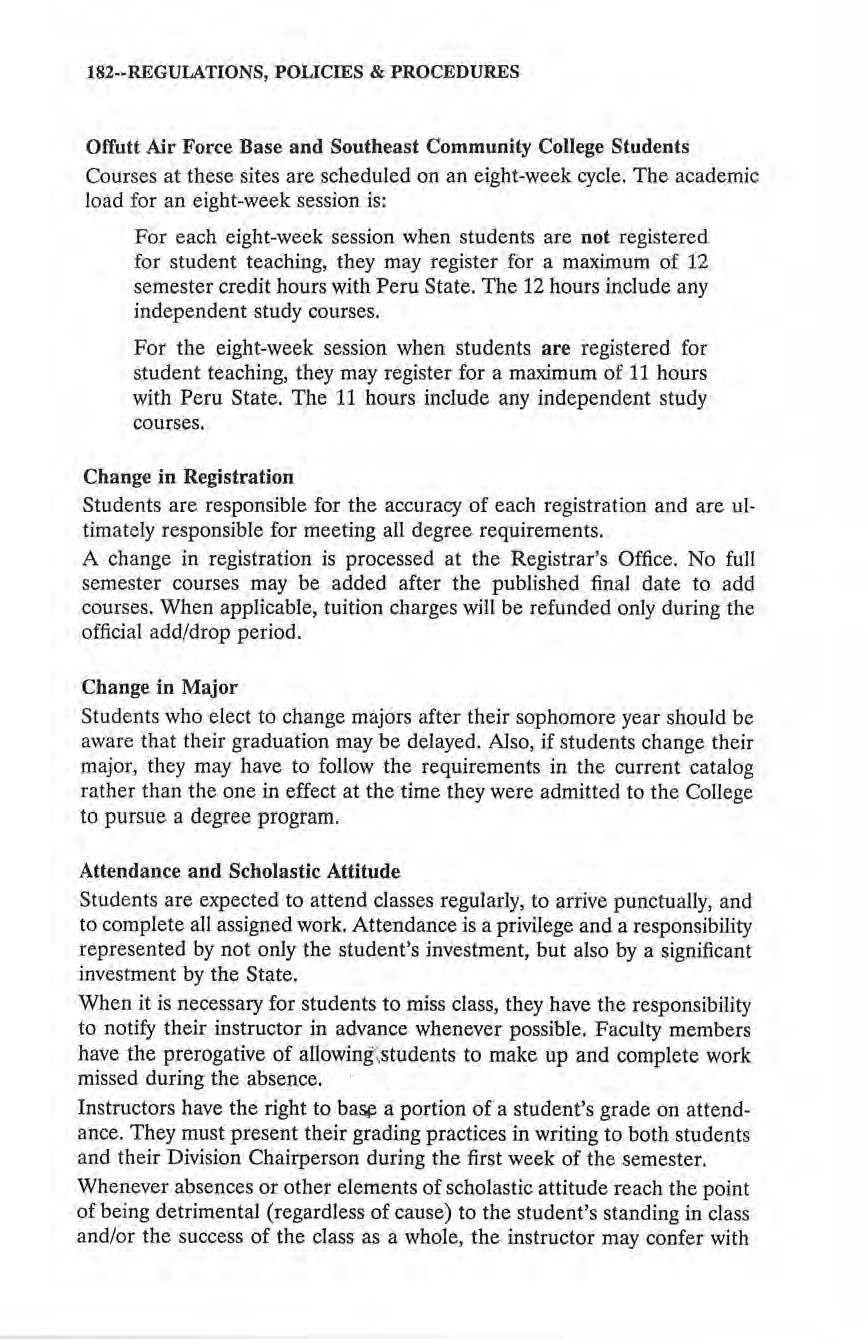
Attendance and Scholastic Attitude
Students are expected to attend classes regularly, to arrive punctually, and to complete all assigned work. Attendance is a privilege and a responsibility represented by not only the student's investment, bu t also by a significant investment by the State.
When it is necessary for students to miss class, they have the responsibility to notify their instructor in advance whenever possible. Faculty members have the prerogative of allowing ,students to make up and complete work missed during the absence .
Instructors have the right to ba~ a portion of a student's grade on attendance. They must present their grading practices in writing to both students and their Division Chairperson during the first week of the semester.
Whenever absences or other elements of scholastic attitude reach the point of being detrimental (regardless of cause) to the student's standing in class and/or the success of the class as a whole, the instructor may confer with
182--REGULATIONS,
POUcms & PROCEDURES
the student. The instructor and the student may mutually agree that the r egistration in the course should be dropped or the instructor may issue the student a "scholastic alert." Future conferences for the same or related reasons may result in the instructor dropping the student from the class. If the student requests, the Vice President for Academic Affairs may be asked to participate in the decision. The grade will be a W if course is dropped prior to the last date to withdraw with a W. An F will be recorded after this date.
CR and NCR do not affect grade point average; CR is applicable to graduation hours.

X work must be completed within the next semester or the record will show an F. Work is to be completed whether the student is in attendance or not.
Academic Progress (s ix week review of grades)
Students are expected to review their academic progress with the ir professors during the eighth week or mid-term week of the academic session. Students doing below average or failing work should immediately confer with their advisor and/or the Vice Pres ident for Student Affairs.
Withdrawal from Class
Students who wish to withdraw from a cl!ss must notify their advisor, ins tructor, and officially withdraw through the Registrar's Office. Students withdrawing after the last day to add classes which is one week after the mid-point of the term (as stipulated in the catalog) will receive a W. After one week past the mid-po int date, students who initiate a withdtawal roceive an F for the class.
REGlJIATIONS, POLICIES & PROCED URES 183
Letter Grade A B+ B c+ C D+ D F CR NCR X w Suggested Percentage Equ ival ent 90-100 85-89 80-84 75-79 70-74 65-69 60-64 Below 60 Grade Points 4.0 3.5 3.0 2.5 2.0 1.5 1.0 0 .0 Credit No
Incomplete
Grading System
Credit
Withd rawal
184--REGULATCONS, POLICIES & PROCEDURES
Withdrawal from the College
Students who wish to withdraw from the College must ini tiate their wi thdrawal with the Vice President for Student Affairs and complete all the appropriate paperwork. Proportional tuition refunds are mad e in accordance with the refund schedule (see the Expenses and Financial Aid section) to students who officially wit hdraw from the College.
After o n e week past the mid-point of the term, the Vice President for Student Affairs will determine if unusual or extenuating circumstances surround a withdrawal request and recommend either Withdrawal (W) or Failing (F) grades for a ll coursework. Poor academic performance alone is not sufficient reason to receive all W's.
Academic Stan dards
(See cooperative agreements for extended campus degree program requirements.)
Academic Probation
Stude nts with a cumulative grade point average of 1.00- 1.99 at the close of a semester, regardless of the number of attempted hours, are placed on academic probation. Probationary students must obtain a minimum 2.00 average for each successive semester of attendance until the required cumulative grade point average of 2.00 or higher has been achieved, Failure to meet the above condition will result in academic suspension Academic suspension is generally for two semesters.
Students who have attemp t ed 21 credit hours or less (including transfer record) and have a cumulative grade point average below 1.00 at the close of a semester are placed on academic probation and may continue attendance under the above requi r ements provided the fJ owing additional requirements have been satisfied. Vt . e. ~1" e_,c;, 6.e. d I""
The student must petition the~ ademic Affairs ~ - The specifics of the petition process are outlined in a letter of probation from the Vice P resident for Academic Affairs.

Student petitions are due in the Vice President for Academic Affairs office on or before the day of general registration.
Th e student petition :must address the following p oints:
1) reasons why the College should allow the student to continue;
2) the student's explanation for his/her pr ior poor per formance;
3) the studen t 's personal plan for improvement.
The student must agree to the provisions of an Academic Probation Contract which will include at a mini mum the followin g:
1) limited enrollment (9-12 hours)
2) completion of a time management class (non-credit)
3) advisor meetings
4) mid-term grade check
Academic Suspension J..~
Students who have attempteifsemester hours or more, including tran sfe r record, and have a cumulative grade po in t average below 1.00 at the end of a semester will be suspended. Academic suspension is generally for two semesters. A second academic suspension is generally a final suspension. Students who have been academically suspended may attend the subsequent summer session at Peru State College. (Summer attendance at other institutions is not permissible.) If the c um ul ative grade point average of 2.00 or higher is obtained, the student may enro ll for t h e next semester.
Dead Week
Dead W e ek will be the we-ek prior to finals week and there should be no exams given during that week. Exceptions to this policy may be granted only by the Vice President for Academic Affairs.
Final Exams
Final exams are schedu led the last week of the semester. Coaches are not to schedule regu lar games or events during this week. However, they may enter their teams in NAIA approved playoffs in which the College has declared an intention to par ticipate if qualified. Students who participate in playoff events during finals week are still subject to the a t tendance policies of their instructo rs.
Academ ic Dis honesty
Academic integrity is a basic principle which req uires that students take credit only for ideas a nd efforts that are their own. Cheating is defined as the submission of materials in assignments, exams, or otl1er academic work which is based on sources prohibited by the faculty member. Cheating shall include, but is not limited to situations in which the students:

1. Refer during an academic evaluation to material sources not authorized by the faculty member.
2. Utilize devices durin g an academic evaluation that are not a u thorized by the facu lty member.
3 Provide assistance to another student ot rece ives assistance from another student during an academic evaluation in a manner not authorized by the facu lty member.
REGULATIONS, POLICIES & PROCEDURES--185
4. Present as his/her own the ideas or words of another person without customary and proper acknowledgment of sources.
5. Knowingly permit his/her words to be submitted by another person without the faculty member's permission.
6. Act as a substitute or utilize a substitute in any academic evaluation
7. Fabricate data in support of laboratory or field work.
8. Possess, buy, sell, obtain, or us e a copy of any materials intend e d to be used as an instrument of academic evaluation in advance of its administration.
9. Alter grade records of his/her own or another student's work in a course or a component of a course.
Procedures and Pena lties for Academic Dishonesty
In addition to any adverse academic action which may result from engaging in academically dishonest behavior, the College specifically r~serves the right to address and sanction the conduct involved through the disciplinary procedures outlined in this catalog. Academic actions are reviewable under the Academic Appeals Policy contained in this catalog.
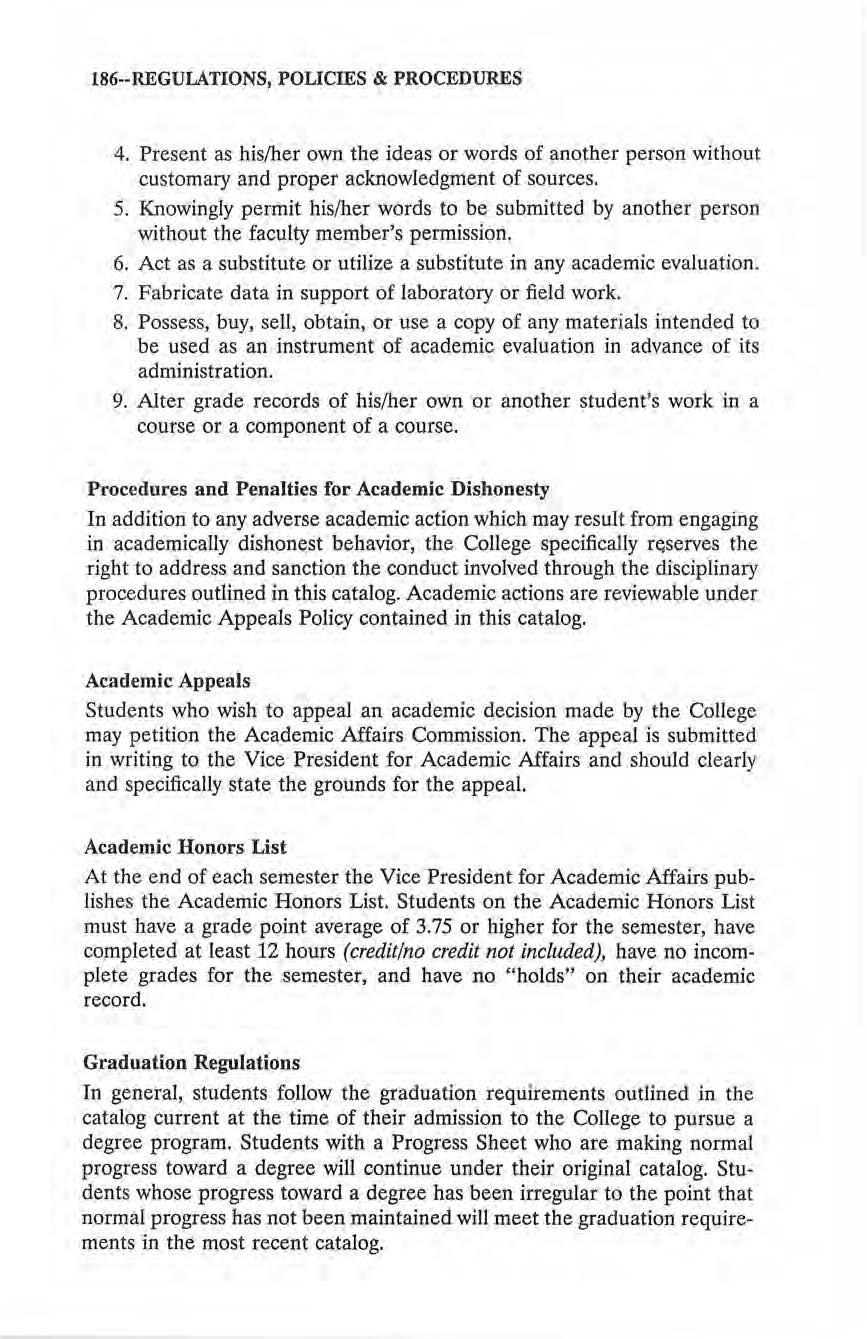
Academic Appeals
Students who wish to appeal an academic decision made by the College may petition the Academic Affairs Commission. T he appeal is submitted in writing to the Vice President for Academic Affairs and should clearly and specifically state the grounds for the appeal.
Academic Honors List
At th e e nd of each semester the Vice President for Academic Affairs publishes the Academic Honors List. Students on the Academic Honors List must have a grade point average of 3.75 or higher for the semester1 have completed at least 12 hours (credit/no credit not included), have no incomplete grades for the semester, and have no ' 'holds'' on their academic record.
Grad uation Regulations
Tn general, students follow the graduation requ irements outlined in the catalog current at the time of their admission to the Coll ege to pursue a degree program. Students with a Progress Sheet who are making normal progress toward a degree will continue under their original catalog. Students whose progress toward a degree has been irregular to the point that normal progress has not been maintained will meet the graduation requirements in the most recent catalog.
186-- REGULATIONS, POLICIES &
PROCEDURES
Students who transfer from Peru State and then are readmitted will meet the requirements in the most recent catalog
Graduation Honors
Graduation honors are conferred on bachelor degree candidates who have e arned a minimum of 60 Peru State College semester hou r credits in graded courses (CR grades excluded) and associate degree candidates who have earned a minimum of 45 Peru State College hours in graded courses. These hours must be resident credit hours. Grades and credits earned at other colleges and universities do not apply toward graduation honors from Peru State.
With Highest Distinction With High Distinction With Distinction
Transcripts
A foe is charged for each transcript (including the first). Transcripts will not be issued to students who have financial obligations to the College or holds on their academic records. Transcript requests are made in writing to the Registrar.
Once s tudents graduate or discontinue attendance at Peru State, subsequent college credits do not become a part of their Peru State transcript. This does not apply to an active student's credential file in the College' s Placement Office

REGULATIONS, POLICIES & PROCEDURES--187
3.90 - 4.00 3.75 - 3.89 3.50 - 3.74-
NON-ACADEMIC POLIC I ES Policy on Discrimination
Peru State College believes that fostering diversity and respect for differe nce is a fundamental goal of higher educational in stitutions. Therefore, the Co ll ege takes the unequivocal structure t hat bas for its purpose th e subordination of a person or a group based on race, color, creed, disability, marital status, nat ional origin, race, sex, or sexual orientation, cannot be tolerate d.
Peru State College will take strong and effective steps to achieve a diverse learning environment and a workplace respectful of differences. Clear, fair and effective policies will be formulated and comm unicated to all members of the campus community, and will respond promptly and consistently to complaints about any acts that violate t hose policies.
AJDS Policy
The purpose of this policy is to establ ish a plan which will be fo ll owed in the event any student, employee, or other school co nt act has contracted AIDS (Acquired Immu ne Deficiency Syndrome), ARC (Aids R e lated Complex), or has been diagnosed by a physician as being infected with the HIV virus. (SP, Sero Positivity)

Th e goals of Peru Sta te College are to:
1. P rovide an appropriate and least restrictive work/study setting as feas ible for AIDS, ARC, and SP persons.
:2. P rovide a safe environment for the College community.
3. Ma intain and protect all rights and privacy of A ID S, ARC, and SP persons.
4. Continue to observe non-discriminatory guidelines for all areas of campus life (i.e. social, academic, and cultural).
5. Assure that students/staff are not put at risk because of lack of knowledge, education, or proper equipment.
6. Increase awareness and provide educa tion to prevent further spread of the disease.
Ve hicle Registration a nd Parking
Students must register the ir motor vehicles with the Physical Pl a n t Office if they plan to operate them on campus. Vehicles are defined as all gaso line powered vehicles such as automobiles, motorcycles, or motor scooters. The registration fee is fifteen dollars. Only vehicles with the proper identification are allowed to park i n donnitory and other restricted areas. Adequate parking is available in off-s treet
188--NON-ACADEMIC PO LICIES
areas and students are not to park in the r esidential areas adjacent to the campus.
The Fami ly Education Rights and Privacy Act of 1974
The primary purpose for maintaining student records at Peru State is to assist students with their educational endeavors and to record institutional actions. It is the policy of the College to allow students to inspect, review and challenge their educational records as provided by the Family Education Rights and Privacy Act of 1974 (Buckley Amendment).
The publication, "Access to and Dissemination of Information about Students at Peru State College," contains detailed information about the Buckley Amendment and is available from the Office of Student Affairs. Complaints about the alleged failure of the College to comply with the requirements of the Buckley Amendment should be addressed to: The Family Education Rights and Privacy Act Office, Department of Health and Human Services, 330 Independence Avenue, S.W., Washington, D.C. 20201.
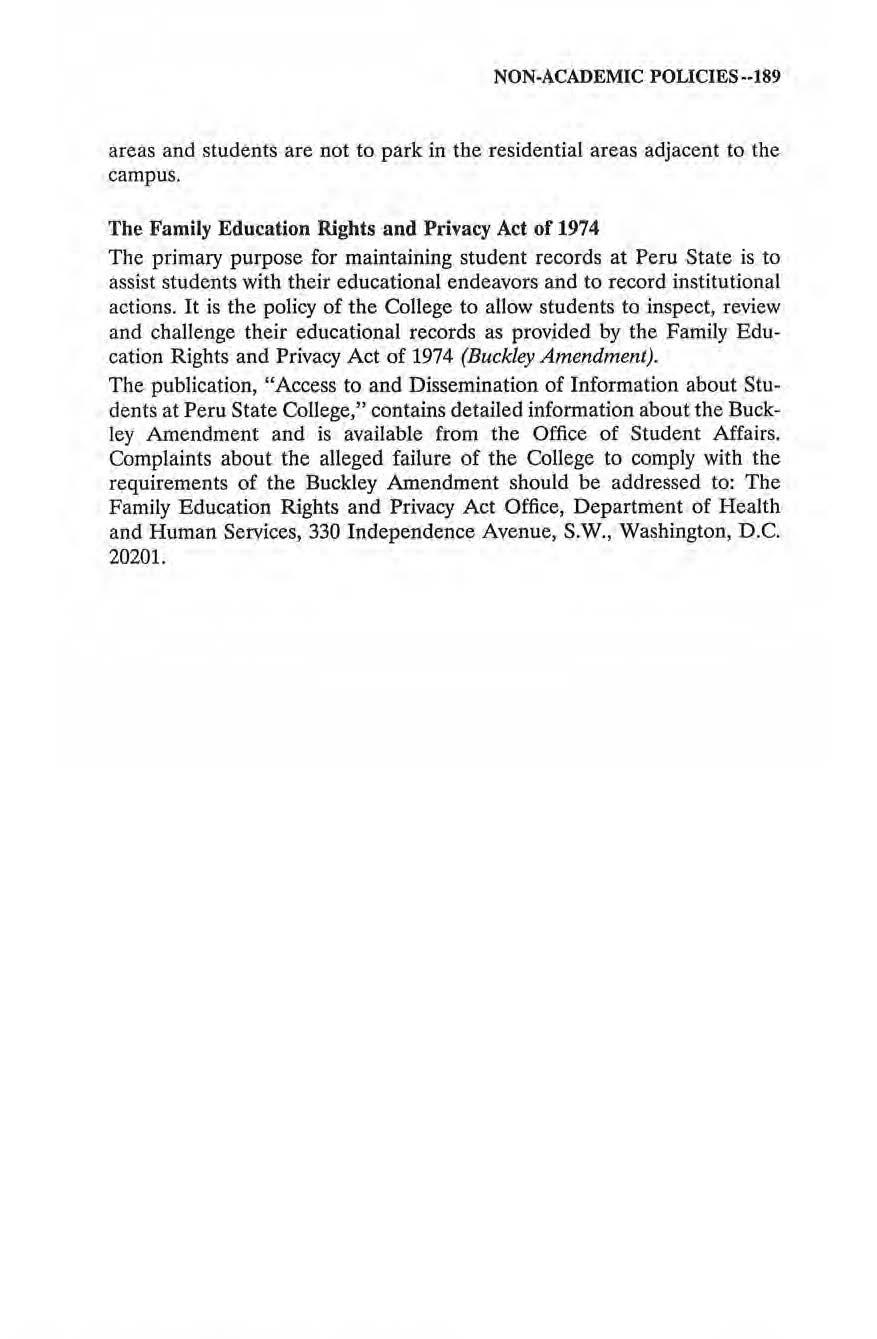
NON -ACADEMIC POLICIES--189
STUDENT SERVICES
Student Affairs Mission Statement
The mission of Student Affairs is to provide an environment that s upports the development of the st udent as a whole person. Education of the whole student encompasses academic training as well as social, spiritual, cultural, physical and emot ional development. Student Affairs will e n courage students to be active participants in the formation and fruition of their educational process to clarify values, to• solve problems and to di scover, apply and integrate knowledge.
Admiss ions and Student Relations
The Office of Admissions and Student Relations assists students and prospective st udents with admission to PSC and transjtjon to careers. The activities of the Office of Admissions and Student Relations include the following:
Admission counseling
Admission processing
Cam pus tours conducted by Student Ambassadors
Board of Trustees Scholarship Program
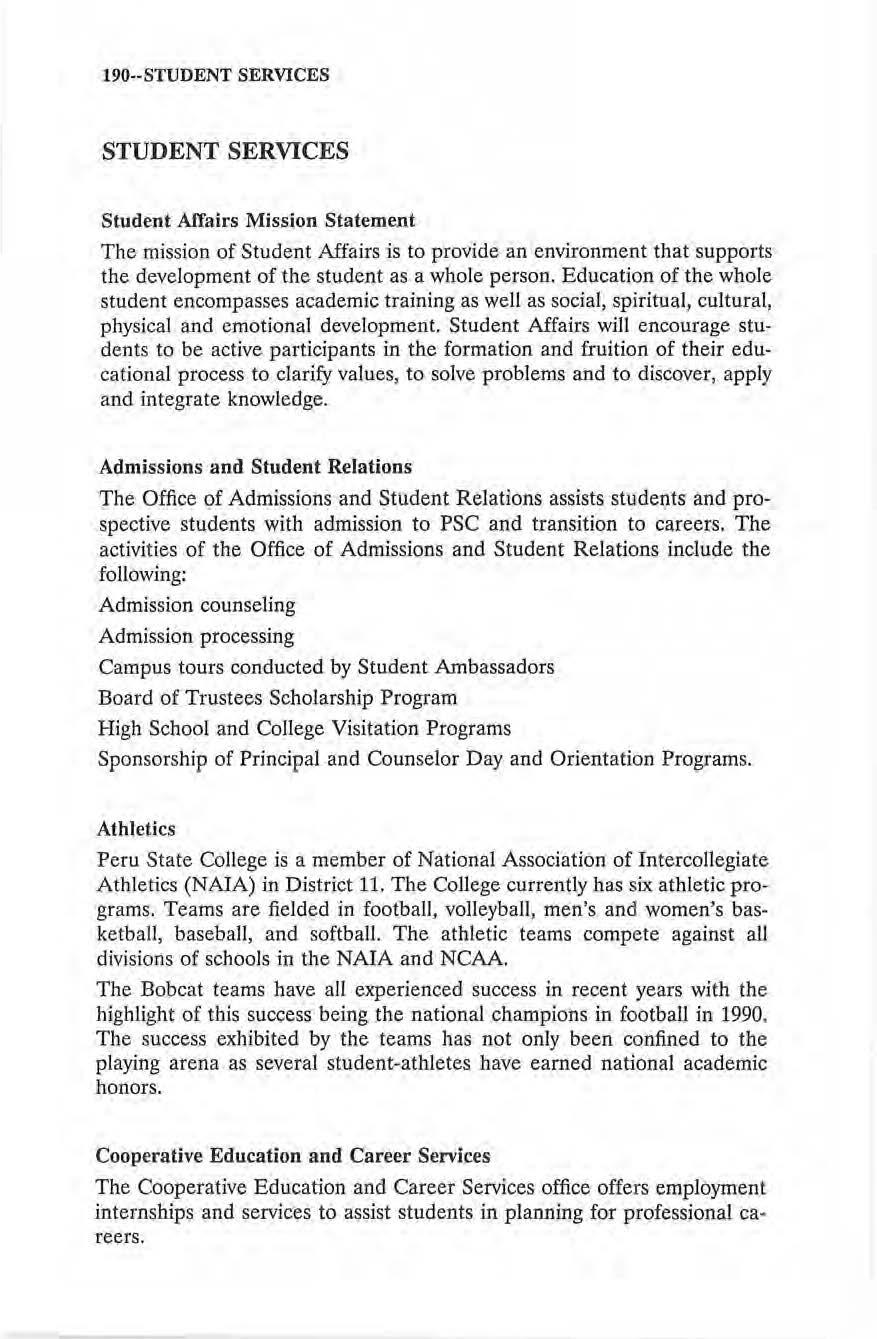
High School a nd College Visitation Programs
Sponsorship of Princip a l and Counselor Day and Orientation Programs.
Athletics
Peru State College is a member of National Association of Intercollegiate Athletics (N AJA) in District 11 The College currentl,y has six athletic programs. Teams are fielded in football , volleyball , men 's an d women's basketball, baseball, and softba ll. The athletic teams compete against all divisions of schools in the NAIA and NCAA.
The Bobcat teams have all experienced success in rece nt years with th e highlight of this success being the national champions in football in 1990, The s uccess exh ibited by the teams h as not only been confined to the playing arena as several student-athle tes have earned national academic honors.
Cooperative Education and Career Services
The Cooperative Education and Career Services office o ffers employment internships and services to assist students in planning for professional ca• reers.
190--STUDENT SERVICES
Counseling and Student Support Services

Students sometimes feel the need to seek assistance in dealing with their problems whether they are personal, vocational, educational, or social. The Offices of Student Affairs and Student Support Services will assist and c0tmsel students.
Student Support Services assists students with their academic and personal issues related to college success. Student Support Services is funded by a grant from the U.S. Department of Education. Students who meet the eligibility requirements can receive acad e mic, finabcial aid, personal and social support. Eligibility requirements include: showing financial need, or being a first generation student to graduate from college, or having a disability
Dining Services
The Student Center also serves as the main dining facility. The main dining area is open seven days a week for meal service to students, faculty, staff, and guests. All meals are designed with variety, nutrition, and good taste in mind.
There are three meal plans from which students may choose:
10 Meal Plan - provides the choice of any ten meals Monday through Friday only.
15 Meal Plan - provides the choice of any fifteen meals Monday through Sunday.
19 Meal Plan - provides an opportunity to eat at all meals served, Monday through Sunday.
The contracted food service vendor offers a meal plan for commuter students. Students may purchase a punch ticket from the Food Service Office and use it in the cafeteria. Punch tickets can be purchased for any meal or a combination of all meals. The "Bob Inn" is also located in the Student Center and offers grill items, deli sandwiches, pizza, coffee and cold drinks.
Financial Aid
Financial need should not discourage any student from attending Peru State. The college provides a variety of ways for students with limited resources to meet educational costs. An extensive program of Federal and State grants, scholarships, loans, and jobs are available to students with financial need. A Federal Application for Financial Aid must be filed with ACT/CSS. The U.S. Department of Education will determine the student's need and eligibility. (See Expenses and Financial Aid section in this catalog for further information.)
STUDENT SERVICES --191
Intramurals and Recreation
I ntramurals and other recreational activities offer individuals an opportunity to choose the type of activity in which they wish to participate. Intramural activities include flag football, volleyball, basketball, and softball for men's, women's, and co-ed teams. Other recreational opportunities for students include use of the weight room, pool, hiking/fitness trail, and the Al Wheeler Activity Center. Activities are added to the program as the needs and interests indicate depending largely on the participation of the students and their involvement.
Orientation
The College conducts several orientation sessions designed to address the special concerns of incoming students. Each program acquaints students (and their parents) with the College and campus life. The goal of th e ori e ntation program is to have the student leave that day being knowledgeable about college life, academically advised and registered. The New Student Weekend is the first weekend prior to class each Fall semester. The weekend is designed to acquaint students with their new campus and expose them to new skills that will help them be successful both academically and personally.
Residence Halls and Living Accommodations
All requests for information about living accommodations should be directed to the Office of Residence Life. The schedule of room and board rates is listed in the Expenses and Financial Aid section of th e catalog. Living in a residence hall is not like living at home; it is an experiment in group behavior where compromise is constant. Peru State College offers a living-learning environment that strives to assist students with their academic and personal development.
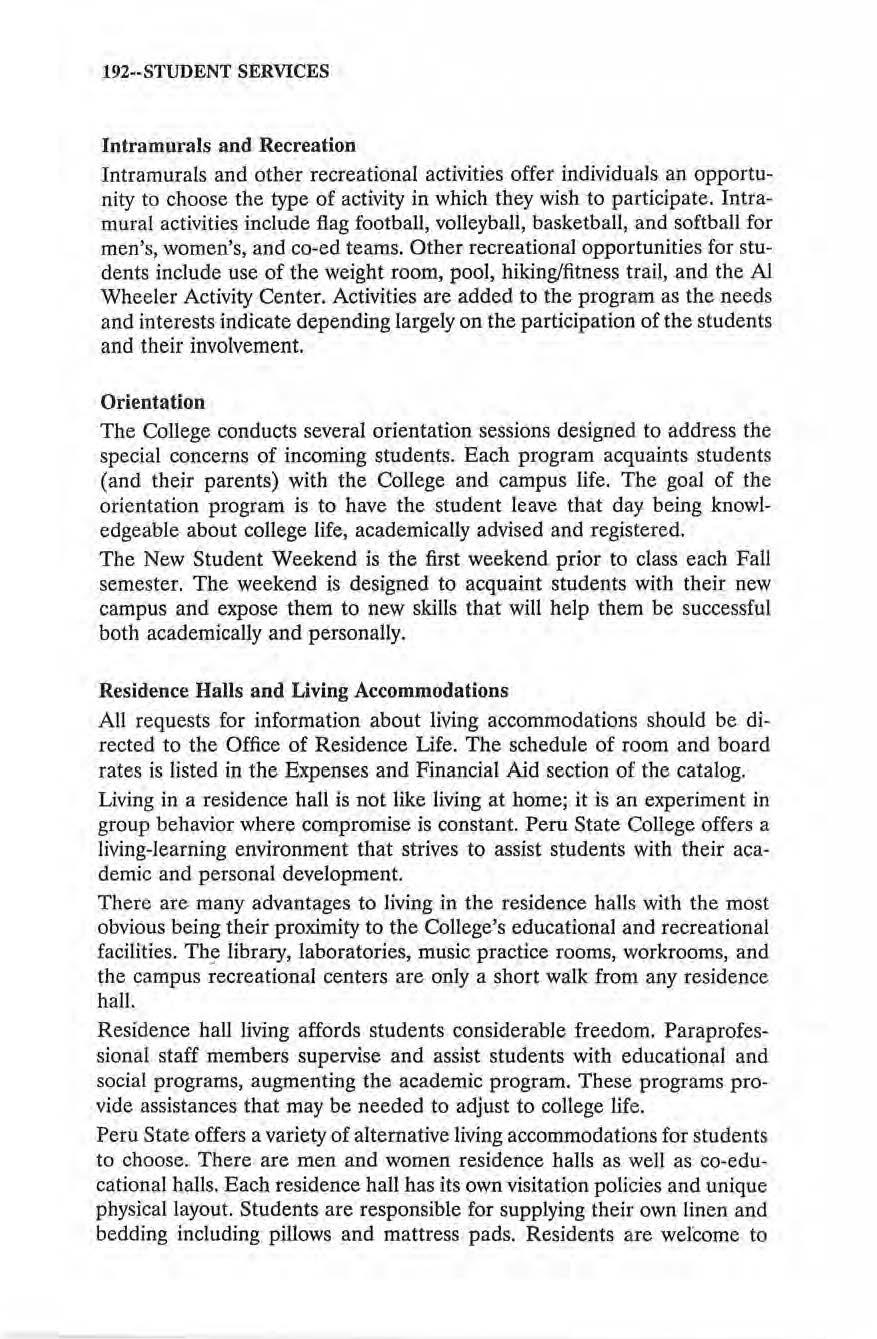
There are many advantages to living in the residence halls with the most obvious being their proximity to the College's educational and recreational facilities. Th ~ library, laboratories, music practice rooms, workrooms, and the campus recreational centers are only a short walk from any residence hall.
Residence hall living affords students considerable freedom. Paraprofessional staff members supervise and assist students with educational and social programs, augmenting the academic program. These programs provide assistances that may be needed to adjust to college life .
Peru State offers a variety of alternative living accommodations for students to choose. There are men and women residence balls as well as co-educational halls. Each residence hall has its own visitation policies and unique physical layout. Students are responsible for supplying their own linen and bedding including pillows and mattress pads. Residents are wefcom e to
192- - STUDENT SERVICES
bring other personal items from home such as radios, stereos, etc. Hot plates, microwave ovens, and air conditioners a re not permitted. The lower level of each hall is equipped with kitchen facilities, washers and dryers, and recreational equipment such as pool and ping pong tables. All unmarried freshman and sophomore students mus t live in college residence halls while enrolled for classes at Peru State College; however, this requirement shall not apply to those undergraduates who:
1. have reached junior status (60 or more credits) prior to registering for Fall semester, or
2. are 21 years of age or older on or before the last official day to register for the Fall semester, or
3. are residing at home with t heir parent(s) or l egal guardian(s), or
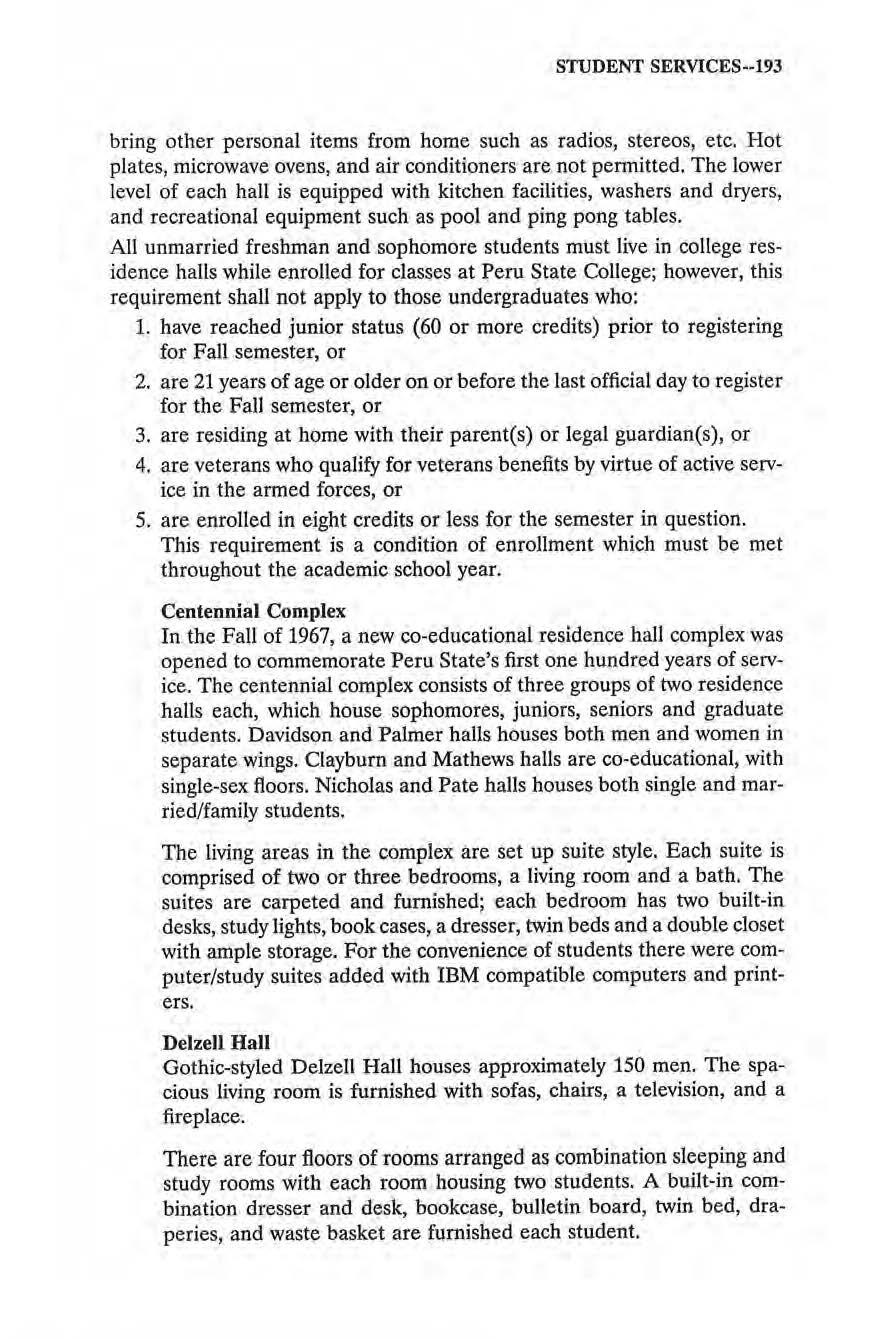
4. are veterans who qualify for veterans benefits by virtue of active service in the armed forces, or
5. are enrolled in eight credits or less for the semester in question. This requirement is a condition of enrollment which must be met throughout the academic school year.
Centennial Complex
In the Fall of 1967, a new co-educational residence hall complex was opened to commemorate Peru State's first one hundred years of service. The centennial complex consists of three groups of two residence halls each, which house sophomores, juniors, seniors and graduate students. Davidson and Palmer halls houses both men and women in separate wings. Clayburn and Mathews halls are co-educational, with single-sex floors. Nicholas and Pate halls houses both single and married/family students.
The living areas in the complex are set up suite style Each suite is comprised of two or three bedrooms, a living room and a bath. The suites are carpeted and furnished; each bedroom has two built-in desks, study lights, book cases, a dresser, twin beds and a double closet with ample storage. For the convenience of students there were computer/study suites added with IBM compatible computers and printers.
Delzell Hall
Gothic-styled Delzell Hall houses approximately 150 men. The spacious living room is furnished with sofas, chairs, a television, and a firep lace.
There are four floors of rooms arranged as combination sleeping and study rooms with each room housing two students. A built-in combination dresser and desk, bookcase, bulletin board, twin b ed, draperies, and waste basket are furnished each student.
STUDENT SERVICES-- 193
In addition to a large walk-in closet, lavatory, and medicine cabinet which are shared, each student is provided with an individual builtin wardrobe. There is a large shower room of ceramic tile and marble located on each floor. Delzell Hall also has a computer/study room for the convenience of its residents.
Eliza Morgan Hall
Located in the northwest corner of the campus, Eliza Morgan Hall was opened in 1929. The building houses 170 women in rooms situated on four floors. There are two large furnished lounges located on the first floor and the basement for student use. Rooms are double occupancy and furnished with two twin beds, two desks , a dresser and window coverings. In addition each resident shares with her roommate a closet and sink area. Each floor has centrally located bathrooms and shower areas.
Morgan Hall has study rooms situated on each floor and a computer room on the fust :floor for the convenience of its residents.
Oak Hill Married/Family Student Housing
There are one and two bedroom units available in Oak Hill. Each unit is furnished with a stove and refrigerator. Married/family housing apartments are leased on a renewable semester basis. A deposit is required and is refundable at the end of the lease agreement provided the property is left in good condition. Rent is due the first of the month and is payable in the college business office.
Inquiries about married/family housing may be made at the Office of Residence Life.

Student Handbook
The Student Handbook is a guide for college success and campus living. Students are expected to acquaint themselves with. the rules and policies within this catalog and Student Handbook.
Student Health Services
The College maintains its Health Center in AD. Majors Hall. Students may visit the college nurse or doctor at the Health Center during regularly scheduled office hours or make outside appointments through the nurse. Some non-prescription drugs, first-aid, and primary care are administered at the Health Center. The College's responsibility for medical expenses is limited to these services.
It is recommended that students have health and medical insurance. The College does not insure students for health care. Students who wish to participate in intercollegiate athletics must be certified as physically fit by a physician before beginning their sport.
194--STUDENT SERVICES
Public Health Services
The College provides space at the Health Center for two medical clinics for the benefit of the community and the College.
Family Planning Clinic provides pap smears, venereal disease and pregnancy testing and counseling on family planning. This clinic is held three times a month.
Nemaha County Health Department holds a Well Child Clinic monthly which is availabl e to any child regardless of residence. or income.
Sports Medicine Clin ic
A sports medicine clinic is a recent addition to the services offered to Peru State College students and staff. The clinic is run by a licensed athletic trainer and offers diagnosis, care, and prevention of athleti c injuries.
Student Programs and Student Life

Peru State College provides opportunities for students to grow outside the classroom setting.
Student life on campus may be enhanced through many avenues. Students have the opportunity to become an integral part of campus activities through Student Senate, the student governing body of the campus. The Student Senate provides a link between the college faculty and administration and the student body by serving on many college committees. The student representative to the State College Board of Trustees also reports regularly to the Student Senate. Th e Student Senate is an elected body representative of the student community.
Students may also elect to be involved in Student Programs, a volunteer student organization which provides campus educationa l, social, cultural, and recreational programs. Student Programs offers individuals opportunities to select, develop, and to present quality programming. Throughout the year Student Programs sponsors a wide variety of activities incl uding: professional artists, dances, picnics, non-traditional student programming, low budget activities, ethnic cultural events, womens' history month, homecoming and spring fling activities.
Students also have the opportunity to become involved in other organizations on campus. Through these organizations and programs students have the opportunity to develop leadership and social skills to make Peru State College a place to remember.
STUDENT SERVICES --195
Student Organizations
Students at Peru State may participate in a wide variety of student organizations for their personal, social, academic, or professional benefit.
Athletic Orga n izations
The Varsity Club is made up of students who have lettered in an intercollegiate sport. The club's purpose is to foster good sportsmanship.
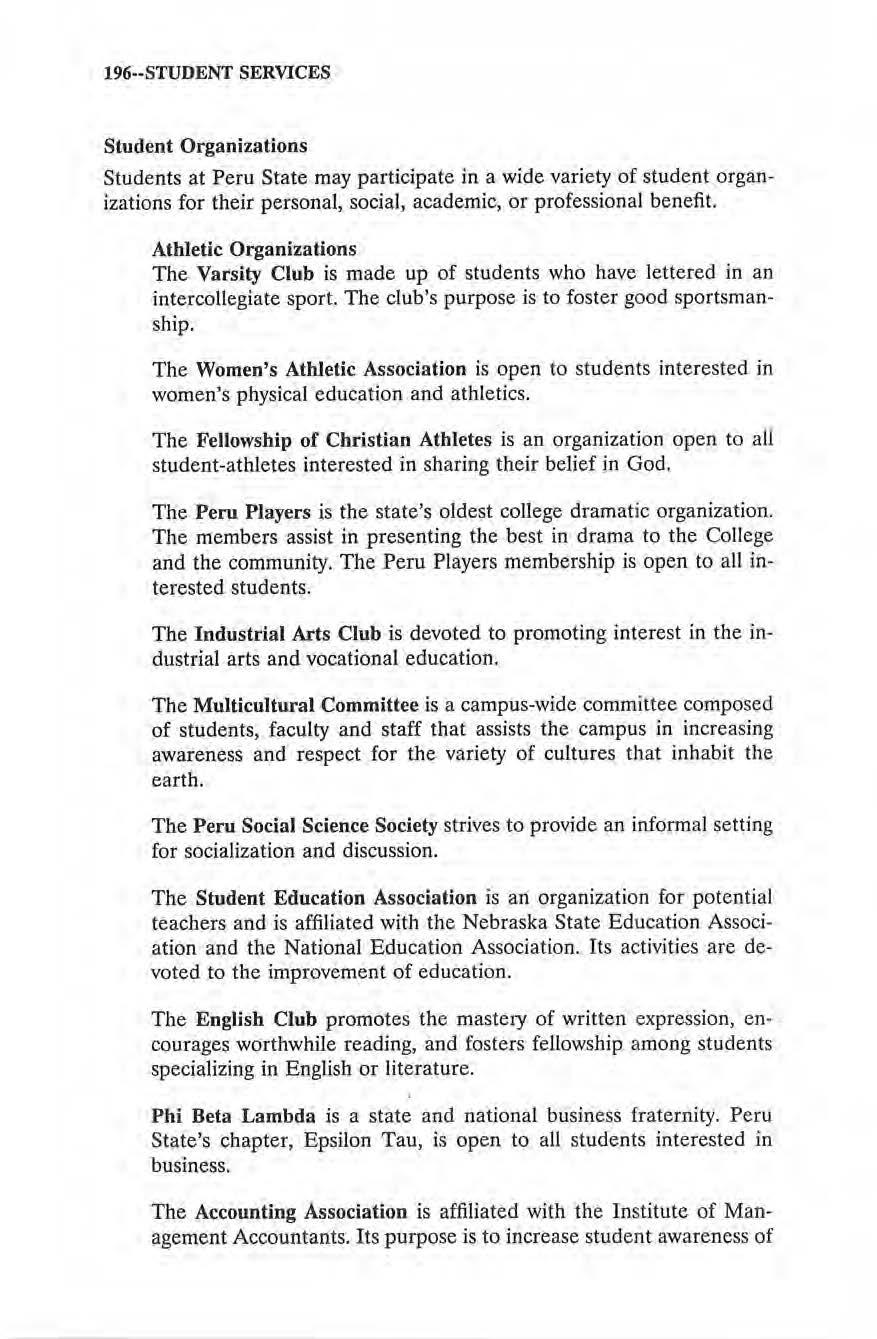
The Women's Athletic Associat ion is open to students intereste d in women's physical education and athletics.
T he Fellowship of Christian Athletes is an organization open to aU student-athletes interested in sharing the ir belief in God .
The Peru P layers is the state' s oldest college dramatic organization. The members assist in presenting the best in drama to the College and the community. The Peru Players membership is open to all interested students.
The Indus trial Arts Club is devoted to promoting interest in the industrial arts and vocational education.
The Multicultural Comm i ttee is a campus-wide committee composed of students, faculty and staff that assists the campus in increasing awareness and respect for the variety of cultures that inhabit the earth.
The Peru Socia l Science Society strives to provide an informal setting for socialization and discussion.
The Student Ed ucation Association is an organization for potential teachers and is affiliated with the Nebraska State Education Association and the National Education Association. Its activities are devoted to the improvement of education.
The Engli sh Club promotes the maste1y of written expression, en • courages worthwhile reading, and fosters fellowship among students specializing in English or literature.
Phi Beta Lambda is a state and national business fraternity. Peru State's chapter, Epsilon Tau, is open to all students interested in business.
The Accounting Association is affiliated with the I nstitute of Management Accountants. Its purpose is to increase student awareness of
196--STUDENT SERVICES
careers in accounting and to increase employers' awareness of Peru State graduates.
Peru State Management Association is open to all students and provides a wide range of activities to enhance members' knowledge in the field of business management.
Pi Sigma Chi is a local Greek social organization open to all female students.
The Art Club is a social club for art majors and students interested in art.
The Agriculture Club promotes the importance of agriculture throughout the College and community.
The Wildlife Club stresses the importance of maintaining wildlife in the region.
Honorary Societies
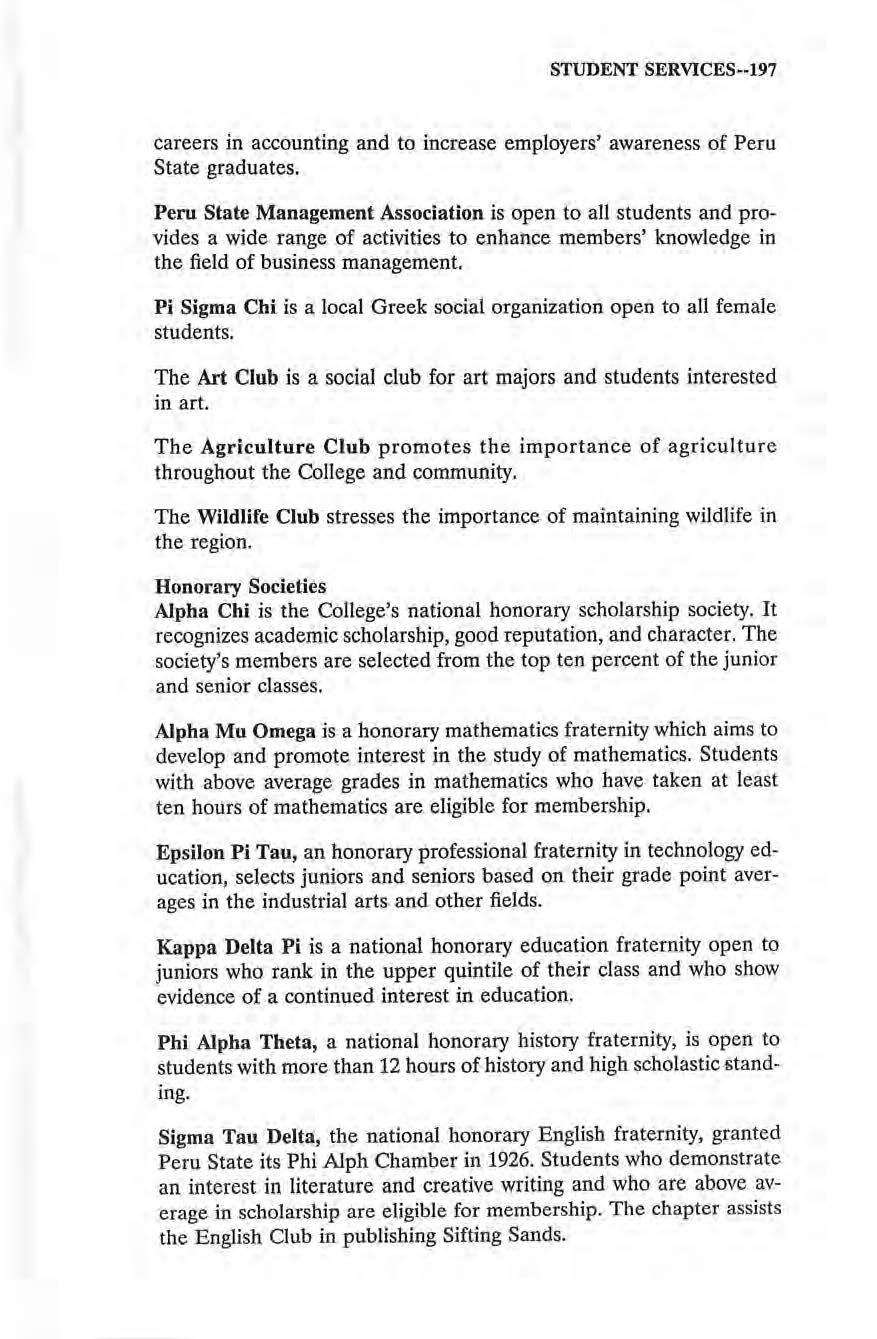
Alpha Chi is the College's national honorary scholarship society. It recognizes academic scholarship , good reputation, and character. The society's members are selected from the top ten percent of the junior and senior classes.
Alpha Mu Omega is a honorary mathematics fraternity which aims to develop and promote interest in the study of mathematics. Students with above average grades in mathematics who have taken at least ten hours of mathematics are eligible for membership.
Epsilon Pi Tau, an honorary professional fraternity in technology education , selects juniors and seniors based on their grade point averages in the industrial arts and other fields.
Kappa Delta Pi is a national honorary education fratemity open to juniors who rank in the upper quintile of their class and who show evidence of a continued interest in education.
Phi Alpha Theta, a national honorary history fraternity, is open to students with more than 12 hours of history and high scholastic standing.
Sigma Tau Delta, the national honorary English fraternity, granted Peru State its Phi Alph Chamber in 1926. Students who demonstrate an interest in literature and creative writing and who are above average in scholarship are eligible for membership. The chapter assists the English Club in publishing Sifting Sands.
STUDENT SERVICES--197
Beta B eta Beta is the College's professional honorary biology fraternity open to junior and senior biology students. Candidates for membership must have above average grades and plan to continually study biology.
Lambda Delta Lambda is an honorary fraternity for students interested in physical science.

Who's Who Among Students in American Universities and Colleges annually determines the number of senior students at the College who may be selected. The honorees are chosen by a committee of students and faculty members on the basis of scholarship, leadership in academic and e~'t.racurricular activities, se1vice to the College, and future promise.
Alpha Psi Omega, the national honorary t heater fraternity, is represented on the Peru State campus by the Zeta Lambda Chapter. Scholastic ability and active theater participation are the criteria for membership.
Music Organizations
The Peru Chorus is open to all students and is devoted to the study and performance of choral literature.
The College's band program is divided into the Marching Band, the Concert Band, and the Instrumental Ensembles.
The Student M .E.N,C. is the student chapter of the Music Educators National Conference and is open to all students interested in music. The club annually sponsors instrumental and vocal clinic s as well as other musical productions.
Religious Organizations
There are three r eligious groups available to P eru State studentsthe Fell owship of Christian Athletes, the United Ministry to Higher Education, and the Campus Crusade for Christ.
Student Government
The Student Senate of Peru State College consists of elected representatives from a variety of constituencies and is dedicated to focusing student interests and opinions in the operation of the College. Tbe Senate has voting m embers on the College Affairs Council, Academic Affairs Commission, Library Committee, Teacher Education Committee, and Student Affairs Commission.
198--STUDENT SERVICES
Residential Hall Councils are representative councils selected by the members of residence hall. These governing bodies recommend so1utions to student issues and plan social activities for hall residents.
Student Publications
The Peru State Times is the official college newspaper. It is published during the school year under the supervision of an academic advisor. Student contributions are welcomed.
Sifting Sands is a magazine of student writing that is published in the spring by the English Club and Sigma Tau Delta.
The Peruvian is the student yearbook that is published during the school year under the supervision of an advisor.
STUDENTS RIGHTS, FREEDOMS, AND RESPONSIBILITIES
The role of Peru State College is to encourage people of all ages to develop their skills and talents differently, according to individual abilities and interests, so that collectively they contribute to the continuum of democracy. College policies, procedures, and regulations are formulated to guarantee each student' s freedom to learn and to protect the constitutional rights of others.
The concept of rights and freedoms, no matter how basic or widely accepted, carries with it corresponding responsibilities. Students as well as other members of the College community, enjoy the same constitutional and civil rights guaranteed all citizens; at the same time they are subject to the laws of the nation, the State of Nebraska and the local community. All members of the College community have strong responsibility to protect and maintain an academic climate ib which the freedom to learn can be enjoyed by all. To this end, certain basic regulations and policies have been developed to govern the behavior of students as members of the College commun ity.

Violations of student conduct regulations will be handled through the Office of the Vice President for Student Affairs. Violations of federal, state, and/or local laws make a student subject to civil and/or criminal action in add iti on to disciplinary action by the College. Each student is responsible for knowing PSC policies, procedures and deadlines. Policies and regulations may be found in the College Catalog, the Student Handbook, and in the Student Affairs Office.
Academic Rights of Students
The College has the responsibility of providing a program of quality education in keeping with its financial resources; students have protection through campus designed procedures against prejudiced or capricious academic evaluation. Student performance shall be evaluated solely on an
STUDENT SERVICES--199
academic basis, not on opinions or conduct in matters unrelated to academic standards. Students are responsible for the proper completion of their academic program, for famil iarity with all requirements of the College catalog, and for maintaining an acceptable grade average for degree requirements. Students have the right to be informed at the b eginning of each term of the nature of the course, course expectations, evaluation standards, and the grading system.

Freedom from Sexual Harassment
Students shall be free from sexual harassment by employees or other students in the educational environment of Peru State College, Sexual harassment may be defined as unsolicited nonreciprocal behavior by an employee or student who is i·n a position to control another's status and who uses the power or authority of that position to cause that employee or student to submit to sexua l activity, or to fear that he 'or she would be punished for the refusal to submit. Sexual harassment also includes any employee or student conduct of a sexual nature unreasonab ly interfering with a student's educational performance or status by creating an intimidating, hostile, or offensive educational environment. Se>n1al harassment may consist of a variety of behaviors by an employee or student inclucling, but not limited to, subtle pressures for sexual activity, inappropriate touching, inappropriate language, demand for sexual favors, and physical assault.
Freedom from Unreasonable Search/Seizure
Students shall be free from unreasonable search and/or seizure regarding their person and their personal prop e rty. The College does reserve the right to search College property in regards to personal safety in compliance with college policies.
Freedom of Access
Within the limits of its resources, Peru State College shall be open to all applicants wh o are qualified according to current admission requirements. Peru State College does not discriminate on the basis of race, creed, color, national origin, mental or physical disabilities, age, or sex in any of its policies, practices, or procedures. This includes, but is not limited to, admissions, employment, financial aid , and educational services, programs, and activities.
Freedom of Association
Students are free to associate and promote their common interests. They have the right to seek, through official proced ures, the establishment of organizations as long as they are not in conflict with the educational purposes of the College. Students have the right to affiliate with officially
200--STUDENT SERVICES
,.
recognized campus organizations of their choice, within the membership requirements of those organizations.
Freedom of Expression
The rights of free speech and peaceable assembly are fundamental to the democratic process. The College supports the rights of students of the College community to express their views and opinions on actions or ideas, to associate freely with others, and to assemble peacefully.
Whether expressing themselves as individuals or in organized groups 1 members of the College community are expected to conduct themselves responsibly, according to law and to respect the basic educational goals of the College. Accordingly, the College insists that free expression not violate the rights of others. Disruption of the educational processes and functions of the College, violation of law1 and hate speech (racial, ethnic, or sexist slurs) would constitute such a violation.
Student Participation in Institutional Government
Students shall be free, individually and collectively, to express their views on issues of institutional policy and on matters of general interest to the student body. The student body shall have clearly defined means to participate in the formulation and application of institutional policy affecting academic and student affairs.

Code of Conduct
Students at the College have certain rights and responsibilities. Included in the responsibilities is an awareness of the standards of appropriate behavior. The College expects each student to exercise self-discipline which will enhance the individual's educational experience and the total learning environment of the College.
In general, the off-campus activities of students are viewed as their personal business. However, when a student violates local, state, or fede ral laws and at the same time violates the Code of Conduct, either on or off-campus, the College reserves the option of initiating disciplinary action on its own. Disciplinary action may be initiated by the College and sanctions imposed against any student or student organization found guilty of committing, attempting to commit, or intentionally assisting in the commission of any of the following prohibited forms of conduct.
1. Disruption of Obstruction: Conduct which materially or substantially disrupts o r obstructs the educational process of the College.
2. Harassment: Physical, verbal abuse, or sexual harassment of another person, or conduct, including but not limited to hazing, which threatens or endangers the health and safety of others Racial, ethnic and/ or sexist slurs and hate speech shall all be considered forms of harassment.
STlJDENT SERVICES--201
3. Hazing: Student organizations or individuals shall n either engage in nor condone any form of hazing. Hazing may include but is not limited to: a) any action taken or situation intentionally created to subject another person to mental or phys ical discomfort, embarrassment or ridicule; b) verbal or physical harassment or abuse; c) e ncouragement, facilitation or participation in public stunts, morally degrading or humiliating behavior or games on or off campus which interfere with academic performance or unreasonab ly create a hostile or offensive learning environment; or ct) the physical marking of students, e.g., branding, tattooing or other disfigurement.
4. Intoxicants and Drugs: Possession, consumption, being perceptibly under the influence, or furnishing of alcoholic beverages on campus property or at supervised functions of student organizations. Possess ion, consumption, being perceptibly under the influence, or furnishing of any narcotic or dangerous drugs except when use or possession is lawfully prescribed by an authorized medical doctor or dentist.
5. Dangerous Chemicals and Devices: Unauthorized use, possession, or sale of firearms, explosives, dangerous chemicals, or other dangerou s weapons on College property except as expressly authorized by campus procedures.
6. Other Forms of Misconduct: Forgery, alteration, or misuse of College documents, records, funds, or identification. Falsification of records or deliberate misrepresentation of facts on College forms and documents. Telephone misuse, theft, malicious destruction, damage, or misuse of College or private property including computers. Unauthorized use of College funds, equipment and supplies (including but not limited to falsely representing oneself as an agent of the College, incurring debts or entering into contracts on behalf of the College).
7. Violations of College Regulations: Violating published College regulations , including those related to entry and use of College facilities, the rules in this section, and any other rules or regulations which may be enacted by the College. Failure to comply with the lawful directions of College personnel acting in the performance of their duties.
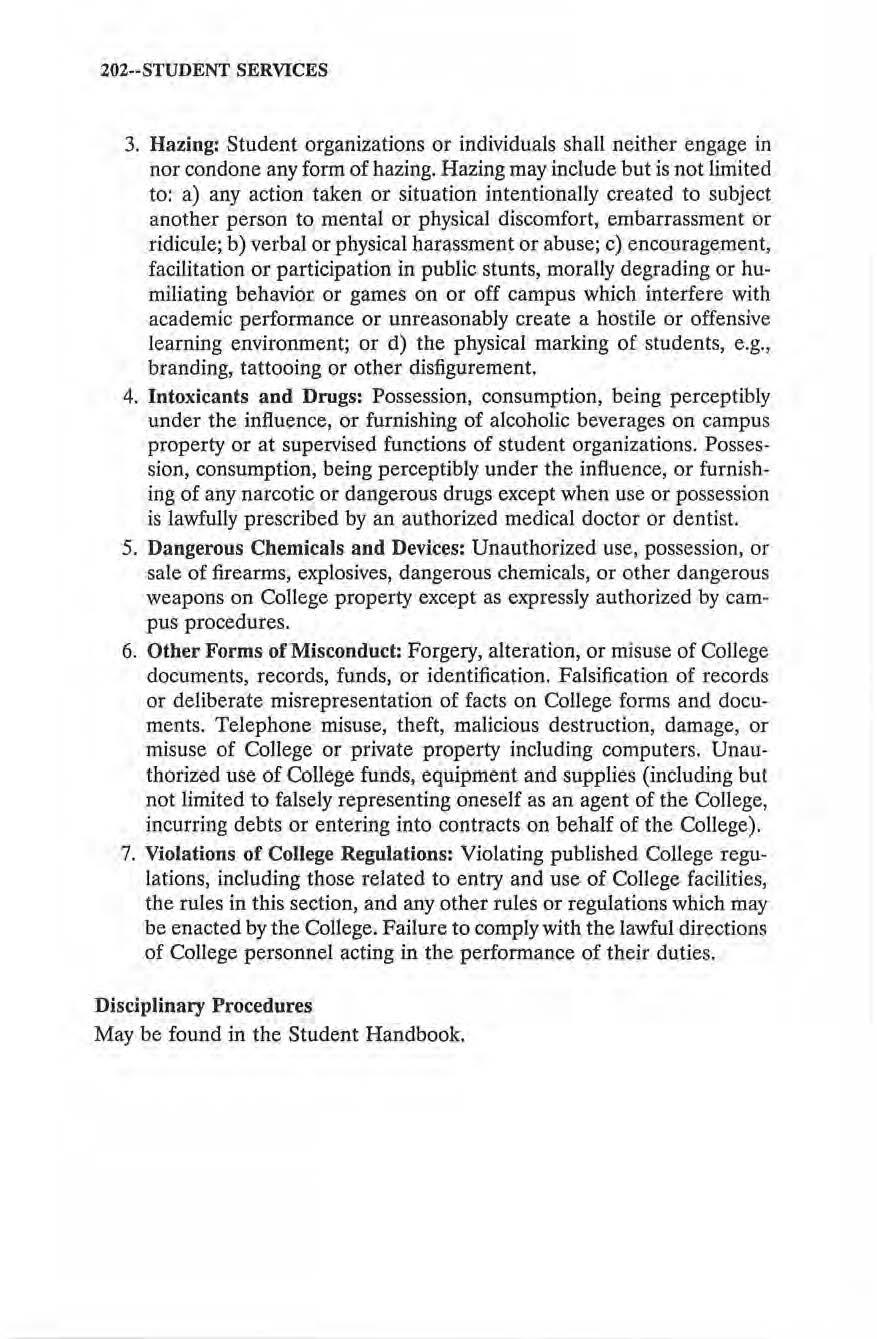
Disciplinary Procedures
May be found in the Student Handbook.
202--STUDENT SERVICES
EXPENSES AND FINANCIAL AID
The expenses for attending Peru State College are set by the Board of Trustees of the Nebraska State Colleges and Peru State. The College reserves the right to change its tuition, fees, and other charges at any time. Additional expenses for books and supplies, travel, and personal items will vary for individual students. Tuitions rates for 1992-1993 are:
Nebraska Residency Regulations for Tuition
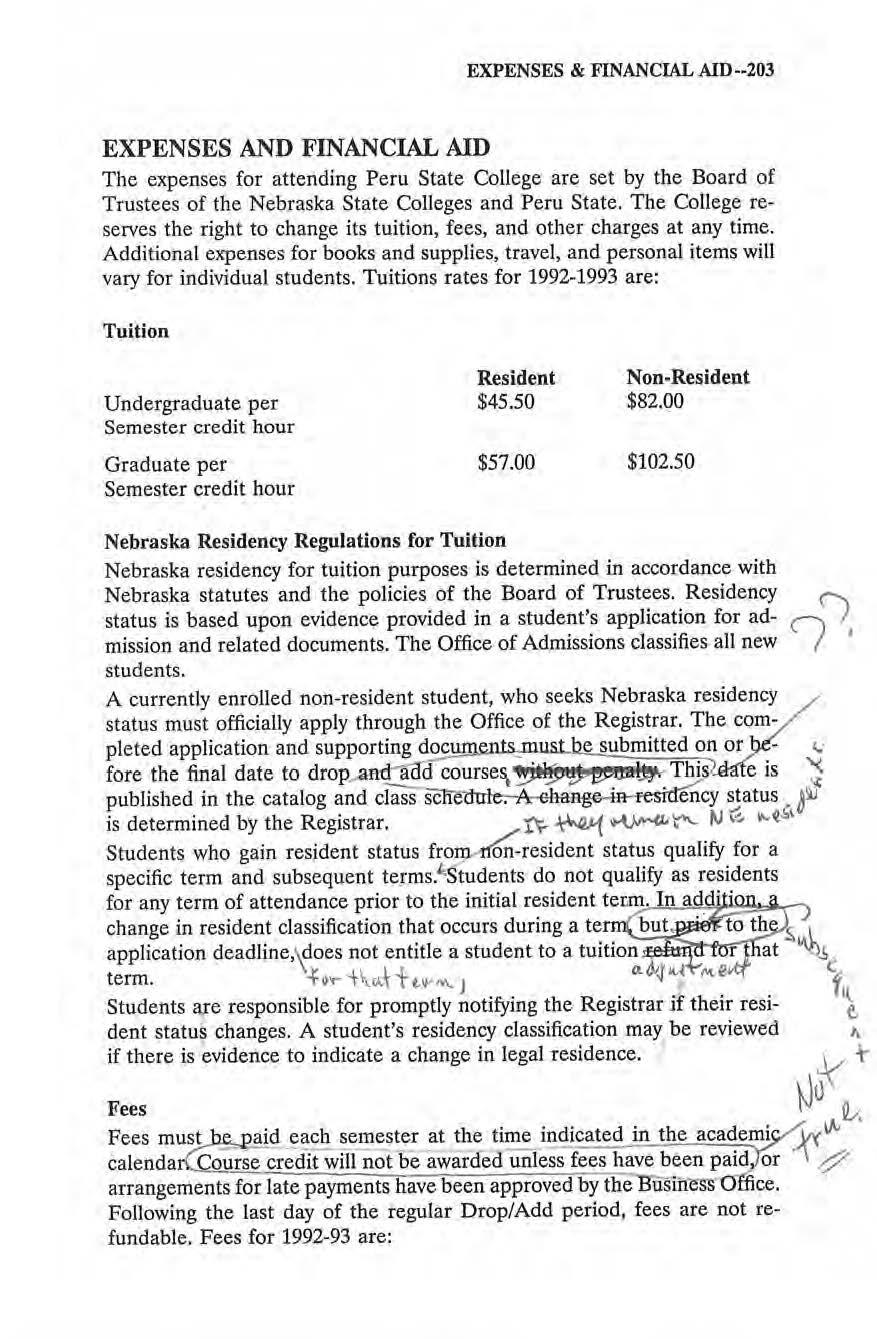
Nebraska residency for tuition purposes is determined in accordance with Nebraska statutes and the policies of the Board of Trustees. Residency (""'-\ status is based upon evidence provided in a student's application for ad-
mission and related documents. The Office of Admissions classifies all new / students.
A currently enrolled non-resident student, who seeks Nebraska residency status must officially apply through the Office of the Registrar. The completed application and supporting d~us.t. e submitted on or fore the final date to drop...an~d course5t This e is published in the catalog and class scfiettul:e;-A-ehange-in-~y status 8.;f is determined by the Registrar. ~\"- N \\,,t"' Students who gain resident status from.-11'6ri-resident status qualify for a specific term and subsequent terms.'-Students do not qualify as residents for any term of attendance prior to the initial resident tetm. In add' · change in resident classification that occurs during ate but. ·· to th l application deadline,\'1 oes not entitle a student to a tuition r at -~ term. {<),... -t ~,c..-\tt~"'- J o.6.qlvl 1'4'1
Students are responsible for promptly notifying tbe Registrar jf their resi-
dent status changes. A student's residency classification may be reviewed
if there is evidence to indicate a change in legal residence.
Fees
F ees must aid each semester at the time indicated in the academi calenda ou~se cr~di.t will not be awarded unless fees have been paid or arrangements for late payments have been approved by tbel3usiire-S-S 0: ce.
Following the last day of the regular Drop/Add period, fees are not refundable. Fees for 1992-93 are:
EXPENSES & FINANCIAL AID--203
Tuition Undergraduate per Semester credit hour Graduate per Semester credit hour Resident $45.50 $57.00
Non-Resident $82.00 $102.50
/ 1
n
)
1
t Nt
~
,.
\,\, 0.,,,, (?'
Facilities Fee 1-11 hours 12 + hours
Health Center Fee Regular Semester 3 + hours
Summer Session
Full-time student (entire session)
Short, special, or workshop course on campus
Student Activity Fee 1-6 hours 7 + hours
Special Fees Administration of CLEP test

Admission Fee
hr.
Admission fee must accompany all applications for admission and does not apply toward tuition.
Computer Lab Fee (Fall, Spring and Summer Sessions}
1-6 hours 7 + hours
Course Fees
Some courses require additional materials, supplies, or laboratory fees
Credential File Fee
Degree Fee Undergr.aduate Graduate Identification Card Regular semester students enrolled in 4 hours or more are required to purchase an I.D. card.
204--EXPENSES
& FINANCIAL AID
$4.00/cr.
$48.00/semester $15.00/semester $6.00 $1.20/week $10.00/semester $20.00/semester $5.00
$10.00
$5.00/term $10,00/term
Replacement I.D. Card $3.00 $20.00 $35.00 $3.00/year $3 .00 ...
La te Registra tion Fee $10.00
Due on all registrat i ons completed between the end of regu l ar 7 enro llment and up to one week after the regular enrollment period is ended.
Late Tuitio n Fee 15 % of tuition ?
Due on all registrations comp leted more than 1 week after the regular~ • enrollment period is ended. Due on all tuition payments more t h an one week late, unless other arrangements have been approved by the Financial Aid and Business Offices.
Motor Vehicle Regis tration

Off-Campus Service Fee
Private Mus ic Lesson s
Charged to non-Music majors.
P u bli cations Fee
9 + hours
Tra nscaipt (IJ'o l;I"' ,( ,t. c c)
Tuitio n Refunds
$ 15.00/year
$10.00/hour
$4.00/lesson $25.00/year
$3.00
Tuition is refunded in accordance with College pol icies and the schedules that follow. In addition, refunds may not go direct ly to the student, but to the sou rce of the original payment.
Withd rawa l from Cl ass
Tuition refunds are granted 'for a reduction in semester credit hours through the final_date tg_ad.d regular semester courses as indicated in the catalog. The final date to withdraw from class during the summer session is a p roportional pen9d ot1i me.
With drawa l from College
Students must officially withdraw from College through the Vice President for Student Affairs. Refunds are granted to students who tot a lly withdraw from the College within a given time period. A proportional refund schedule follows:
Regular Se mester
First week
80% of tuition
(the Friday after classes begi1i marks the end of the first week)
Second and third weeks
Fourth , fifth, and sixth weeks
After the sixth week
60% of tuition
40 % of tuition
None
EXPENSES & FINANCIAL AID --205
)
~v
Summer Session
No refunds are granted for workshops of ten days or less after they begin. The refund schedule for workshops of more than ten days is prorated as a percentage of the class sessions remaining. No refunds are granted for any workshop after 40 percent of the sessions have been held.
Fee Refunds
Generally, fees are not refunded, unless they were collected 'in error.
Housing and Food Service Contracts

Housing and Food Service contracts are academic. year annual contracts. Room reservations require a deposit of $75 and must accompany the housing contract. The deposit is refundabl e if the student completes his/her contract, withdraws for approved reasons, or there are no damages to the facility. Students have the opportunity to change meal plans. Meal plans may be changed until the last day of drop and add . Students may be re• leased from a meal plan by formally appealing to the Director of Resid e ntial Life. Food Service rates for 1992-93 are:
Food Service Rates
10 meals (Monday-Friday only)
15 meals
19 meals
Housing Rates
Both the one-bedroom unit and the two-bedroom unit in Oak Hill include water and gas, but not electricity. Utilities are ta,ced and subject to a monthly surcharge based on utility cost.
206--EXPENSES &
AID
FINANCIAL
First week Second week After the second week Workshops 80% of tuition 50% of tuition None
Delzell and Morgan Halls (per semester) Centennial Complex (per semester) $600.00/ semester $645.00/ semester $690.00/ semester $605.00 $680.00 Oak Hill Apartments (partially furnished) On e•bedroom unit $168.00/month Two-bedroom unit $205.00/month
Nicholas Hall Apartments (furnished with utilities included)
One-bedroom unit $226.00/month
1\vo-bedroom unit $273.00/month
Private Room Charge (additional per semester)
Housing Depos it
Housing and Food Service Refunds
$245.00
$75.00
Students who withdraw from school or whose housing contract is canceled, both with approval of the Vice President for Stud ent Affairst may Teceive prorated refunds of their housing and food service fees. Refunds are prorated on the number of days in the semeste r and the date of approved cancellation of t he contract.
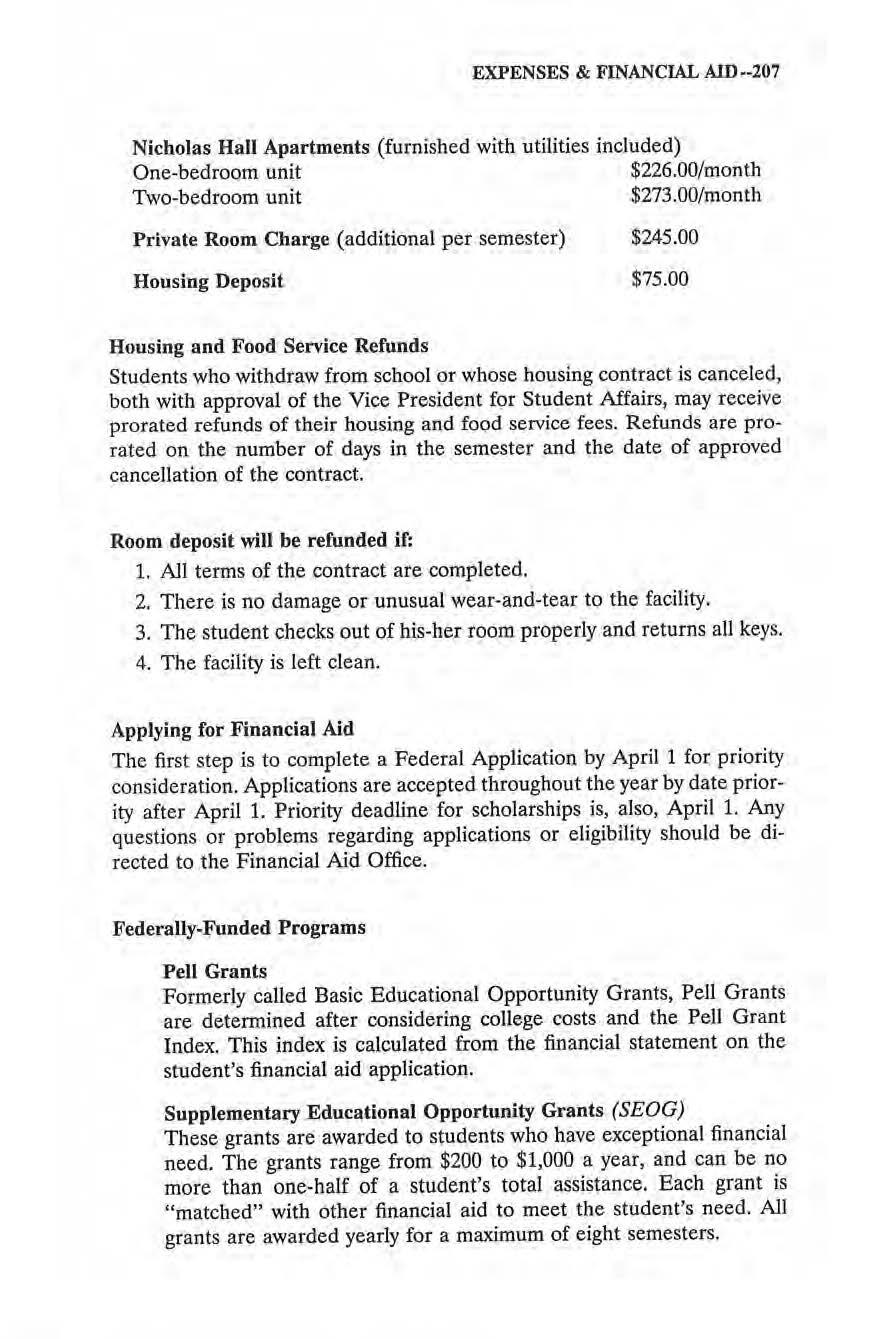
Room deposit will be refunded if:
1. All terms of the contract ate completed.
2. There is no damage or unusual wear-and-tear to the facility.
3. The student checks out of his-her room properly and returns all key s.
4. The facility is left clean.
Applying for Financial Aid
The firs t step is to complete a Federal Application by April 1 for priority consideration. Applications are accepted throughout the year by date priority after April 1. Priority deadline for scholarships is, also, April 1. Any questions or problems regarding applications or eligibility should be directed to the Financial Aid Office.
Federally-Funded Programs
Pell Grants
Formerly called Basic Educational Opportunity Grants, Pell Grants are detennined after considering college costs and the Pell Grant I ndex. This index is calculated from the financial statement on the student's :financial aid application.
Supplementary Educationa l Opportunity Grants (SEOG)
Th ese grants are awarded to students who have exceptional financial need. The grants range from $200 to $1,000 a year, and can be no more than one-half of a student's total assistance. Each grant is "matched" with other financial aid to meet th e student's need. All grants are awarded yearly for a maximum of eight semesters.
EXPENSES & FINANCIAL AID--207
College Work Study (CWS)
The College Work Study program is primarily for students from lowincome families. Its purpose is to permit students to pay for a portion of their education by working. When attending college full time, students can work a maximum of 15 hours per week; during vacation periods, students are allowed to work 40 hours per week. Work study jobs are usually on campus and vital to the efficient operation of the College.
Perkins Loans
These low interest, long-term loans are made to students who are in good standing and registered for, at least, a half-time load.
Stafford Loans
These loans are obtained through commercial lenders. To be el igible, a student must be able to demonstrate financfal need ,
Parents' Loan for Undergraduate Students
This program allows parents to borrow through commercial lenders to meet the educational costs of their children. Monthly installments begin 60 days after obtaining the loan.
State-Funded Programs
Nebraska State Loan for Math and Science Teachers
State Scholarship Award Program (SSAP) . This is actually a grant program for stud e nts with substantial financial n eed and are U.S. citizens or citizens of U.S. Trust Territories.
Nebraska State Scholarship Award Program (SAP)
A grant program designed for needy students who are Nebraska Residents.
Tuition Assistance for Members of the Nebraska National Guard

The Nebraska National Guard can pay three-quarters of the tuition for a limited number of members. Guard personnel must apply through their units.
Military Reserves Tuition Waivers
Select members of military reserve units in Nebraska may have onehalf of their tuition waived at Peru State, Reservists apply through their reserve unit.
Institutionally-Funded Programs
College Work Jobs
These jobs are similar to College Work Study jobs in pay, type of wo rk, and hours worked.
208--EXPENSES & FINANCIAL AID
Board of Trustees Scholarships
The Board of Trustees of the Nebraska State Colleges provides full tuition scholarshlps for current graduates of Nebraska hlgh schools who have demonstrated outstanding academic achievement based on class rank and entrance examinations. The scholarships are renewable to cover four regular academic ye ars . The application deadline is January 15.
Cooperating Schoc;>ls Scholarships
Scholarshlps are available to designated graduates of school· systems which assist Peru State with its teacher education program. The scholarships are for one-half the basic tuition costs per semester for eight semesters. Potential applicants should inquire at their hlgh school.
Special Activity Tuition Scholarships
Financial assistance in the form of partial tuition waivers granted to students with special abilities in athletics, art, drama, music, etc. Applicants should submit the Peru State financial aid application indicating their desire to be considered for a waiver. The appropriate college official determines an applicant's qualifications. The waivers are approved for one academic year, but are renewable.

Peru State College Foundation Scholarships
Through the generosity of alumni and friends of Peru State, the Peru State College Foundation presents a variety of aid opportunities. Permanent, fully endowed student aid funds are listed at the end of th e Ex-penses and Financial Aid portion of the catalog. Students may apply for a specific Foundation scholarship (or any available scholarship) on the College's scholarship application form which is available from the Office of Financial Aid.
Nonresident Scholars Program
The Peru State College Nonresident Scholars Program is designed to provide the following:
* Increase the number of students of high academic ability.
* Enrich the cultural diversity of the student popul~tion.
* Provide Nebraska with a larger pool of educated citizens.
* Generate a positive economic impact on the communities and region served by the college.
* Enhance residence hall occupancy and facility utilization.
* Provide access to high education for students residing near the state borders.
There are certain criteria that must be met in order to qualify for the Peru State Nonresident Scholars Program. To see if you qualify contact the P e ru State Office of Admission.
EXPENSES & FINANCIAL AID--209
Other Sources of Financial Aid
Nebraska Congress of Parents and Teachers Scholarships
The Nebraska Congress of Parents and Teachers awards scholarships to fuJJ-time students of the Nebraska State Colleges who are Nebraska residents studying to be teachers. To be eligible, students must have a pleasing personality, high moral and social standards, and show an aptitude for teaching. Applications are available at the Office of Financial Aid shortly after the beginning of the Fall semester.
State Vocational Rehabilitation Aid
Students with physical disabilities that constitute a vocational handicap are e ligible for financial assistance to meet their costs of tuition and otJ1er financial needs through the Division of Vocational Rehabilitation. Potential applicants should contact the Office of Financi al Aid for more information.
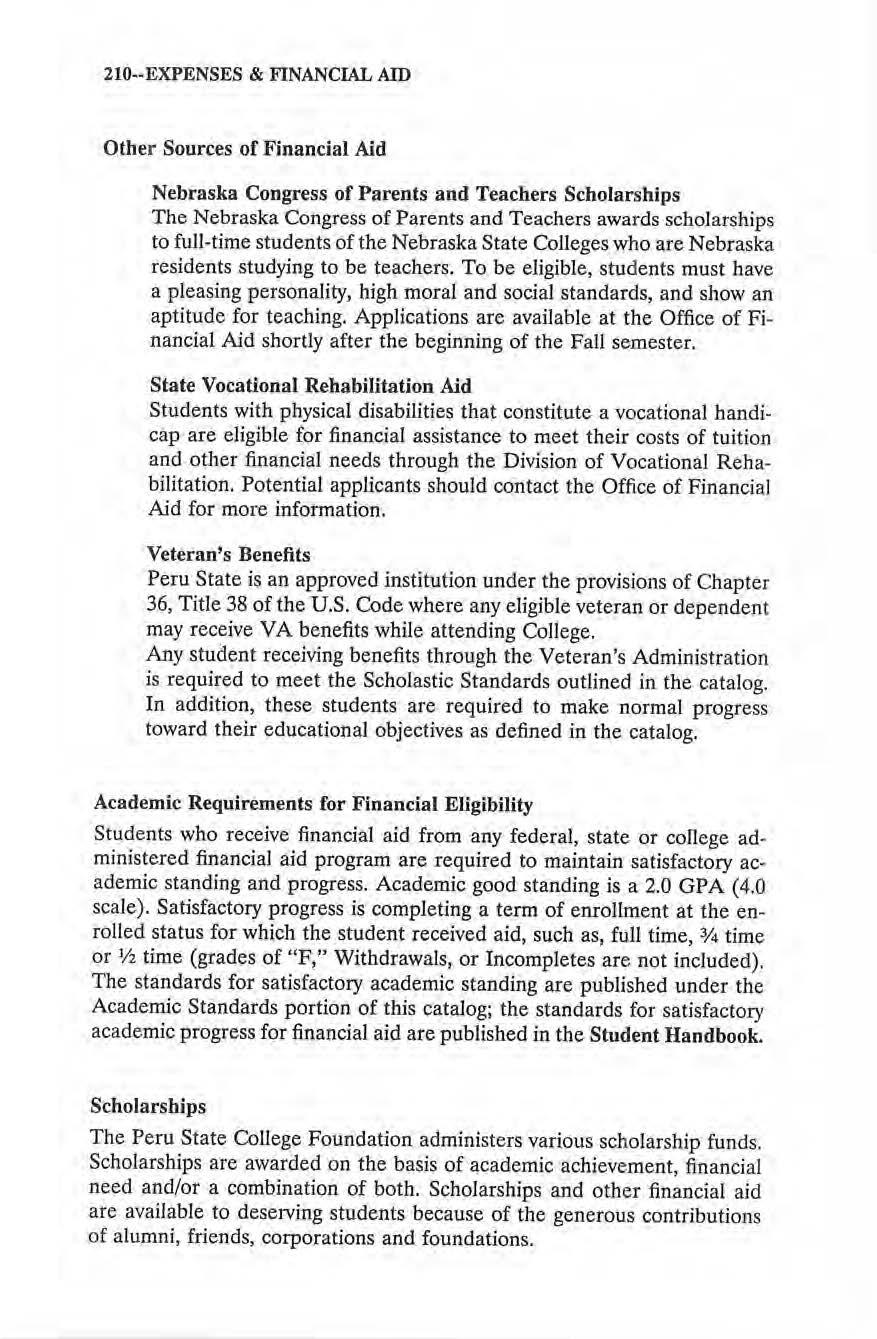
Veteran's Benefits
Peru State is an approved institution under the provisions of Chapter 36, Title 38 of the U.S. Code where any eligible veteran or dependent may receive VA benefits while attending College. Any student receiving benefits through the Veteran 's Administration is required to meet the Scholastic Standards outlined in the catalog. In addition, these students are required to make normal progress toward their educational objectives as defined in the catalog.
Academic Requirements for Financial Eligibility
Students who receive financial ai d from any federal, state or college administered financial aid program are requ ired to maintain satisfactory academic standing and progress. Academic good standing is a 2.0 GPA (4.0 scale) . Satisfactory progress is completing a term of enrollment at the enrolled status for which the student received aid, such as, full time, 3/4 time or ½ time (grades of ''F,'' Withdrawals, or Incompletes are not included). The standards for satisfactory academic standing are published under the Academic Standards portion of this catalog; the standards for satjsfactory academic progress for financial aid are published in the Student Handbook.
Scholarships
Th e Peru State College Foundation administers various scho larship funds. Scholarships are awarded on the basis of academic achievement, financial need and/or a combination of both. Scholarships and other financial aid ate available to deserving students because of the gen e rous contributions of alumni, friends, corporations and foundations.
210--EXPENSES & FINANCIAL AID
Hanson and Amber Aldrich Scholarship
This scholarship is provided to an incoming freshman from Nemah a County planning to enroll in Education at PSC. Amber Jodry Aldrich was a 1923 graduate of Peru State.
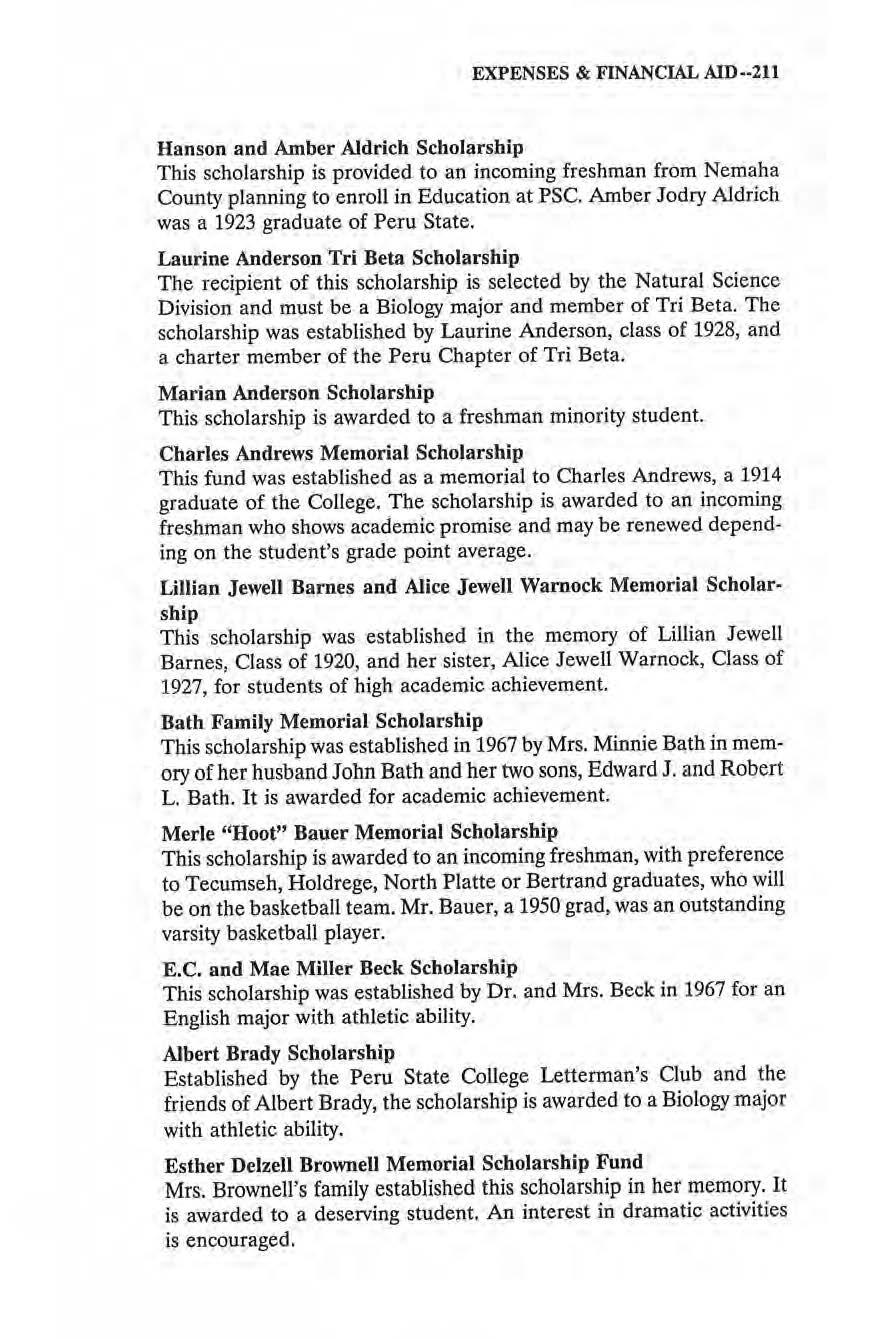
Laurine Anderson Tri Beta Scholarship
The recipient of this scholarship is selected by the Natural Science Division and must be a Biology major and m ember of Tri Beta. The scholarship was established by Laurine Anderson, class of 1928, and a charter member of the Peru Chapter of Tri Beta.
Marian Anderson Scholarship
This scholarship is awarded to a fre shman minority student.
Charles Andrews Memorial Scholarship
This fund was established as a memorial to Charles Andrews, a 1914 graduate of the College. Th e scholarship is awarded to an incoming freshman who shows academic promise and may be renewed depending on the stud e nt's grade point average.
Lillian Jewell Barnes and Alice Jewell Warnock Memoria l Scholar• ship
This scholarship was established in the memory of Lillian Jewell Barnes, Class of 1920, and her sister, Alice Jewell Warnock, Class of 1927, for students of high academic achievement.
Bath Family Memorial Scholarsh ip
This scholarship was established in 1967 by Mrs. Minnie Bath in memory of her husband John Bath and her two sons, Edward J. and Robert L. Bath. It is awarded for academic achievement.
Merle 'IJioot" Bauer Memorial Schol arship
This scholarship is awarded to an incoming freshman, with preference to Tecumseh, Holdrege, North Platte or Bertrand graduates, who will be on the basketball team. Mr. Bauer, a 1950 grad, was an outstanding varsity basketball player.
E .C. and Mae Miller Beck Scholarship
This scholarship was established by Dr and Mrs. Beck in 1967 for an English major with athlet ic abjJity.
Albert Brady Schol arship
Established by the Peru State College Letterman's Club and the friends of Albert Brady, the scholarship is awarded to a Biology major with athletic ability.
Esther Delzell Brownell Memorial Scholarship Fund
Mrs. Brownell's family established this scholarship in her memory. It is awarded to a deserving student. An interest in dramatic activit ies is encouraged.
EXPENSES & FINANCIAL AID--211
Pearl Morgan Butler Memorial Scholarship
The scholarship provides for tuition as the fund allows. It was established by Joy Elmer Morgan in the memory of his sister who attended the College in 1905.
Roy Chamberla in Scholarship
The Roy Chamberlain Scholarship was provided by Mrs. Chamberlain in memory of her husband Roy, a 1927 Alumnus of Peru State College. Any full-time male student is eligible to apply.
C.C. and Erma Wilson Choyce Scholarship
This scholarship was established by Mr. and Mrs. C.C. Choyce to recognize academic achievement , Mr. Choyce attended the College in 1919, and Mrs. Choyce graduated in 1920.
A.B. Clayburn Memorial Award
This award is granted each year to a junior in teacher education majoring in the social sciences who has displayed the qualities of outstanding citizenship, progress, and potential.
Sanford and Hattie Clements Scholarship
The family of Mr. and Mrs. Clements established this scholarship for students from southeastern Nebraska who are interested in teaching Math and Science. Mr. Clements was a member of the College faculty from 1926 to 1953.
Burdett Cowel Scholarship
This scholarship is provide d by Burdett Cowel, a 1934 graduate and outstanding athlete. It is awarded to an athlete.
Crabtree Memorial Scholarship
Dr. Eunice Crabtree established this scholarship in 1982 in the memory of her father, Dr. James Crabtree and in memory of her brother James Wilson Crabtree who died in infancy. Dr Crabtree was President of Peru State College from 1904-1910 who then went on to found the National Educational Association. The scholarship is awarded for academic achievement.
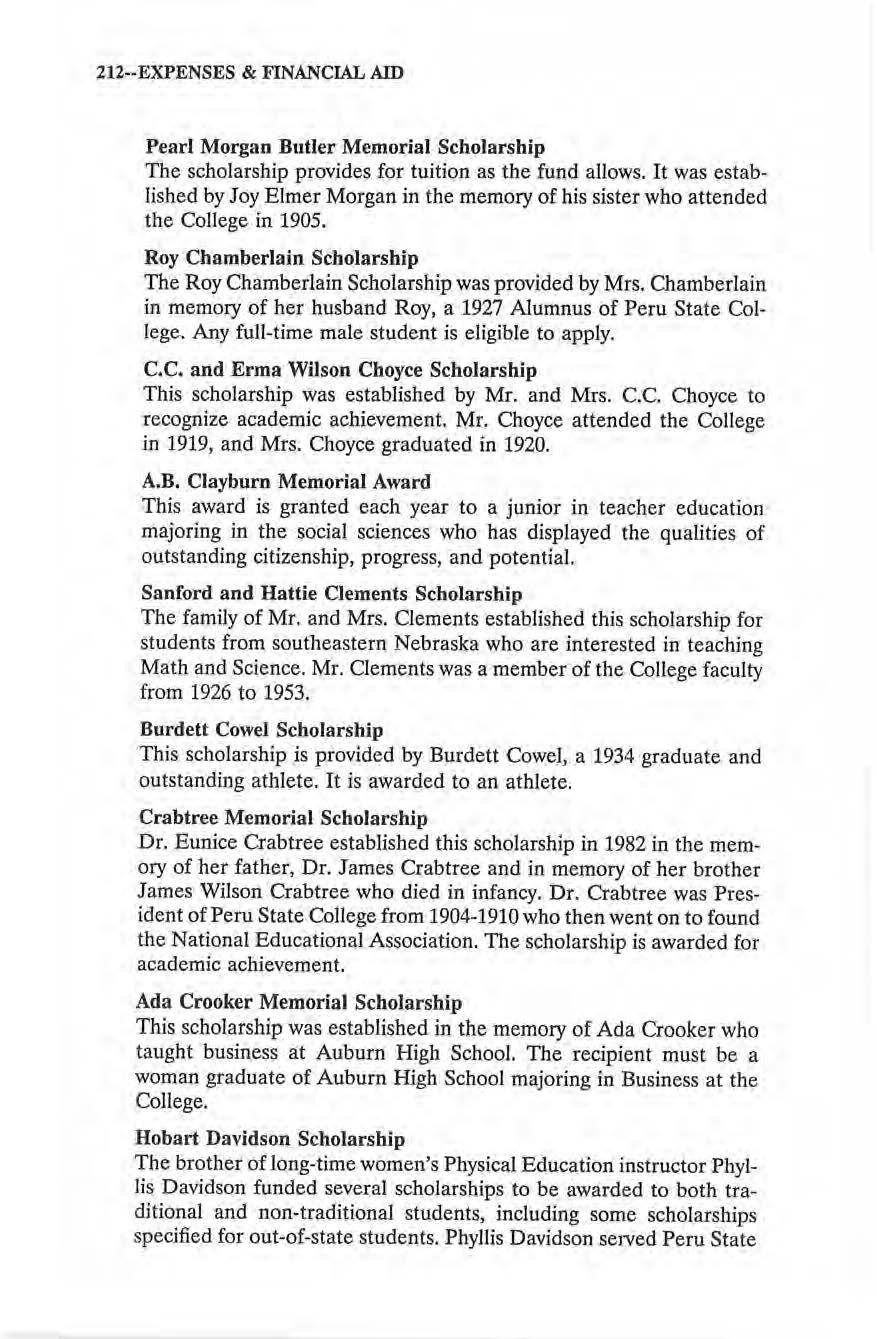
Ada Crooker Memorial Scholarship
This scholarship was established in the memory of Ada Crooker who taught business at Auburn High School. The recipient must b e a woman graduate of Auburn High School majoring in Business at the College.
Hobart Davidson Scholarship
The brother of long-time women's Physical Education instructor Phyllis Davidson funded several scholarships to be award e d to both traditional and non-traditional students, including some scholarships specified for out-of-state students. Phyllis Davidson seived Peru State
212--EXPENSES & FINANCIAL AID
Co llege from 1929 until 1957. Hobart Davidson was an attorney in Oklahoma.
Phyllis Davidson Memorial Scholarship
This scholarship was established by Dr. Lois Christensen, a 1948 alumna in th e memory of Phyllis Davidson who served Peru State from 1929 to 1957 as a professor of women's Physical Education. It is awarded to a woman majoring in Physical Education.
Helen Naeve Douglas Music Scholarship
This scholarship js provided annually by Judson Douglas in memory of his mother. The award is given to a freshman who is a talented musician majoring in music education. Preference will be given to Johnson, Otoe or Nemaha county residents.
Mac Dunning Industrial Arts Award
This is an annual cash grant given to an outstanding student in Industrial T echnology and Education.
Lura Hendricks Eichler Memorial Kindergarten Education Award
This award is presented annually to a student who bas demonstrated ability, aptitude, and interest in kindergarten education.
Loure Saltzman Firoved Scholarship
Mrs. Piroved, a 1916 graduate of the College, served many years as secretary to the college president. This scholarship, established by her children, is designed for a student majoring in business.
Elsie I. Fisher Memorial Scholarship

This scholarship was established in memory of Elsie I. Fisher, a graduate, who taught for 39 years in the Omaha school system. It is awarded to students in Art Education.
Esther Cole Franklin Memorial Scholarship
Dr. Franklin was a 1920 graduate of the College who was recognized as a distinguished alumna in 1977. This scholarship was established in her memory and is awarded to an outstanding student.
Glen and Verda F rary Scholarship
Glen and Verda Hauptman Frary were both 1927 graduates of Peru State who devoted their careers to educating youth. This scholarship is to be awarded to a sorhomore or junior Education major.
Helen Bart Fuller Scholarship
Helen Hart Fuller, who graduated from Peru State in 1919, left a sizeab le bequest to assist non-traditional students who have been out of high school at least ten years.
EXPENSES & FINANCIAL AID--213
Chr is Haddad Memorial Scholarship
Established by friends and family, this scholarship is awarded to a business student, with preference to someone from Seward County. Chris Haddad was a 1989 graduate and was an admissions counselor at Peru State College.
Jess A. Harris Mem orial Scholarship
This scholarship is provided in the memory of J ess A. Harris, Class of 1909. There are no restrictions for this scholarship.
Benjamin Harrison Memorial ScboJa\'ship
The family of Benjamin Harrison, Class of 1907, established this memorial to provide scholarships to worthy Peru State students.
Harrison Family Scholarship

This scho larsh ip provides partial tuition for a student pursuing a career in education and was established by Mrs. Benjamin Harrison of Omaha.
Arnold and Bertha Hilterman Scholarship
This scholarship was established by Charles Masopust in memory of his sister and her husband. It is presented to a deserving Peru State student.
Lena Huff Memorial Scholarship
This scholarship is awarded for scholastic excellence in the memory of Lena H uff, a 1909 graduate of the College.
Harry and Mary Hutchinson Memorial Scholarship
This scholarship is provided by Charles Masopust in memory of the parents of h is sister-in-law, Hollis. It is to be given to an outstanding sophomore or junior who has excellent potential to be an outstanding teacher. The recipient should demonstrate campus leadership and a need for financial assistance.
Dee V. and Kathleen Jarvis Industrial Education Scholarship
D ee V. and Kathleen Jarvis provide a scholarship for a student majoring in Industrial Arts Education. Mr. Jarvis, a 1948 graduate of the College, served on the staff as a professor of Industrial Education for 30 years before retiring in 1978.
Glenn D. Jenkins Memorial Scholarship
The family and friends of Glen D. Jenkins, Class of 1909, established this scholarship for students from Humboldt and Richardson County.
Victor lI. Jindra Memoria l Scholarship
This scholarship for students in Music was established from the estate of Victor H . Jindra, a professor of Music at the College from 1923 to 1961.
214--EXPENSES & FINANCIAL AID
Johnson County Bank Scholarship
This scholarship is provided annually by the Johnson County Bank. It is awarded to a student from the Johnson County area.
Pearl A. Kenton Language Arts Award
This award is presented annually to an outstanding student majoring in Language Arts.
Coretta Scott King Scholarship
These scholarships are provided annually by an anonymous donor. They are awarded to black women students.
A.V. and Wilhelmina Larson Memorial Industrial Arts Award
This award is presented to a sophomore student who demonstrates promise as a teacher in Industrial Technology and Education.
E. Albin Larson Memorial Scholarship
E. Albin Larson was a 1933 graduate of Peru State who served as Secretary of the Board of Trustees of the Nebraska State College from 1943 to 1960. This scholarship was established by bis family and friends to recognize academic achievement.
Arthur R. Majors Memorial Scholarship
This scholarshjp was established in memory of Arthur R. Majors, a 1926 graduate of Peru State, who was an active educator for 43 years. Mr. Majors was a strong supporter of the College and the Peru State College Foundation. The scholarship is awarded to a student majoring in Biology, Chemistry, or Physics.
Charles Masopust Scholarship
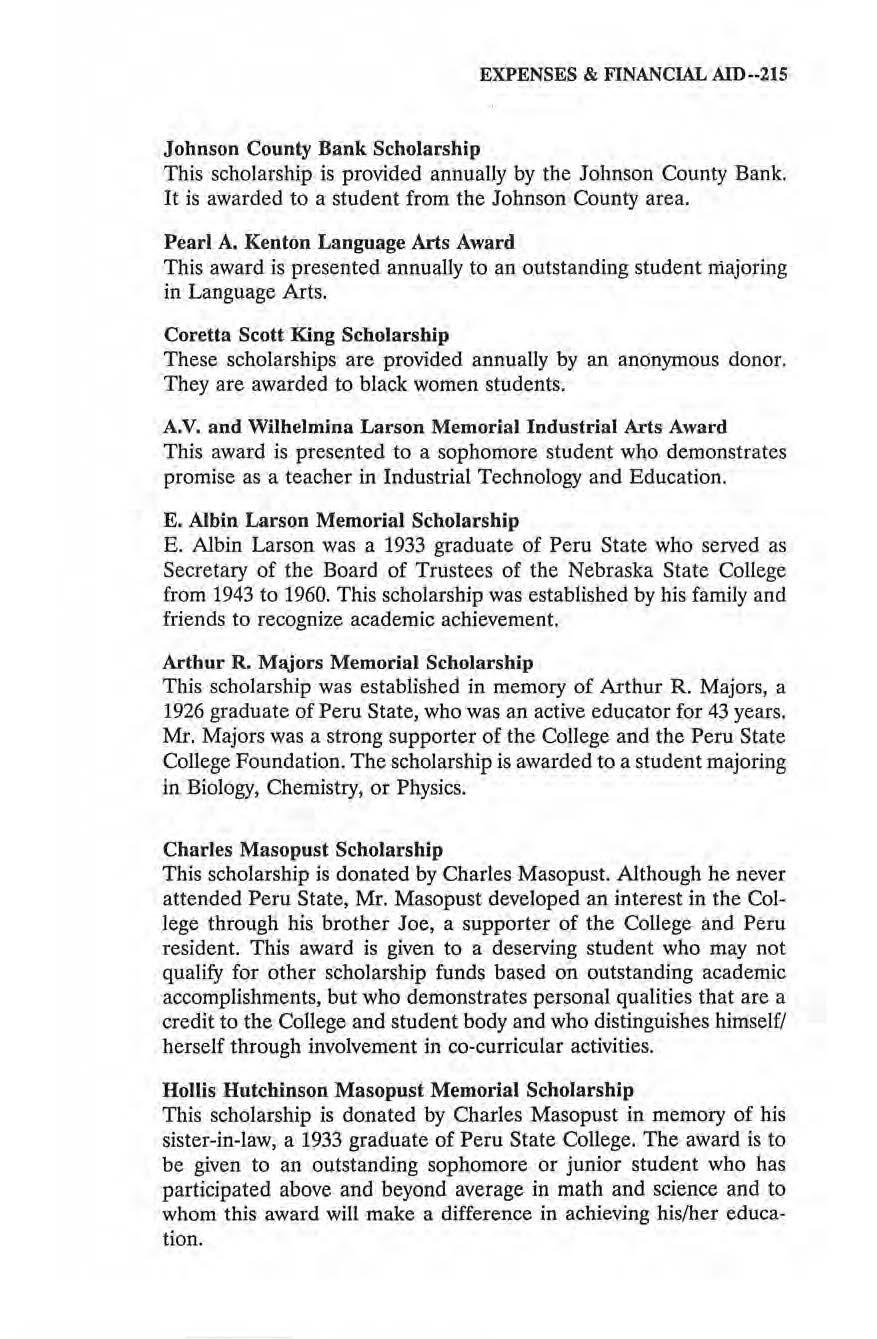
This scholarship is donated by Charles Masopust. Although he never attended Peru State, Mr. Masopust developed an interest in the College through his brother Joe, a supporter of the College and Peru resident. This award is given to a deserving student who may not qualify for other scholarship funds based on outstanding academic accomplishments, but who demonstrates personal qualities that are a credit to the College and student body and who distinguishes himself/ herself through involvement in co-curricular activities.
Hollis Hutchinson Masopust Memorial Scholarship
This scholarship is donated by Charles Masopust in memory of his sister-in-law, a 1933 graduate of Peru State College. The award is to be given to an outstanding sophomore or junior student who has participated above and beyond average in math and science and to whom this award will make a difference in achieving his/her education.
EXPENSES & FINANCIAL AID- -215
.Joe Masopust Memorial Scholarship
This scholarship is donated by Charles Masopust in memory of his brother, a friend and benefactor of Peru State College. The scholarship is to be given to the outstanding sophomore or junior student who has con t ributed the most to Peru State College in non-scholastic act ivities (not sports), has good scholastic potentia l a n d t o whom this assistance will make a difference in achieving the stu d ent's education.
John and Francis Schima Masopust Scholarship
This scholarship was donated by Charles Masopust in memory of his parents and is awarded to a student who knows the value of hard work.
L.B. and Ruth Mathews Memorial Scholarship
T his sc holastic award is made in the memory of Mr. and Mrs. L.B. Mathews. Mr. Mathews was a professor of Physics and Principal of the Training School from 1927 to 1961. Mrs. Mathews was a faculty member at t he College from 1943 to 1960.
Lyle McKercher Math Scholarship
This scholarship was estab li shed to honor Professor Lyle McKercher when he retired from Peru State College in 1990 after 30 years of teaching. It is awarded to an upper-classman majoring in math.
Dr. Joy Elmer Morgan Memorial Scholarship
This scho larship was provided by the estate of Dr. Morgan, a 1912 graduate of Peru State Coll ege a n d long time Secr etary of the National Education Association. The award is to be given to outstanding students preparing t o become teachers.
The Omaha World Herald Scholarships
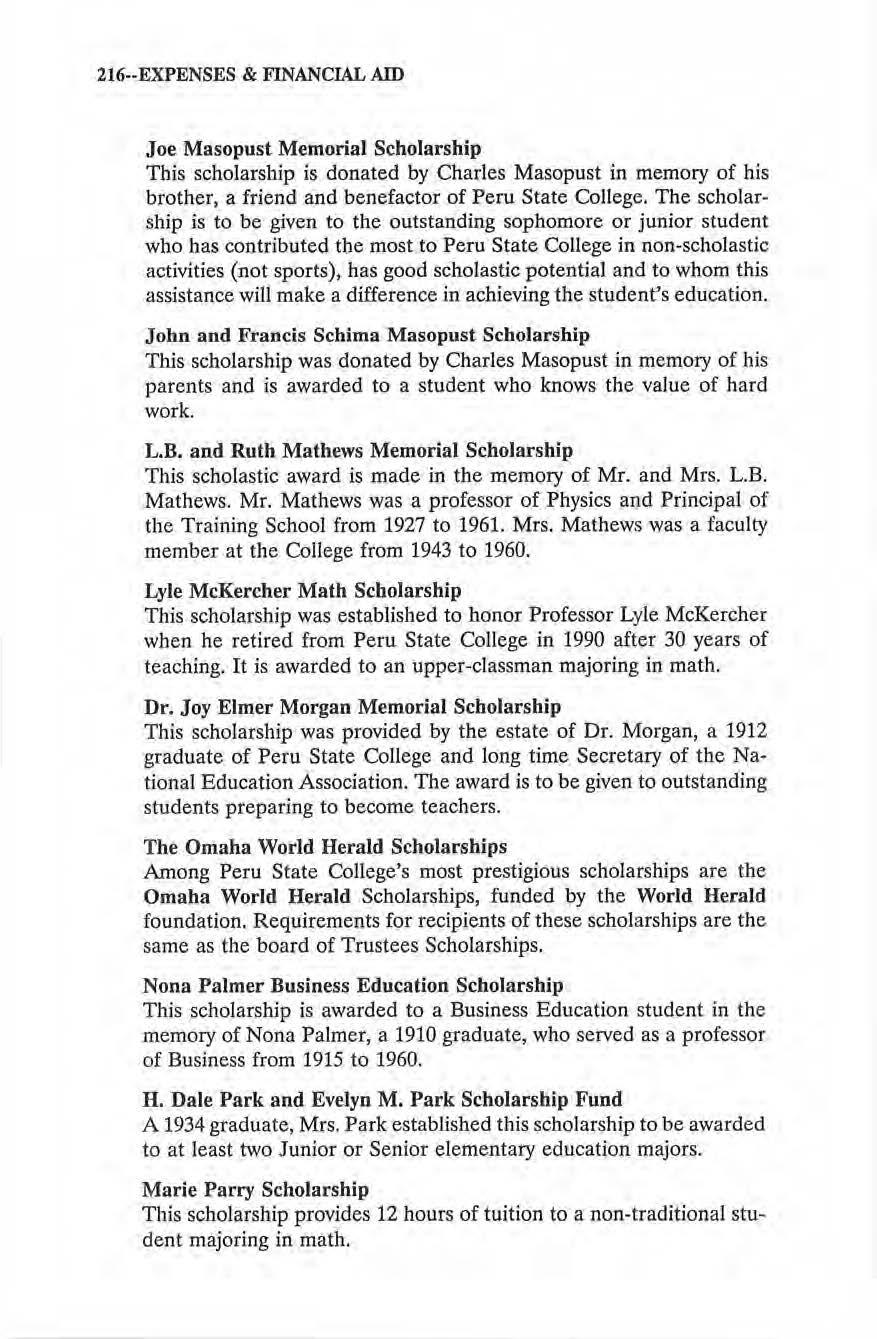
Among Peru State College's mos t prestigious scholarships are the Omaha World Herald Scholarships, funded by the World Herald foundation. Requirements for recipients of these scholarships are the same as the b oard of Trustees Scholarships .
No na Palmer Business Education Scholarship
This schola r ship is awarded to a Business E ducation student in the memory of Nona Palmer, a 1910 graduate, who served as a professor of Business from 1915 to 1960.
H. Dale Pa rk and Evelyn M . Park S cholars hip Fund
A 1934 graduate, Mrs. Park established this scholarship to be awarded to at least two Junior or Senior elementary education majors.
Marie Parry Scholarship
Th is scho lars hip provides 12 hours of tuition to a non -traditional stu~ dent majoring in math.
216--EXPENSES & FINANCIAL AID
Mr. and Mrs. W.R. Pate Scholarshi p
The family of Mr. and Mrs. W.R. Pate provide this scholarship to students of high academic achievement. Dr. Pate served as Presid e nt of the College from 1923 to 1946.
Helen E. Col e Pollard Founders Award
An award presented to the senior who has demonstrated loyalty and service to the College.
Ela ine Gerdes Pratt Schol arsh ip
A student of non-traditional age hailing from Nemaha County in Nebraska is to be the recipient of the Elaine Gerdes Pratt Scholarship. The scholarship was established by her husband, Charles Pratt, a 1967 PSC graduate, in memory of his wife, a 1964 a lumna who was extremely active in college affairs.
Ernest J. Rawson Memorial Industrial Education Scholarship
This scholarship was established by the family of Ernest J. Rawson, Class of 1938. Mr. Rawson taught I ndustrial Education in high school and college before retiring in the late 1970's.
Wayne and Adele Pente rman Reed Scholarship
This scholarship was established by Mrs. Reed in memory of her husband who served as Peru State College President in 1950. It is awarded to an upper-classman majoring in education.
Wil ey and Maxi ne Remmers Scholarship
Wiley Remmers, a 1938 graduate, and his wife, the former Maxine Aufenkamp ('39) have established this scholarship to be awarded to a freshman student in Nebraska's first legislative district. Applicants for this scholarship must take a competitive examination on government.
A.B. Ritchie Scho larship
A.B. Ritchie of Auburn, a 1927 graduate, established a scholarship to be given to a me n 's basketball player who is a Southeast Nebraska resident.
Joseph Robertson Fo reign S tudent Scholarship

This scholarship is provided by Jose ph Robertson , a 1928 grad, for a foreign student.
Clarence L. and M ildre d R usseJl Memorja l Scholarsh ip
This scholarship was established in memory of the Russells. Mr. Russell was a 1917 graduate of Peru State, and the Russells were long time supporters of the College. The recipient of the scholarship is to be in the Industrial Technology and Education program and is select e d by the faculty of the department.
EXPENSES & FINANCIAL AID--217
Ruth M. Russell Scholarship Fund
This fund was created by family and friends of Mrs. Russell, a long time Peru resident, in honor of her 100th birthday. Students eligible for this scholarship sh all have graduated in the upp e r one-third of their high scho ol class. The scholarship shall alternate each year between students studying in the Axts/Humanities and Science.
Vince Sabatinelli Memorial Scholarship
This scholarship is awarded to a deserving athlete in the memory of Vincent Sabatinelli, a former member of the Peru State football team, who gave his life in the service of his country in Vietnam.
George Sc:hottenhamel Scholarship
This scholarship is in memory of George Schottenhamel, Professor of SociaJ Sciences at the College from 1957 to 1987 I t is awarded to a student studying History, Social Science or Fine Arts.
Ken Sims Indu strial Arts Scholarship
This memorial scholarship was estab li shed by Mr. Sims' wife, Linda. Both graduated from Peru State College in 1964. It is awarded to a student majoring in Industrial Technology.
Charles Fred Speck and Lillian Mae Smith Scholarship
C.F. Speck endowed this scholarship in memory of his aunt, Lilli an Mae Smith, an 1894 graduate of Peru State a n d long-time educator. The recipient is to be a woman majoring in Elementary Educa ti on.
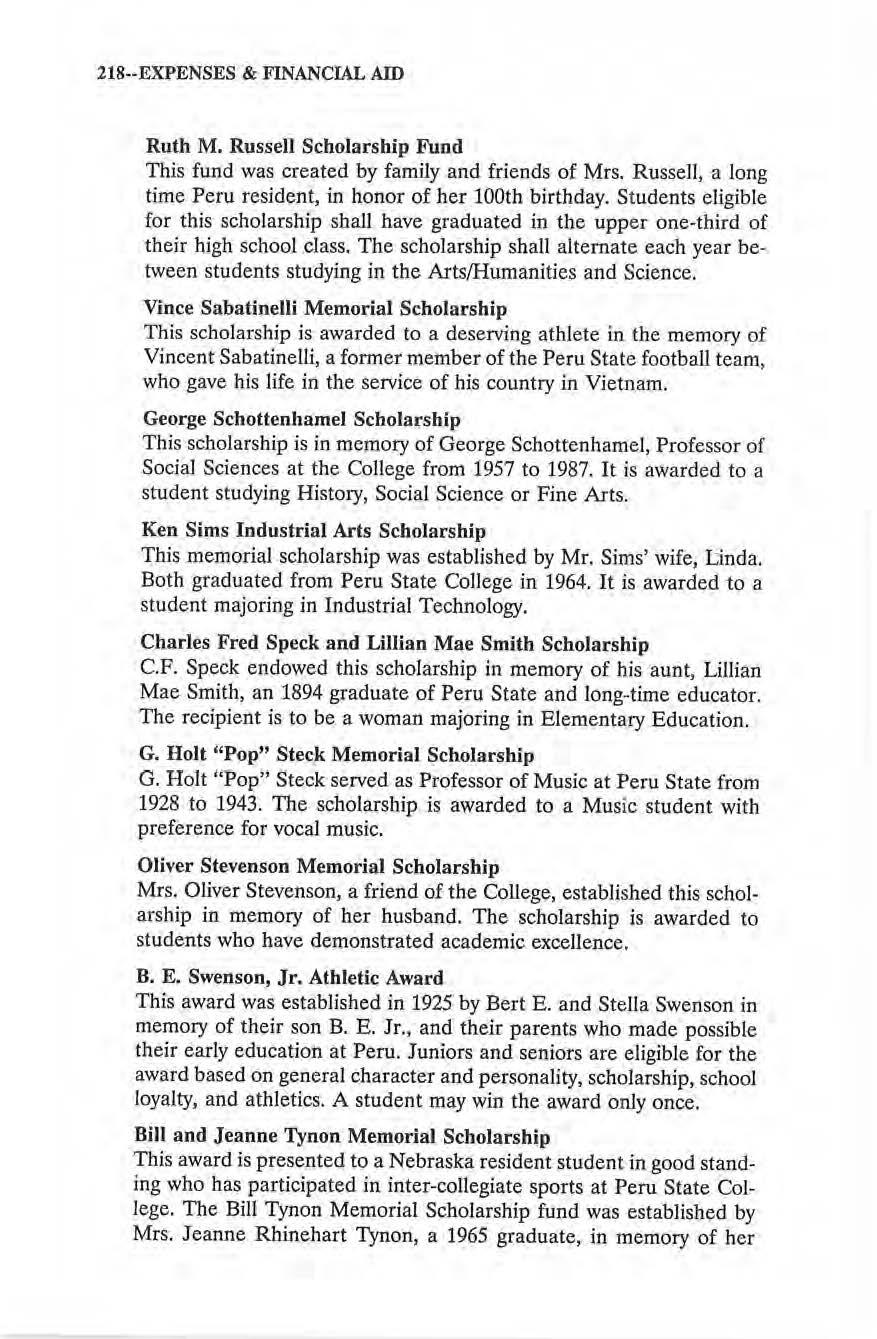
G. Holt "Pop" Steck Memoria l Scholarship
G. Holt 1 'l>op" Steck served as Professor of Music at Peru State from 1928 to 1943. Th e scho larship is awarded to a Music student with preference for vocaJ music.
Oliver Stevenson Memorial Scholarship
Mrs. Oliver Stevenson, a friend of the College, established this scholarship in memory of her husband. T he scholarship is awarded to students who have demonstrated academic excellence.
B. E. Swenson, Jr. Athletic Award
This award was established in 1'925 by Bert E. and Stella Swenson in memory of their son B. E. Jr. , and their parents who made possible their early educatioh at Peru. Juniors a n d seniors are eligible for the award based on gene ral character and personality, scholarship, schooJ loyalty, and athletics. A student may win the award only once.
Bill a nd Jeann e Tynon Memorial Sch ola rship
This award is presented to a Nebraska resident student in good standing who has participated in inter-collegiate sports at P eru State College. The Bill Tynon Memorial SchoJarship fund was established by M r s Jeanne Rhinehart Tynon, a 1965 graduate, in memory of her
218--EXPENSES & FINANCIAL AID
husband, a 1964 graduate of Peru State, who was active in athletics at the co llege. Jeanne Tynon passed away in 1986 and the name of the scholarship has been changed in memory of Jeanne also.
Maude P helps Vacek Scholarship
This scholarship was established by her children and grandchildren. It is awarded to a full-time student living in Pawnee City or Pawnee County who will be pursuing a degree in teacher education.
Evan Va n Za nt Teacher Ed uca t ion Sch olars h ip
The recipient of this scholarship is selected by the Education Division for academic excellence, dedicat ion to the teaching profession, and an aptitude for teachin g. It was established in the memory of Evan Van Zant, Professor of Education from 1961 to 1980.
Joh n and Da isy Clark Wear Scholarship
Established by the family and friends of Dr. John Wear, Class of 1914, this scholarship assists a pre-medical or science student at the College. A copy of Dr. Wears book "My Life and My Work" is in the college library.
Bere niece McHiron Weigand Scholarship
T he recipie nt of this scholarship is to be a woman majoring in education at Peru State. Established by Bereniece Weigand Woodworth, this scholarship is in memory of her mother, a 1906 Peru State graduate. Beren iece M. Weigand was the wife of Charles Weigand, for whom another scholarship has been established.
Cha rl es Weigand Memorial Scholars hip
This scholarship was established in 1956 by the Class of 1906 in memory of Charles Weigand, a member of the class. The scholarship is awarded to a rising senior.
Lisa Jo Weis Scholarship
The Lisa Jo Weis Scholarship is awarded to a freshman volleyball player who is not recruited, who has not been recruited for any other sport, and who would be primarily a setter.
Wheeler La nguage Arts Sch olarship
Mr. and Mrs. D e nnis Wheeler provide a scholarship that is awarded to a L anguage Arts major at the College.
The Al Wheel er Scholars hi p Funds for this scholarship have been provided by Fran Wh ee ler Kendrick, their son Dr. Al Whee ler, J r ., and friends of the long-time coach and athletic administrator who served Peru State from 1938 to 1965. The recipient is to be a male majoring in Phys ical Education who participates in intercollegiate athletics, with preference given to a football player.

EXPENSES & FlNANCIAL AID--219
Harold E. Willey Memorial Scholarship

Mr. Willey, who was a farmer near Mead, is memorialized in this endowment. Scholarships are awarded to students who are children of farm or ranch families or their employees, a nd who are of sop homore rank or above, with a B average.
Ze lma R. Wonderl y Award
This annual award is presented to the outstanding second grade student teacher.
William Henry Wortman Memorial Scholarship
This scholarship is awarded to minority students with a preference being given to Native Americans. It was established by the family and fr iends of William Henry Wortman.
Peru State College Foundation
The Peru State College Foundation was organized in June, 1955 and incorporated as a non-profit corporation for educational and charitable purposes in May' 1962.
220--EXPENSES & FINANCIAL AID
COLLEGE AND PUBLIC SERVICES
Economic Development
Peru State College provides economic development services to southeast Nebraska. A full-time economic development director assists area communities in their economic development efforts. Workshops a nd sem in ars are conducted regula rly to ass ure the south east Nebraska communities have the most effective economic development leaders in the state The College li brary has an extensive collection of commu ni ty d evelopment literature available to citizens in the area. The College offers a degree program in economic development, the first such program to be accred ited by the American Economic D evelopment Council.

Nebraska Busin ess Development Center
The Nebraska Business Devel opment Center on the College campus p rovides free consu lting to businesses or persons wanting to start a business. Clients may be assisted with management, financial projections, marketing, writing busi ness plans, selecting computers, or other concerns. The NBDC is funded by the Small Business Administration, the State of Nebraska, and the Co llege.
Peru Alumni Association
All graduates of P e ru Stat e Coll ege, as well as forme r students, faculty and staff who request it, are con sidered members of t he P eru State College Alumni Association. There are no annual dues or fees. Active chapters include Lincoln (organized in 1955); Omaha (organ ized in 1955); the Rocky Mountain chapter (Colorado, Wyoming, western Kansas, western Nebraska, organized in 1957); Northern California (organized in 1958); and the East Coast chapter (Maine to North Carolina along the Atlant ic seaboard; organized in 1988). The inactive chapter is the T housand Oaks chapter (southeastern Nebraska; organized in 1973).
PSC alumni activities are based in the Alumni/Foundation Building, located on the south east come r of campus. Current m a iling lists of graduates, many former students, and some former facu lty are maintained there, as are collections of yearbooks, photos, publications and other memorabilia.
The Pem Stater, the Coll ege's official a lumni newsletter, is di stributed at no charge to alumni and others on the current mailing list. The Coll ege encourages submission of items for incl usion in this publication.
COLLEGE AND PUBLIC SERVICES--221
Peru State Co ll ege Library and Med ia Center
The Peru State College fully automated library contains more than 100,000 volumes and subscribes to nearly 800 periodicals. Special collections include the original manuscripts of authors Marion Marsh Brown, E.P. Conkle, Ruth Crone, and Louise Mears. The library assists patrons through its extensive inter-library loan services and provides typewriters and microcomputers for student use.
The Media Center houses a large variety of audio-visual equipment and materials including an abundant supply of films, filmstrips, slides, videotapes, records, and computer programs. A computer and wordproccessor are also available for student use. The Center's satellite dish and television studio provide a wide range of educational and recreational opportunities for students and community, Students may review reports from accrediting agencies in the Peru State College Library.
Regional Services: ABE/ESL/GED
Peru State offers services for adults who wish to improve reading, writi ng, and math skills, or to learn English-as-a-Second Language, and/or to earn a General Educational Development (GED) certificate. The College coordinates individualized, tutorial p r ograms through several regional sites where services are free to the students. Also, Peru State is the official regional GED examination center. A fee is charged for the GED examination and certificate.

Sma ll Business Institute
Through the Small Business Institute progr am, Coll ege students provide management analysis to businesses. There is no charge to the participating businesses. This program allows students the opportunity to apply textbook theories to practical situations.
222--COLLEGE AND PUBLIC SERVICES
Board of Trustees Of The Nebraska State Colleges

Keith L. Blackledge , North Platte
Peter H. Claussen, Vkc Chairperson (1992-93) Grand Island
Gretchen R. llirsc.hbach , Soutb Sioux City
Wyn n S. Nuckholls, Chairperson (1992-93) Fairbury
Wendell L. Quist Omaha
Kath i J. Swanson Scottsbluff
J9 e E. Lut,jehorms, State Commissioner of Education Lincoln
Emeriti
Mary Clarke (1951-1964)
Alma Ash ley (1946-1970)
Frieda D. Rowoldt (1952-1970)
Harold Johnson (1951-1972)
Lucy Hovey (1967-1972)
Junnitn Bradley (1956-1976)
Dee Jarvis (1948-1978)
Mary Ruth Wilson (1966-1982)
Gilbert Wilson (1957-1983)
Ervin R. Pitts (1964-1982)
Wreathes Hicks (1968-1985)
Eve.rett Browning (1969-1986)
Faye Brandt (1959-1985)
Lyle McKercher (1959-1990)
Esther Divney (1975-1990)
Scott Williams (1966-1990)
Faculty
Professor Emeritus of Education
Professor Emeritus of Elementary Education
Professor Emeriws of Business Education
Professor Emeritus of Education
Professor Emeritus of Home Economics
Professor Emerillls of Education
Professor Emeritus of btdustnal Arts
Professor Emeritus of English
Professor Emeritus of Music
Professor Emeritus of Health and Physical Education
Professor Emeritus of English
Professor Emerit11S of Journalism
Professor Emeritus of Library Science
Professor Emeritus of Mathematics
Professor Emeritus of Education
Professor Emerirus of Geography
(Date indicates year in which i;ervice at Peru Sraie oegan.)
Kenneth Anderson (1984) Associate Professor of Art
B G.S., B.F.A,, University fo Nebraska-Omaha; M.F.A., University of Nebraska-Lincoln
C lyde Barrett (1965) Professor of English
B.S., M.S., Peru State Teachers College; Ed.D., University of Arkansas-Fayetteville
Russell Beldin (1970) Assistant Professor of Business
B.S., Dakota State College; M.S., Mankato State College
Robert Burns (1991) Presidem
B.A, Kentucky Southern College; M.S., University of Florida; Ph.D., University of Louisville
Steven Butler (1991) Vice President for Student Affairs
B.A, M.A., Humboldt State University; Ed.D., University of Southern California
James Callender (199 1) Assistant Professor of Physical Education
B.B., M.B.A., Western Illinois University
Anthony Citrin (1986) Associate Professor of Education
B.A., M.A., University of Kentucky; Ed.D., Western Michigan University
Daniel Cox (1988) Assis/an/ Professor of Education
B.A., Tarkio College; M.A., University of Nebraska-Omaha; Ph.D., University of NebraskaLin coln
Wayne Davidson (1982) Associate Professor of Physical Education
B.A., Anderson College; M.A ., Kansas State College-Emporia; Ed.D., University of Missouri-Columbia
Spencer Davis (1983) Associate Professor of History
B.A., Brown University; M.A., University of Nebraska-Lincoln; Ph.D., University of Toronto
Roya l Eckert (1975) Professor of Speech/Theatre
B.A., University of Minnesota; M .A., Ph.D., University of Nebraska-Lincol n
PERSONNEL--223
Thomas Ediger (1979) Professor of Mrisic Director of Choral Activilies
A.B., University of Nebraska-Lincoln; M.A.. D.A., Un iversity of Norlhem Colorado
David Edris (1974) Pro/e.:rsor of J,J,,.ric Chairperson of Huma nities
B.M.A., M.M., Un ive rsity of Tulsa; D.M,A., University of Mis~ouri-Kansas City
Na n cy Emer son (1977) Instructor of Social Work/Sociology
B.S., M.S., Kansas S tate College-Pittsburg
Robley Eva ns (1978) Assistant Professor of lndustrilll Arts
B.S. , Western Kentucky University; M.S., Indiana Univcrsfty
Mork Fegan (1988) Assistant ProfeJSOr of Computer Science
B.A., Morningside College; M.S., Kearney State
F ra nk Ferrante (1991) Director of Developmental Stridies
B.S., University of Nebraska-Omaha; M.A., Appalachian State University
Victor Ferre (1978) Professor of Education
8.A., Weber State Coll ege; M.S., Utah Sta te University; Ed.D., New Mexico Stat e University
J ohn Gabriel (1991)
B.S., M .A., University of Northern Iowa Instructor of Physical Education
J ohn G ibbs (1981) Tnstnictor of Physical Education
B.S., Wllliam Jewell College; M.S., Central Missouri State University
Charles Haddad (1990) I11structor of Computer Science
B.A., American University in Beruit, Lebanon; M.S , Moorhead S tate Univers ity
Jobr, Ha hn (1968) Professor of Political Science
LL.B., Chuo University; M.A., University of Minnesota; Ph.D. , University of Cincinnati
Jack Hamilton (1972) Assis/ant Professor of Business
B.S., M.S., Kansas State College-Pittsburg
Jerrold Hanson (1988) Professor of Education
B.S., M.A., University of Minnesota; Ed .D., University of Colorado
Charles Harper (1978) Professor of Speeclt/Theatre
B.A., Tarkio College; M.A., Ph.D., University of Nebraska -Lincoln

Pau l H inrichs (1990) /11.f/ructor of Science and Technology
B.S , Concordia College; M.S., University of Nebraska-Lincoln
D a n Holtz (1987) Associate Professor of English
B.A., Kearney State College; M,S., Ph.D., University of Ncbr.iska-Llncoln
Jack Hytrek (1979) Professor of Education
B.S., M S., Chadron State College; Ed.D., University of Northern Colorado
Don J a cobs (1980) Associate Professor of Business
B.S., University of Chattanooga; M.A., Texas Christ ian University; P h .D. , University of Nebraska-Lincoln
Da ve J ensen (1987) Instructor of Physical Education
B.S., University of Northern Colorado; M.S ., Colorado State Un iversity
Dan J ohn son (1991) Instructor of Physical Educntfon
B.S. , M.A., North ern State College-Aberdeen
Paul Kruse (1969) Assistant Professor of Library Science Director of Leaming Resources
B.S., Fort Hayes State Coll ege ; M.S.L.S., Emporia State College
Robert Lewell en (1972) Assistant ProfeJsor oj Business
B.S., M.S., Northwest Missouri State University
Daryl Long (1967) Professor of Science
B.S., Iowa Sta te University; M.S ., Ph.D., University of Nebraska-Lincoln
Joel Lundak (1989) Assistant Professor of PJychology
B.A., M.A., Ph.D , University of Nebraska-Lincoln
Stanley McCaslin (1971) Assistant Professor of Computer Science
B.A, M cCales ter College; M.S., California Institute of Technology; M.S., U niversity of Nebraska-Lincoln
Anthony McCrann (1988) Associate Professor of English
B.A. , Villanova University; M.A., D.A., Ph.D., University of Oregon
Mo nte Meadows (1991) Instructor of Physical Education
B.A., Kearney State College; M.A., University of Nebraska-Kearney
224•-PERSONNEL
Kermit Mowbray (1989) Associate Professor of Business
A.B., .Bethany College; M.A., Ph.D., University of Kansas
Virgil N ic h ols (1992) Assistant Professor of Education
B.A., U nive rsity of West Florida; M.S,, lowa State University; Ph.D., University of Sou the rn Mississippi
Ca rol P eppas (1985) Associate Professor of Naluml Science
B.A., Florida Stale University; M.S., Ph.D ., Universily of Illinoi s-U rbana
La rry Peppas (1979) Professor of Biology
B.S., Hiram Scott College; M.S., University of Wyoming; PhD., University of lllino is• Urbana
David Pippert (1977) Professor of Natural Sc ience Clwilperson of Science and Technology
B.A., Augusiana College; M.A ., State University of Iowa; Ph.D., University of Wyoming
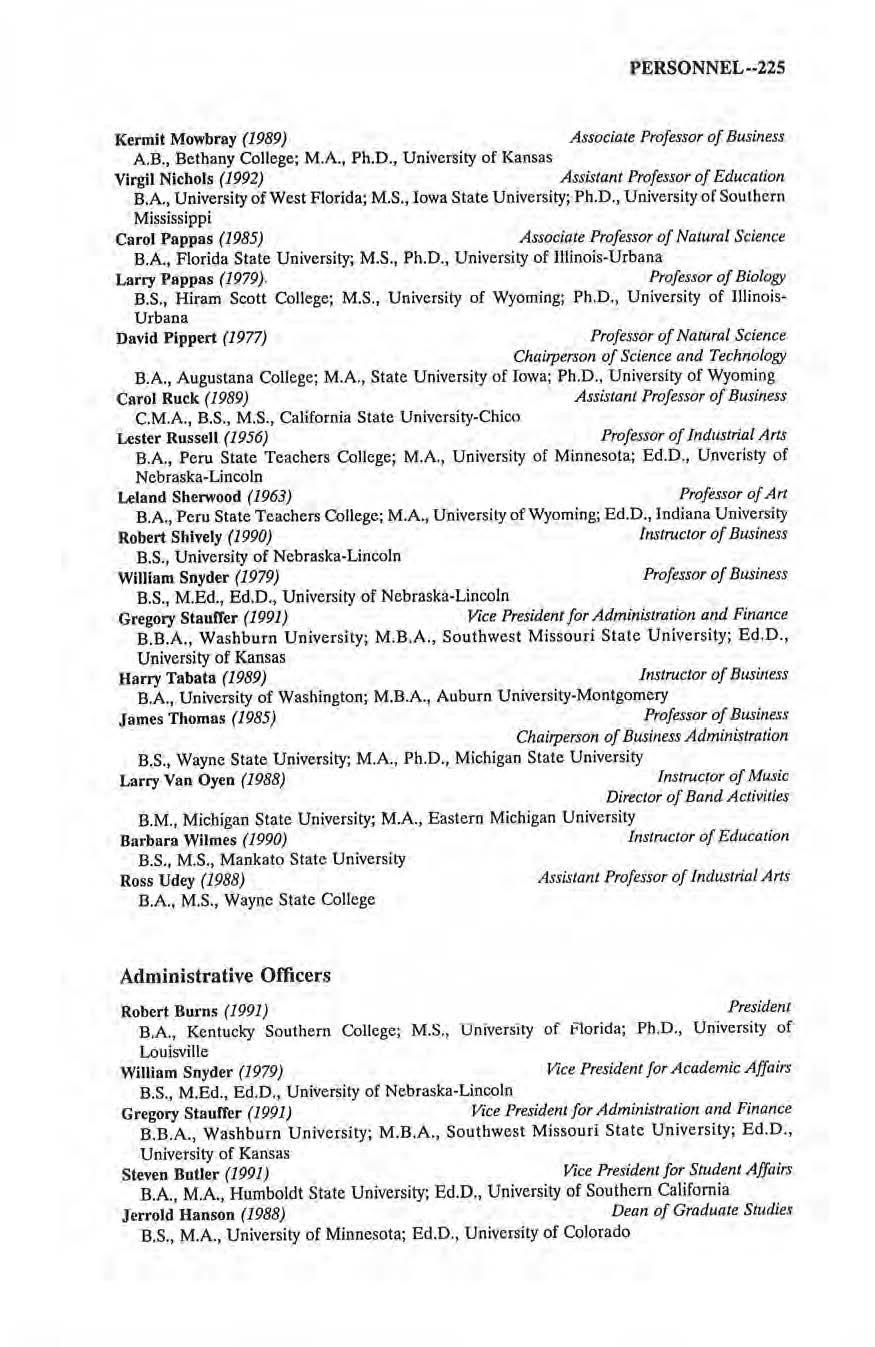
Caro l Ruck (1989) Assistant Professor of Business
C.M.A., B.S., M.S., California Stale University-Chico
Lester Russell (1956) Professor of Industrial Arts
B.A., Peru State Te achers College; M.A., University of Minnesota; Ed.D., Unvcristy of Nebr11ska-Lincoln
LeJa nd S herwo od ( 1963) Professor ofA rt
B.A., Peru State Teachers College; M.A., University of Wyoming; Ed.D., Indiana University
Robert Shively (1990) lnstnictor of Business
B.S., University of Nebraska-Lincoln
William Sn yder (1979) Professor of Business
B.S., M.Ed., Ed ,D., Un iversity of Nebraska-Lincoln
Gregory StaufTer ( 1991) Vice President for Administration and Finance
B.B.A., Washburn University; M ;B ,A., Sou thwest Missouri State Unive rs ity ; Ed ,D., University of Kansas
Harry Tabata (1989) instructor of Business
B.A., University of Washi'ngton; M.B.A., Auburn Unive rsi ty -Montgomery
James Thomas (1985) Professor of Busines t Chairperson of Business Administration
Larry Van Oyen (1988)
B S., Wayne State University; M.A., Ph D., Michigan State University Instruc tor of Music Director of Band AcJivt'ties
B.M., Michigan State University; M.A. , Eastern Michigan University
Barbara Wihne~ (1990) Instn4Ctor of Education
B.S., M S., Mankato State University
Ross U d ey (1988)
D.A., M.S., Wayne State College
Admin is trati ve Officers
Assistanl Professor of industrial Arts
Robert Burns (1991) President
B,A., Kentucky Southern College; M.S. , lJ niverslty of Florida ; Ph D., University of Louisville
William Sn yder (1979)
B.S., M.Ed., Ed.D ,, University of Nebraska-Lincol.n
Gregory StaufTcr (1991)
Vice President for Academic Affairs
Vice President for Administratio11 and Finance
B.B.A., Washburn University; M.B.A., Southwest Missouri State University; Ed.D ., University of Kansas
Steven Buller (1991)
Vice President for Student Affnirs
B.A., M.A., Humboldt State University; Ed.D,. University of Southern California
Jerrold Hanson (1988) Dean of Gmdunte Studie.f
B.S., M.A., University of Minnesota; Ed.D., University of Colorado
PERSONNEL--225
Professional Staff
Debra Adams (1985)
B.A., Loras College
Kevin Cosgrove (1989)
B.S., P e ru .State Coll ege
Pam Cosgrove (1987)
B.S., Peru State Col lege
Ron Fabry (1986)
Frank Ferrante (1991)
Business Office Manager
Dave Angli n (1991) Bookstore Manag er
Computer Center Manager
Director of Admissions and School Relations
Direct or of Physical Pla nt Direc tor of Development11 / Studies in the Communication Skills Center
B.S. , Univ ersity of Nebraska-UNO; M.A., Appalachian State University
Dwight Garman (1980) Director of Financial Aid
B.A., C reighton Univers ity; M.A., University of Nebraska-Linco ln
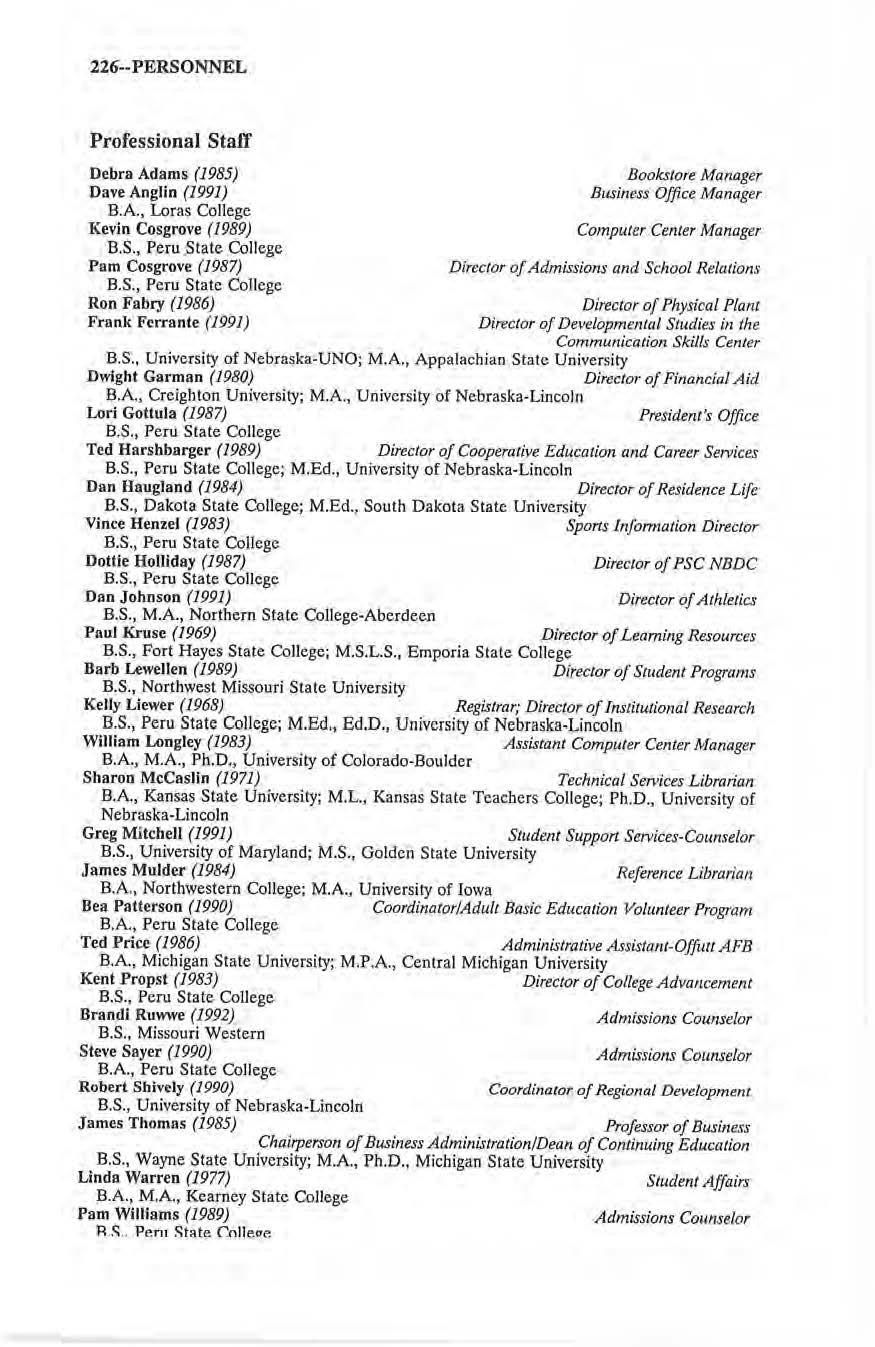
Lori Gottula (1987)
B.S., P eru State Co ll ege President 's Office
Ted Harshbarger (1989) Director of Cooperative Education and Career Services
B.S., Peru State College; M.Ed., University of Nebraska-Lincoln
Dan Haugland (1984)
Director ofR esidence Life
B.S., Dakota State College; M .Ed , South Dakota State Unive rs i ty
V ince Henzel (1983) Sports Information Director
B.S. , Peru S tate College
Dottie Holliday (1987)
B.S., Peru State College
Dan John son (1991)
B.S. , M.A , Northern State College-Aberdeen
Director of PSC NBDC Director ofAthletics
Paul Kruse (1969) Director ofLeaming Resources
B.S., Fort Hayes St ate College; M.S.L.S ., Emporia State College
Barb Lewellen ( 1989) Director of Student Progr11ms
B.S., Northwest Missouri State University
Kelly Li ewer ( 1968) Registra r; Direc tor of Institutional Research
B.S., Peru State College; M.Ed,, Ed.D., University of Nebraska-1,..inco l n
William Longley (1983) Assistant Computer Center Manager
B.A., M.A., Ph.D., University of Colorado -Bo ulder
S haron McCaslin (1971) Technical Services Librarian
B.A., Kansas State Unive rsity; M.L., Kansas State Teachers College; Ph D., U nivers ity of Nebraska-Lincoln
Greg Mitchell (1991) Student Support StrrYices-Cou nselar
B.S., University of Maryland; M.S., Golden State University
James Mulder (1984) Reference Librarla11
B.A ,, Northwestern College; M.A., U n ivers i ty of Iowa
Beu Patterson (1990) Coordinator/Adult Basic Education Vo lunteer Program
B,A., Peru State College
Ted Price (1986) Administrative Assistant-Offutt AFB
B.A., Michigan State University; M .P ,A., Cen t ral Michigan Univers ity
Kent Propst (1983) Director of College Advancement
B.S., Peru State Coll ege
Brandi Ruwwe (1992)
B.S., Missou ri W es tern
Steve Sayer (1990)
B.A., P eru State College
Robert Sh ive ly (1990)
B.S., U niver s ity of Nebraska-Lincoln
Admissions Counselor
Admissio11s Co1111selor Coordinator of Regional Devi!lopmenr
J ames T h omns (1985) Professor of Business Chairperson of Business Administration/Dean of Cominuing Education
B.S., Wayne State University; M.A., Ph.D., Michigan S tate University
Linda Warren (1977)
B.A., M ,A., Kearney State Co llege
Pam Williams (1989)
fl ,<; P ern SIHle <:nlleae
Student Affairs
Admissions Co,11rs1J/ar
226--PERSONNEL
INDEX
-A-
Academio Appeals
Academic Dishonesty .
Academic Honors List
Academic Load
Academic: Probation
Academic Progress
Academic Progress Sheet

Academic Standards .
Academic Suspension . .
Accreditations • Administrative Officers
Admission to the Olllcge
Admission
Teacher Education
Student Teaching
Transfer Student
Non-High School Graduates
International Students ..
Non-Accredited Colleges
Readmission
Adult Basic Ec;lucation .
Art, Olurse Descriptions
Attendance,
Class Audit
Course Descriptions
of Trustees
Business, Course Descriptions Business, Division of -CChange in Major Change in Registration Chemistry, Course Descriptions . Classification of Studcnti; College, Course Descriptions Computer Science, Course Descriptions Conduct, Student Cooperative Education Correspondence Courses Counseling Services Credits Transfer . . . . . • Armed Services Determining Credit By Examination • . For High School Students -DDcgree Regulations . Degree Requirements . Degrees Developmental Studies Dining Services -EEconomics, Course Descriptions Economic Development Education & Psychology, Division of &lucation, Course Descriptions Emeriti Faculty • EngLish, Course Descriptions .186 . 185 186 .181 .184 . 183 181 • 184 .185 5 225 175 38 39 .175 .175 .175 176 176 222 88 .182 180 144 .223 23 16 .182 .182 147 . 181 90 .148 , 201 . 11, 179 JO, 180 191 177 .177 .177 .178 179 JO , 7 6 13 .191 • 33 221 . 37 . 53 223 91 lNDEX 227 Examinations Institutional Standardized Extension Programs • -FFacul ty . • . . . . . . . , . Federally-Funded Programs Fees Computer Lab , . Credential File Replacement J.D Facllitics Fee Student Activity Fee . , Health Center .. . . Td entffication Card Motor Vehicle Registration Admission Late Registration Administration of CLEP test Pdvate Music Lessons Graduation Degree.~ Transcripts. Course Final Exams Financial Aid Applying for Other Sources of Academic requirements o r Food Service Rates -G· GEO General Studie s, Course Descriptions . General Studies Program , Objectives . . . . . . . . . . . Courses Geography, Course Descriptions Geology, Course Descriptions Goals of the College Grading System . . Graduate Programs Graduation Regulations Honors -11Hcnlth Service. , , History, Course Descriptions History of the College. Honors Program Housing Contracts Housing Rates . . . . . Humanities, Division of -1locomplctc Coursework • Independent Study !TE, Cou rsc Desori ptlons Institutionally-Funded Programs Internships . . , . . . . . Introduction to Peru State . . . 178 178 14 .223 201 204 . 204 .204 204 .204 204 204 .205 , 204 205 , 204 . 205 .204 204 .205 .204 .185 .207 .210 .210 206 .222 .152 12 11 12 96 154 4 183 , 15 .186 • 187 .194 98 . . 2 . 172 206 .206 . 72 180 , 10, 179 155 208 .190 2
.n. Biological Sciences,
Board
. . • . . . .

-JJoumalism, Course Descriptions 101 -LLibrary Living Accommodations M. Mathematics, Course Descriptions Medin Cen ter , Memberships , Mission of the College Music, Course Descriptions -NNon-Academic Policies Dfscrfmination , AIDS 197 4 Privacy Act Nonna! Progress , Non-Resident Program NBDC , .Q. Offutt Air force Base Organizations, Student Student Governme.nt Educational & Social Religious Music Athletic Honorary Publications Orientation p Parking Pre-Professional P rograms Pre-Legal Study •. Personnel Peru Achievement Poundntion Peru Alumni Association Peru Stater • , Philosophy, Course Descriptions Pol. Science, Course Descriptions 222 192 . 164 .222 ' 5 ' 3 .102 188 .188 189 8 • 209 221 182 , 198 .196 198 .198 196 .197 .199 )92 . 188 14 86 , 223 220 221 221 .112 113 Physical Education Descript io ns Physics, Cour~e Descriptions Private Instruction , Professiona l Staff . . . . . . . . Psychology, Course Descriptions Public Health Services ·R· Refunds Tuition. Fee Housing & Food Service Repeal Courses , Residence Halls Reside ncy Regulations, Tuition -SScholarships Science & Technology, Division of Semi-Professional Programs , . . . Social Work, Course Descriptions Sociology, Course Descriptions Southeast C.Ommunity College , Spanish, Course Descriptions Special Ed., Course Descriptions Spee ch & Drama, Course Descriptions State-Funded Programs Student Programs Students Righls, Freedoms, and Responsibilities Summer Session - T• Transcripts , Transfer Guide Tuition -VVariable Credit Course Vehicle Registration Voe. Ed~ Course D escriptions -W• Wilhdrnwal Iram Class Withdrawal from College Workshops , , 64 • 169 180 .126 58 195 .205 206 206 180 .192 .203 , 2 10 , )21 , 14 114 . 115 182 .117 61 .117 2 08 195 199 IS , 187 .• 9 .103 .180 .188 .170 , 183 184 .206
228--JNDEX


.. NEBRASKA'S FIRST COLLEGE












































































































































































































































